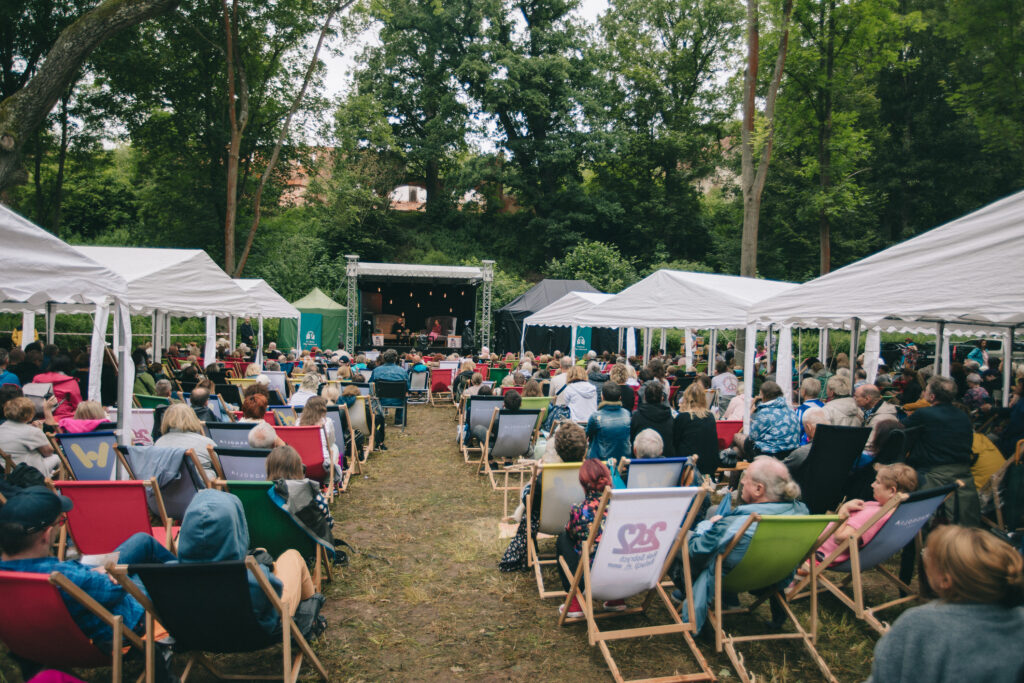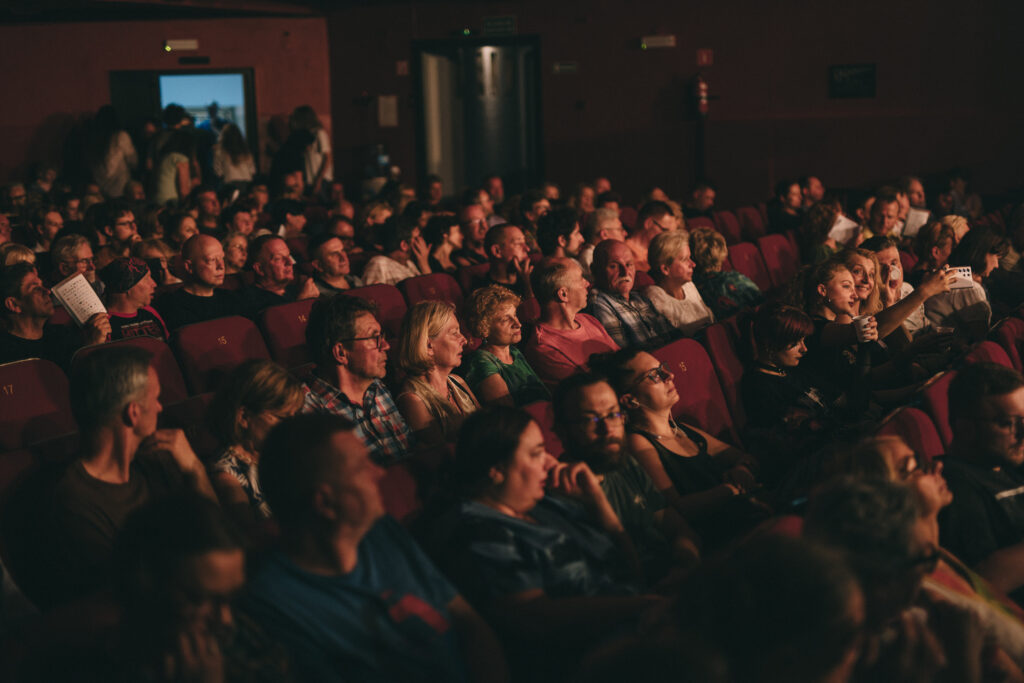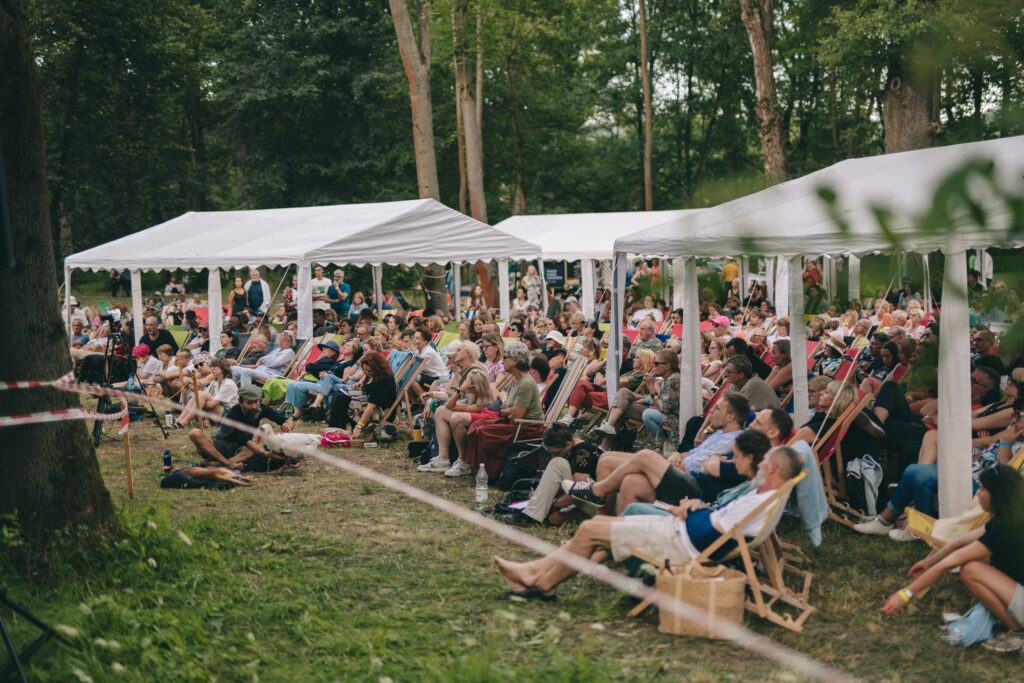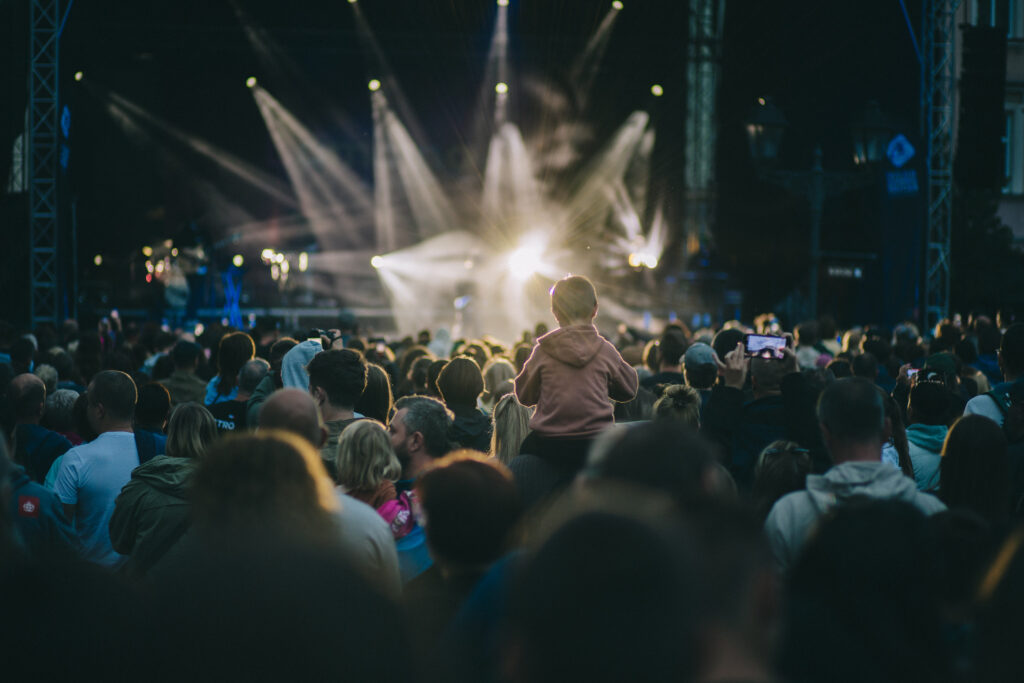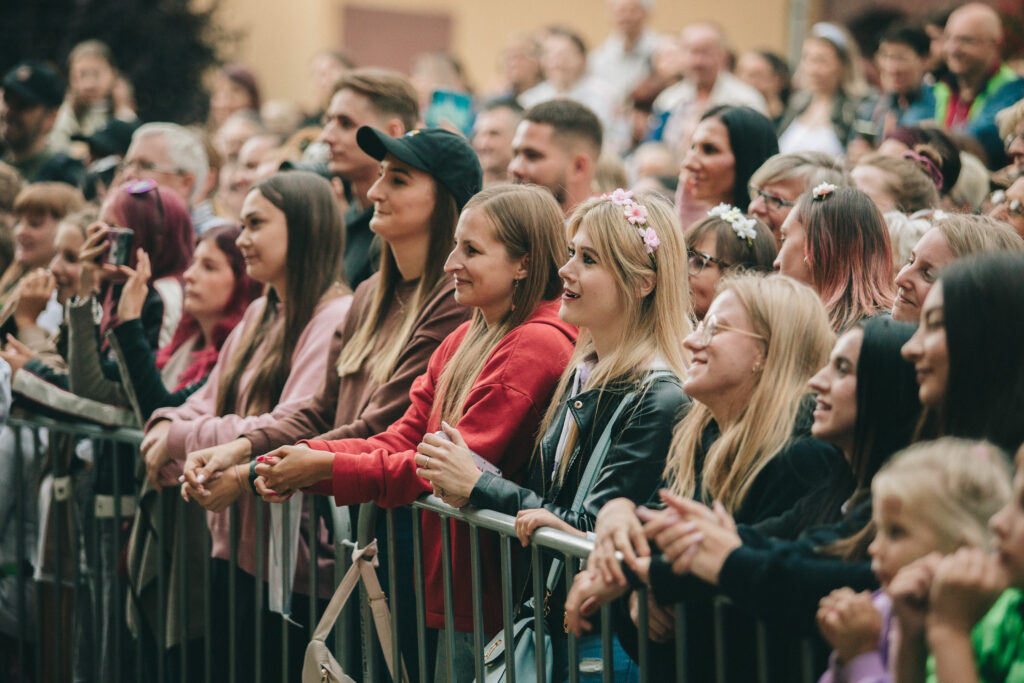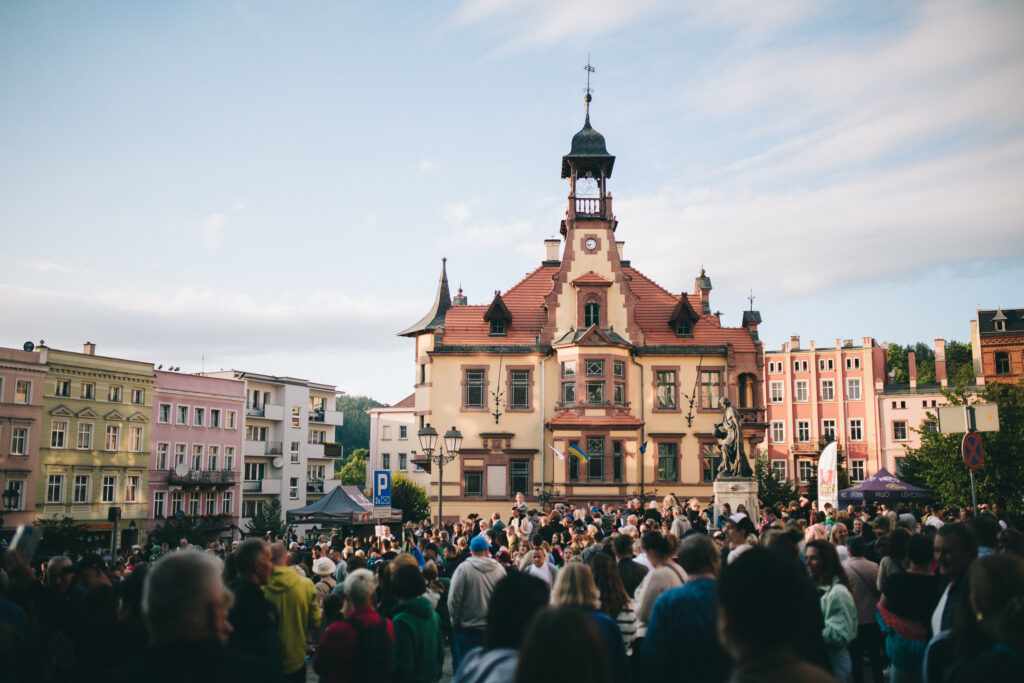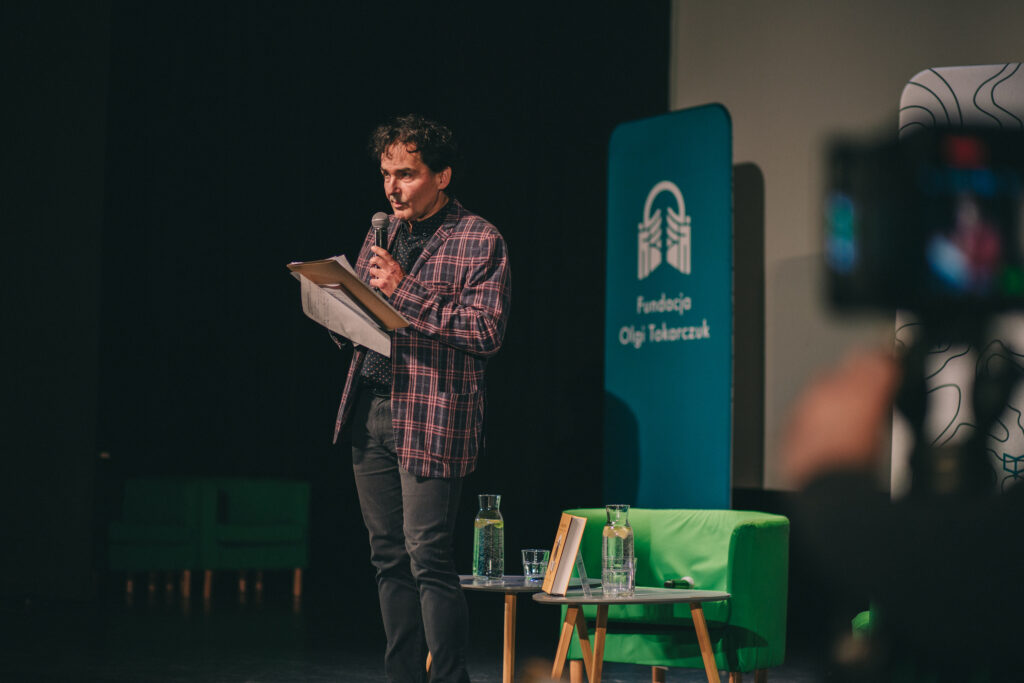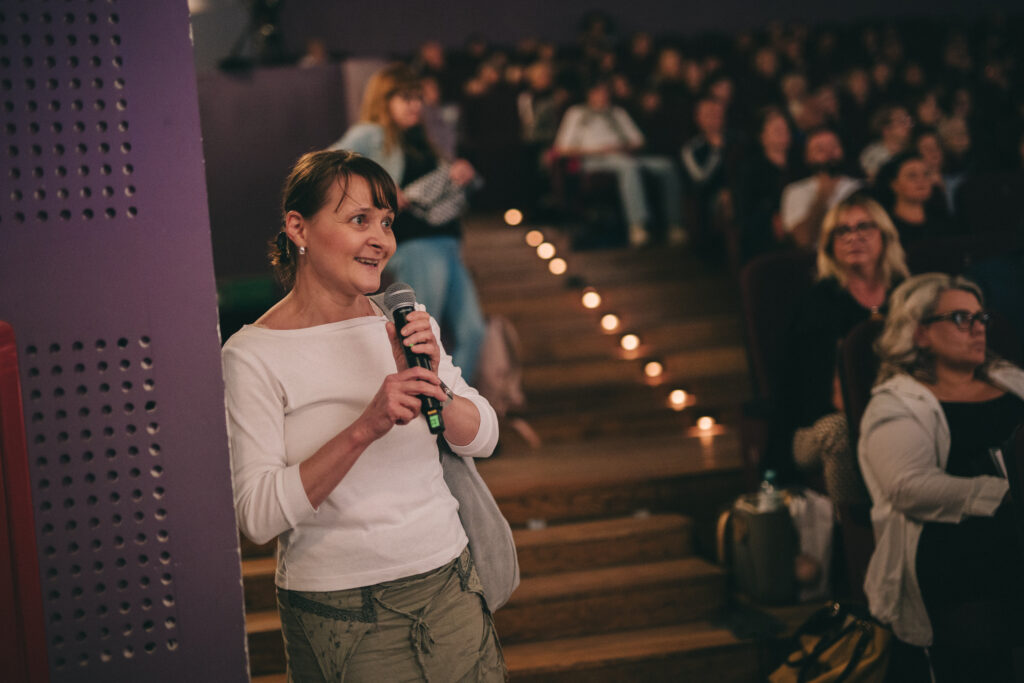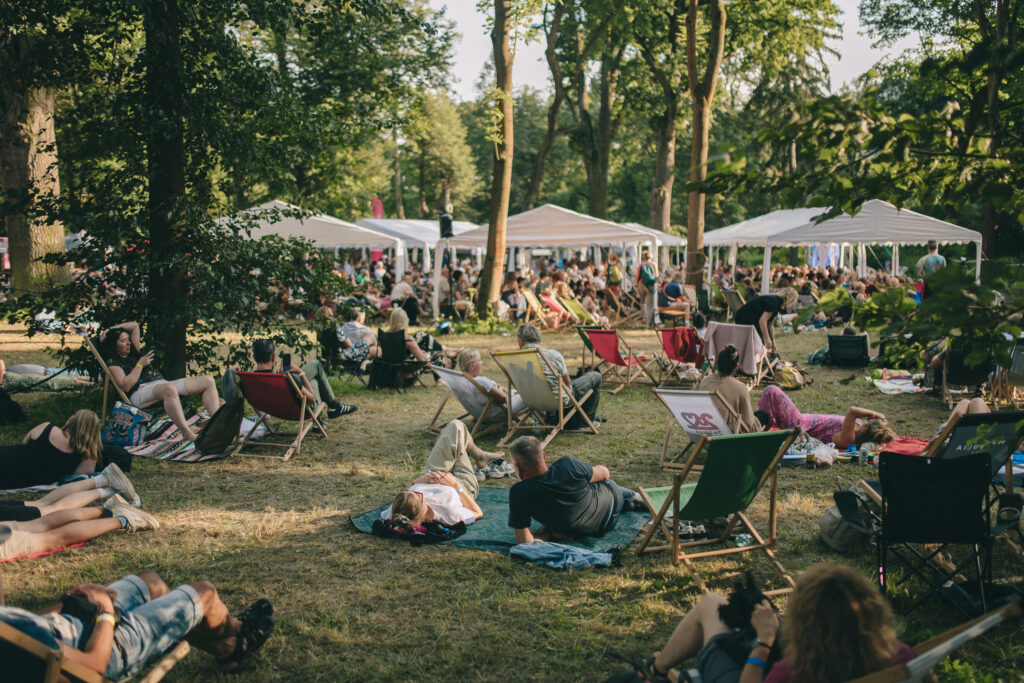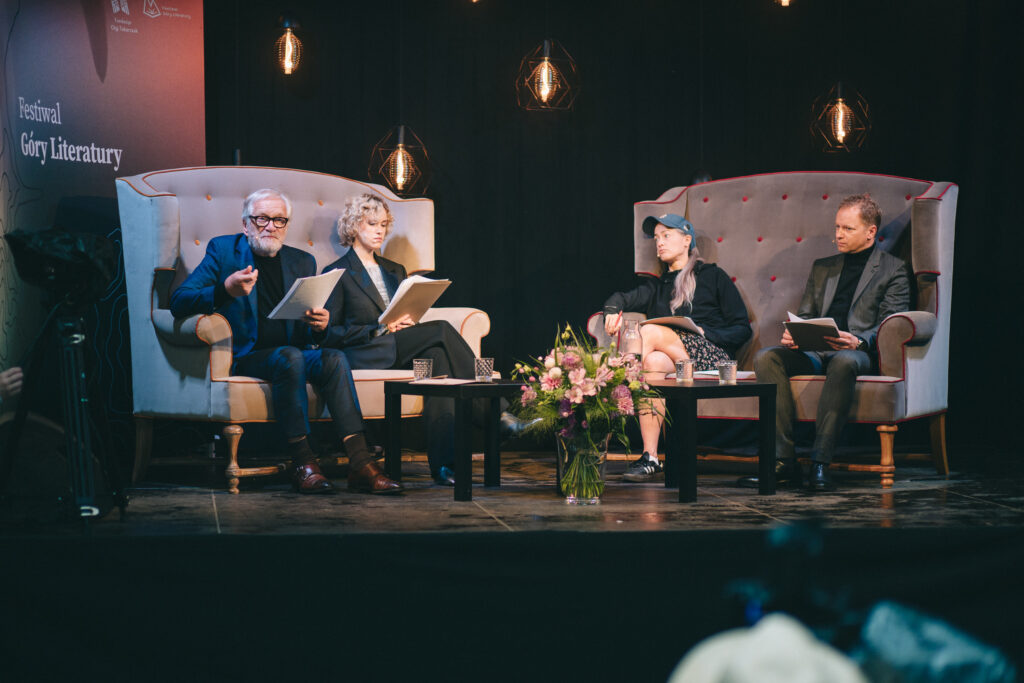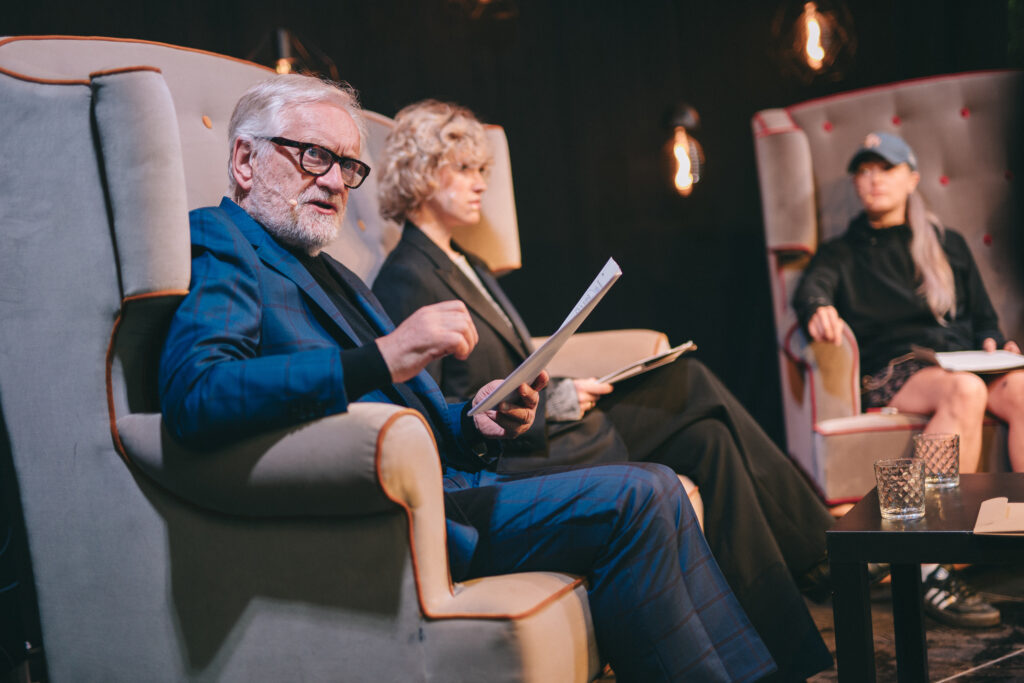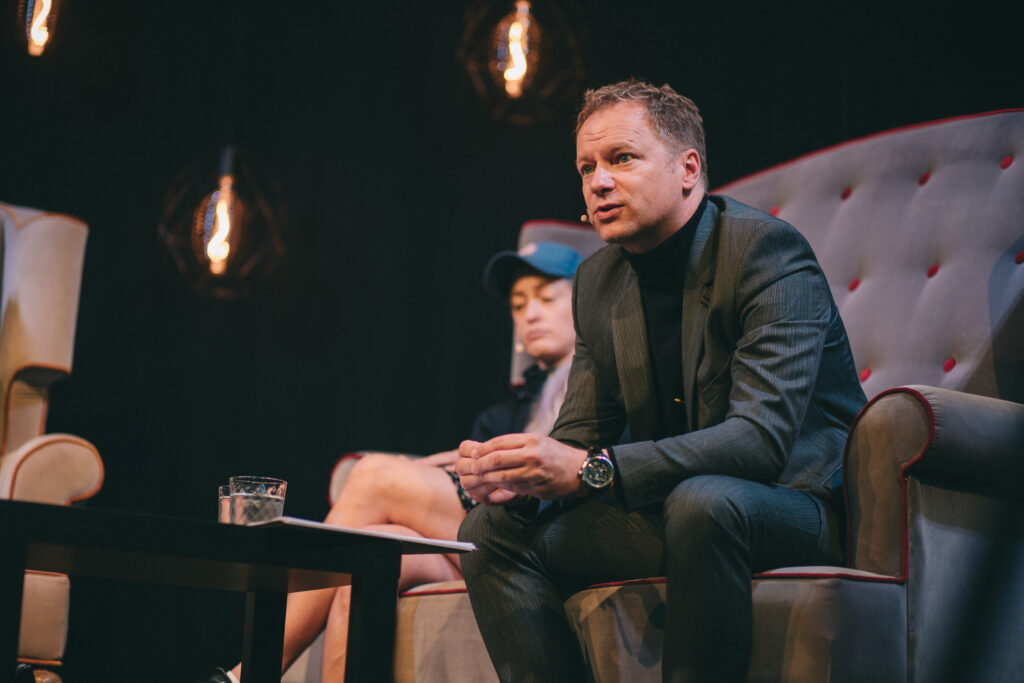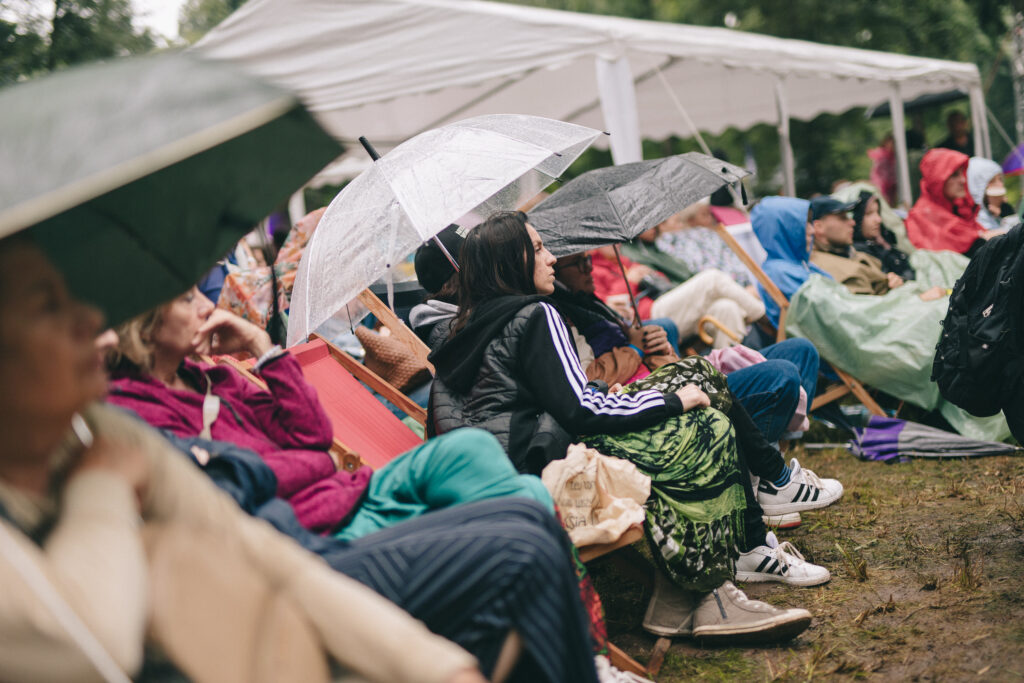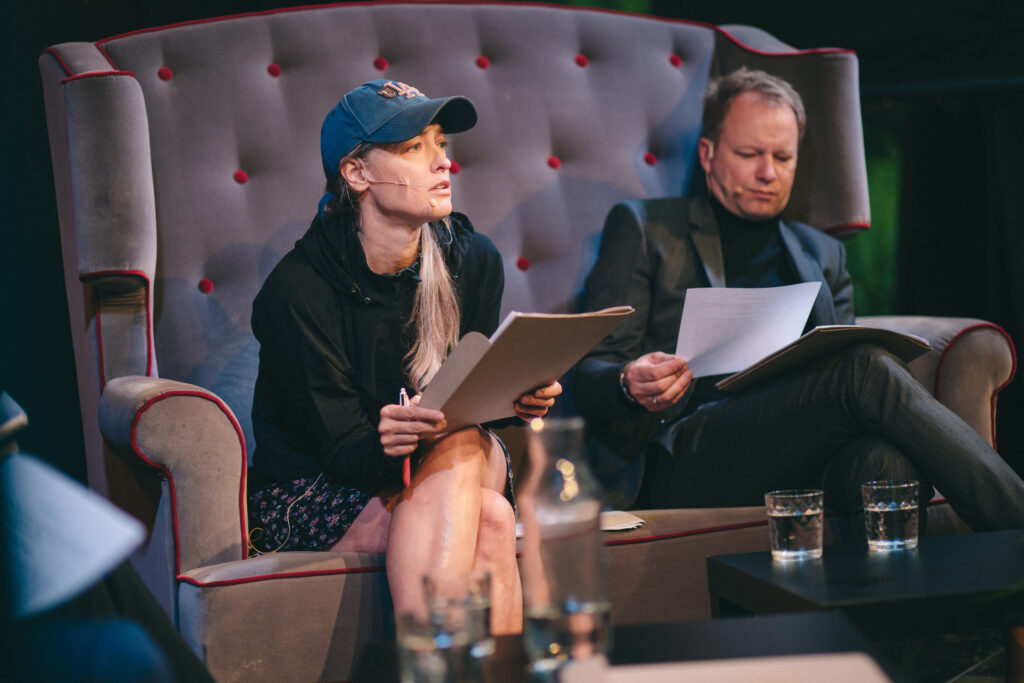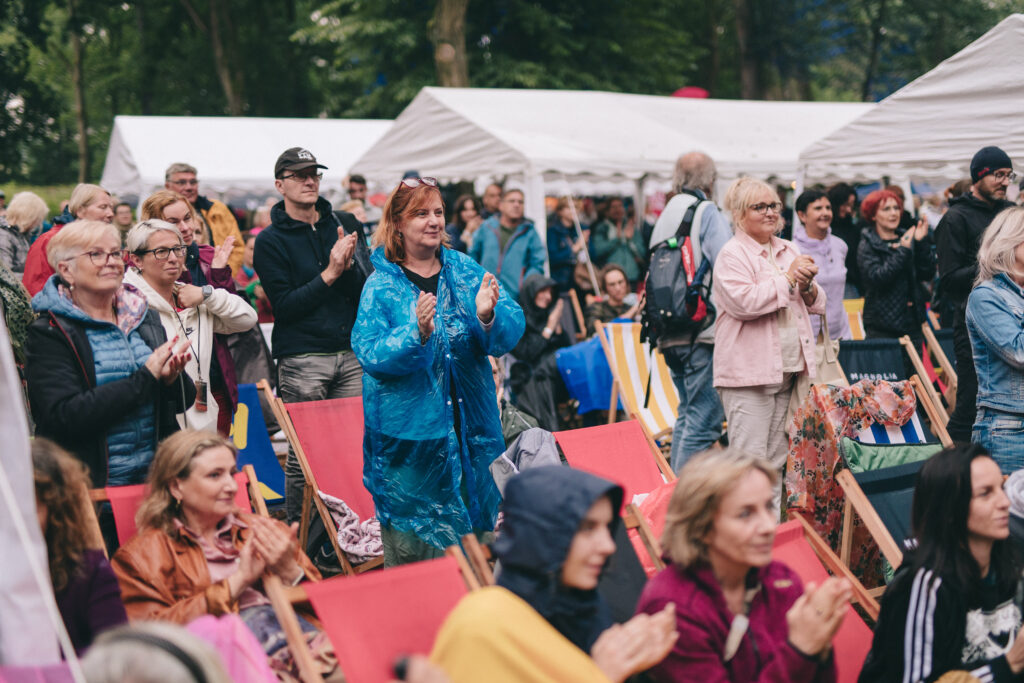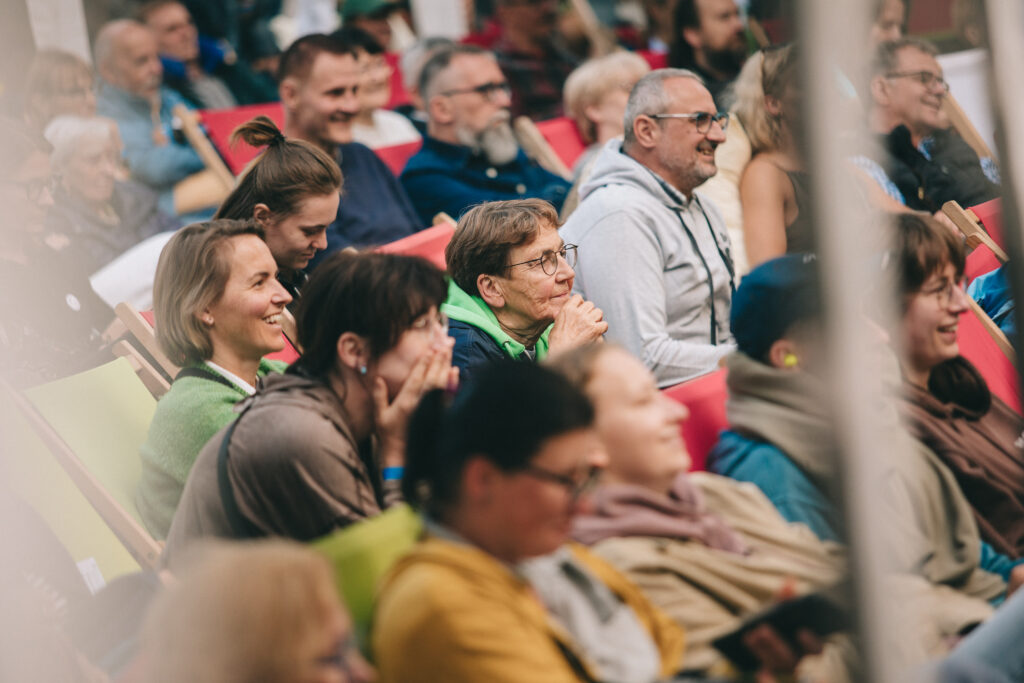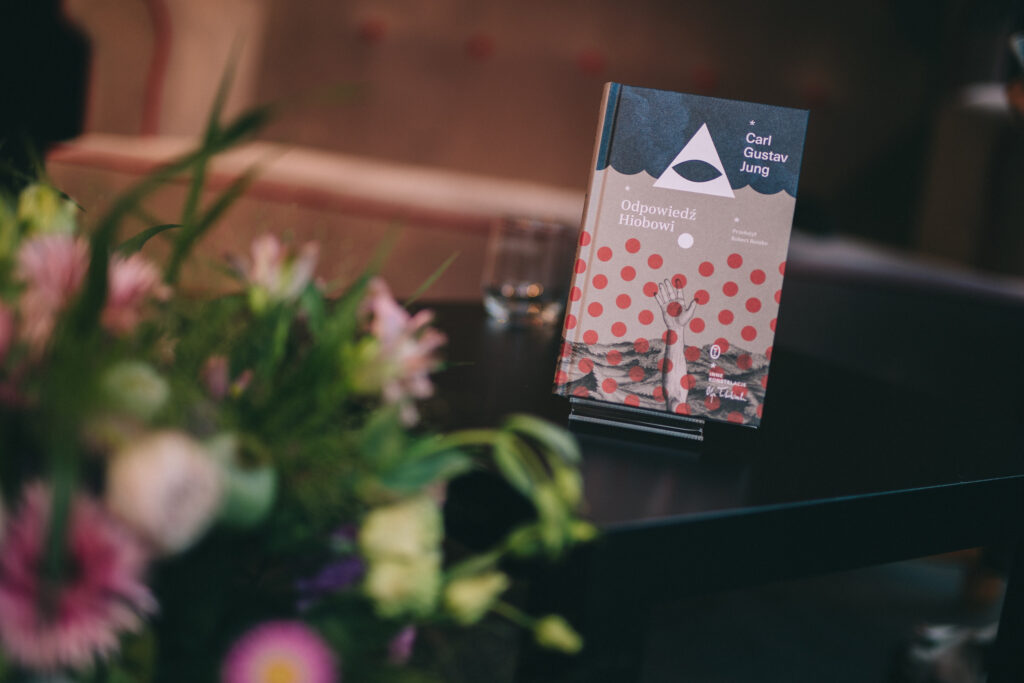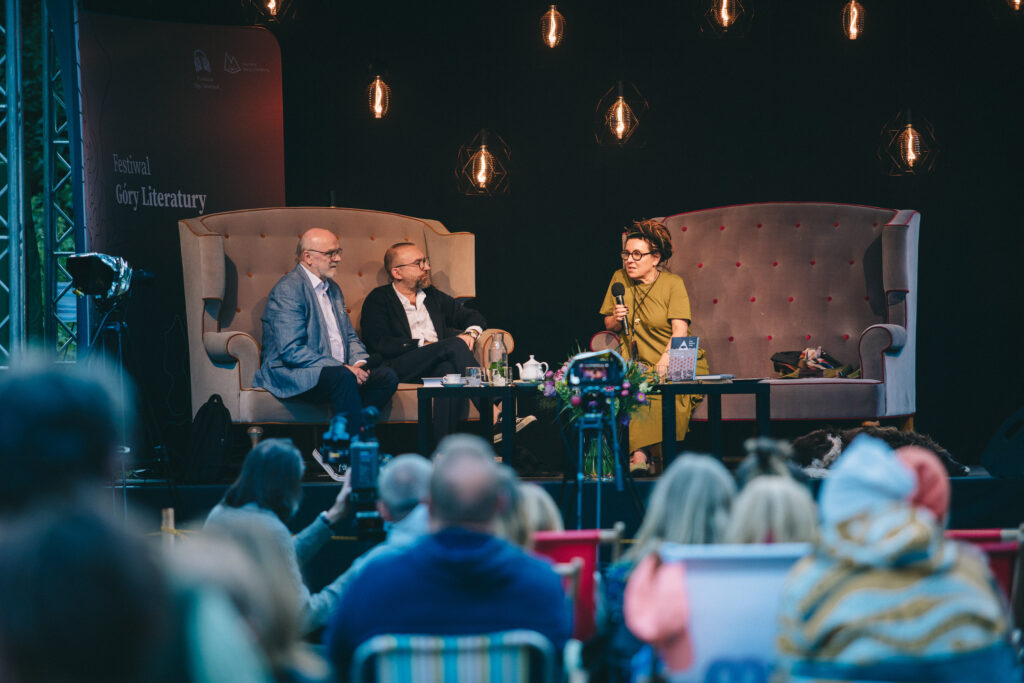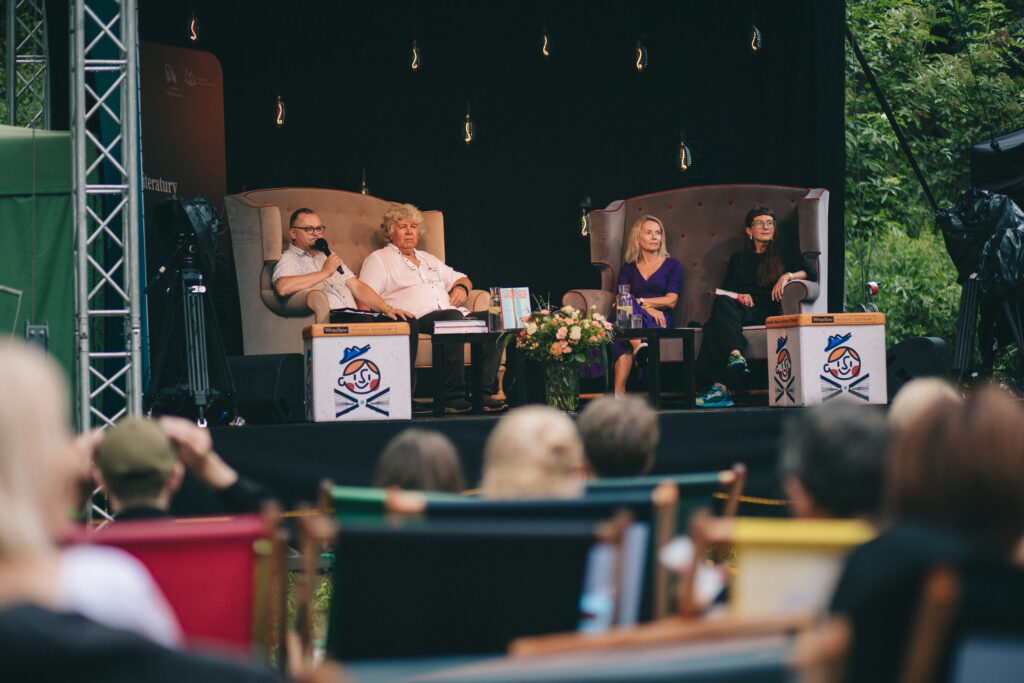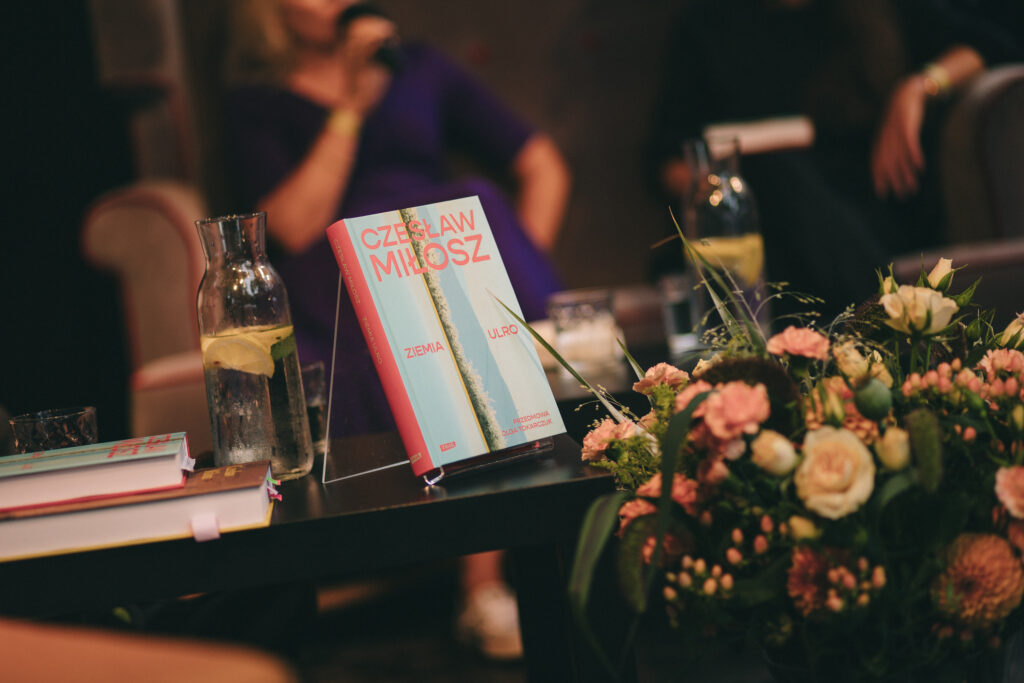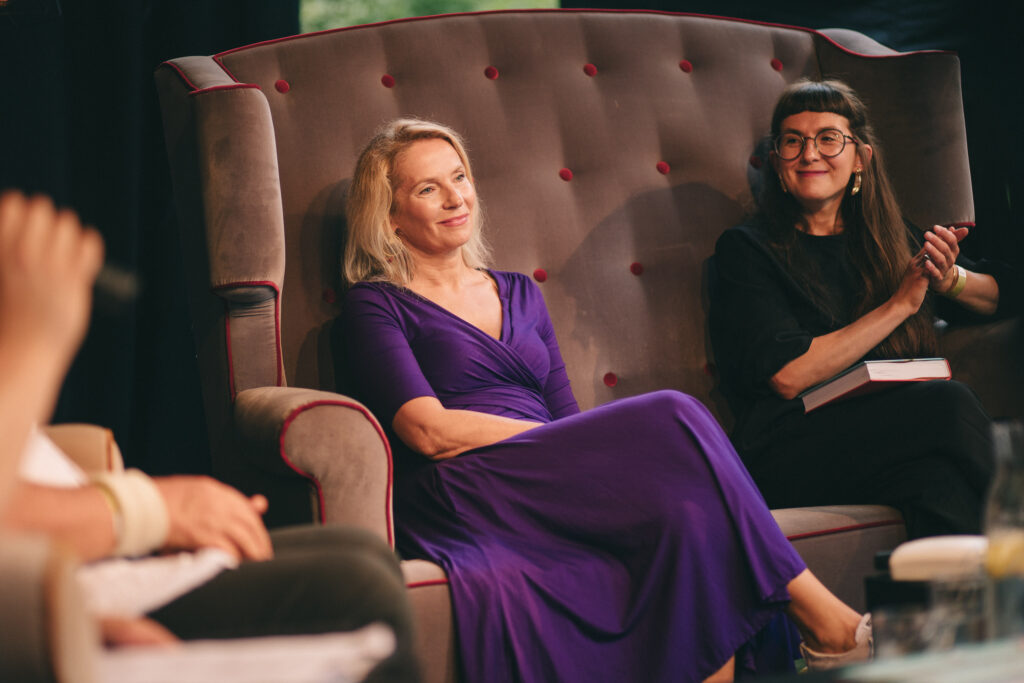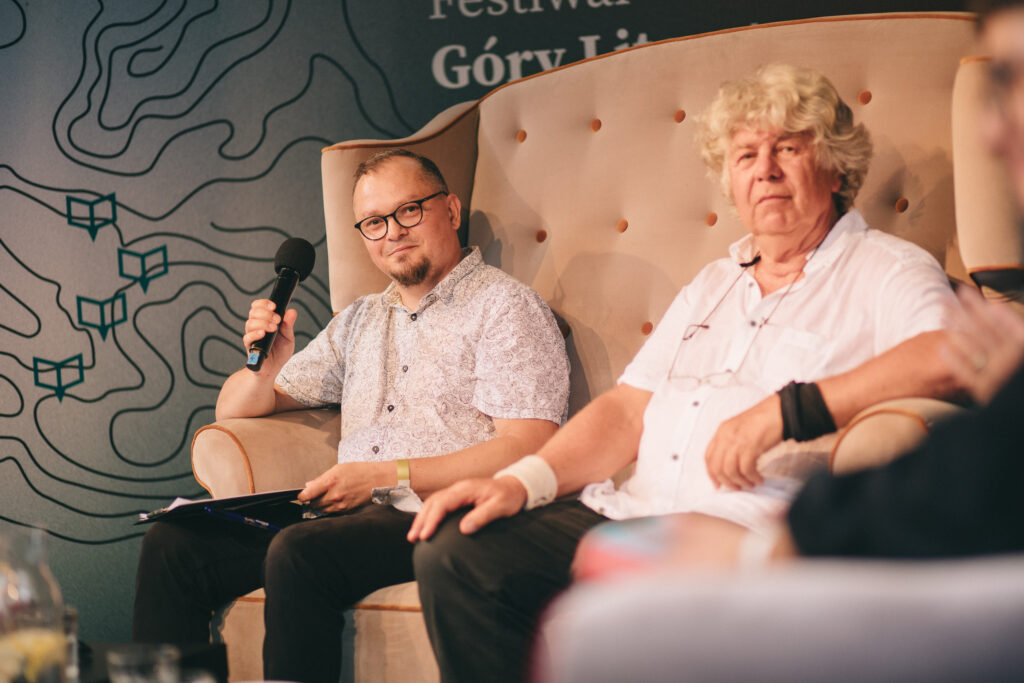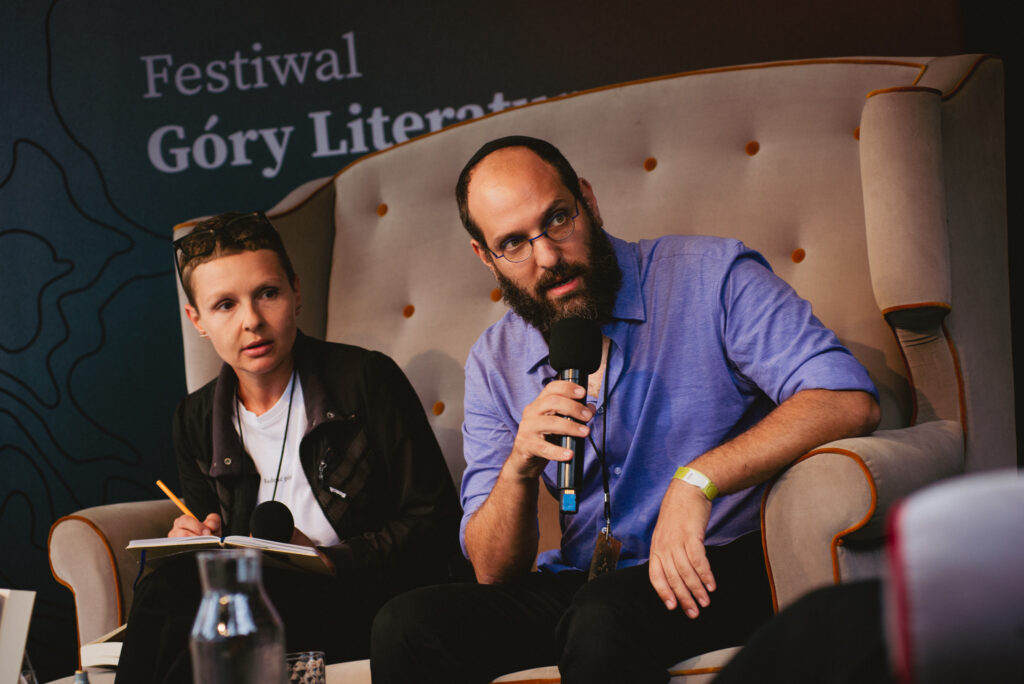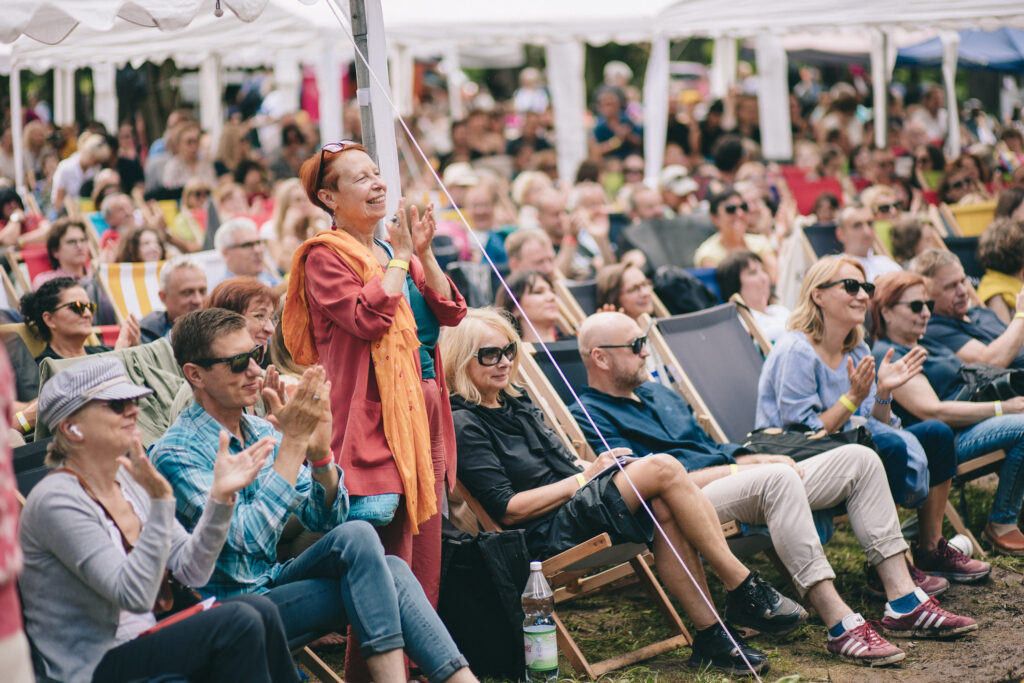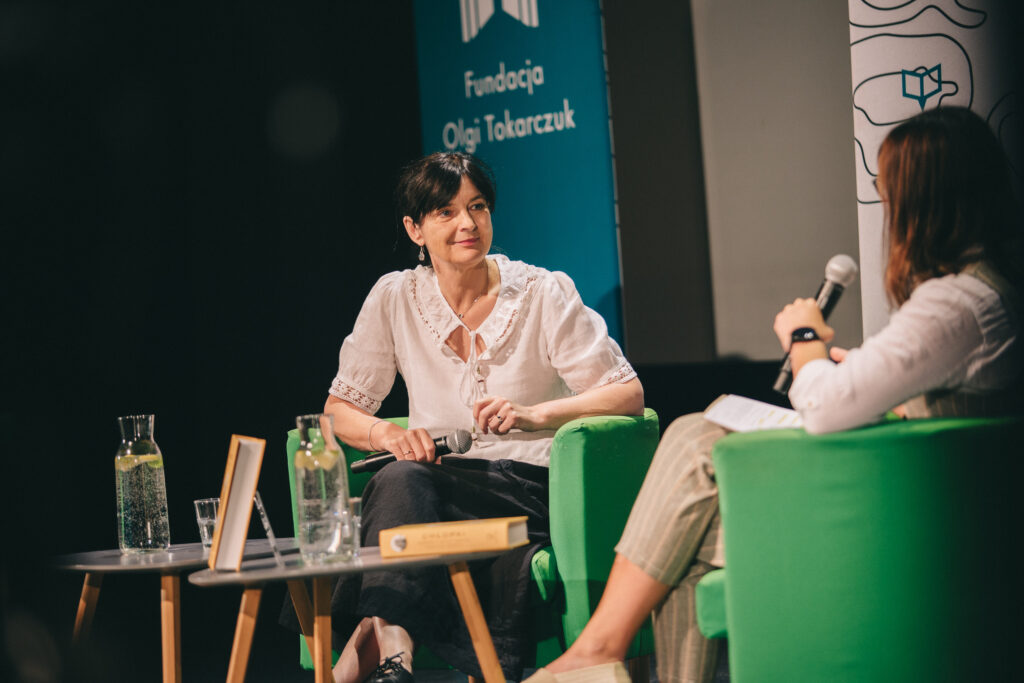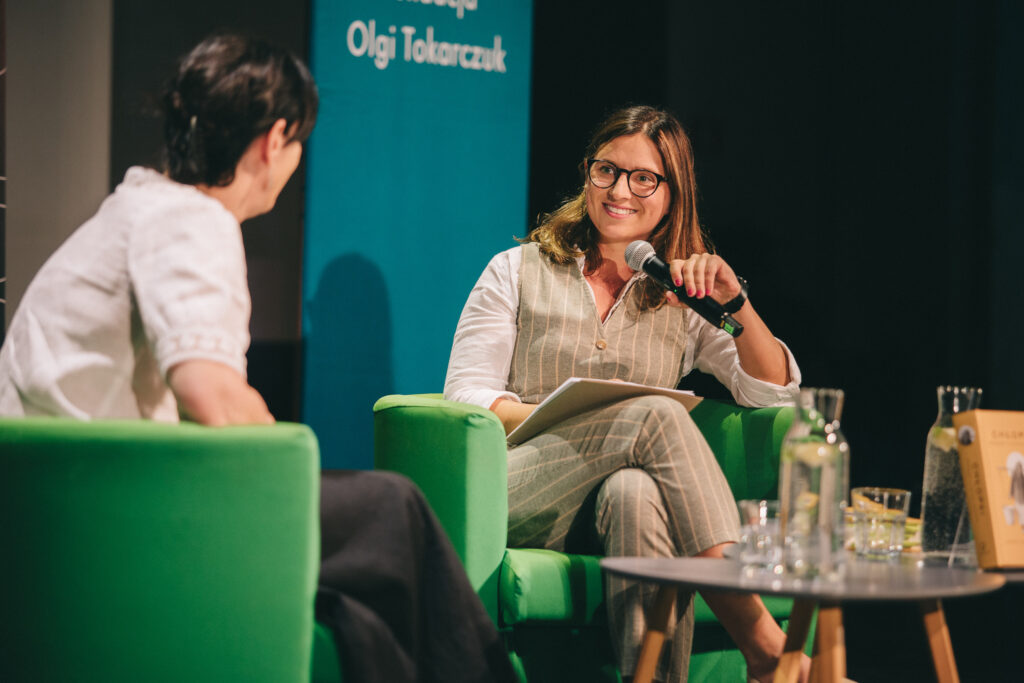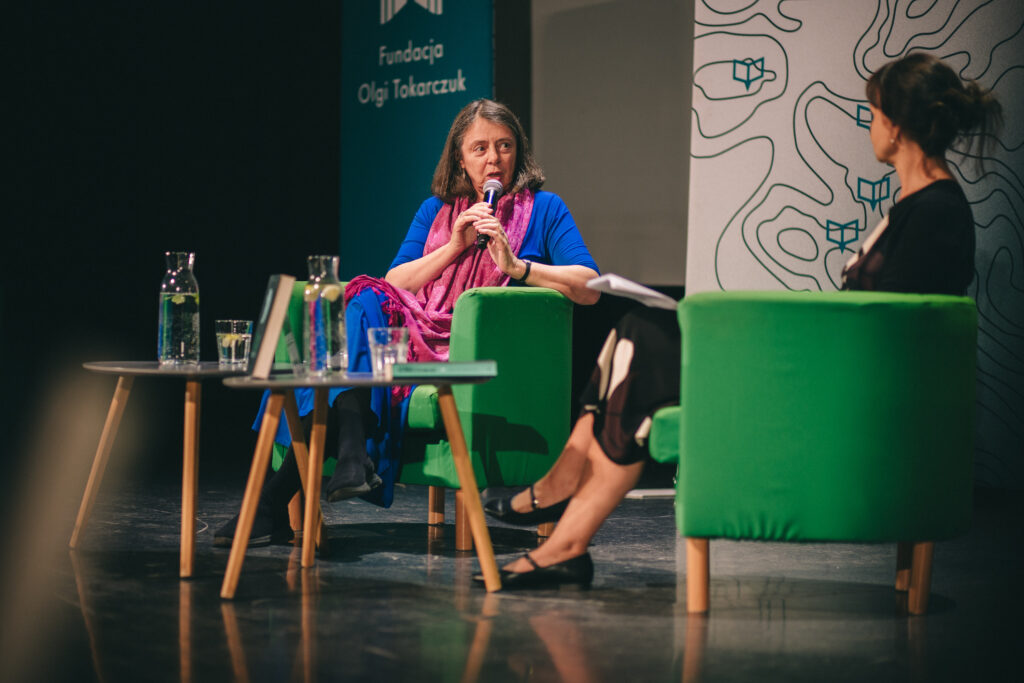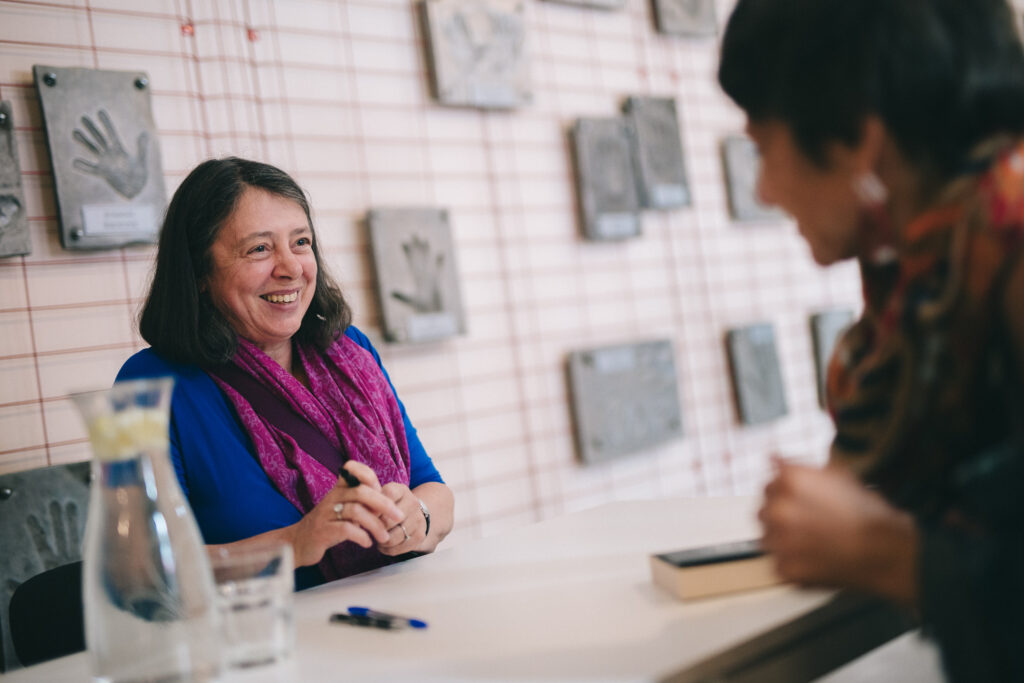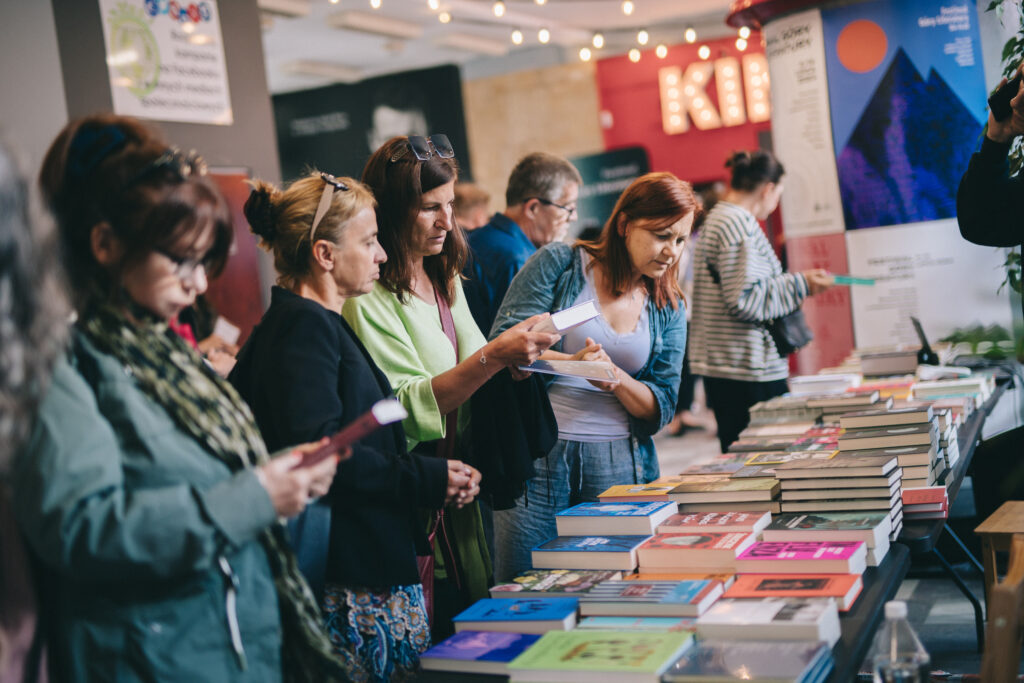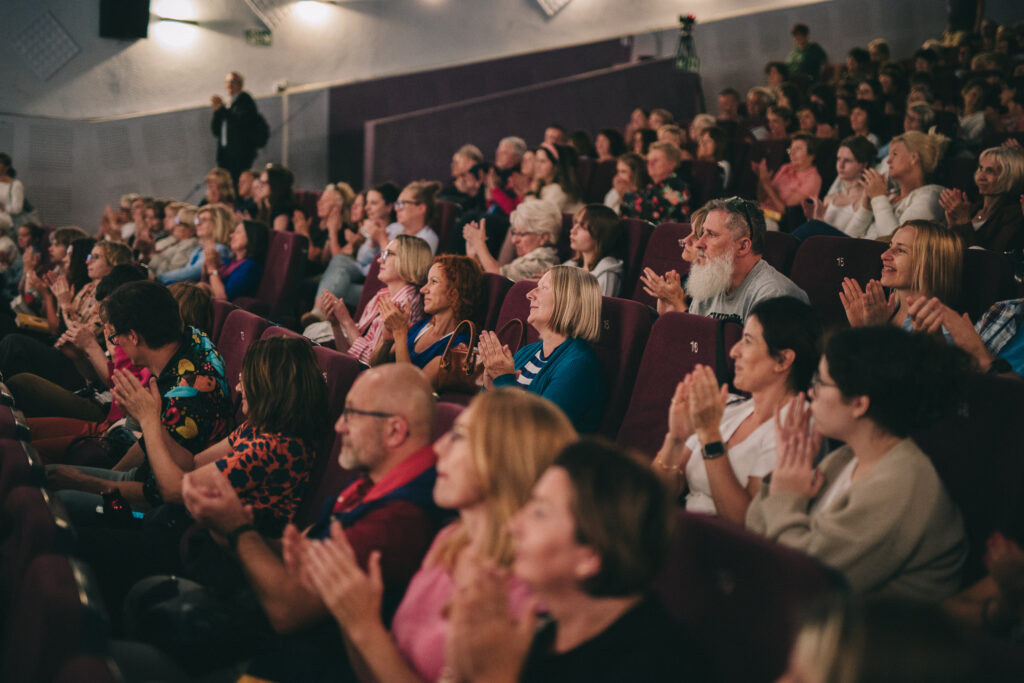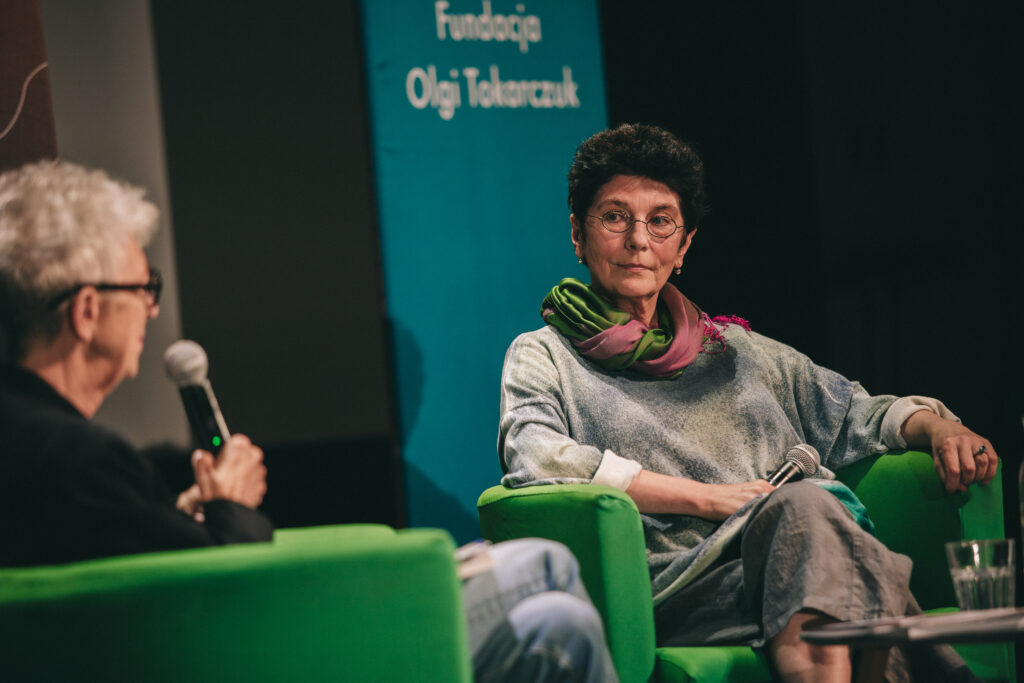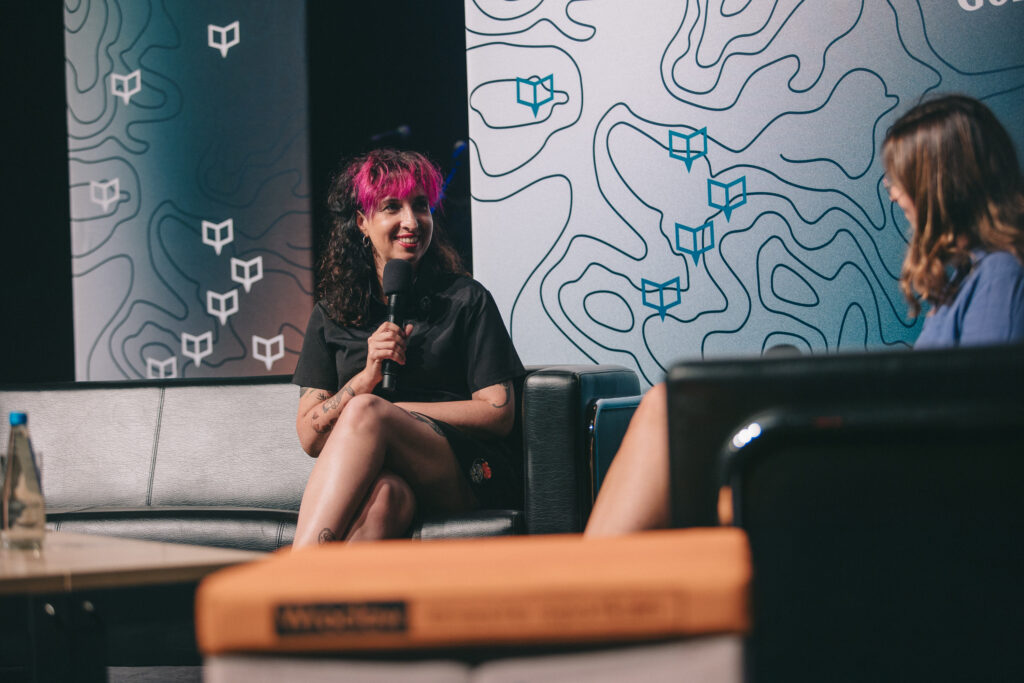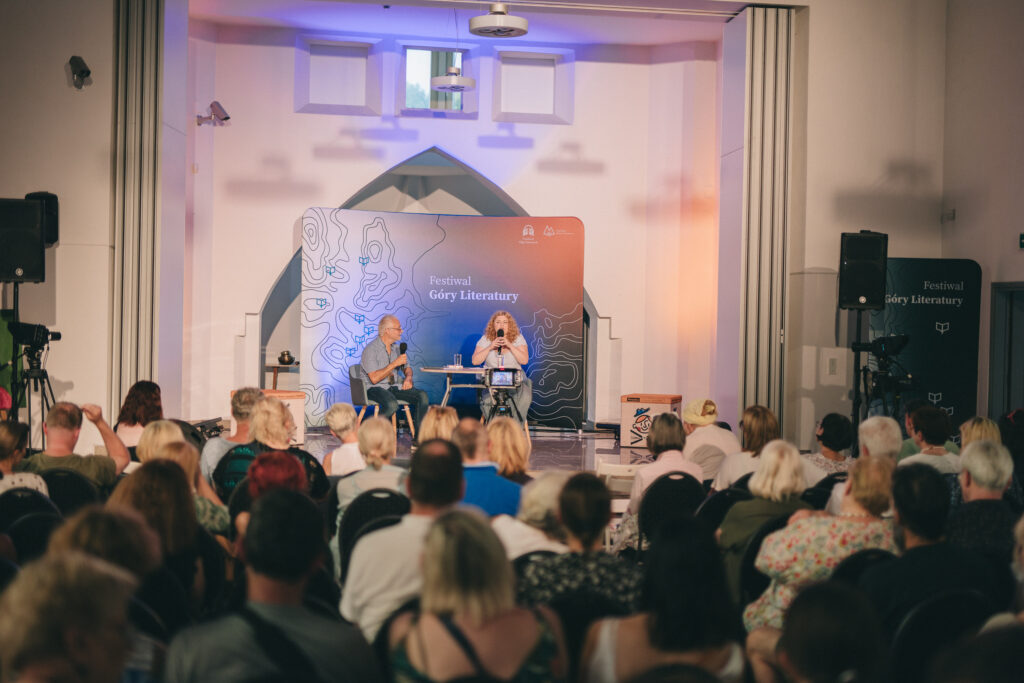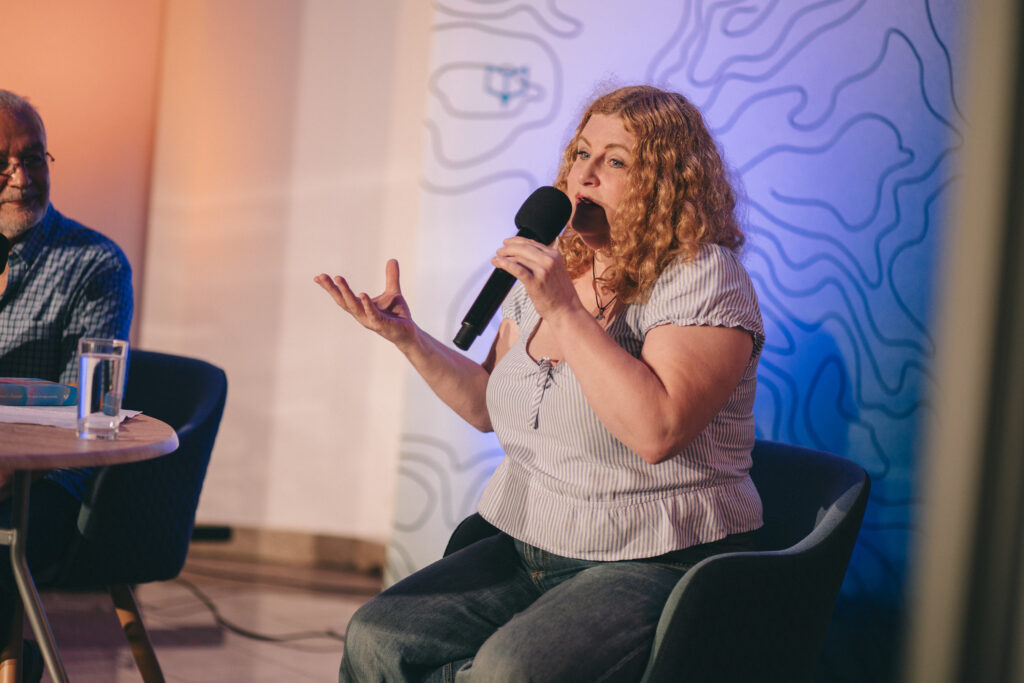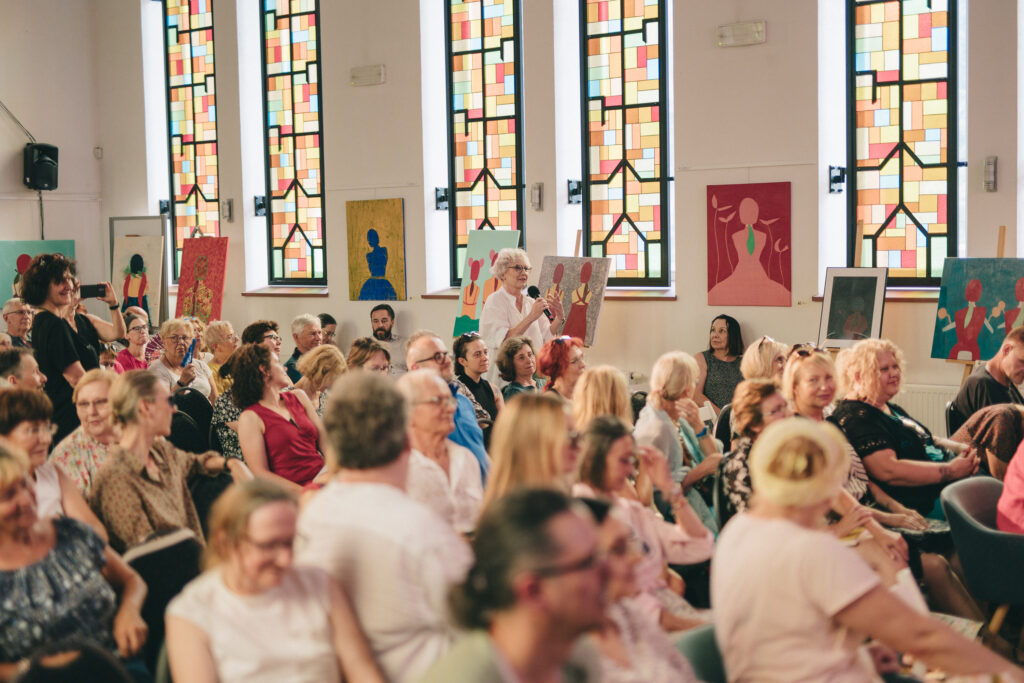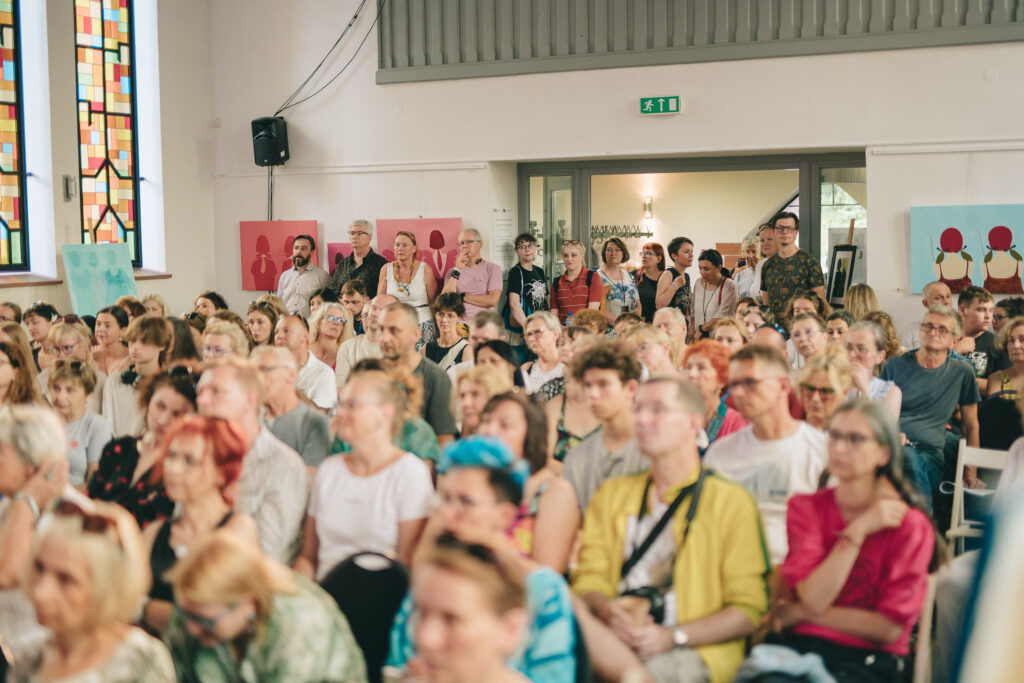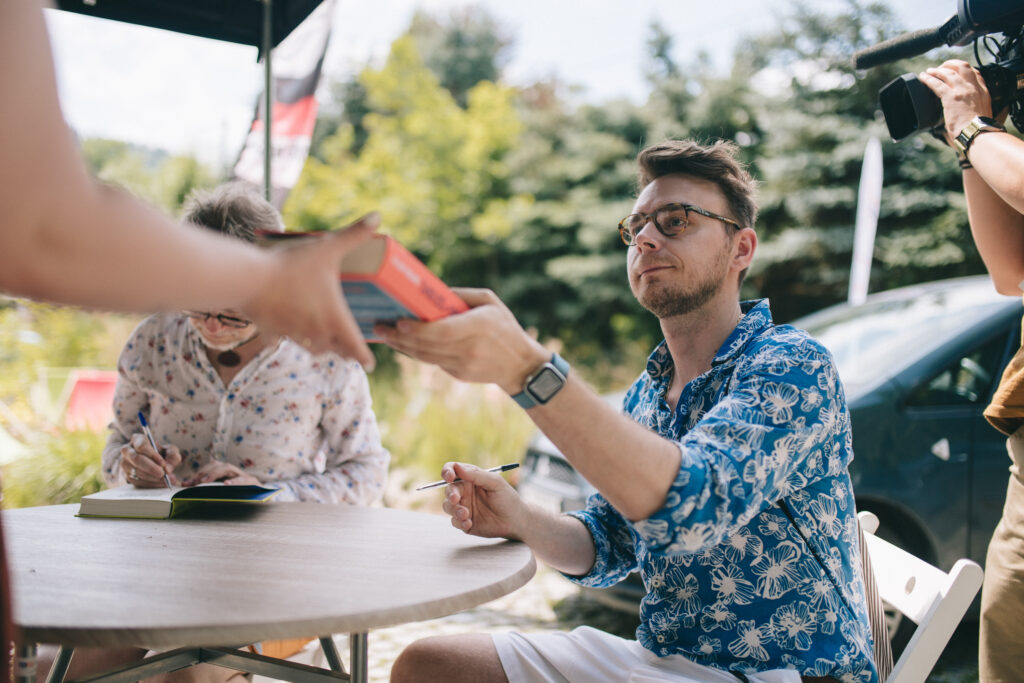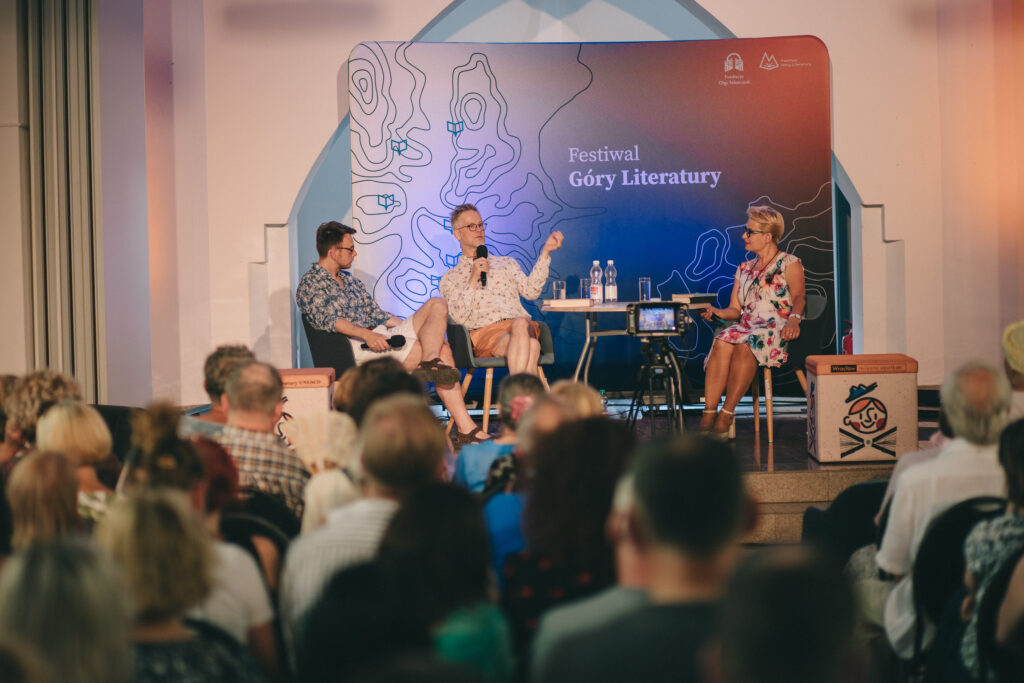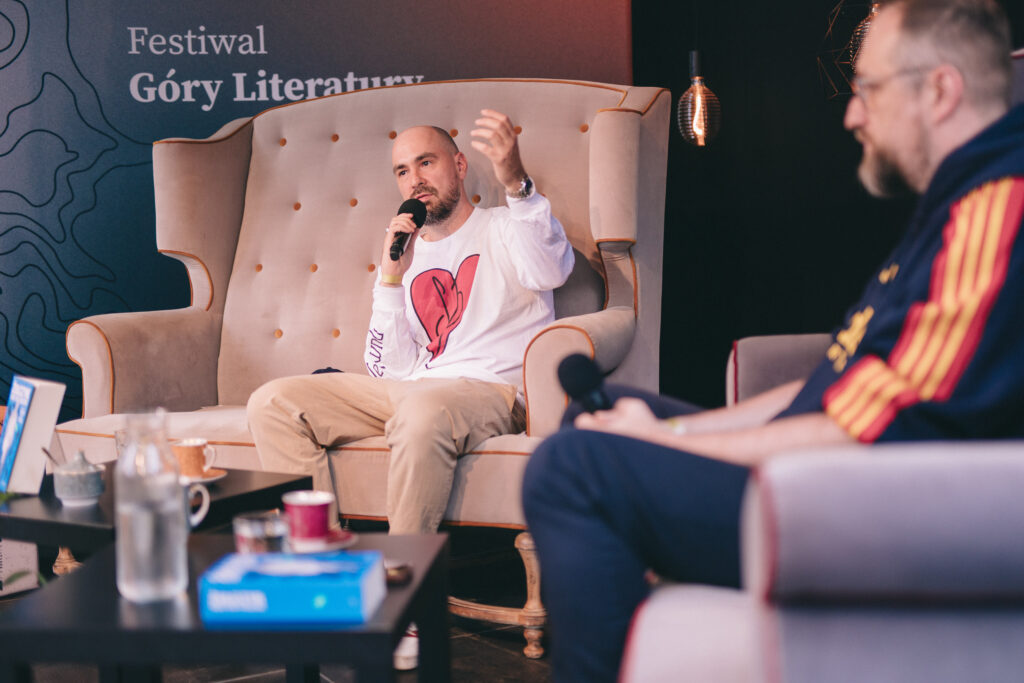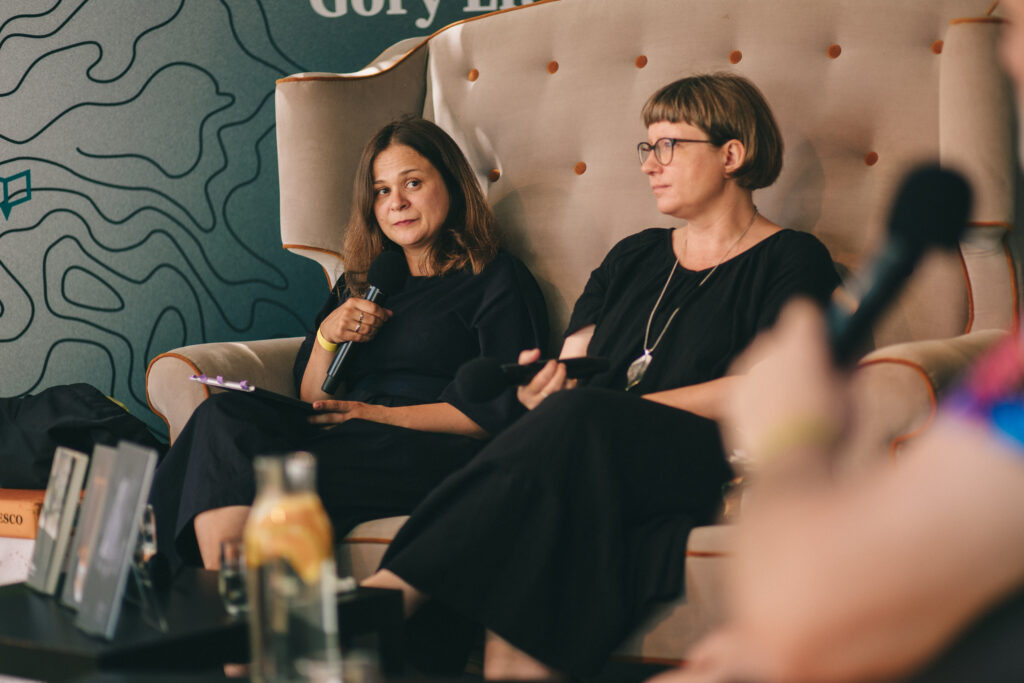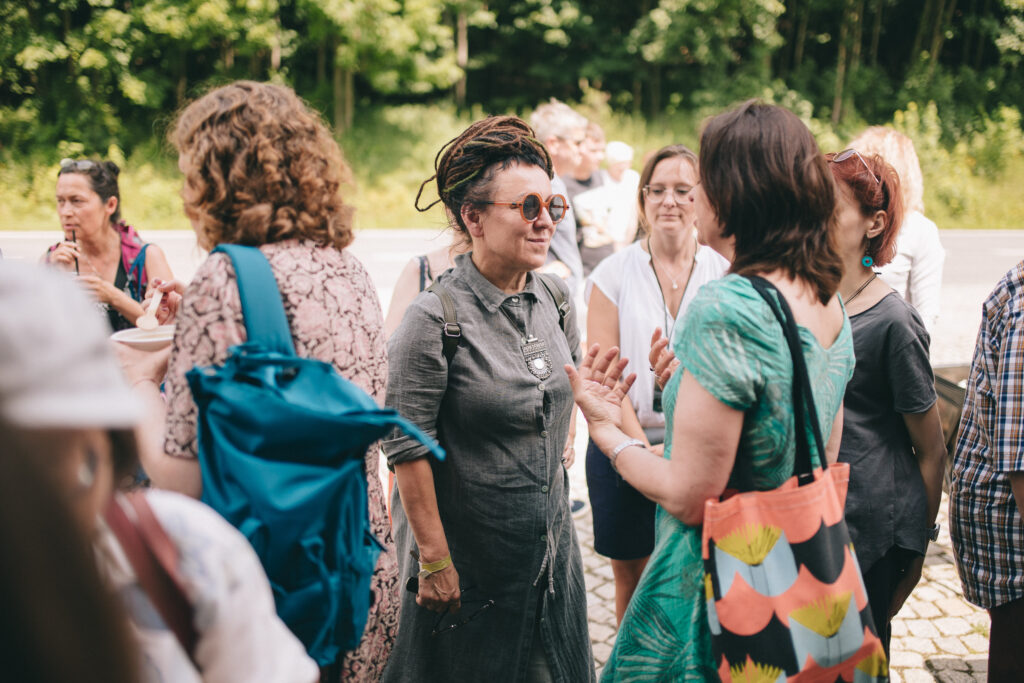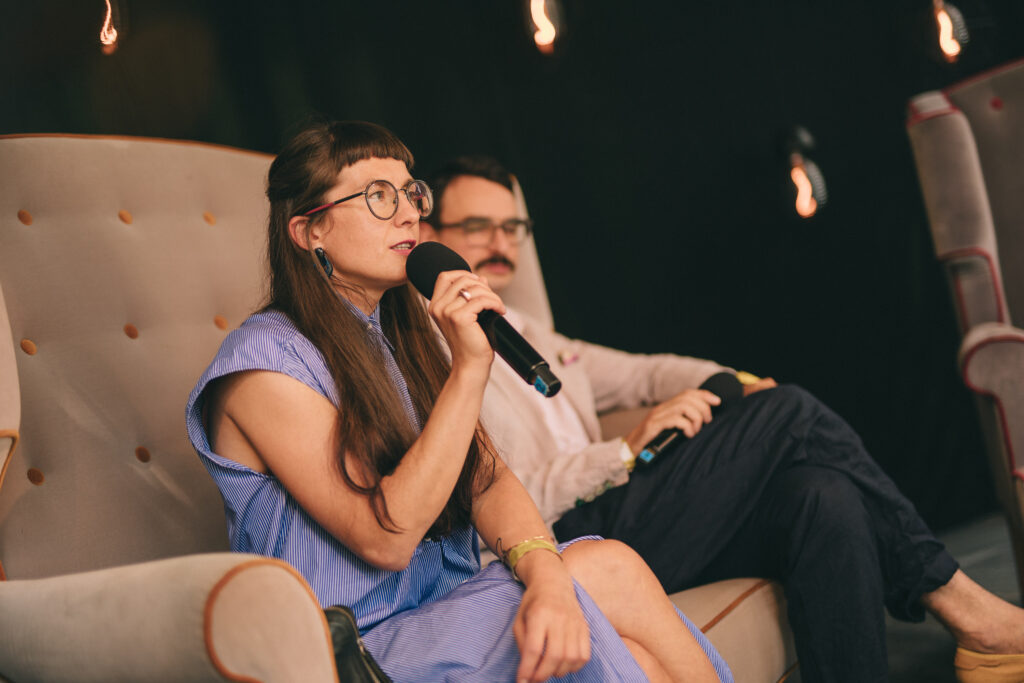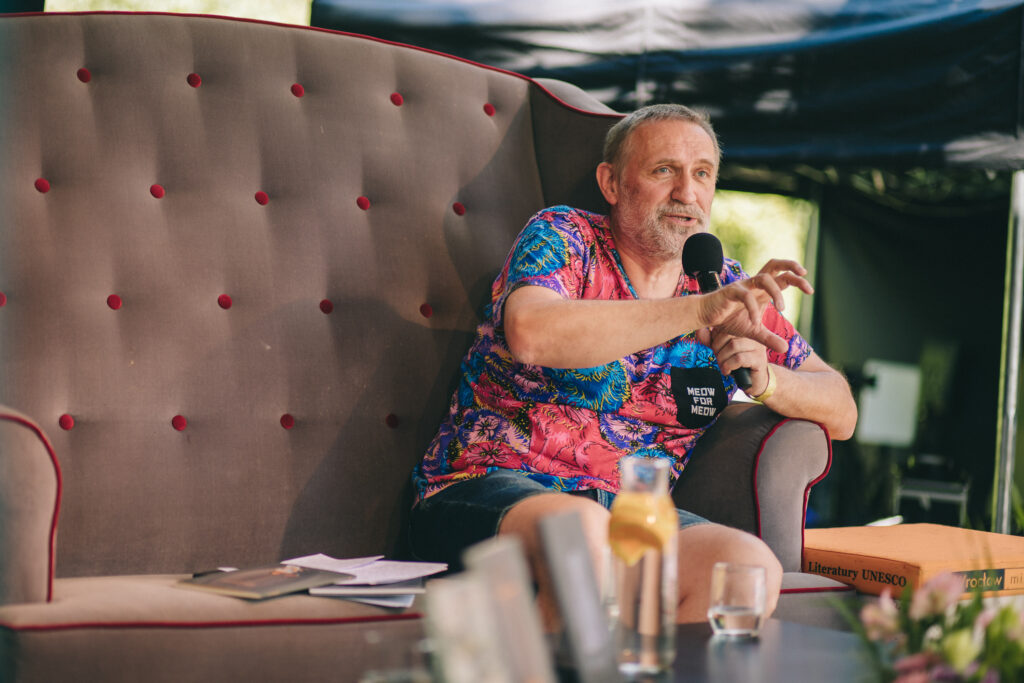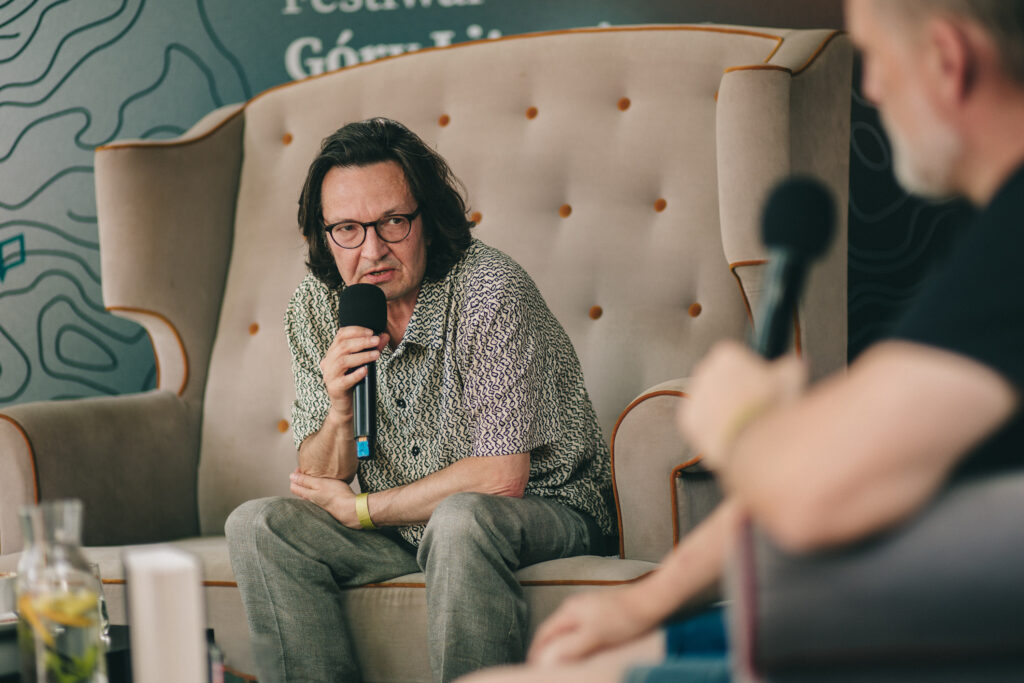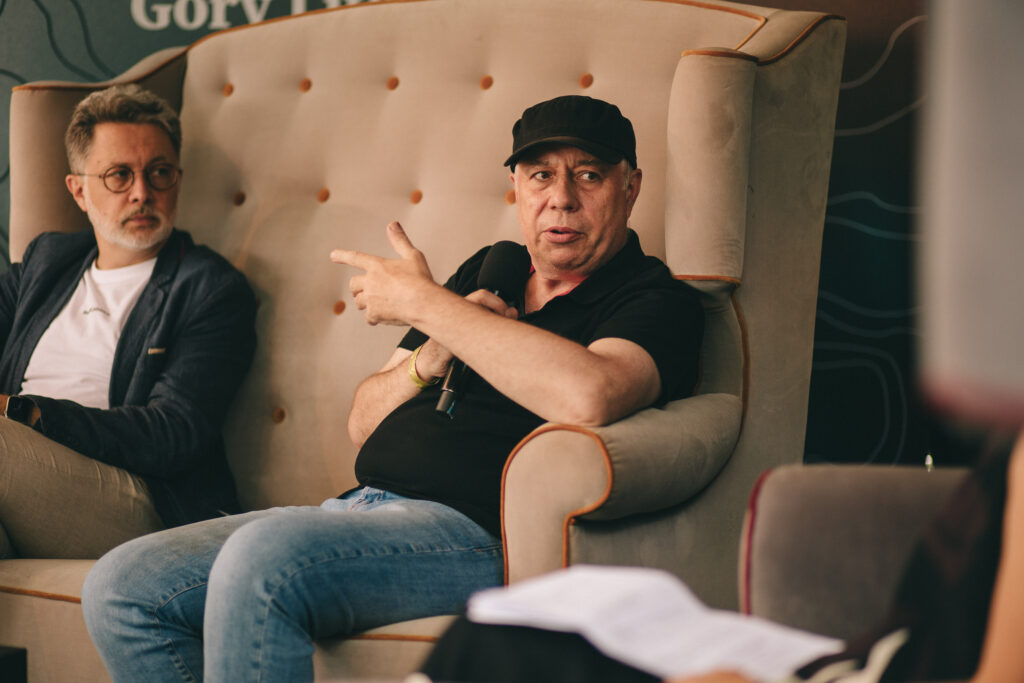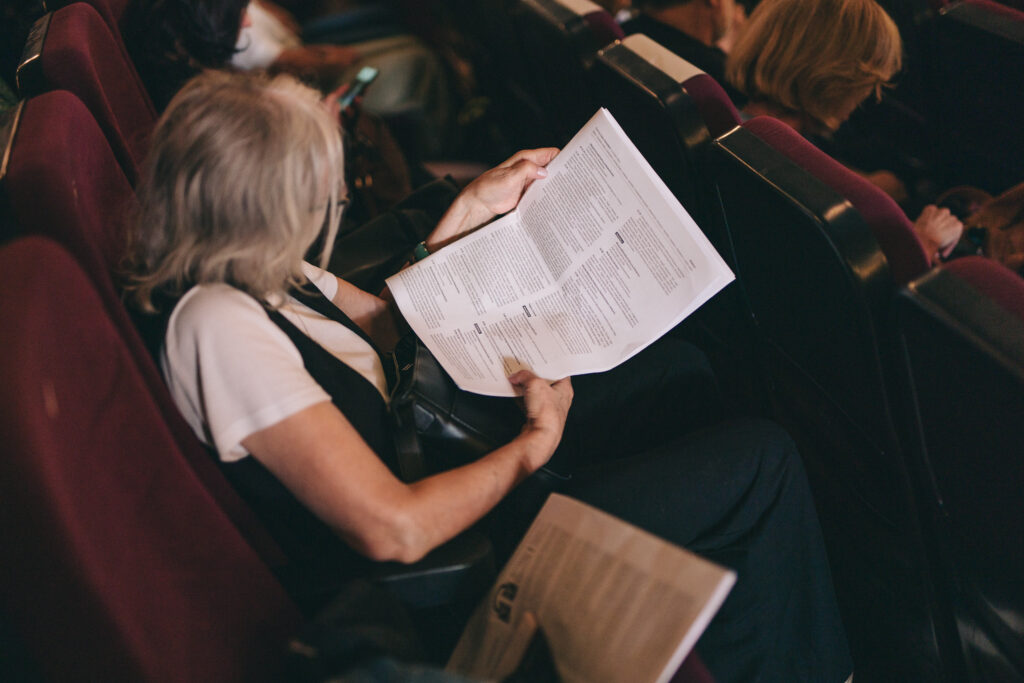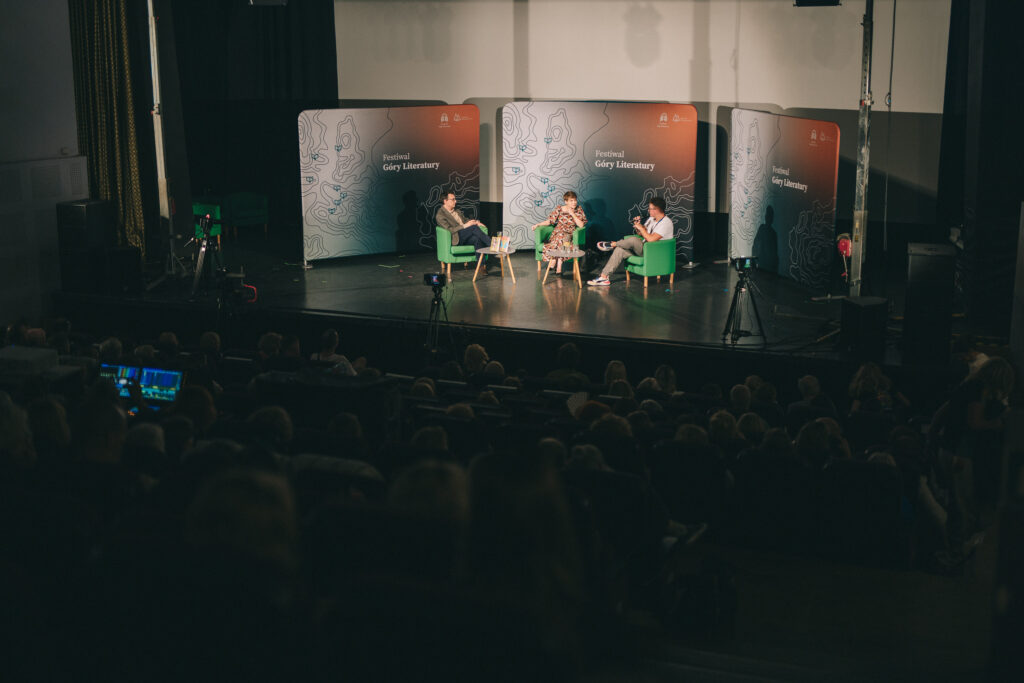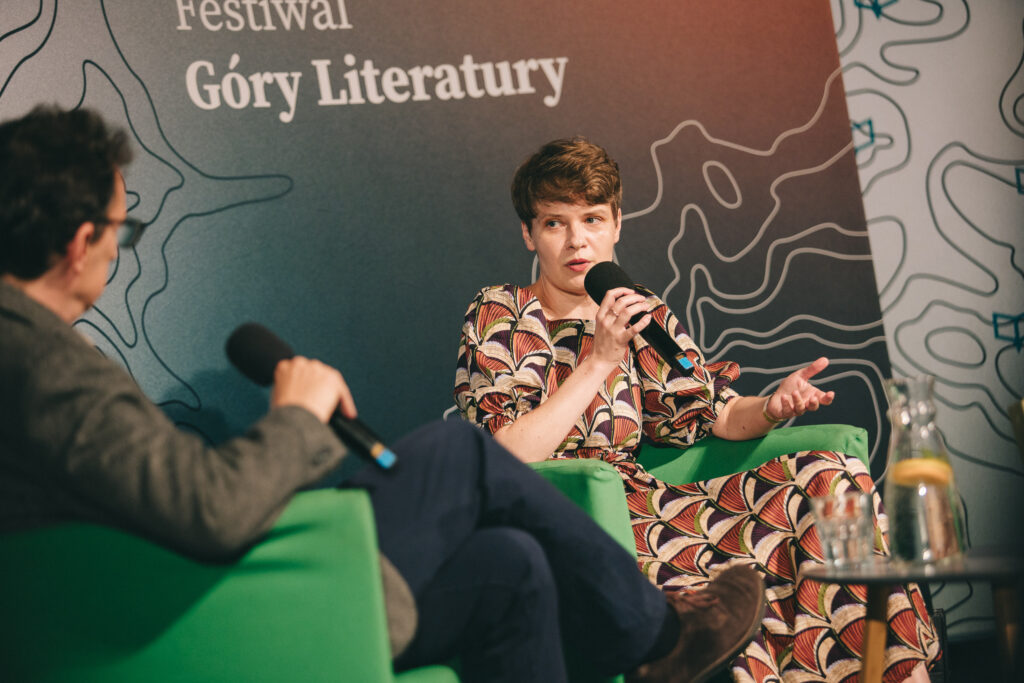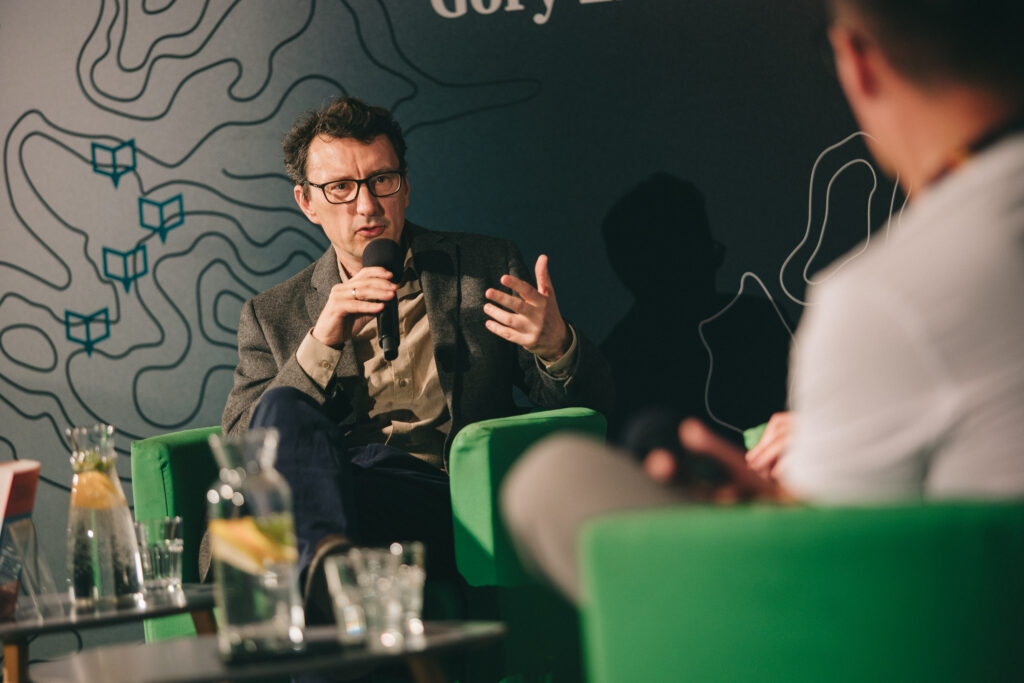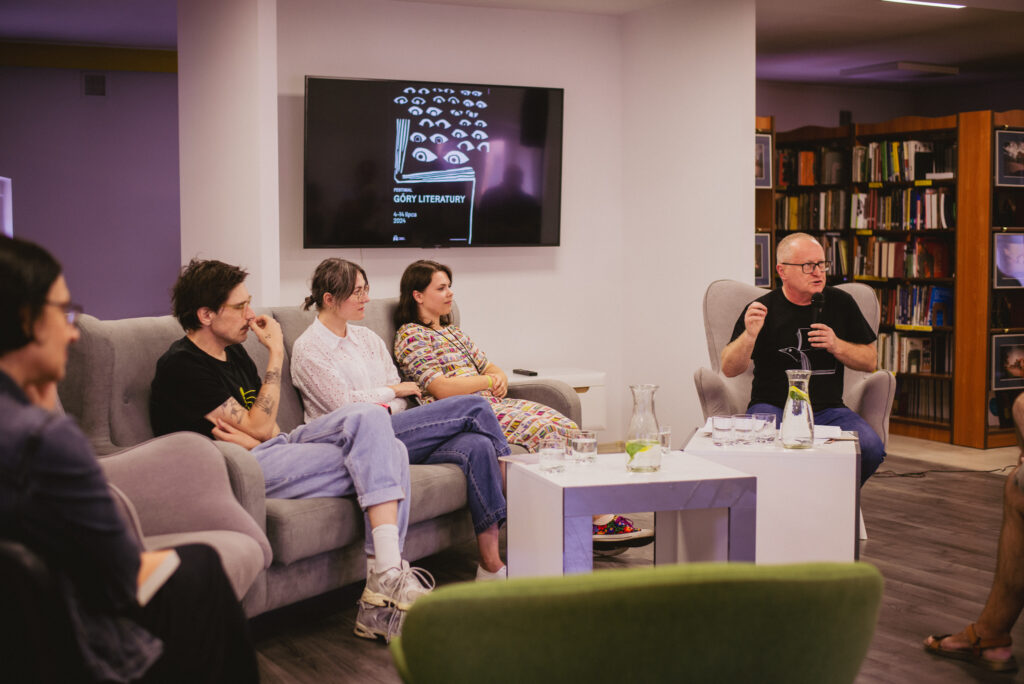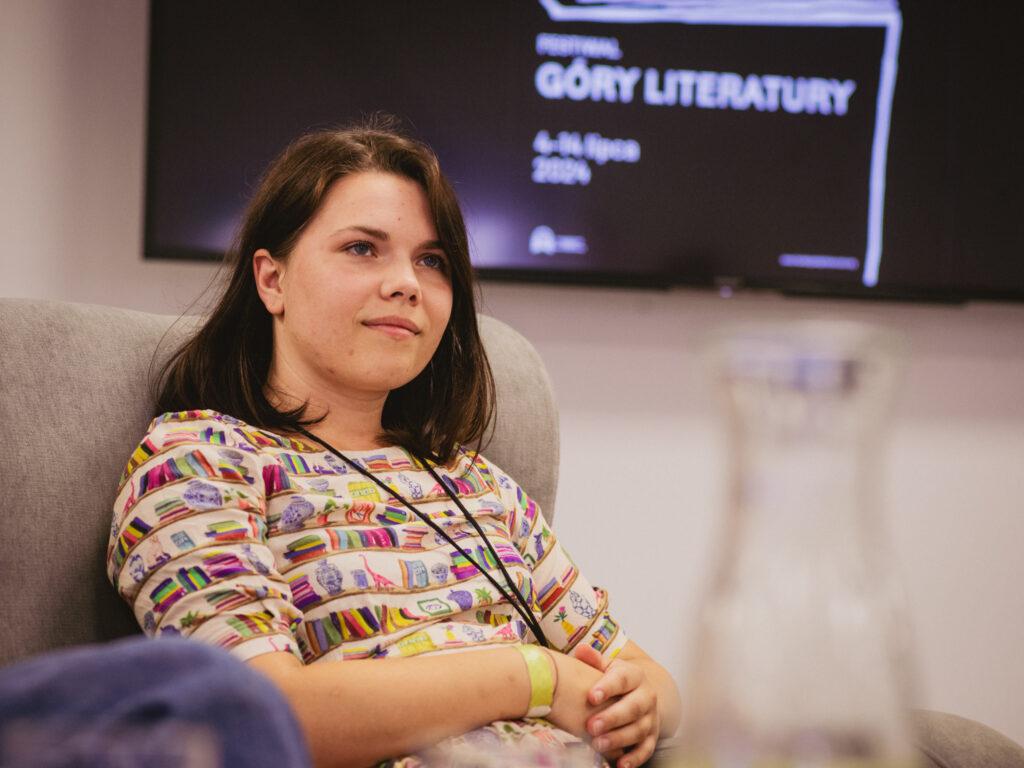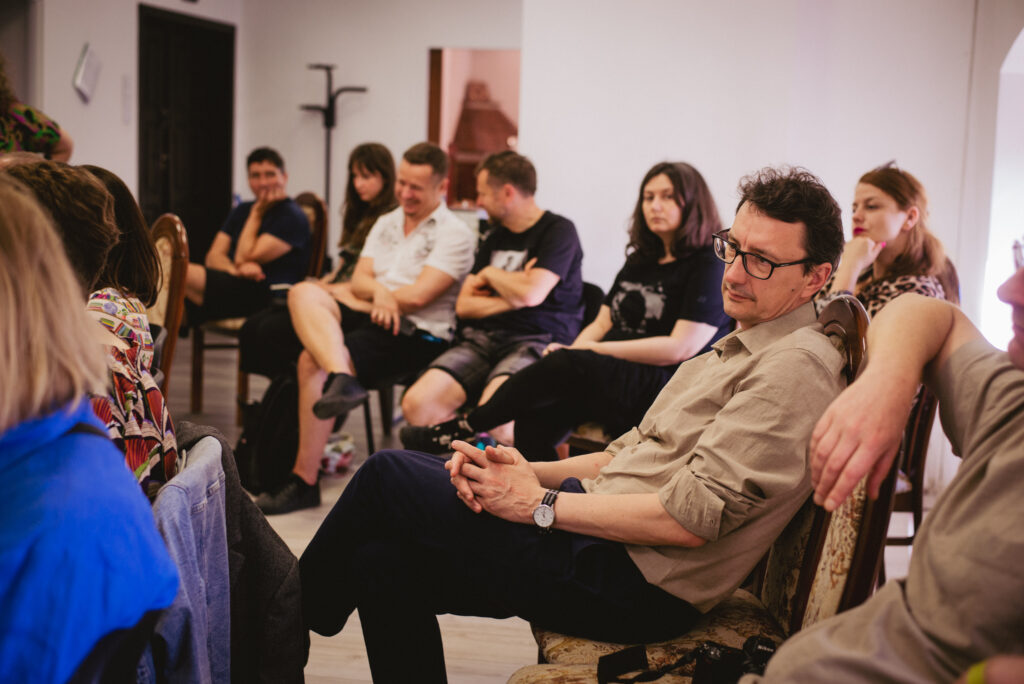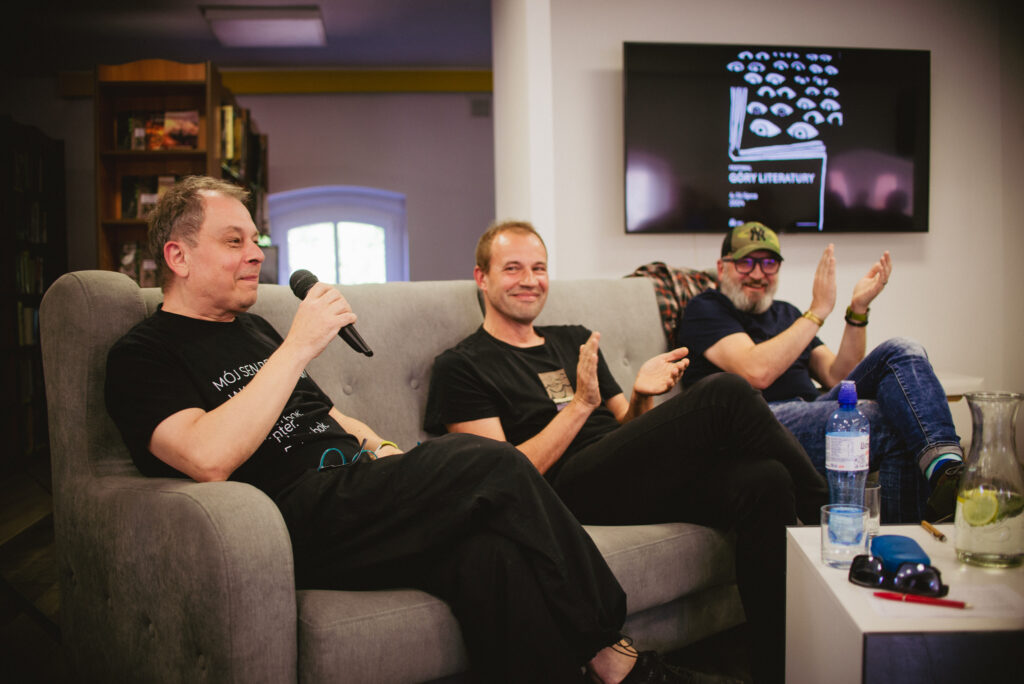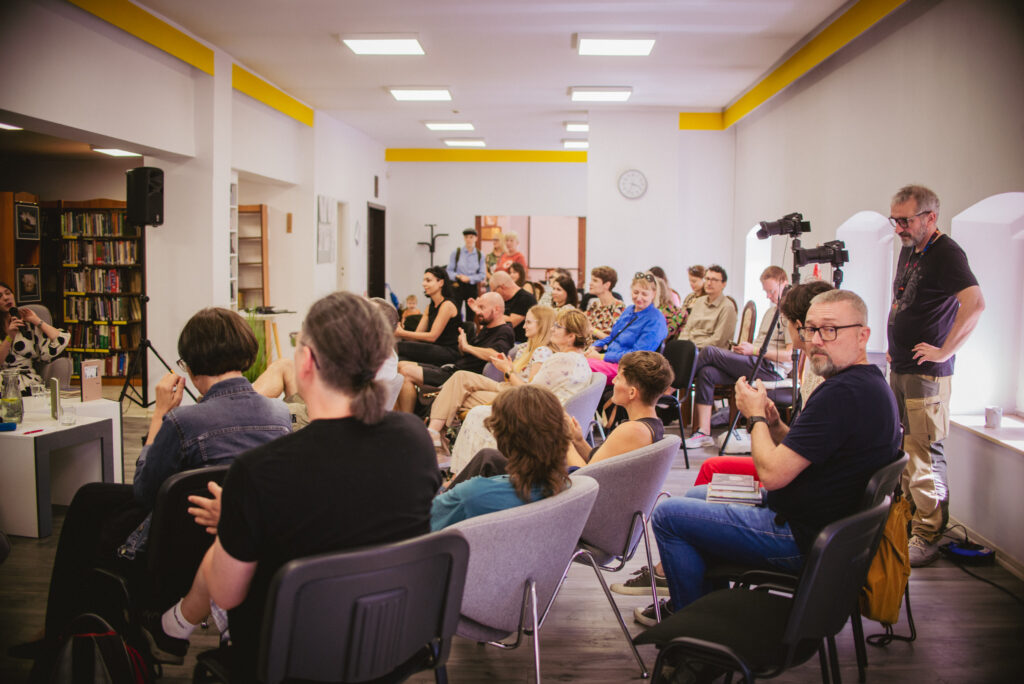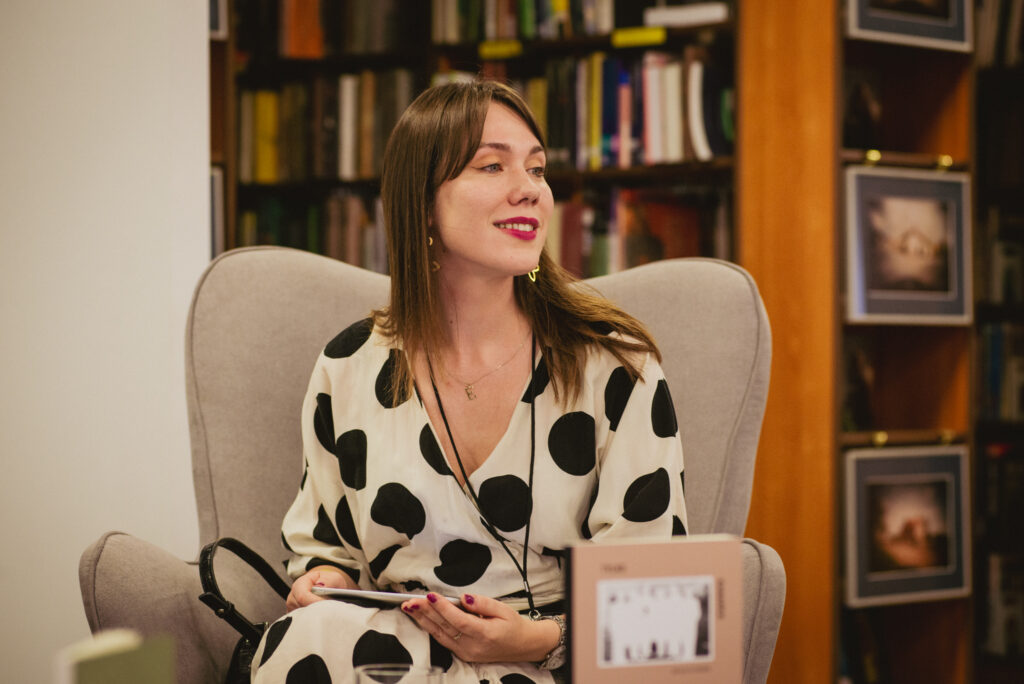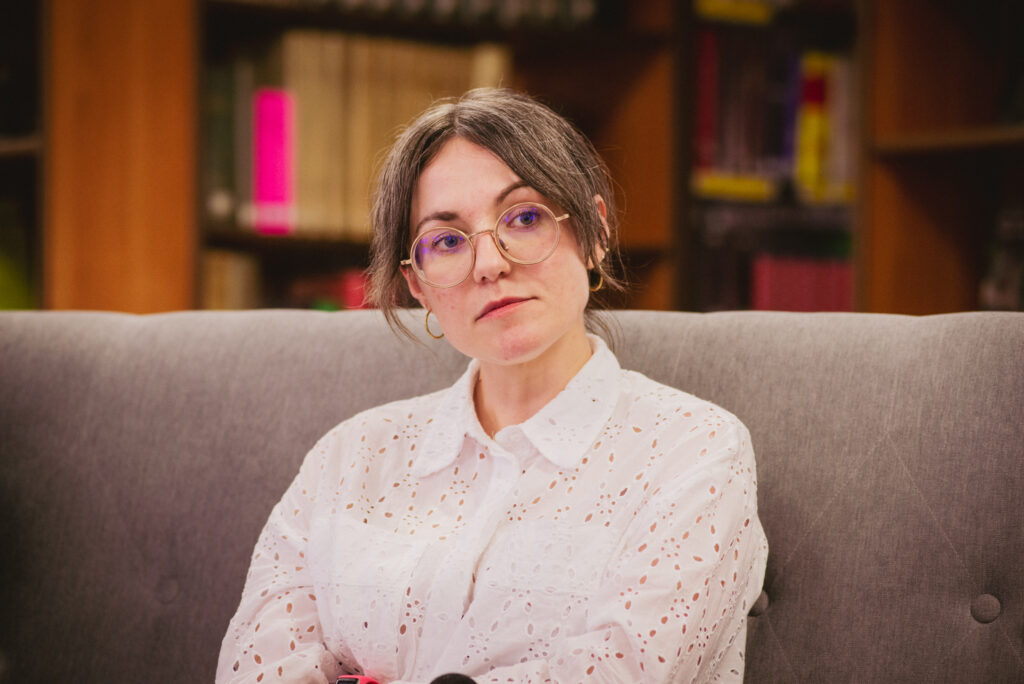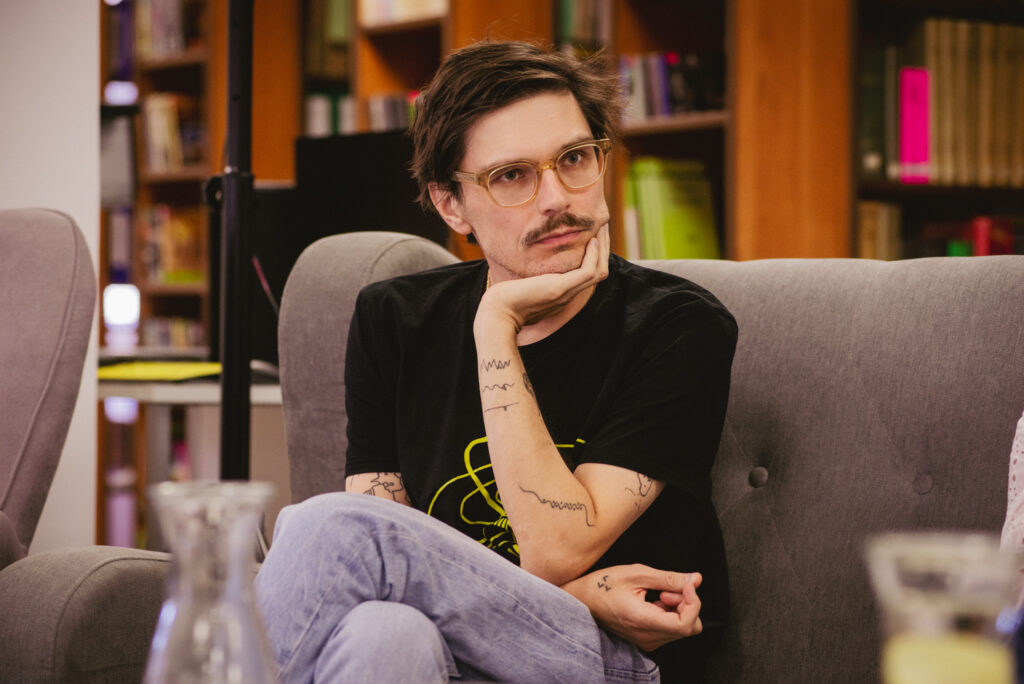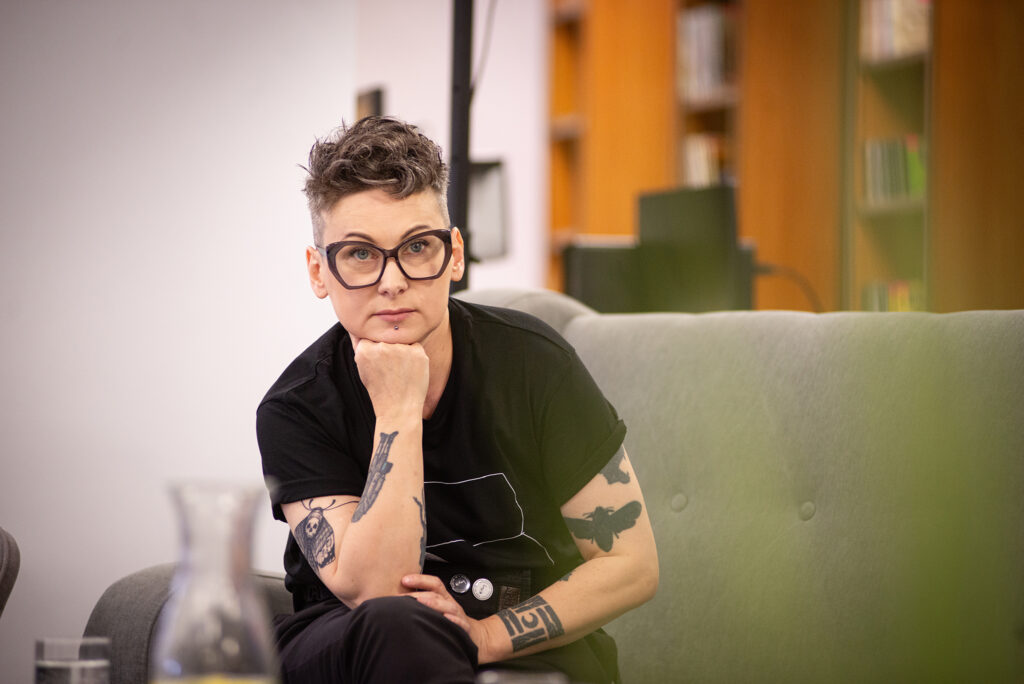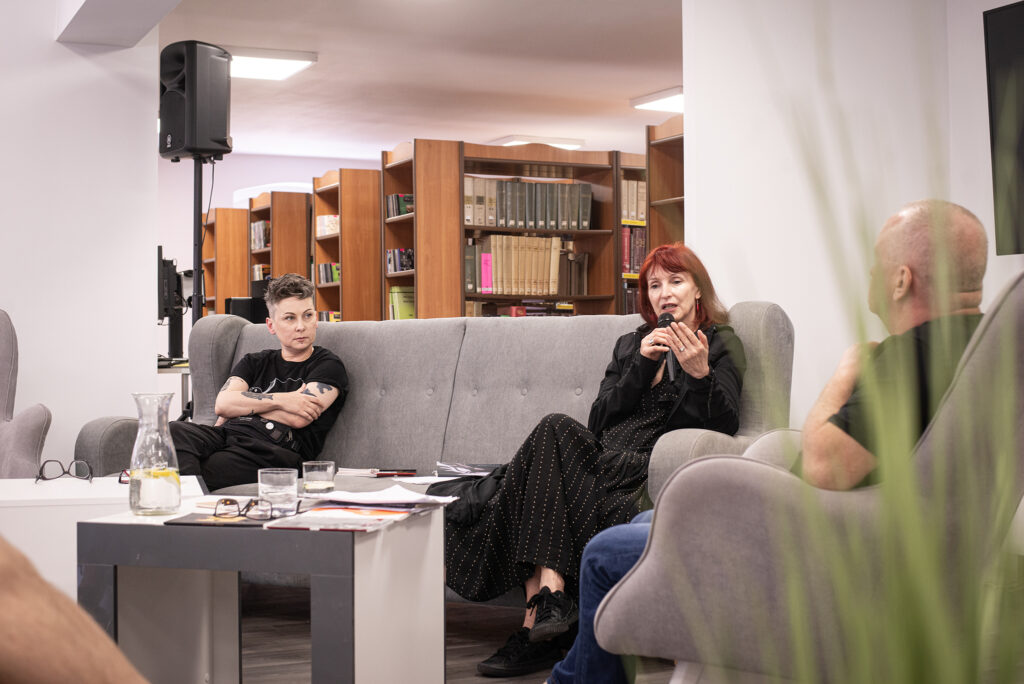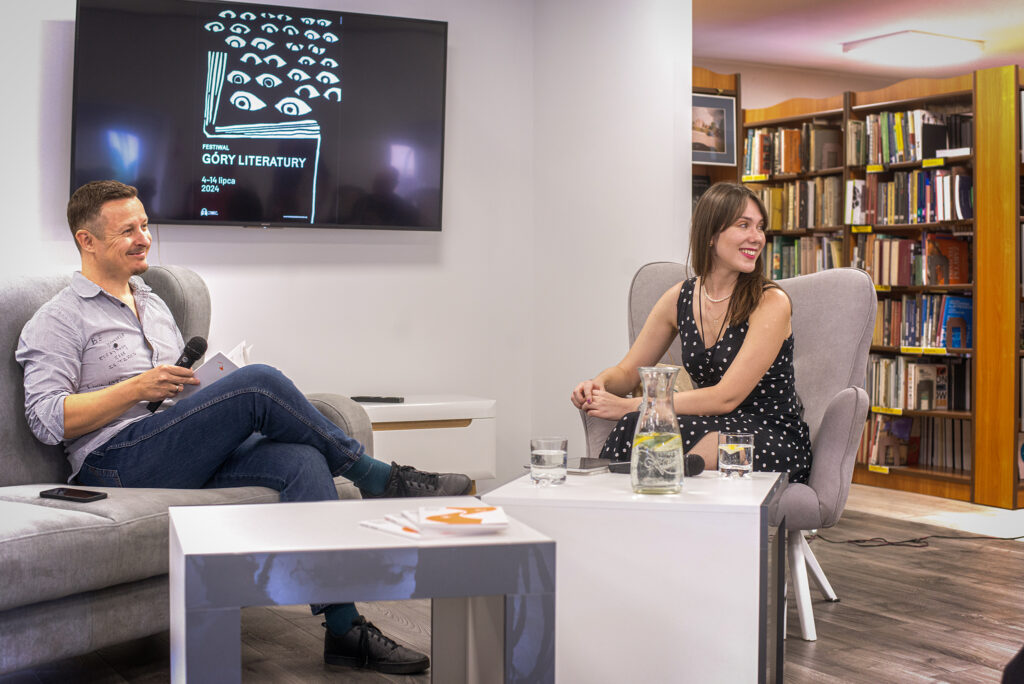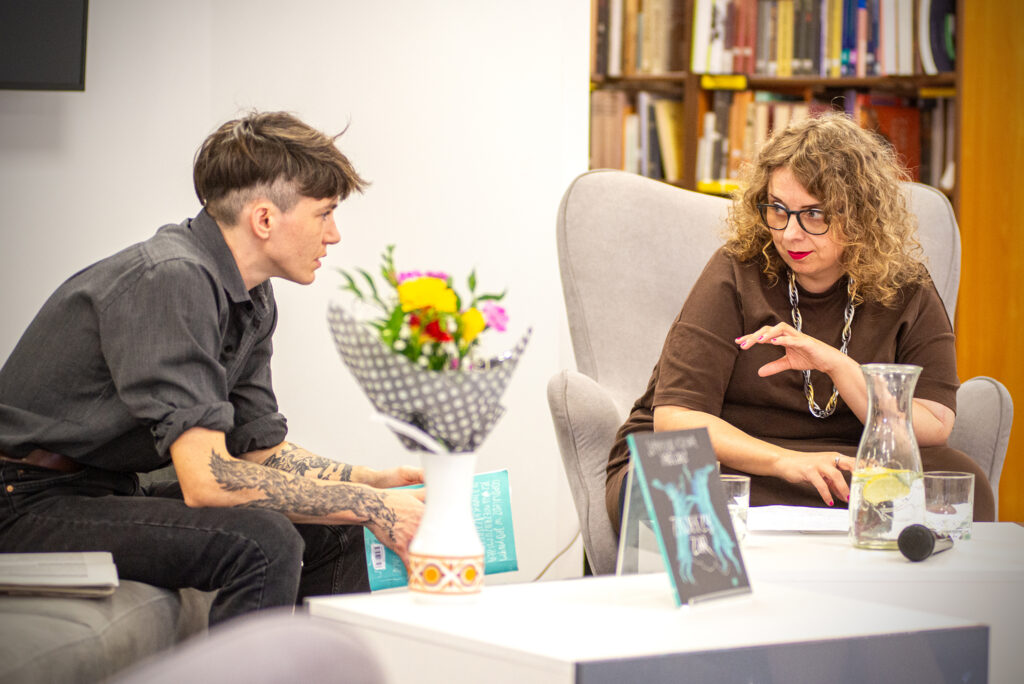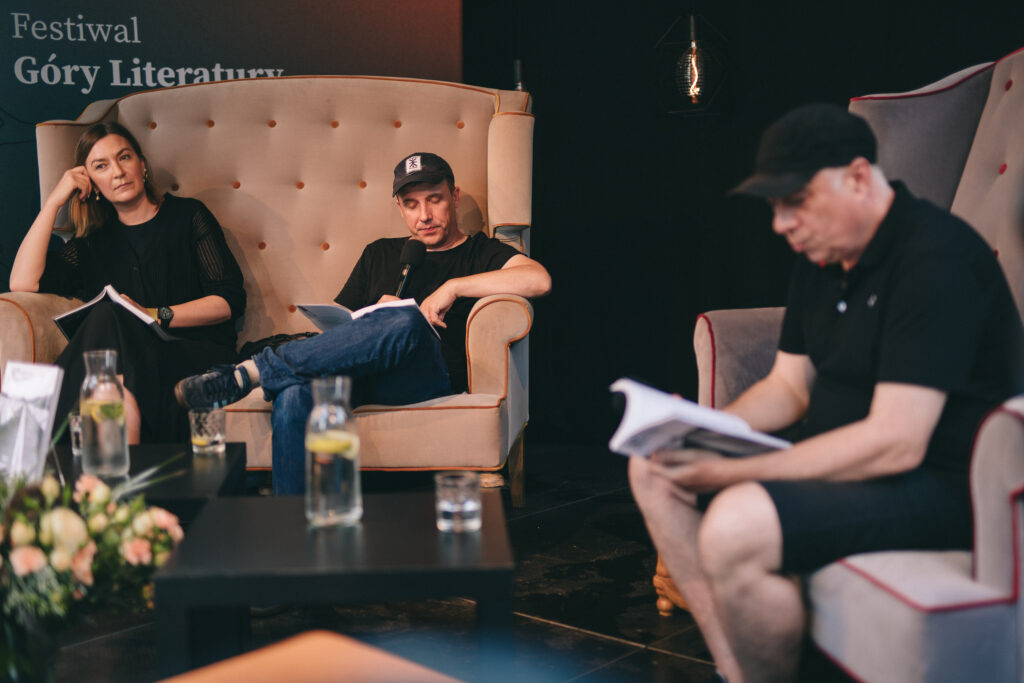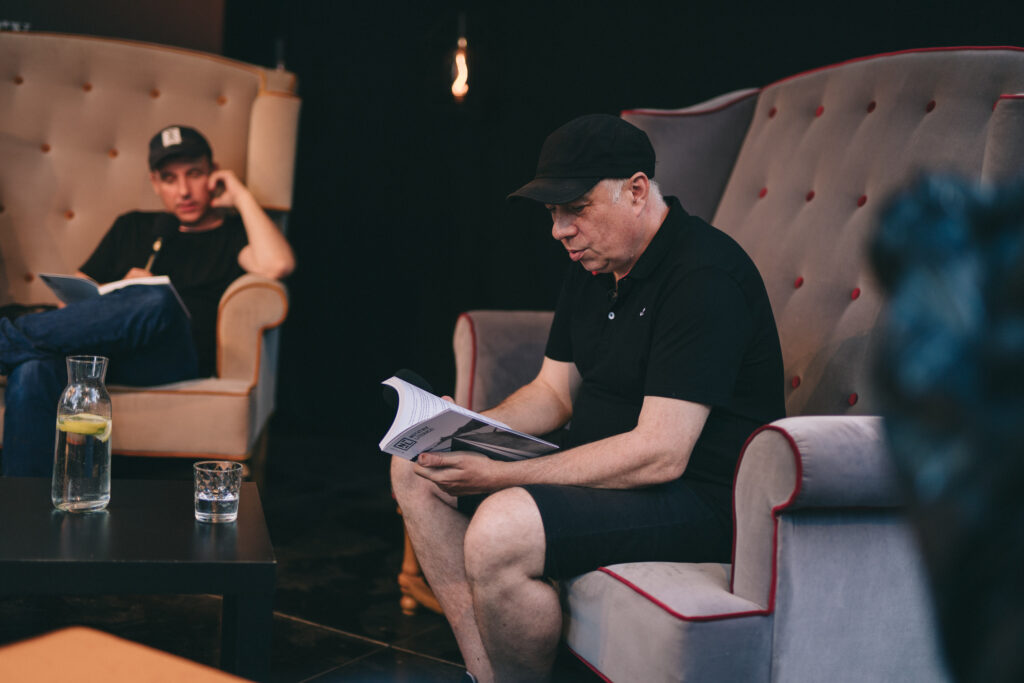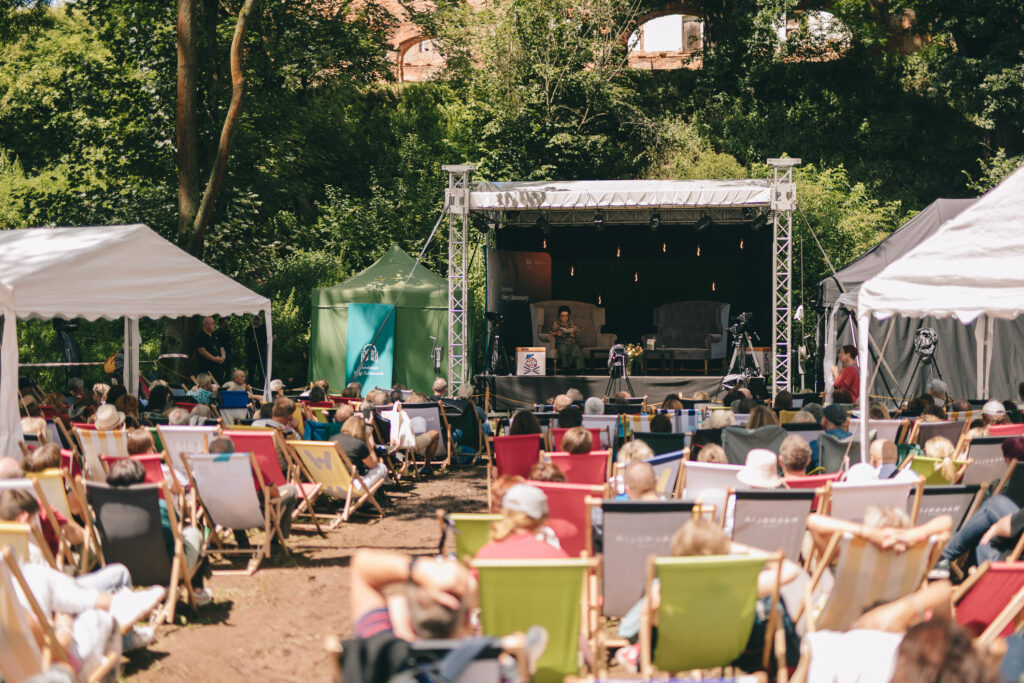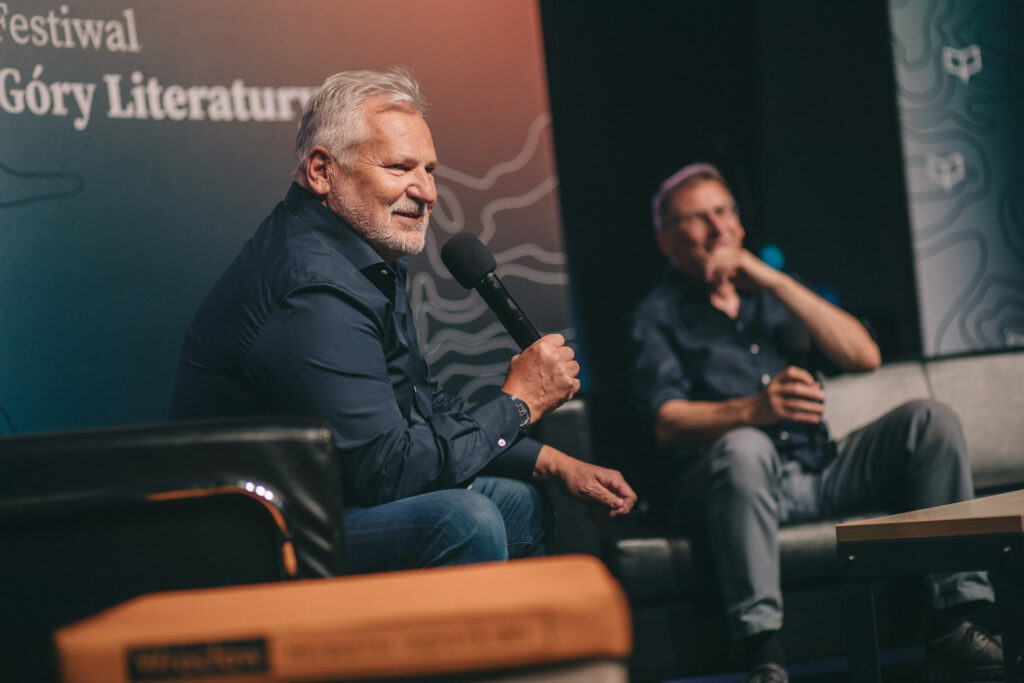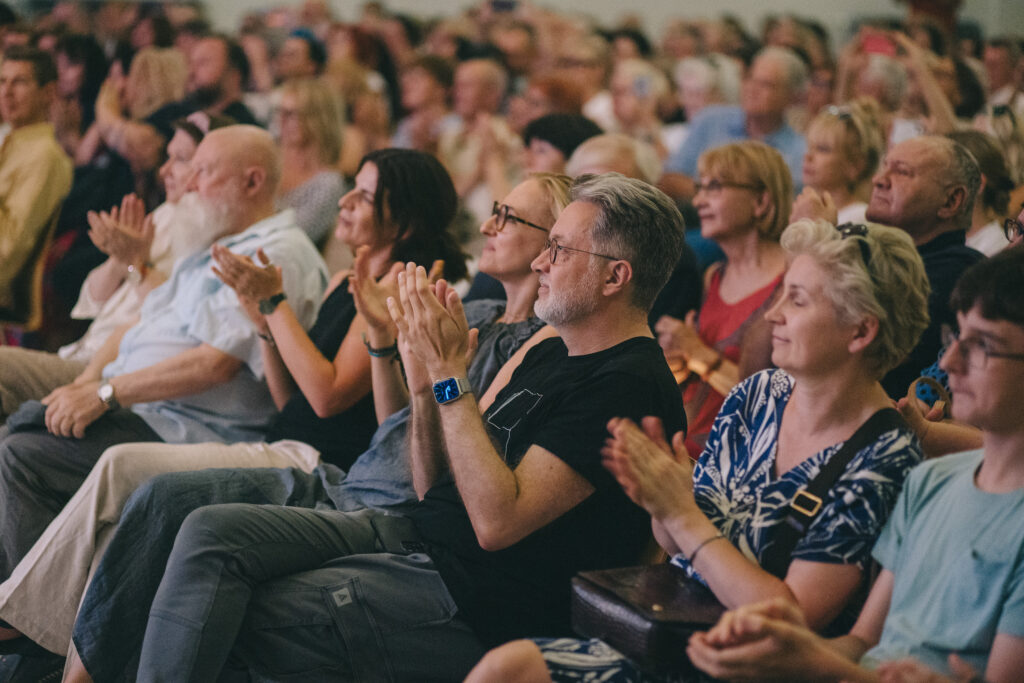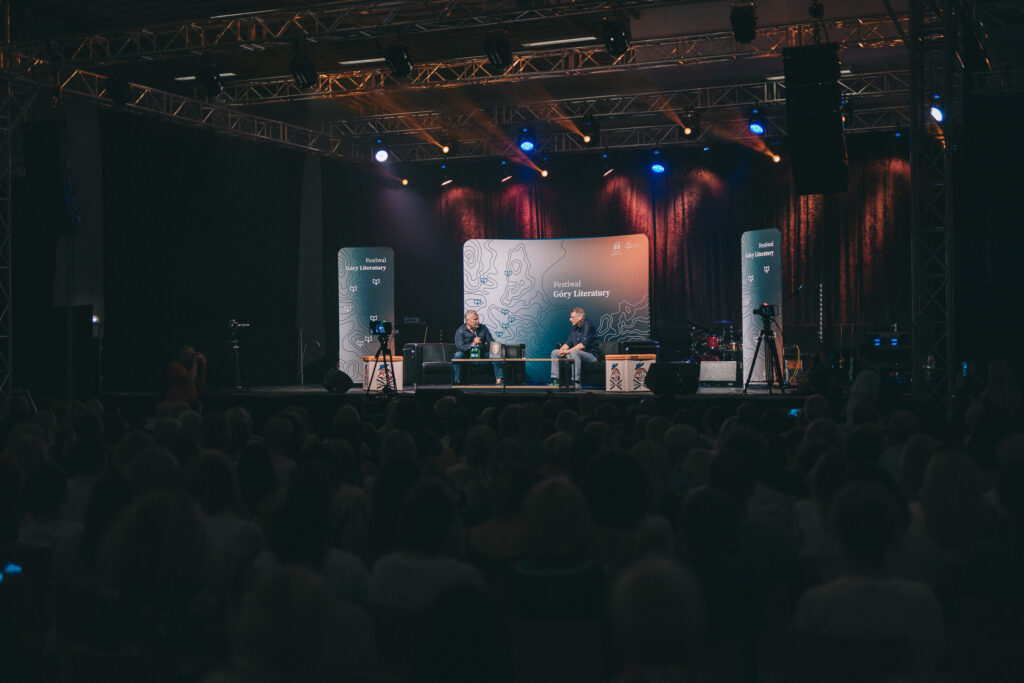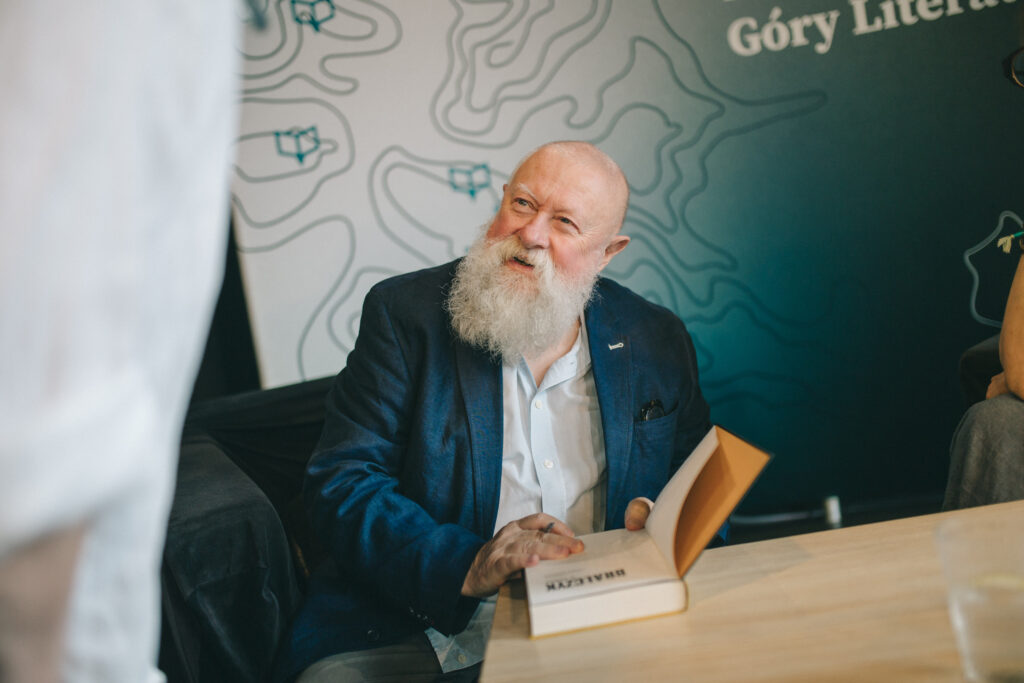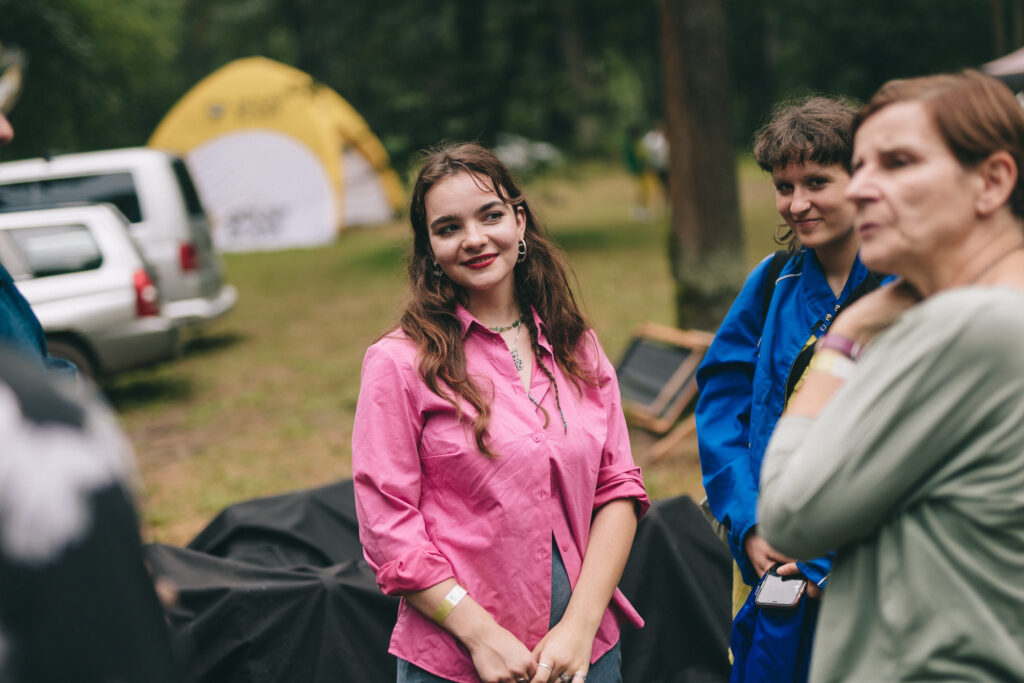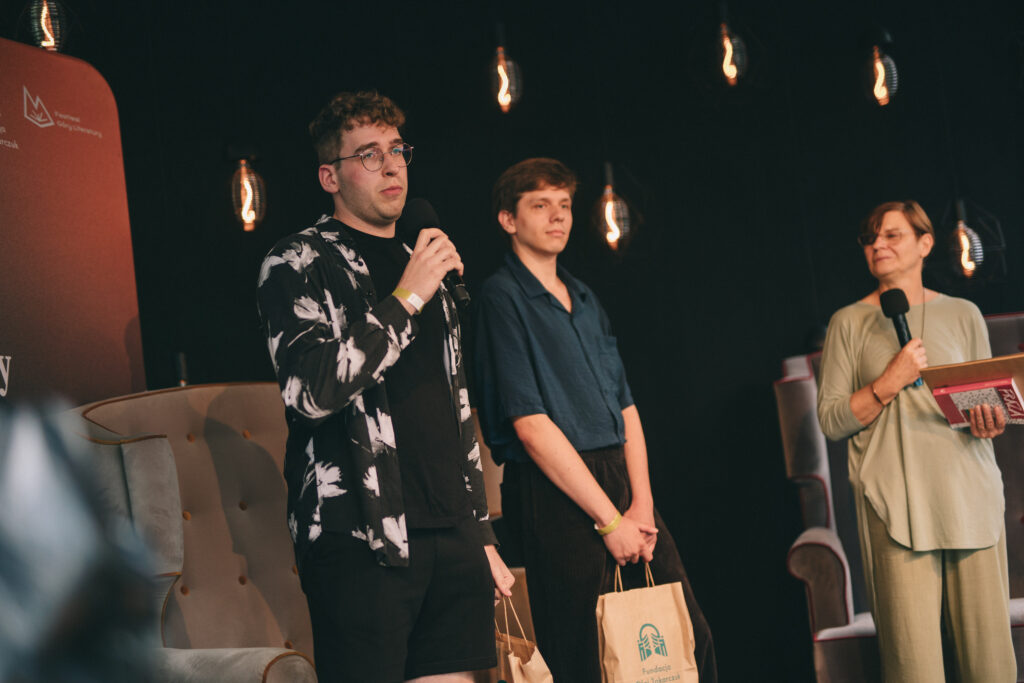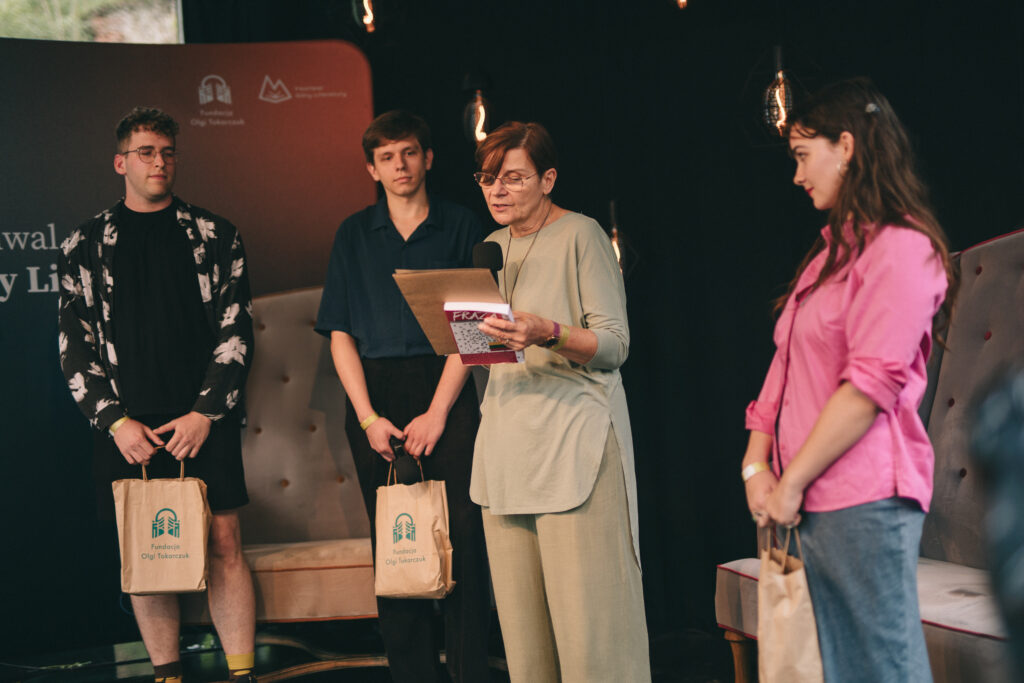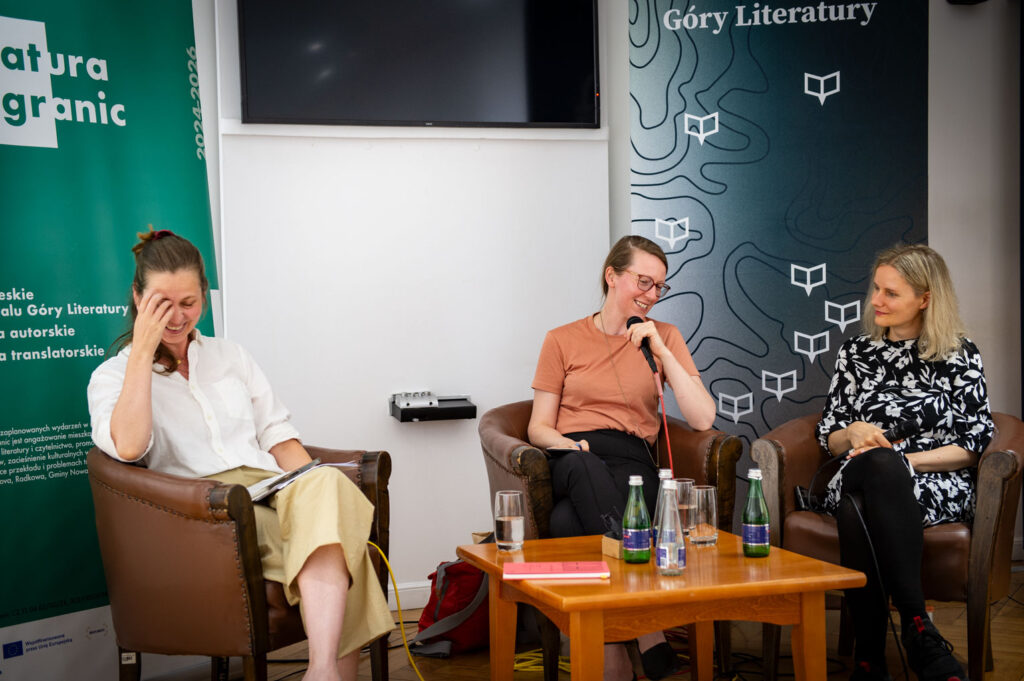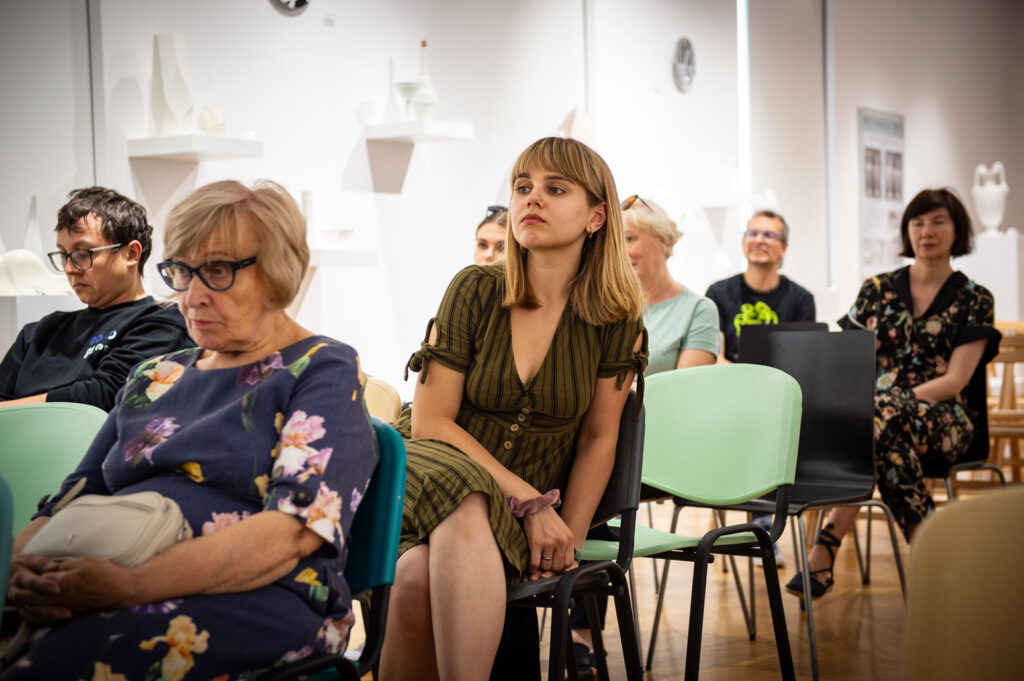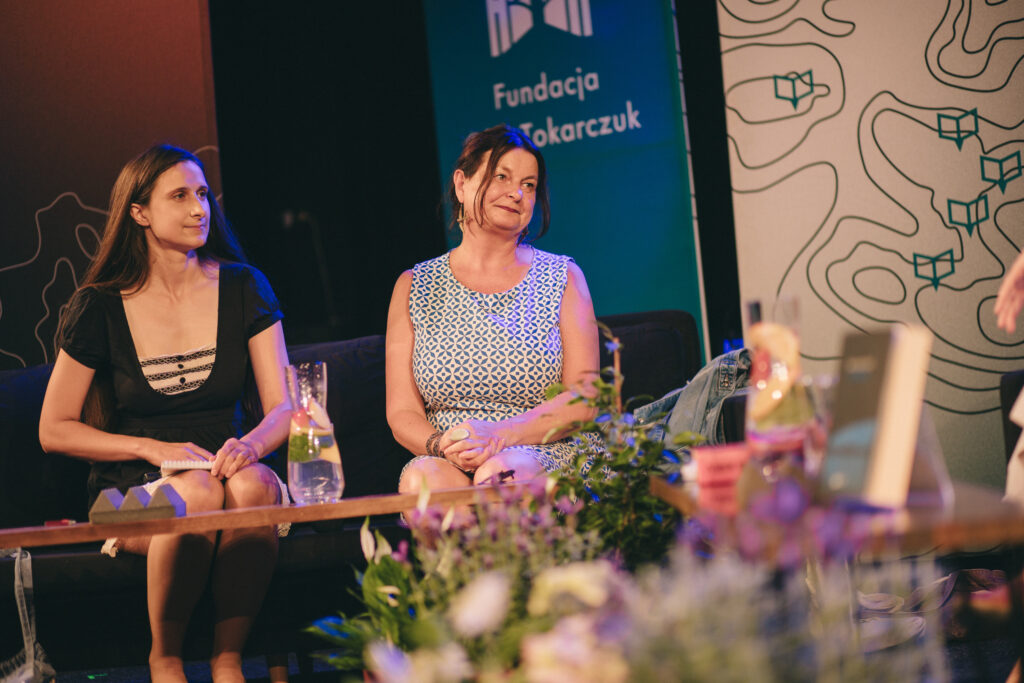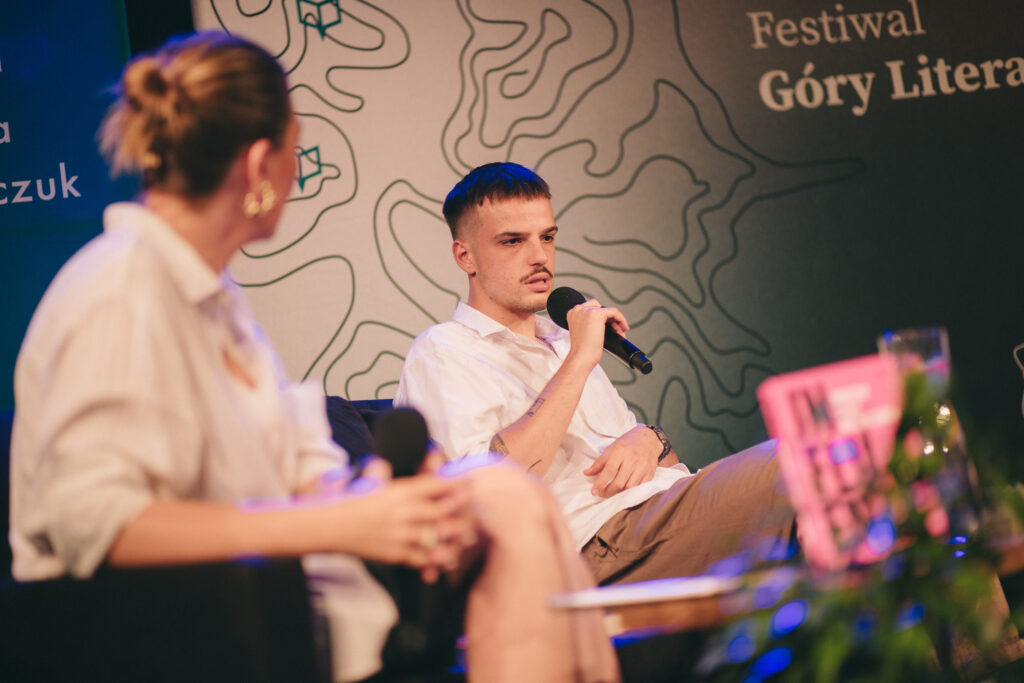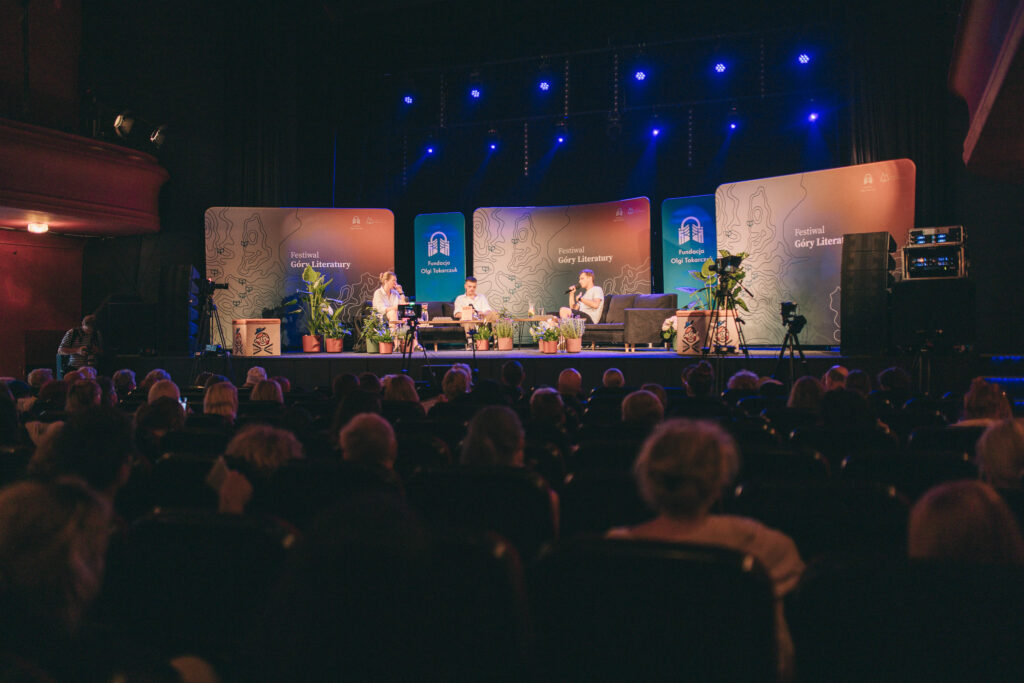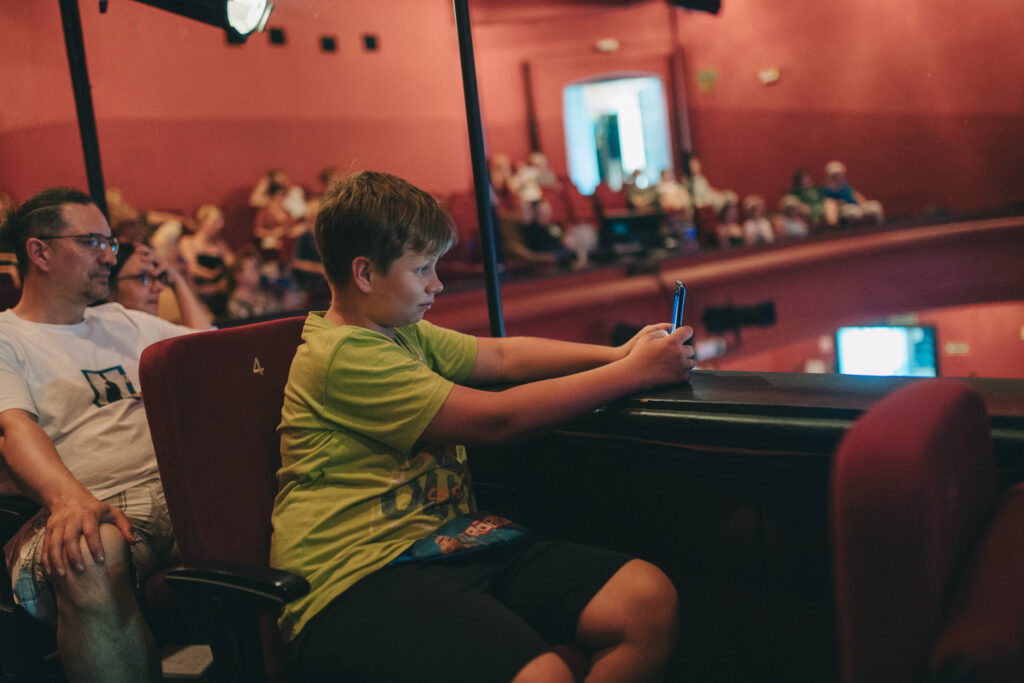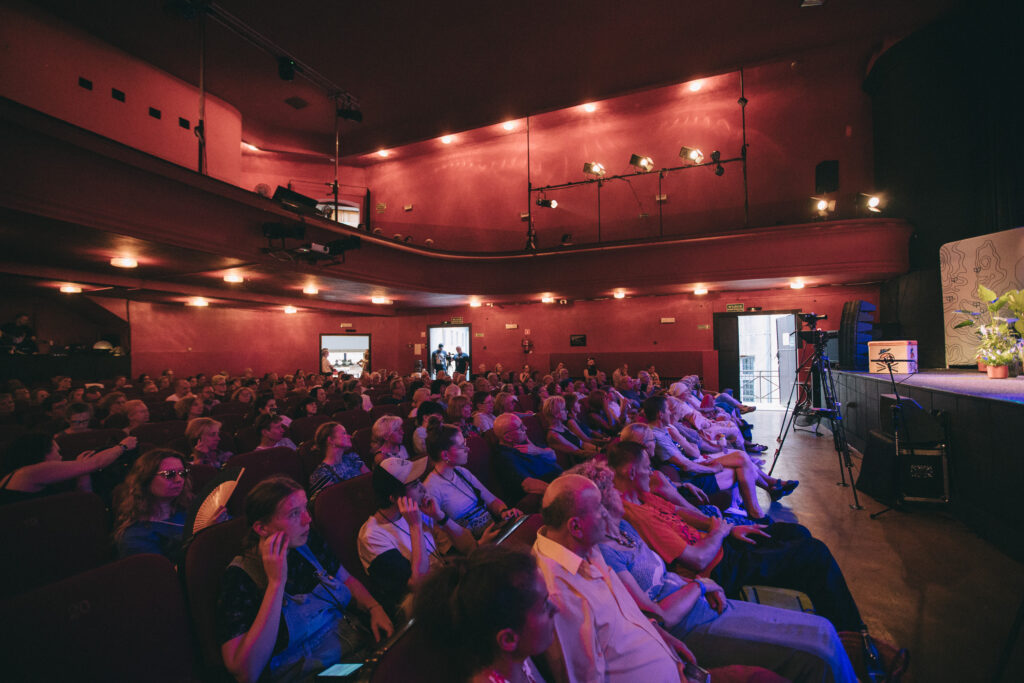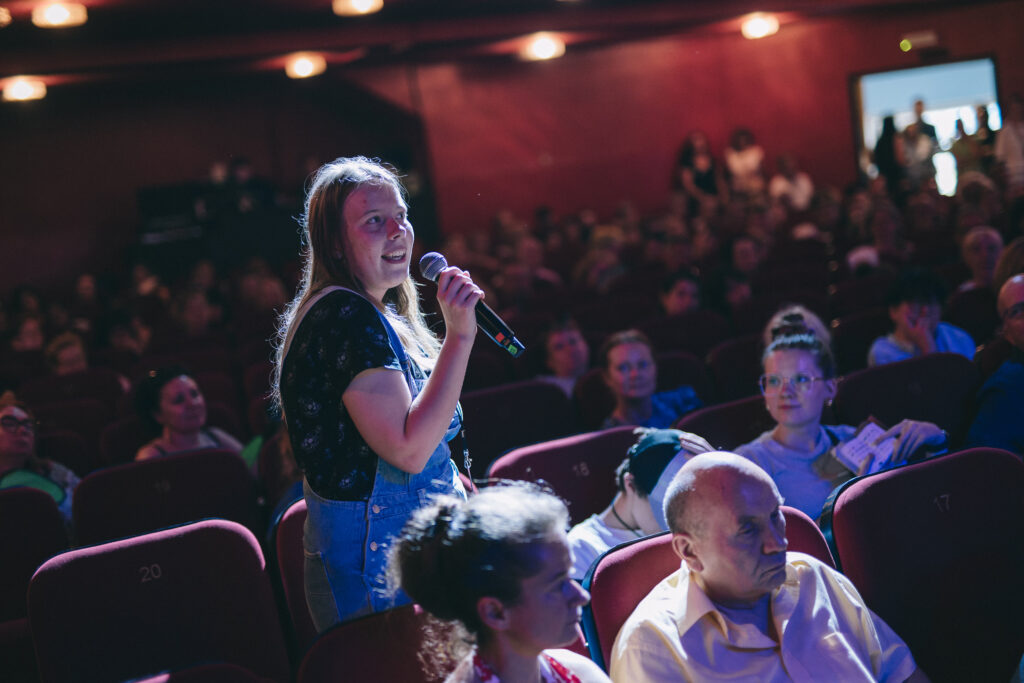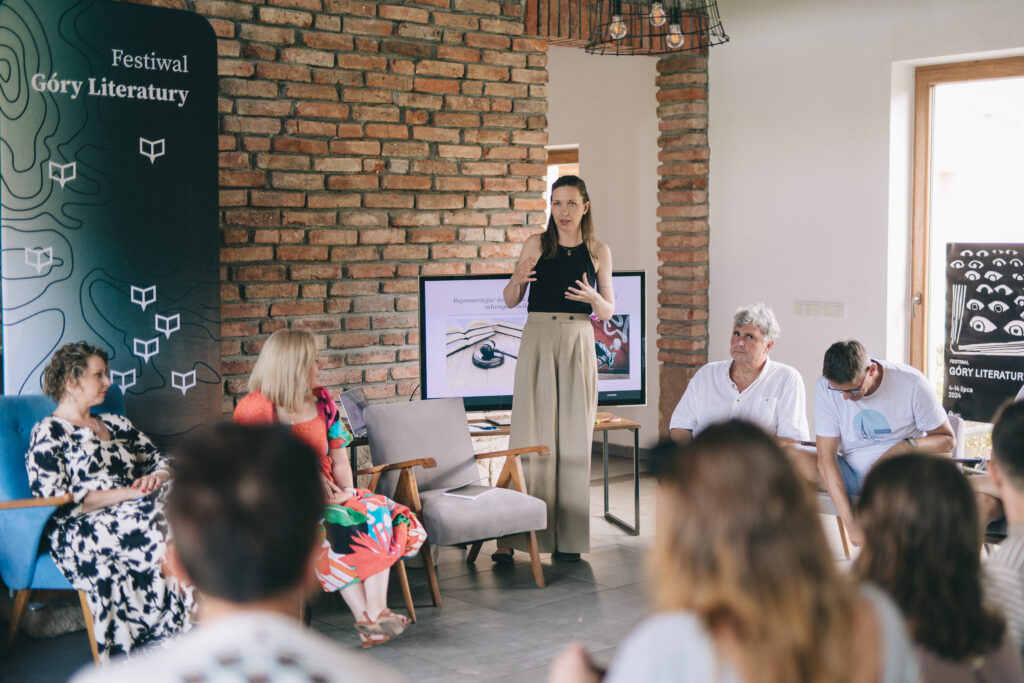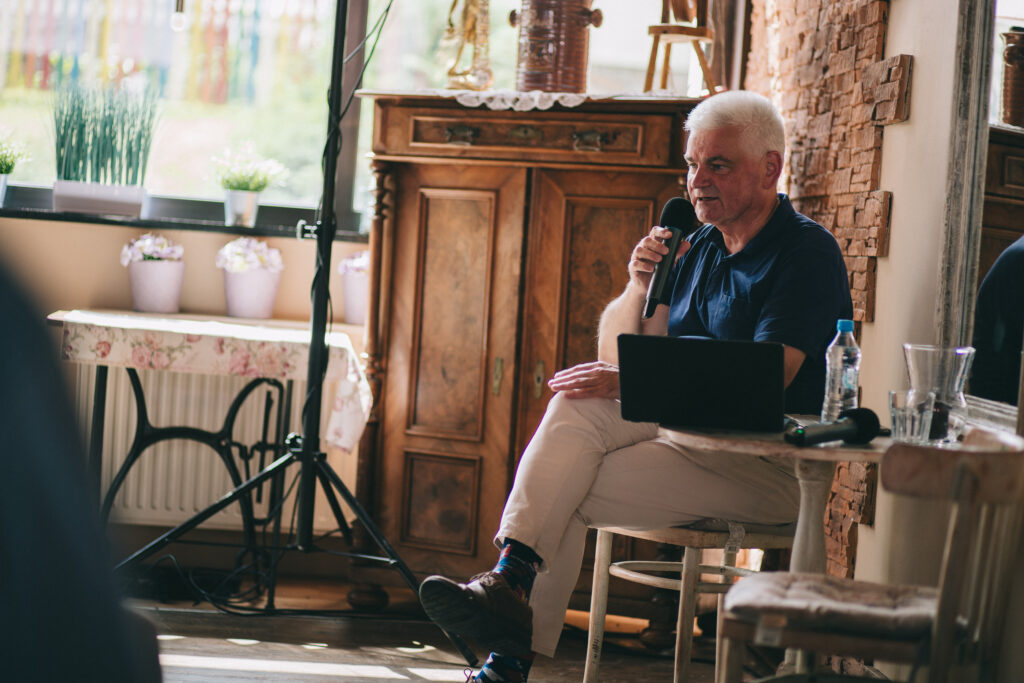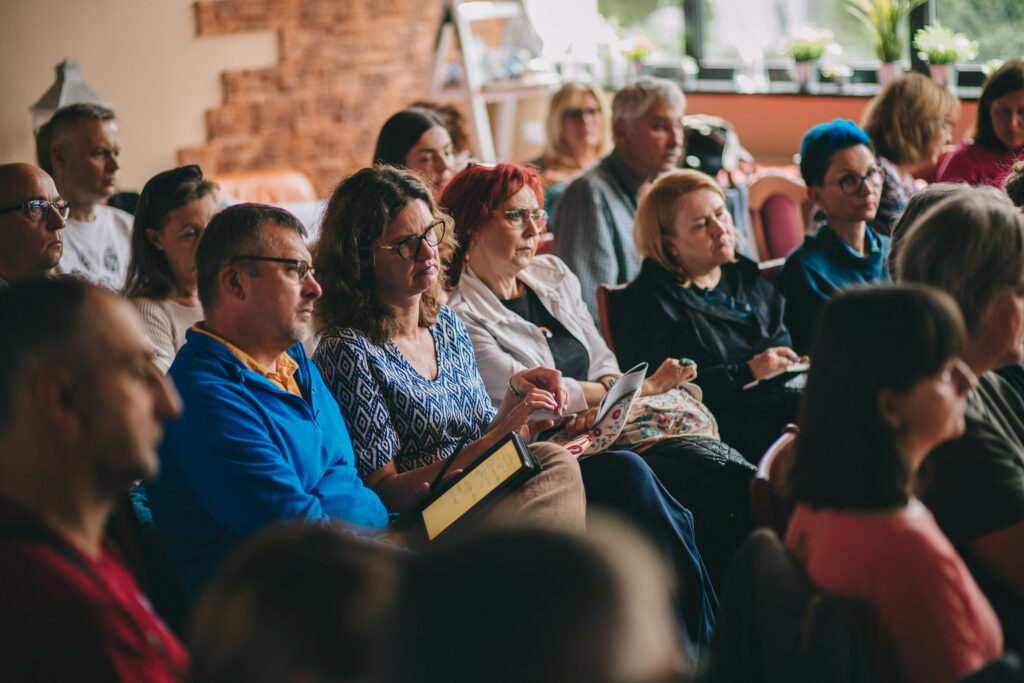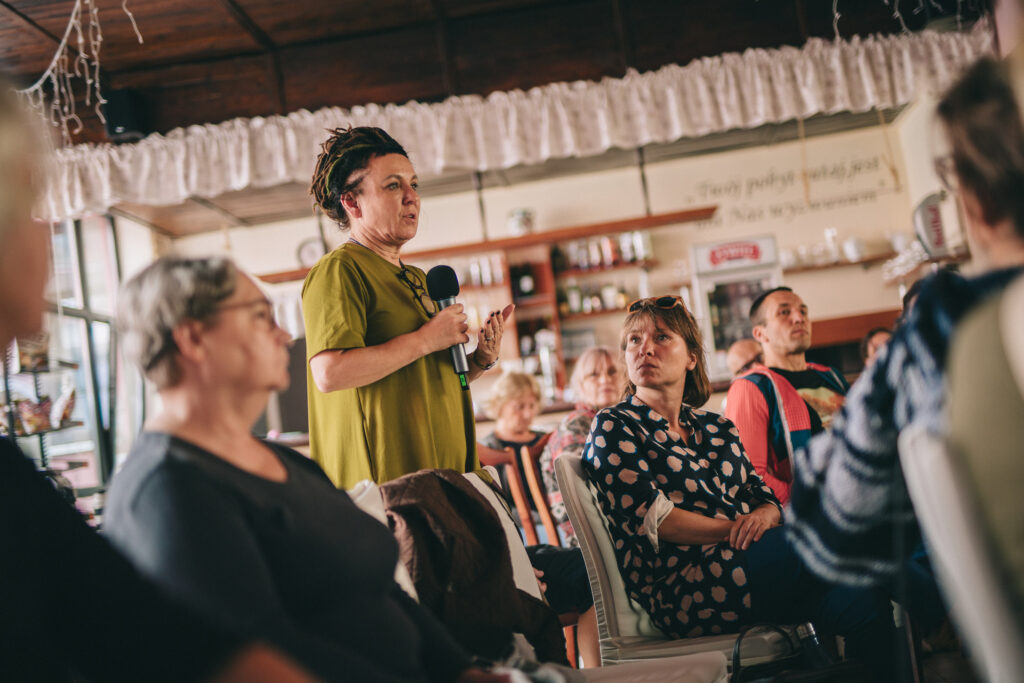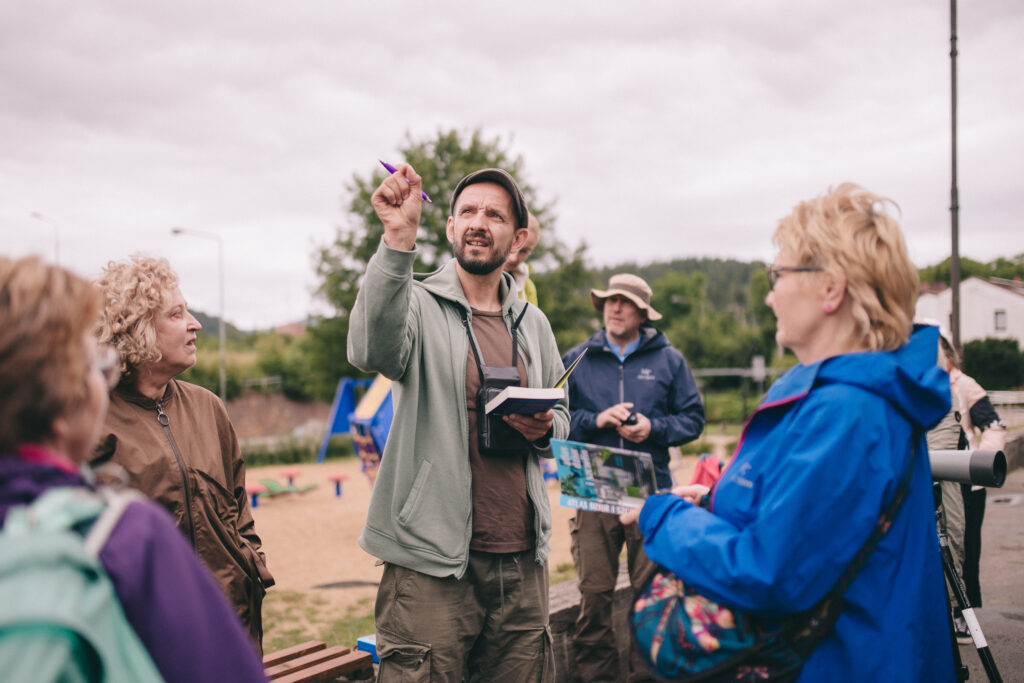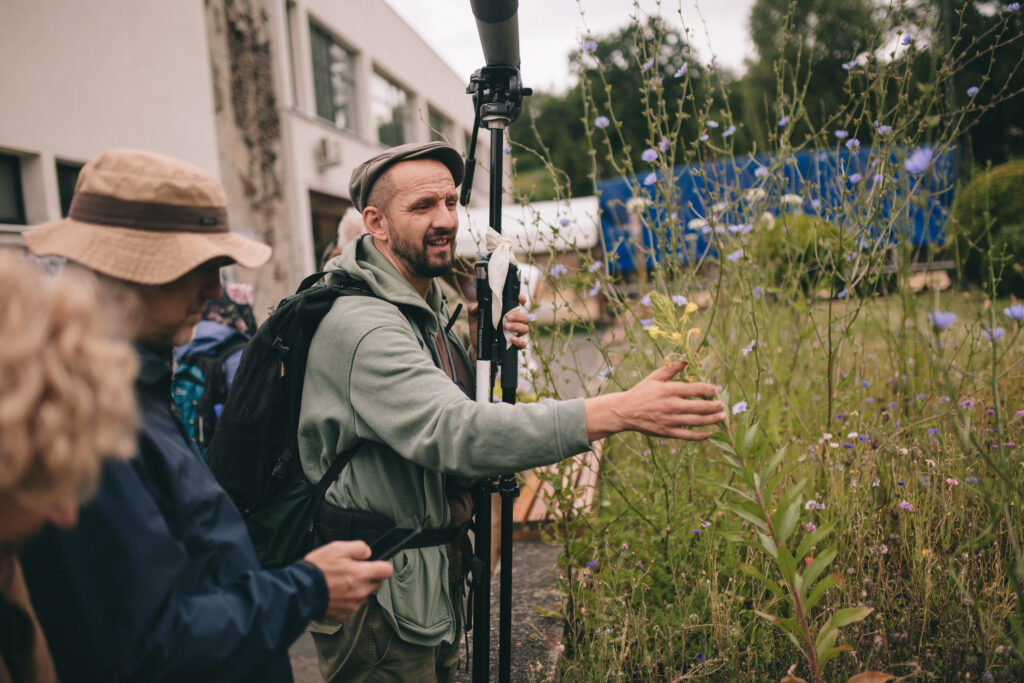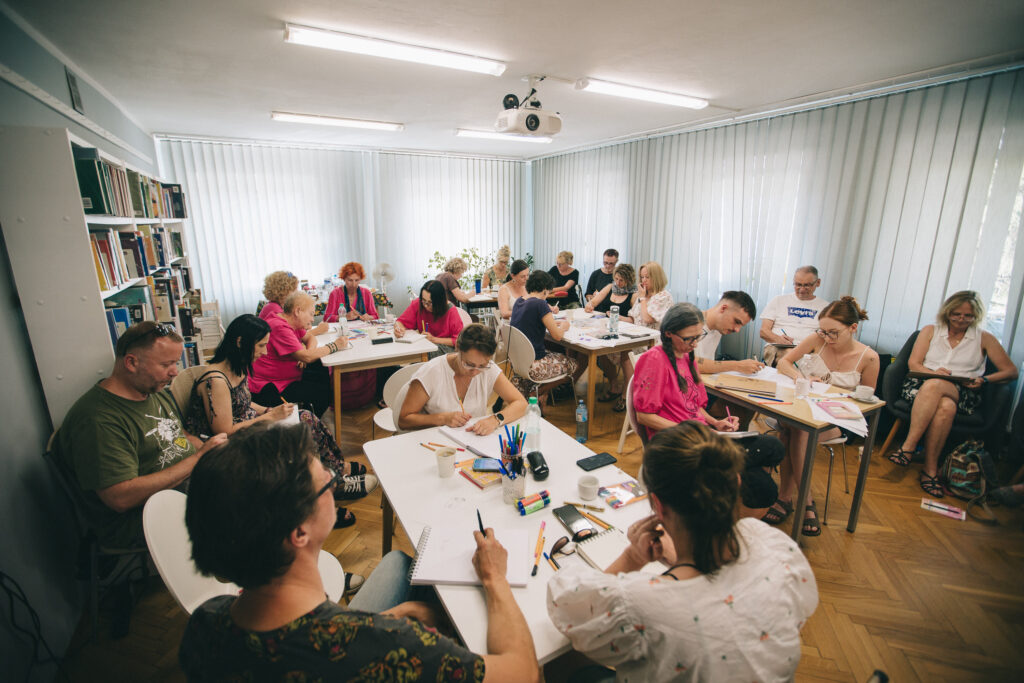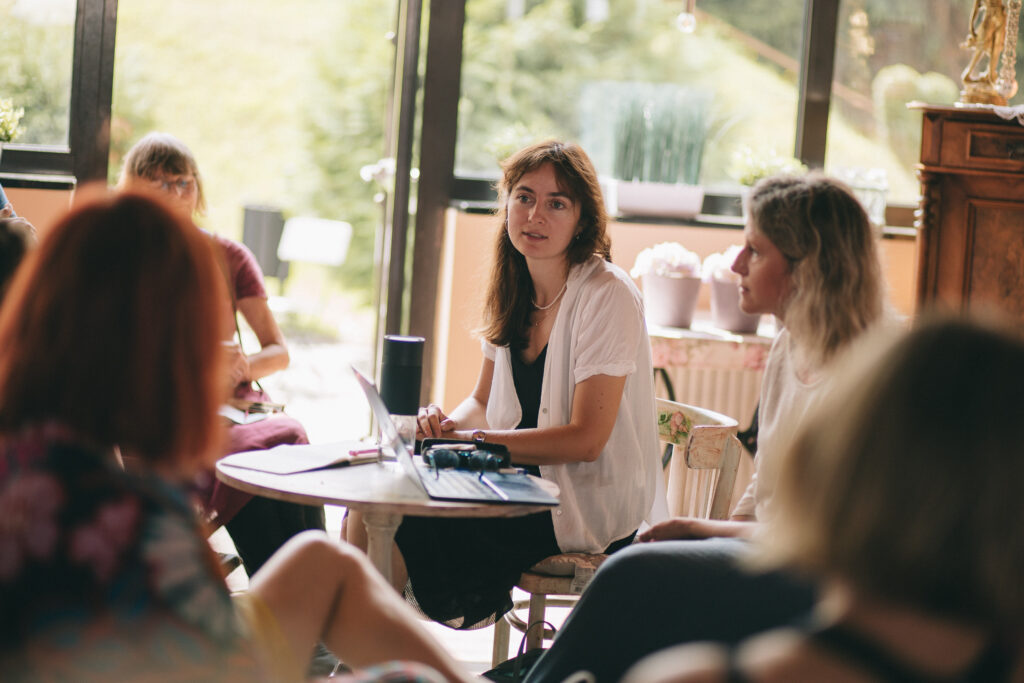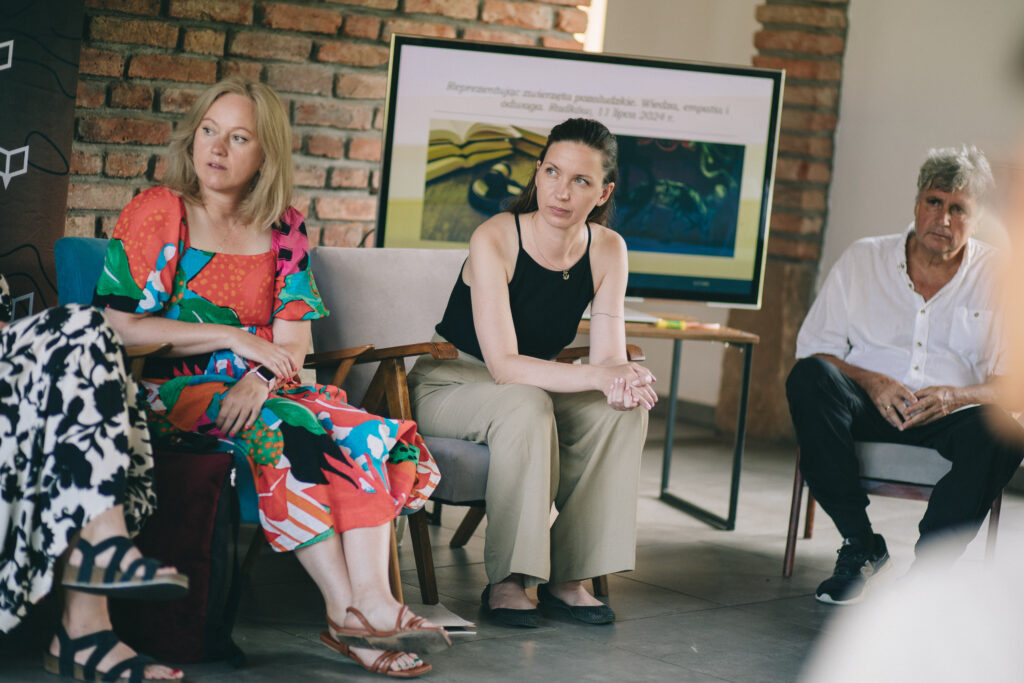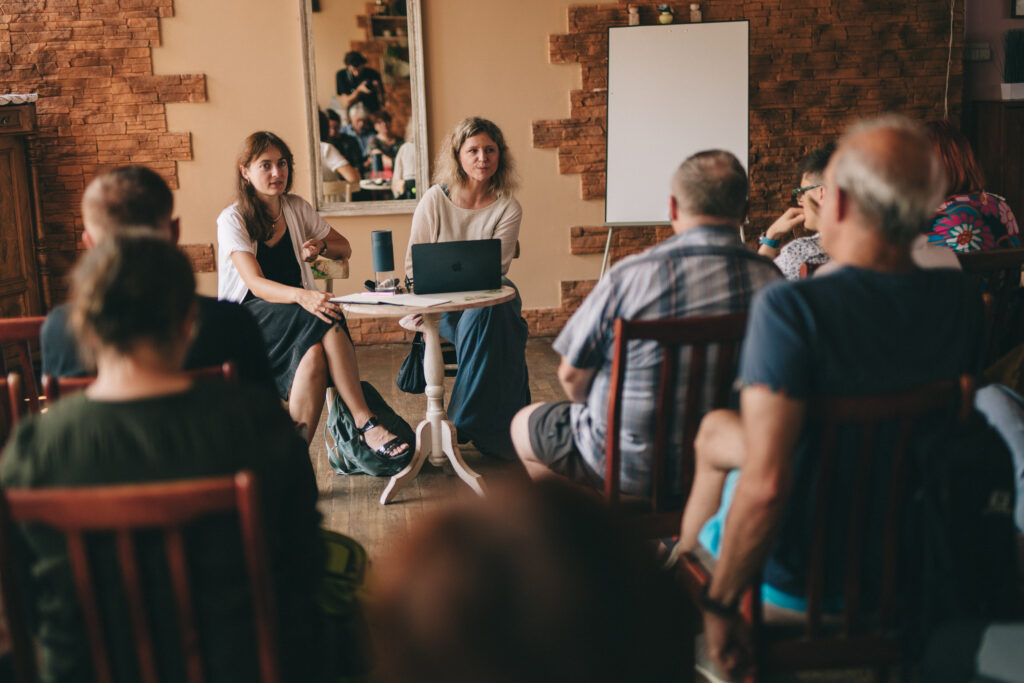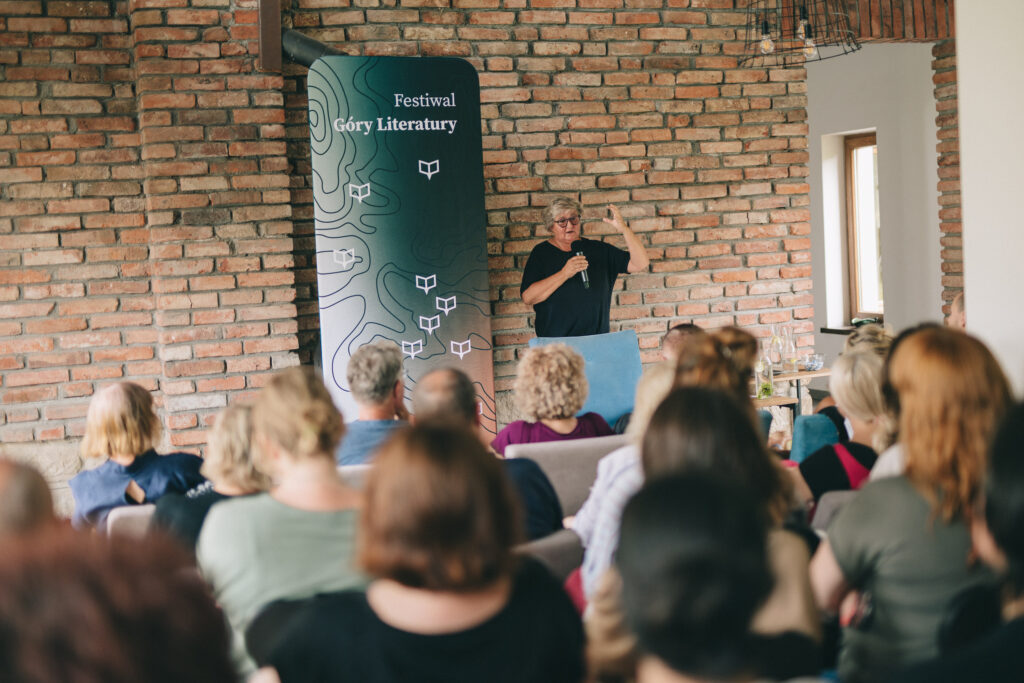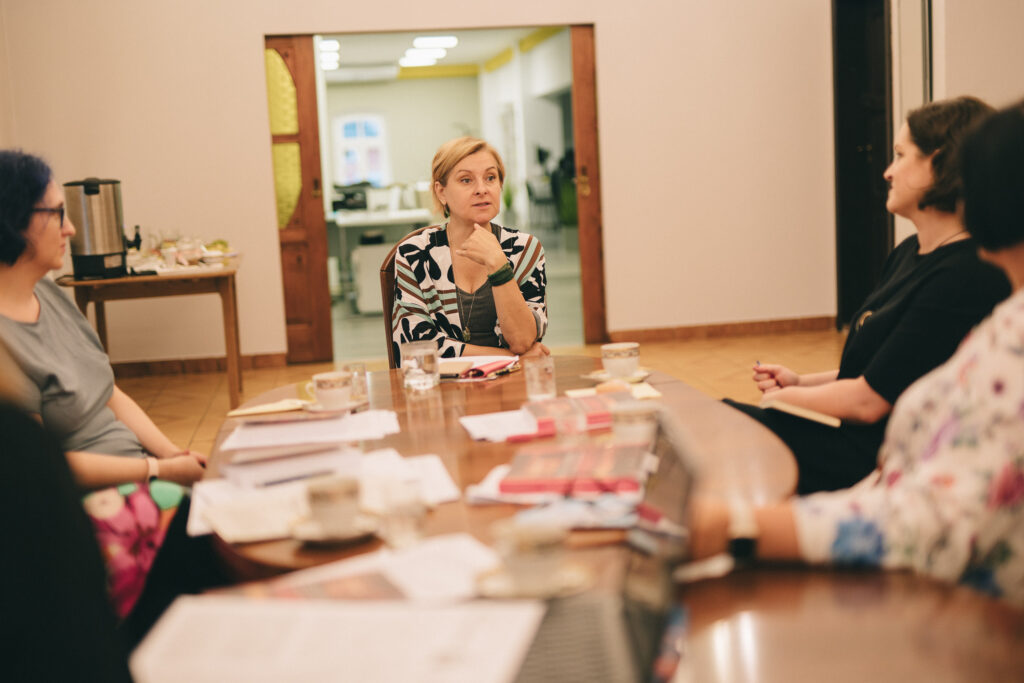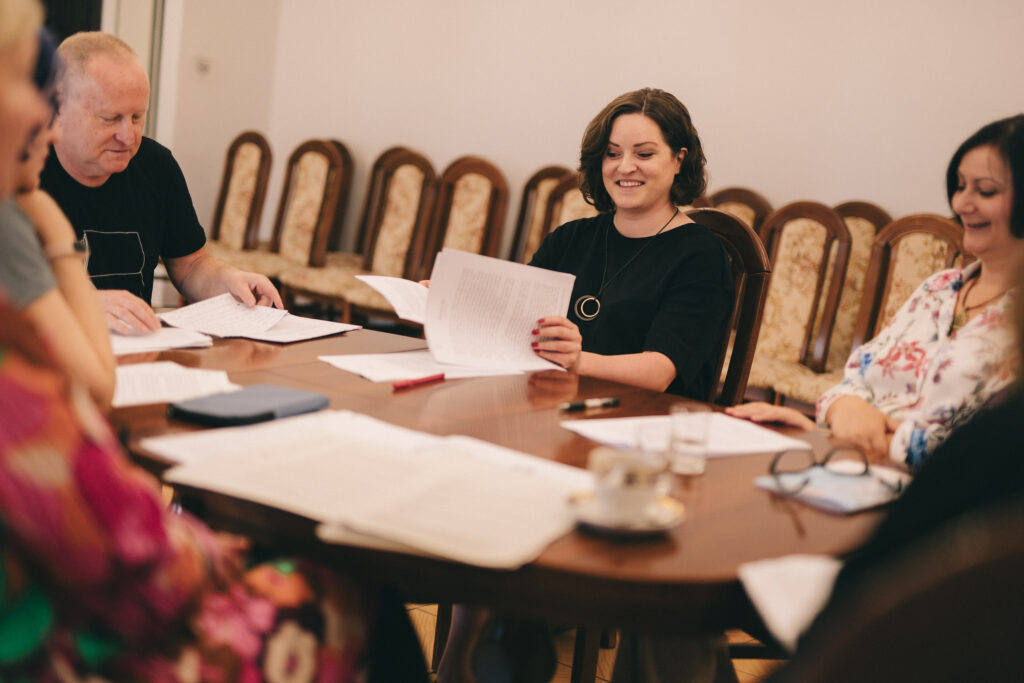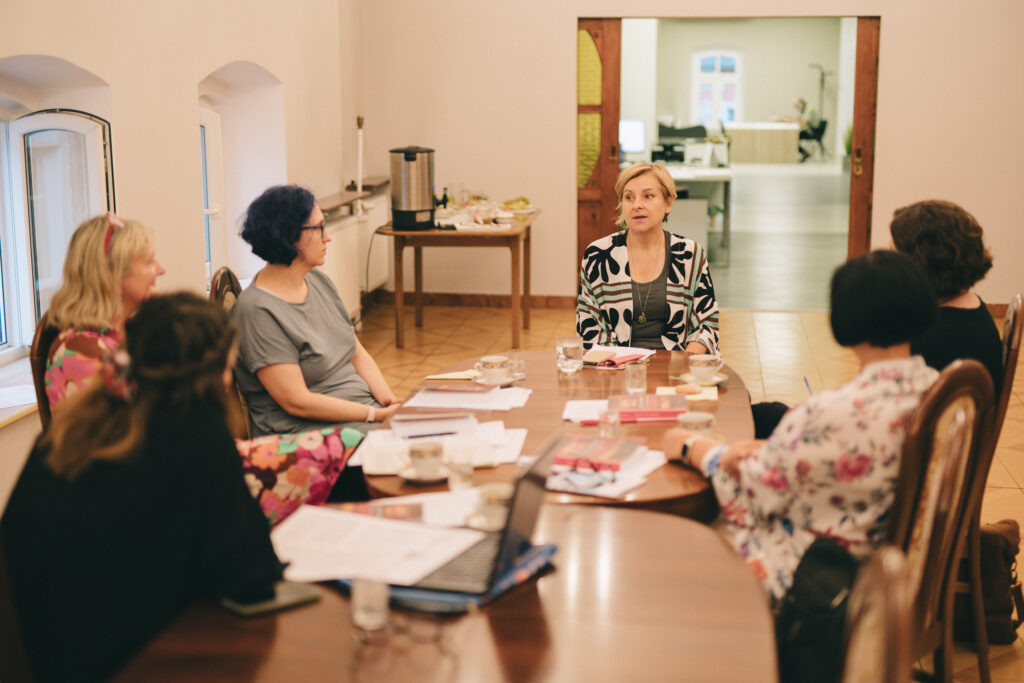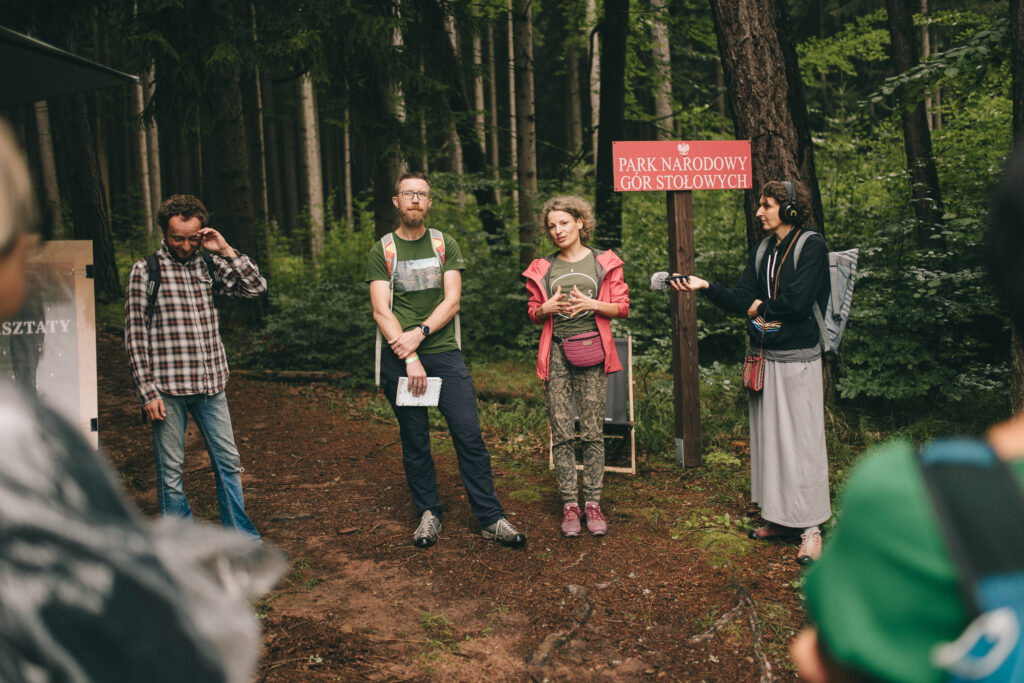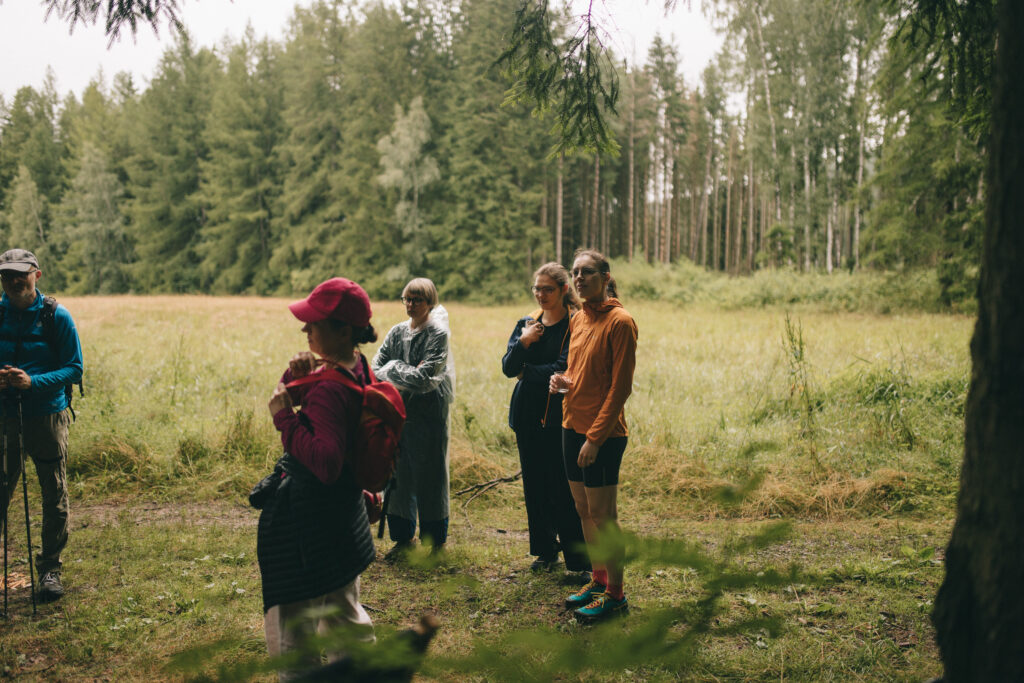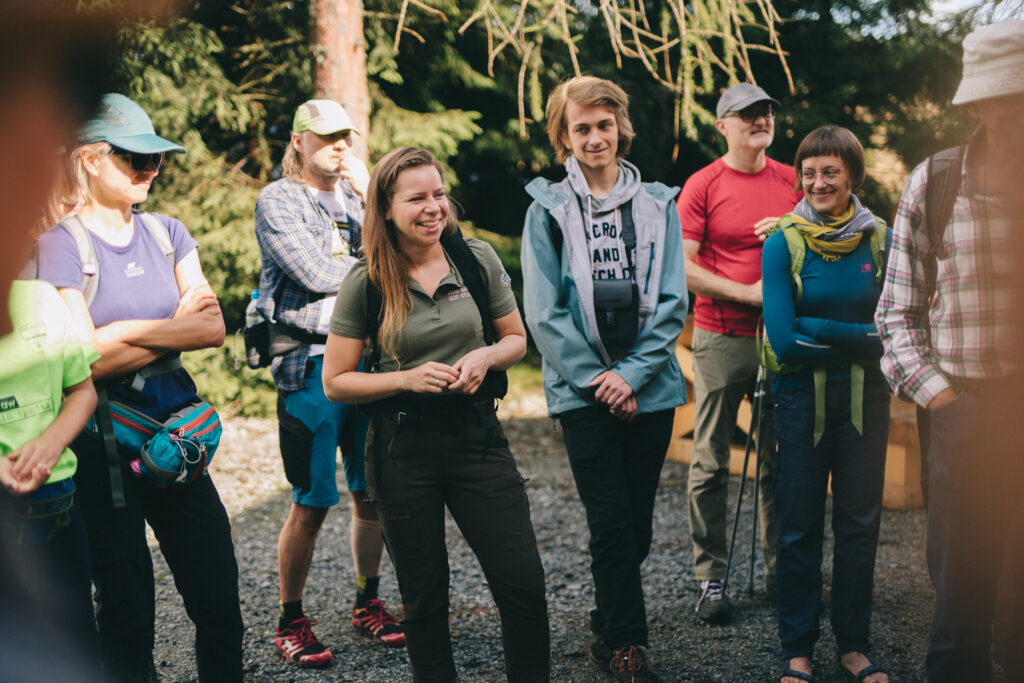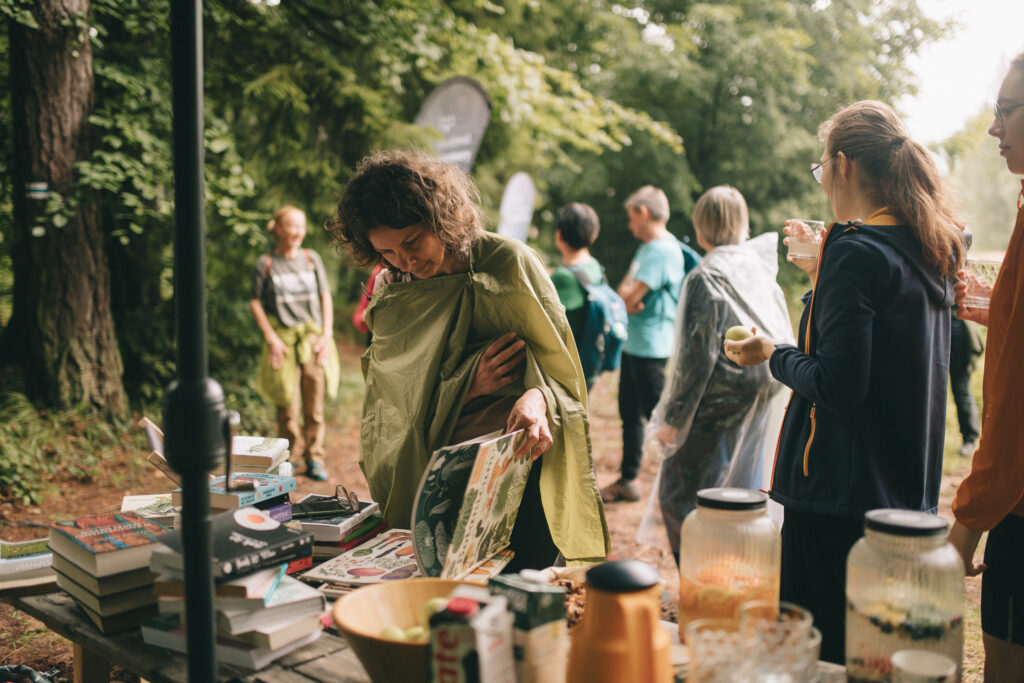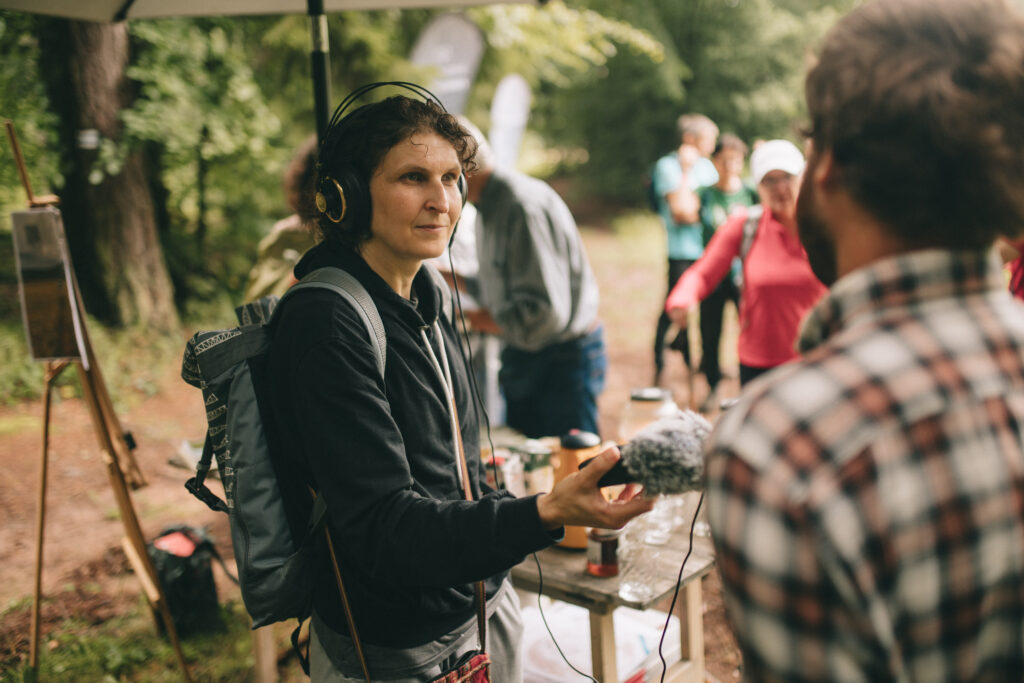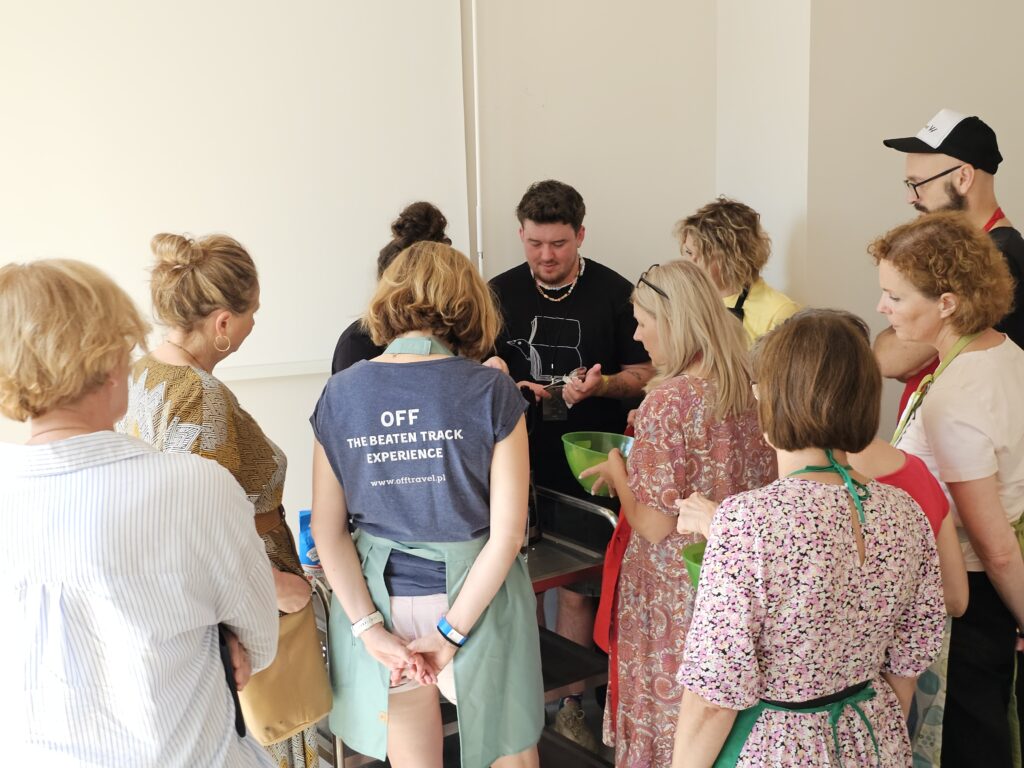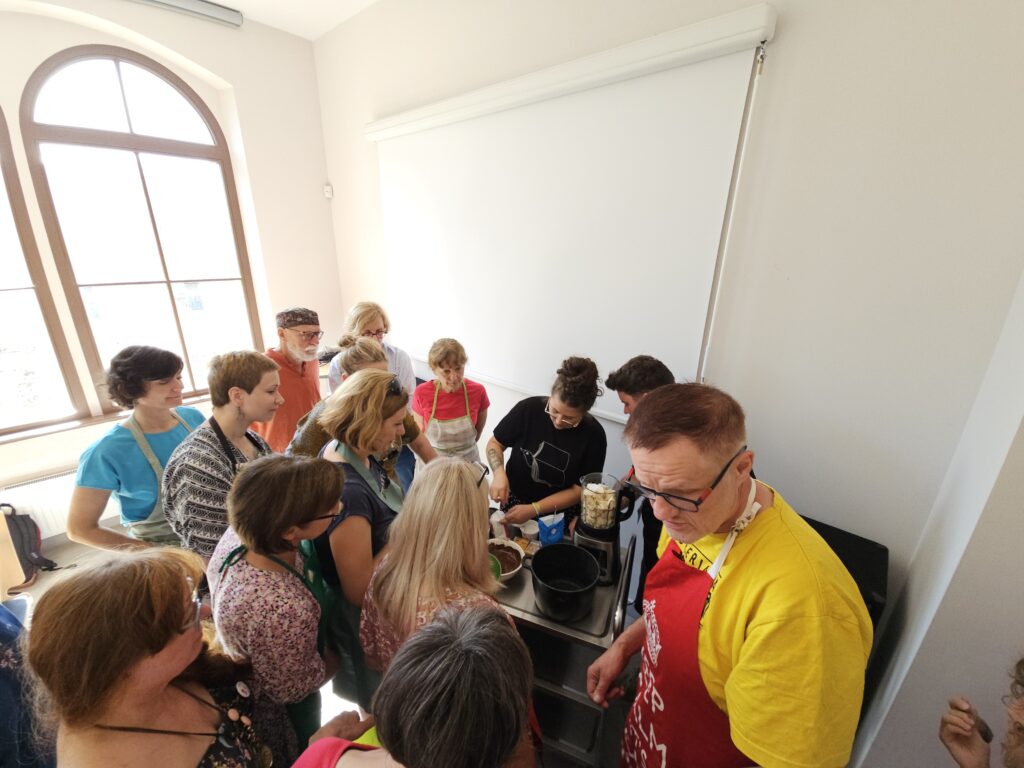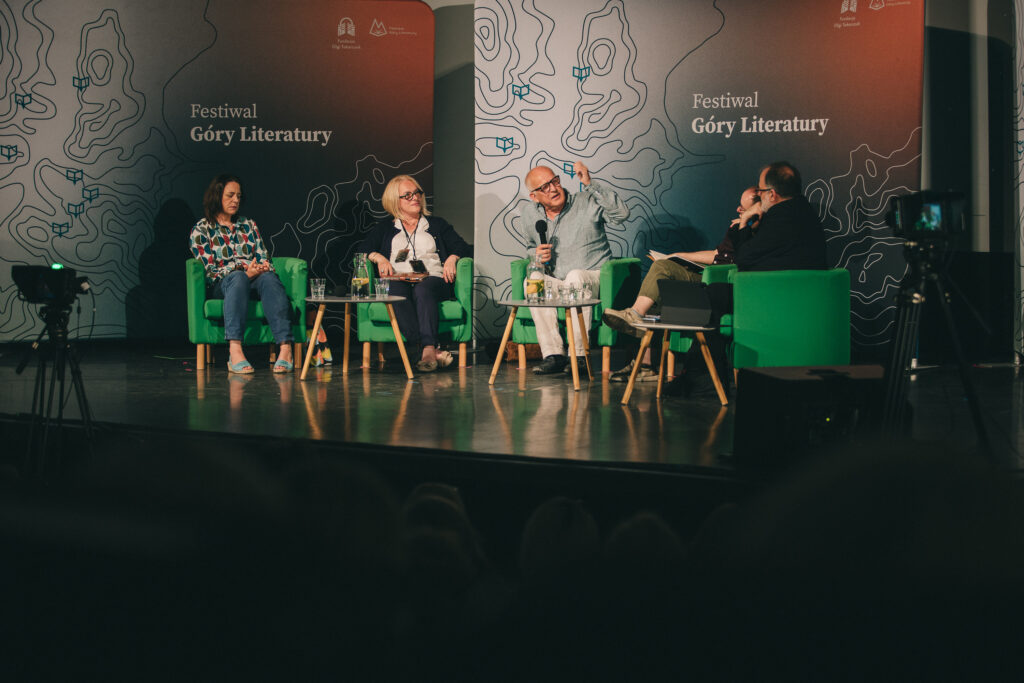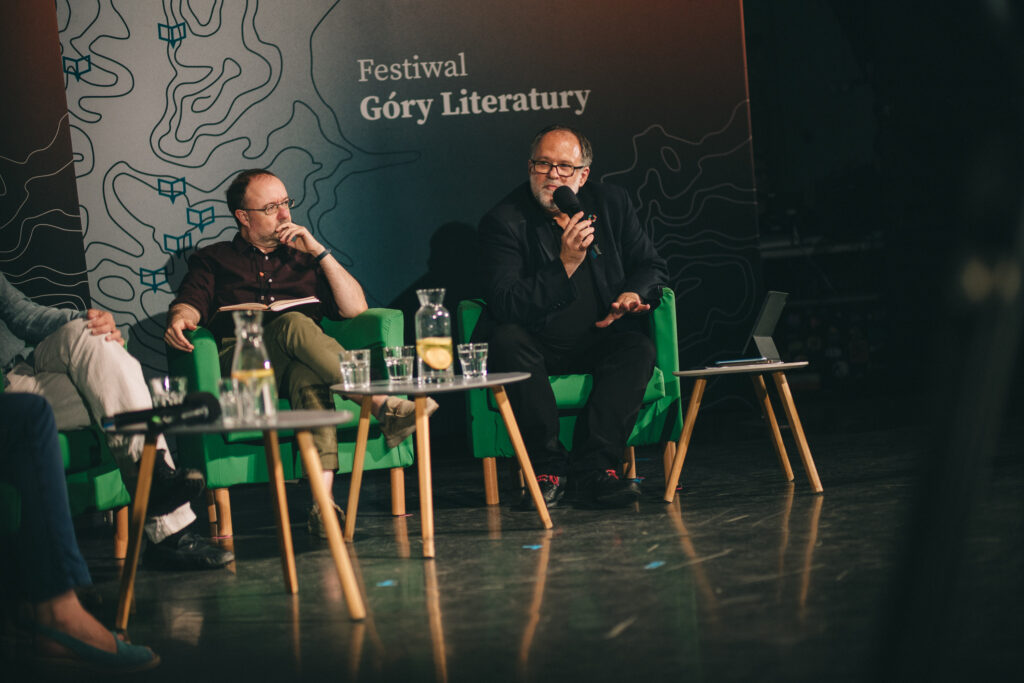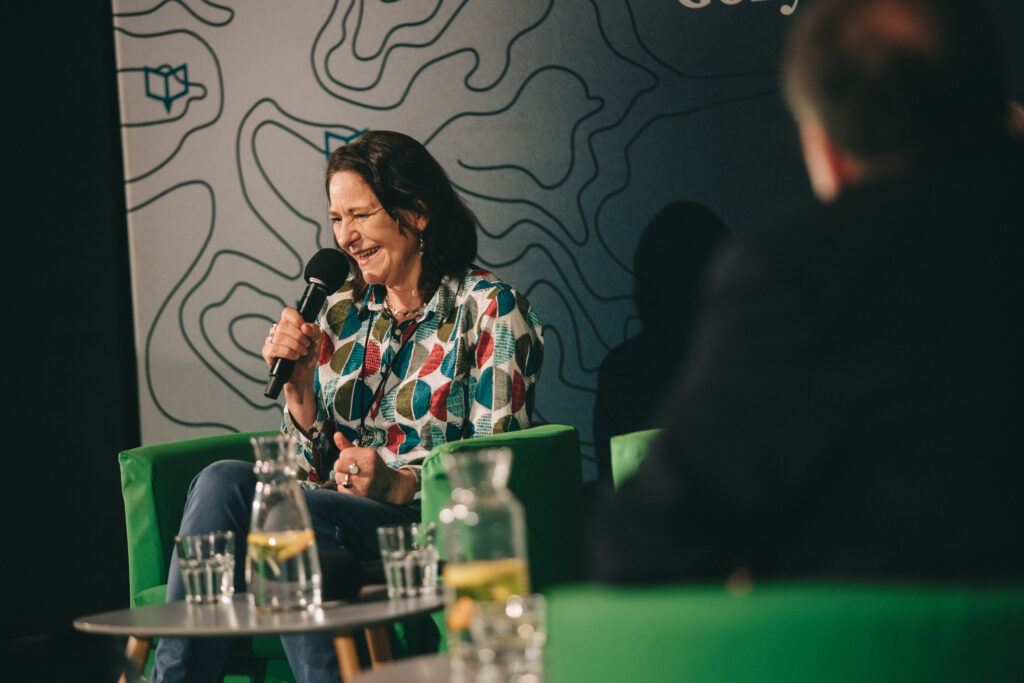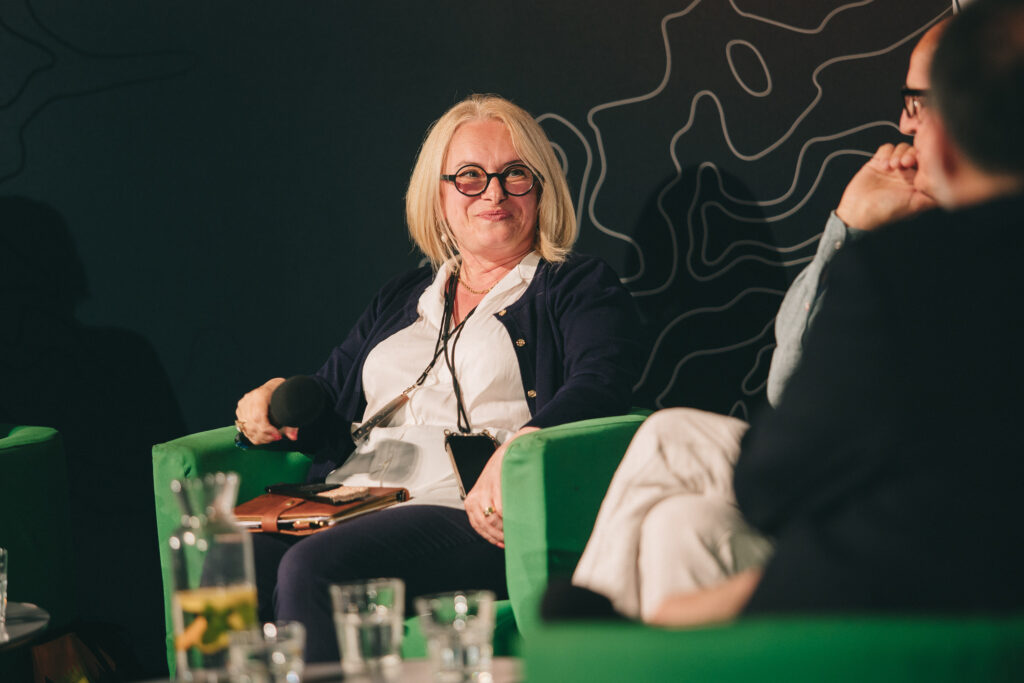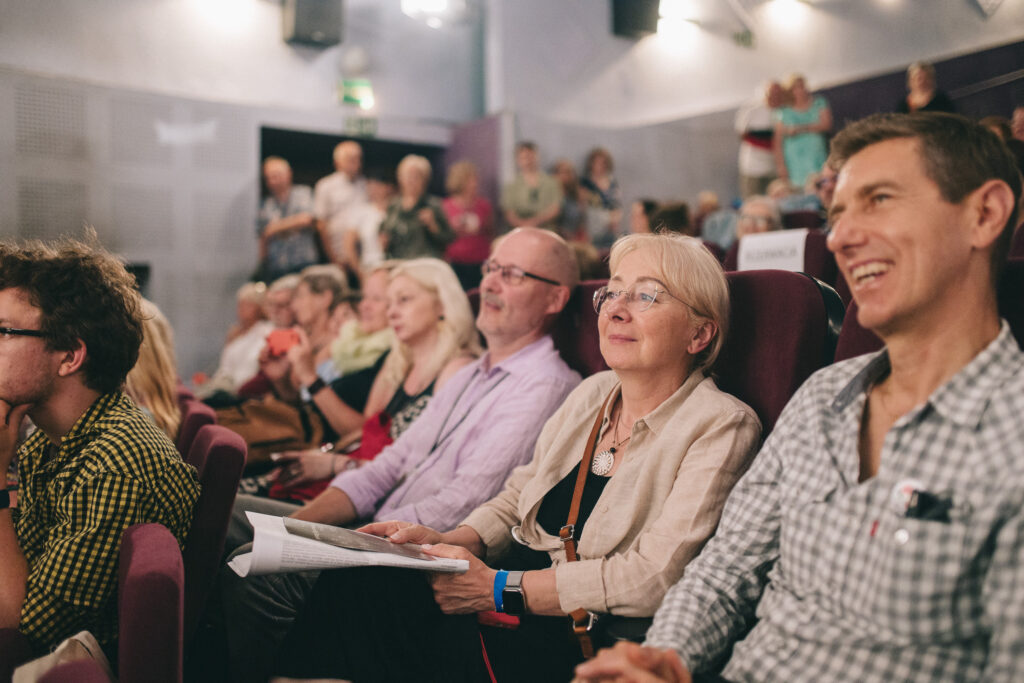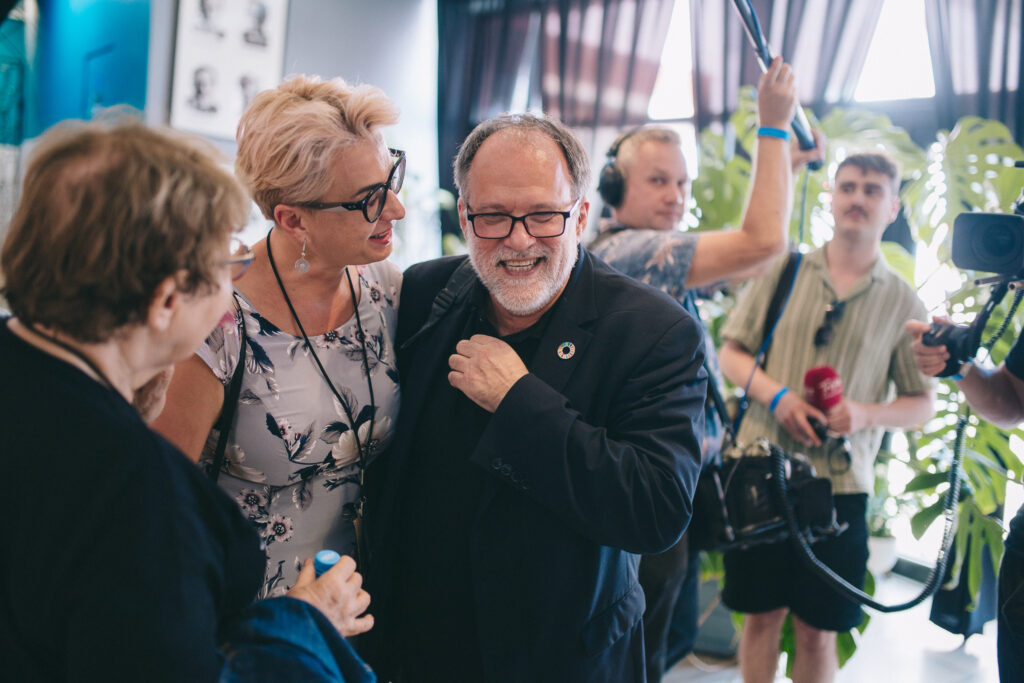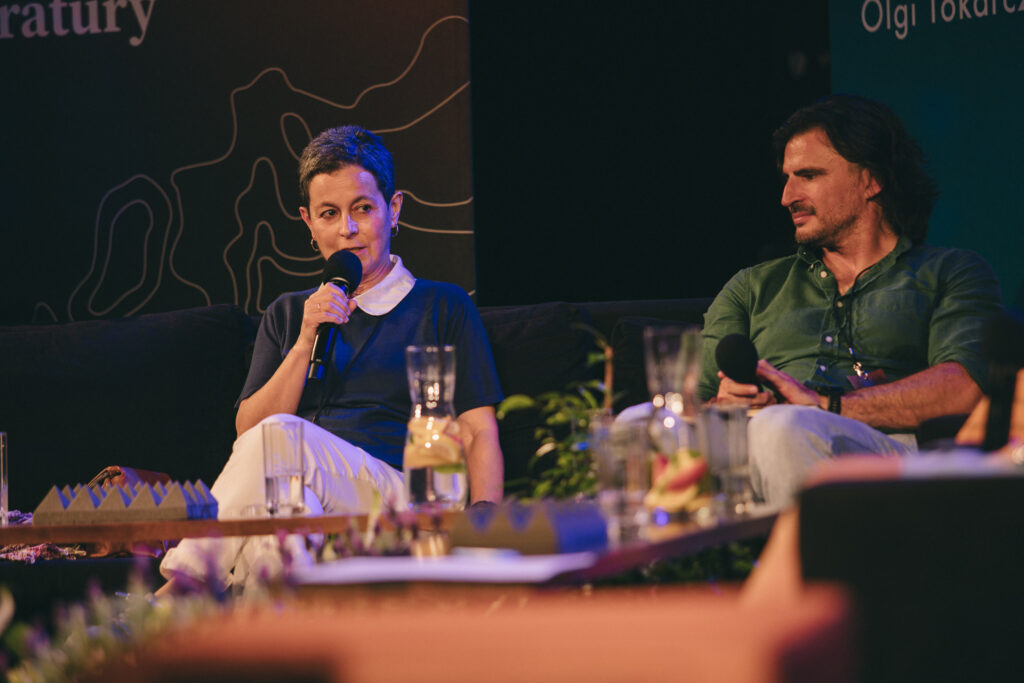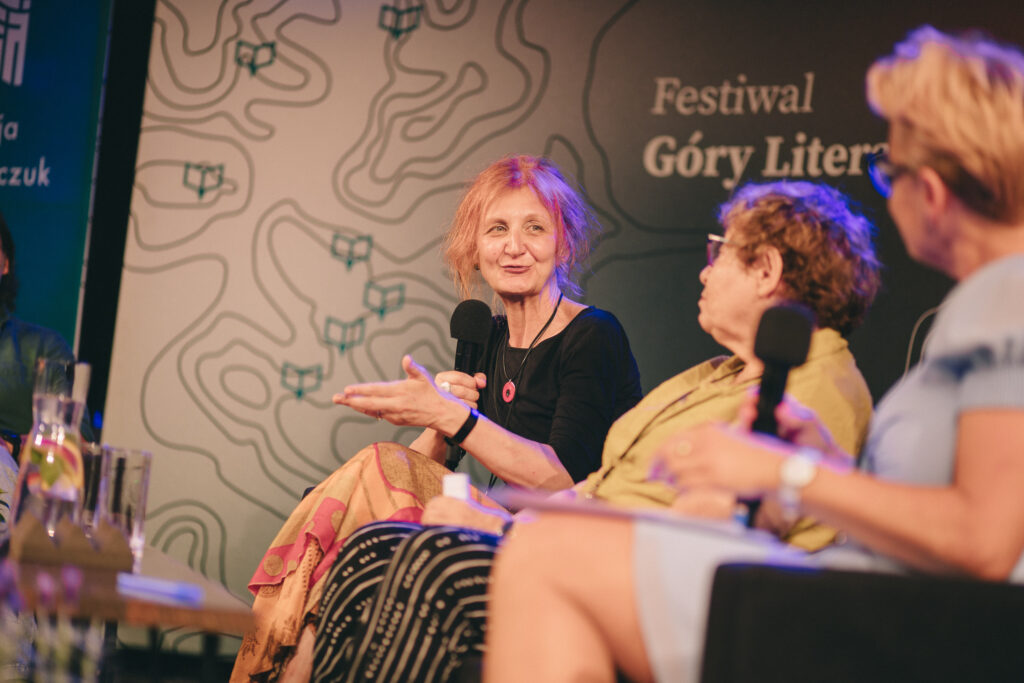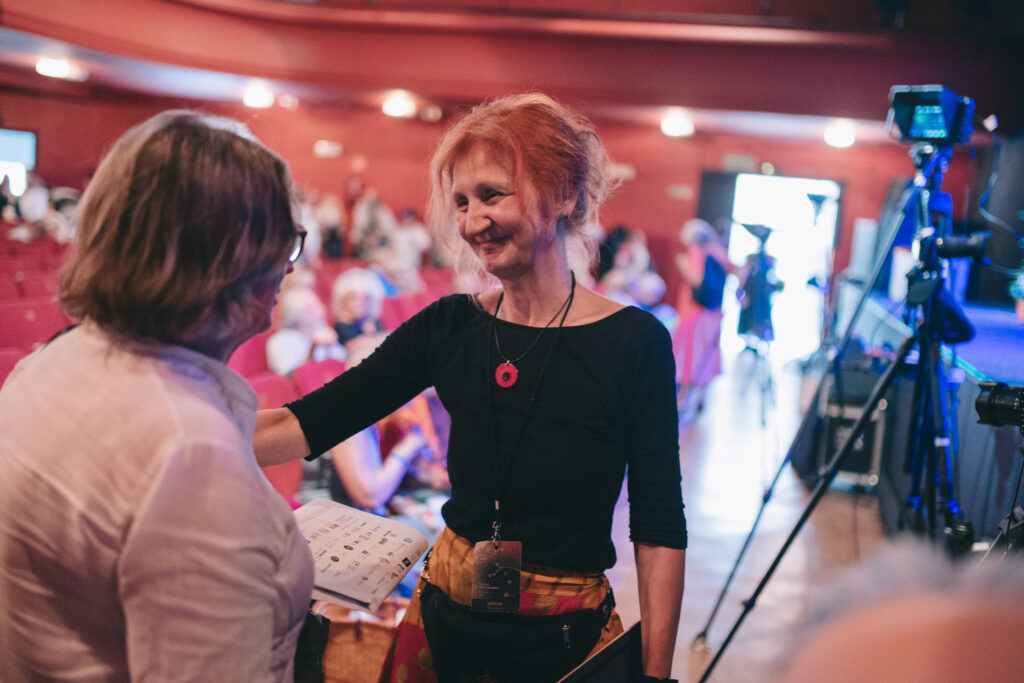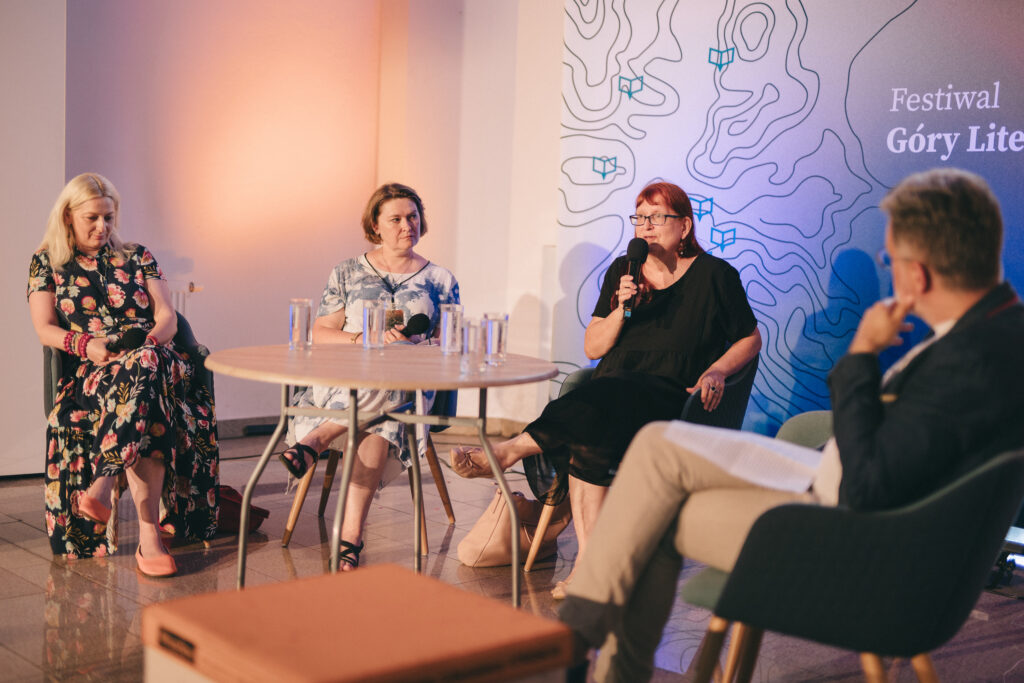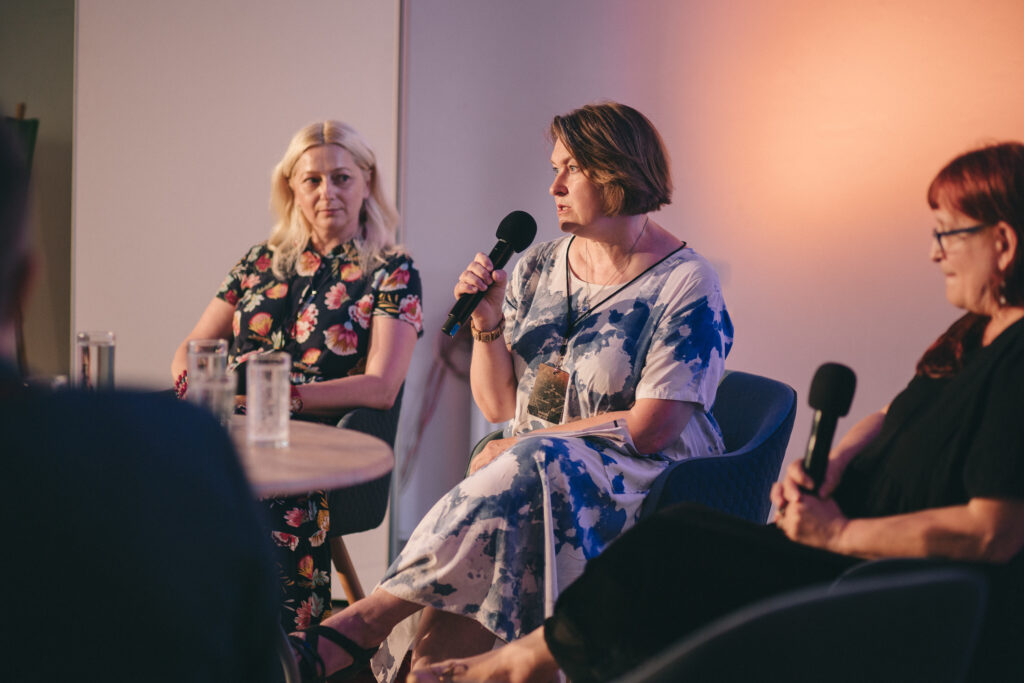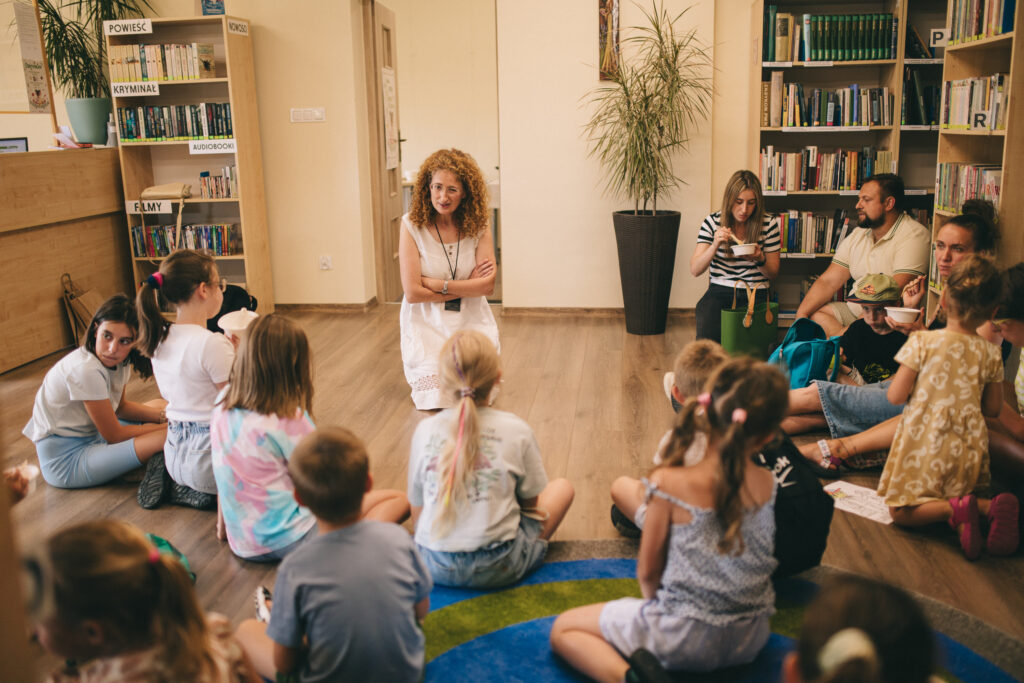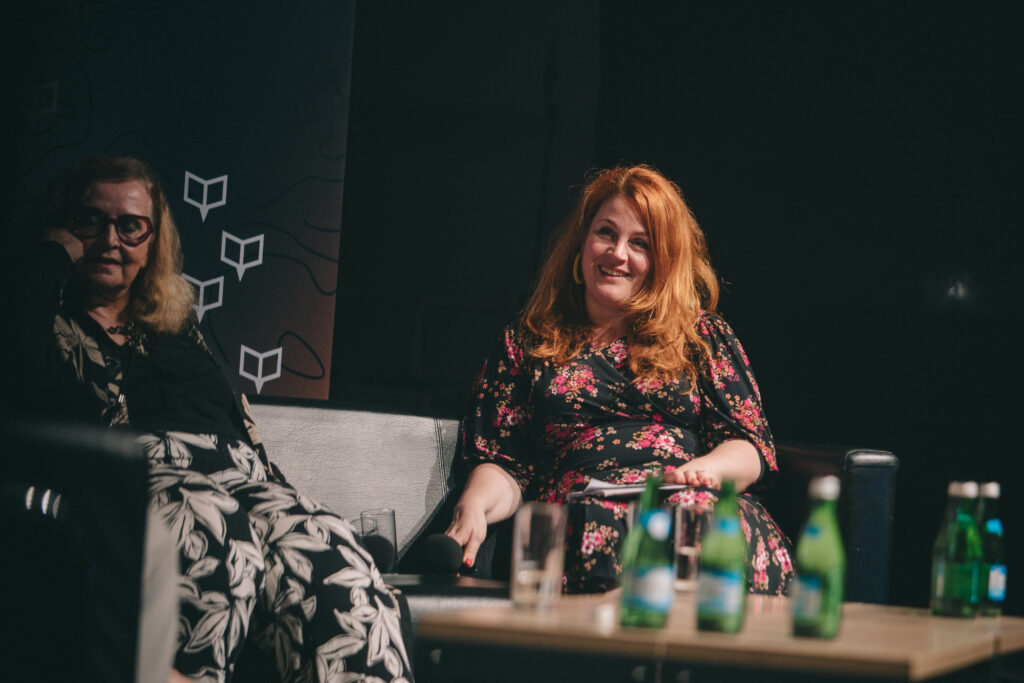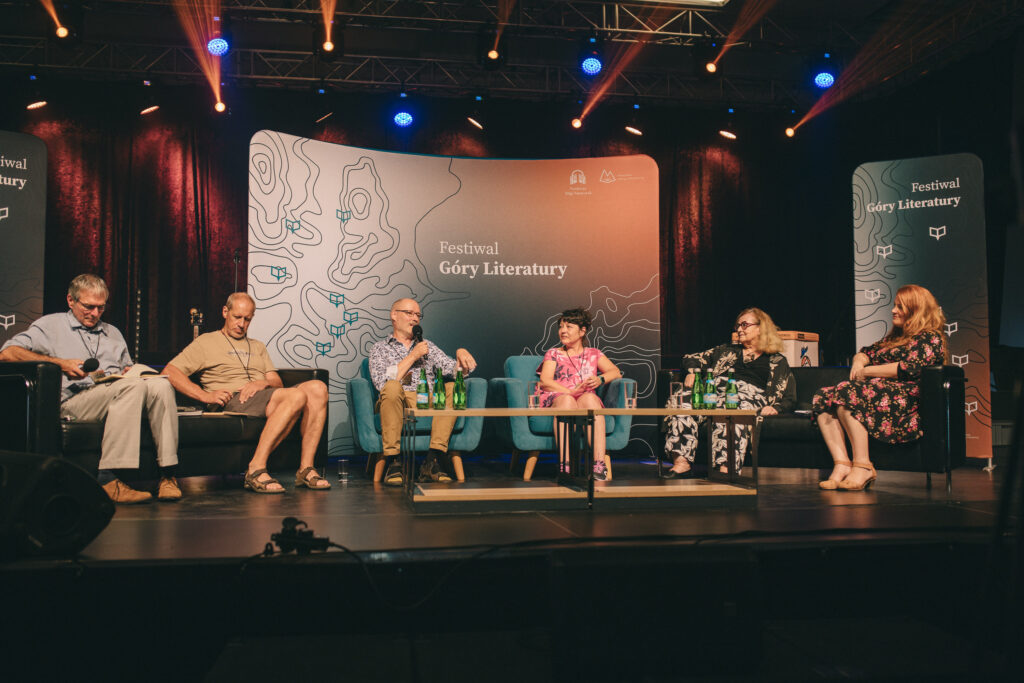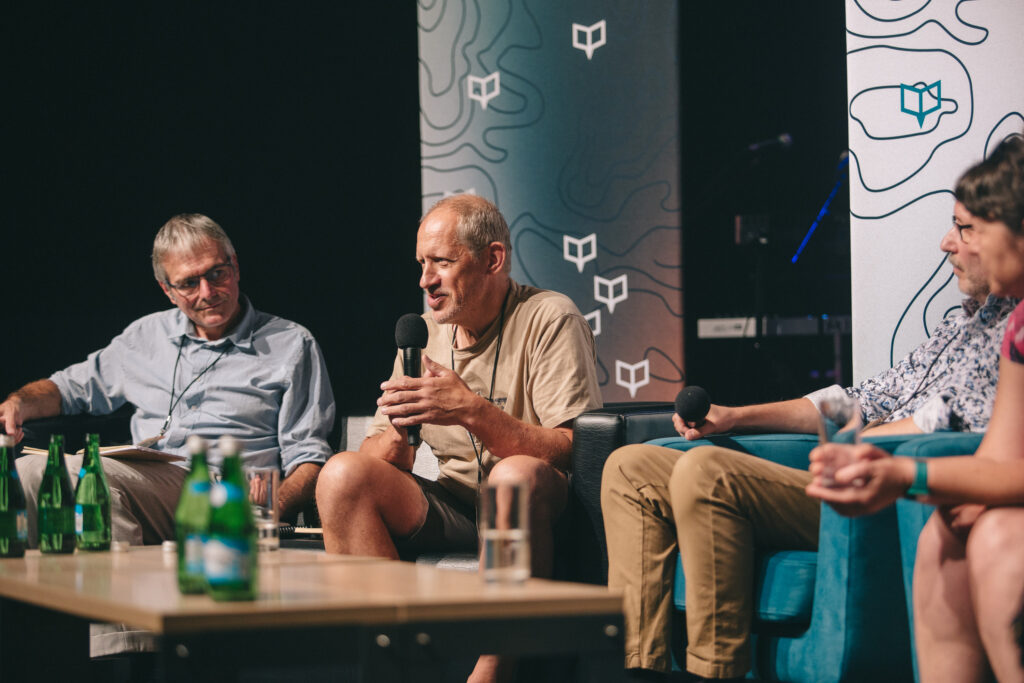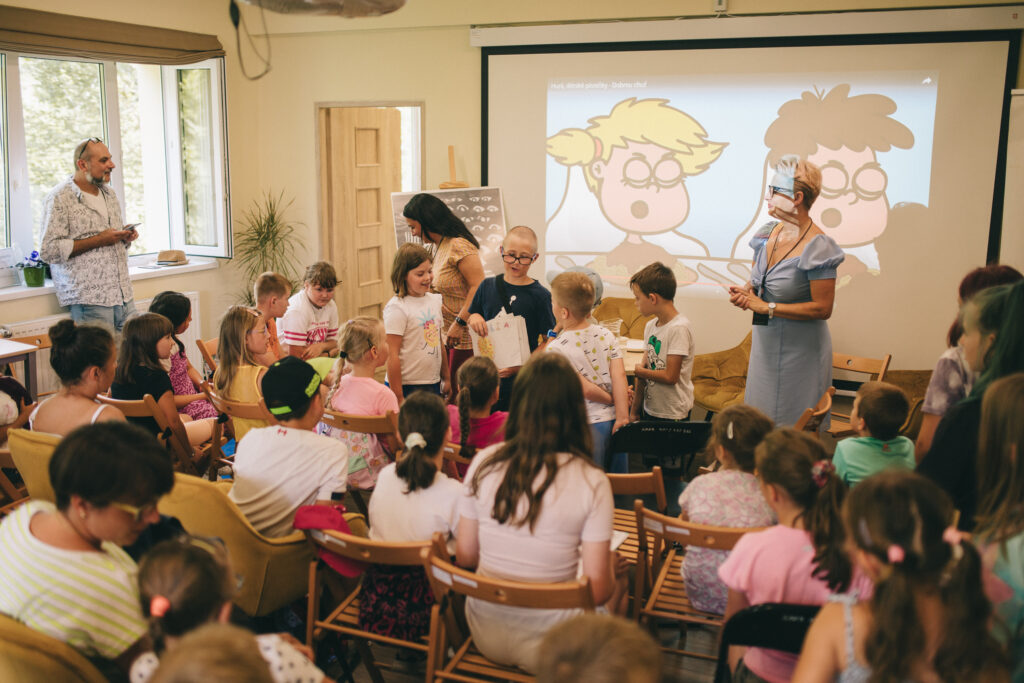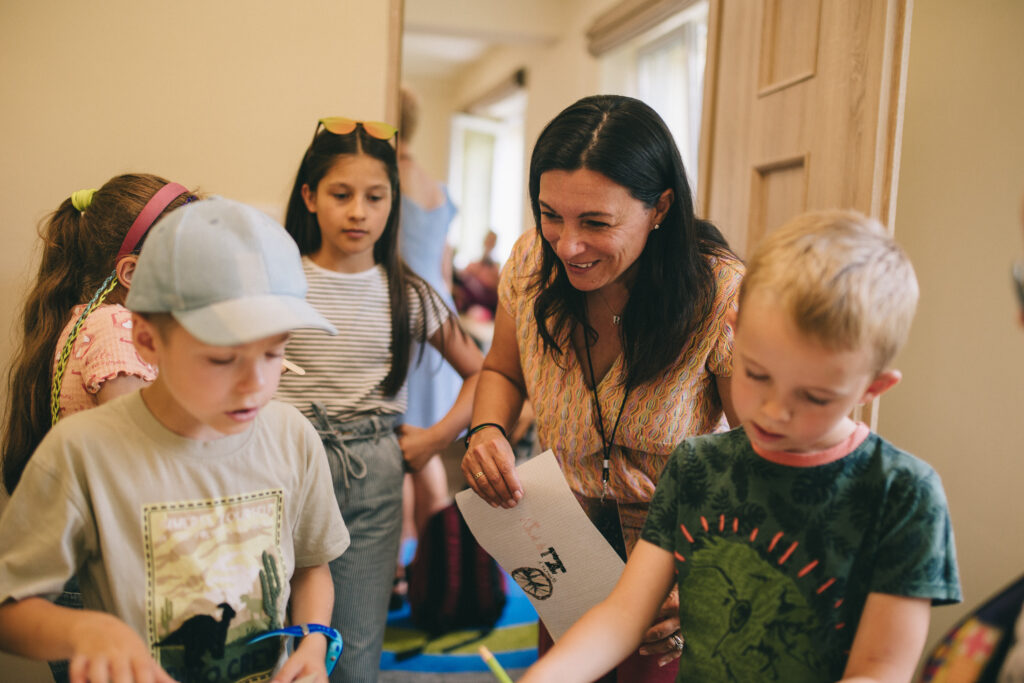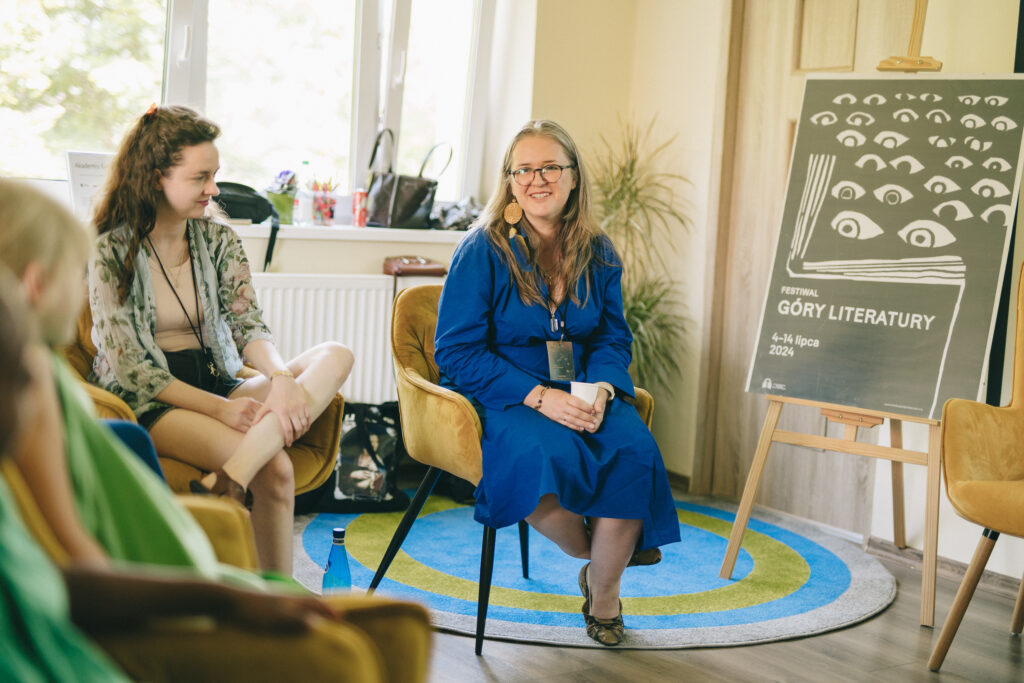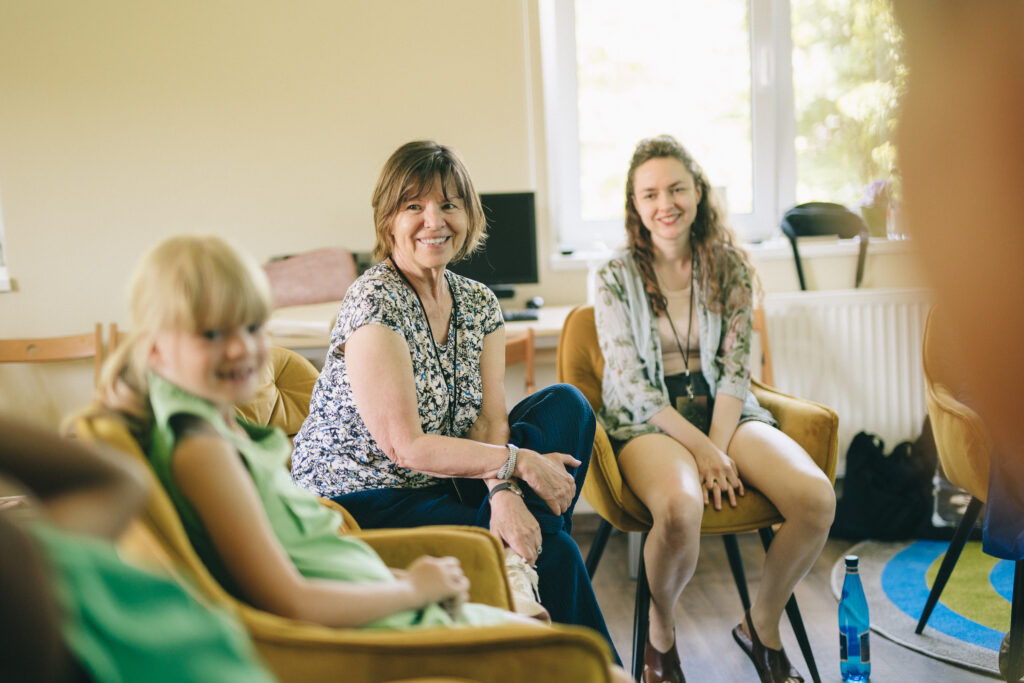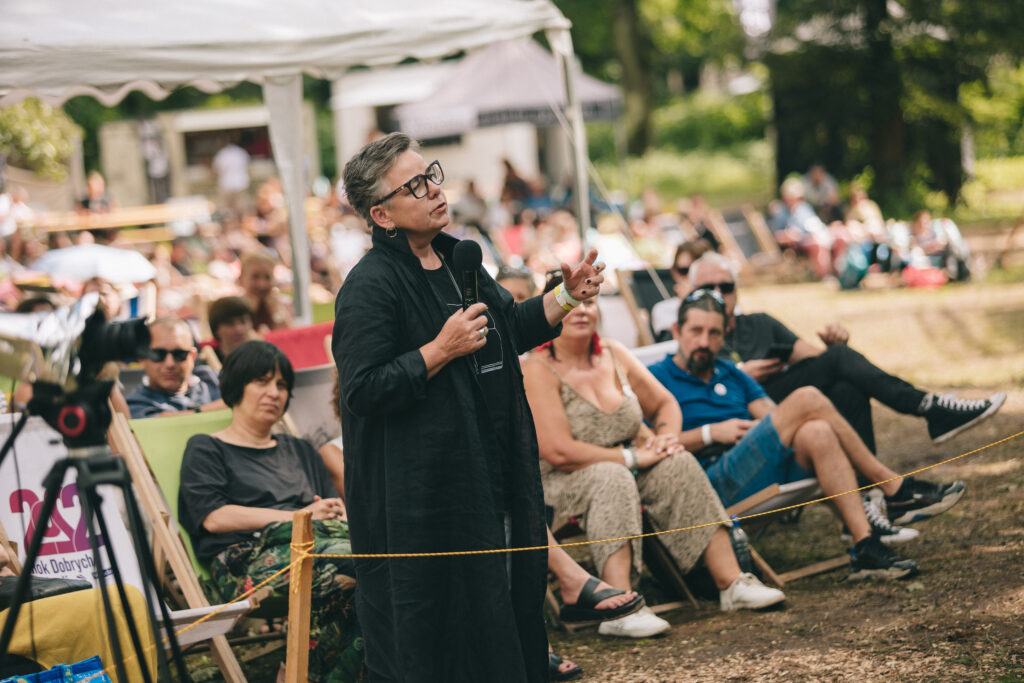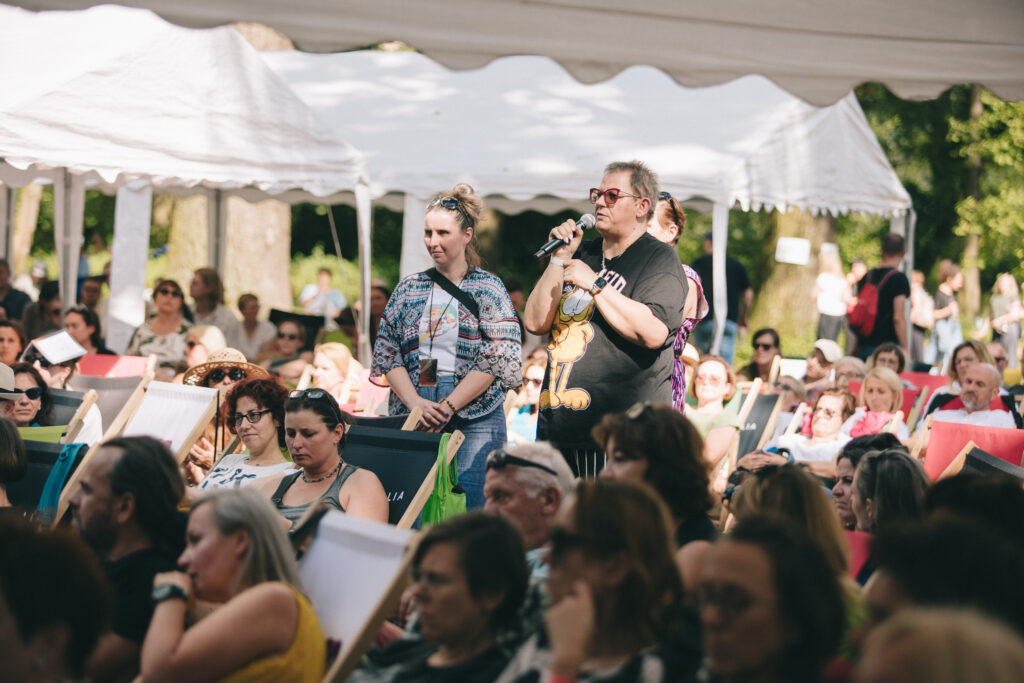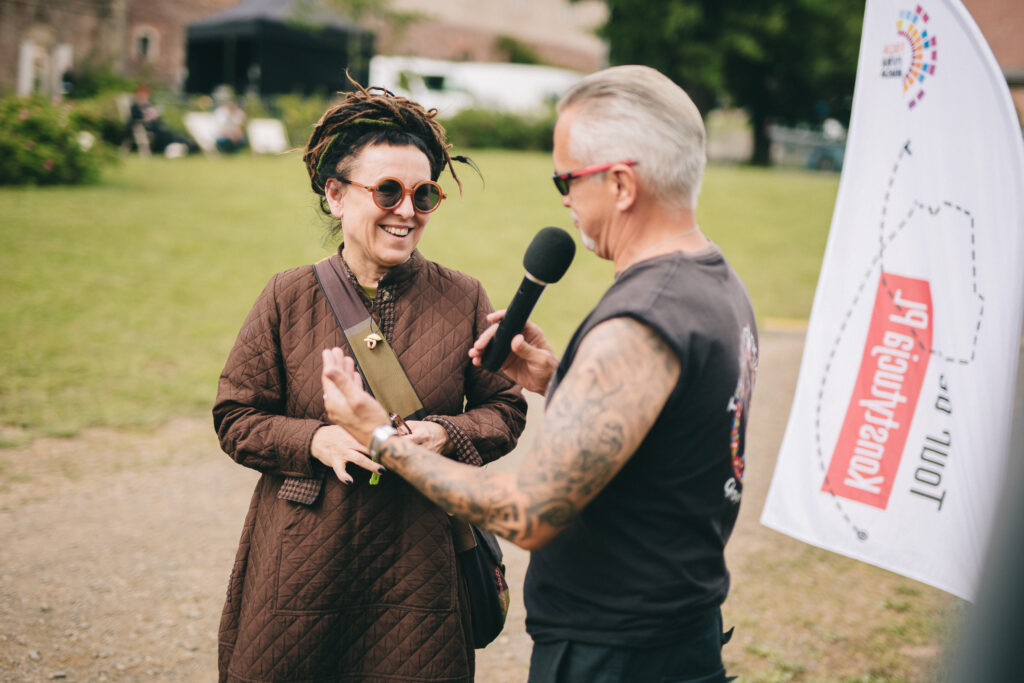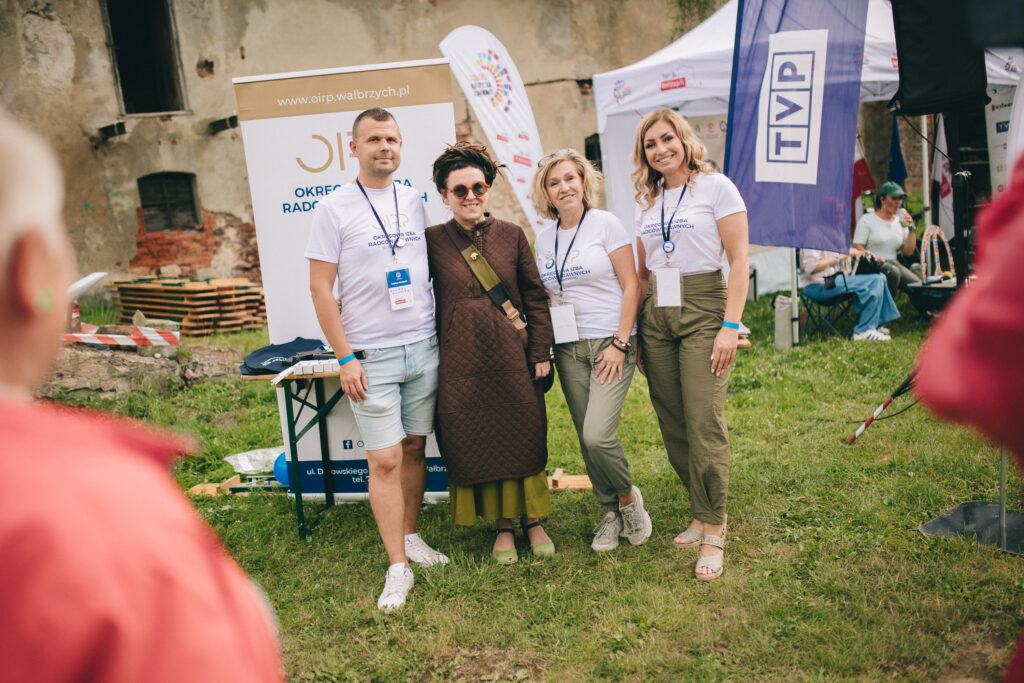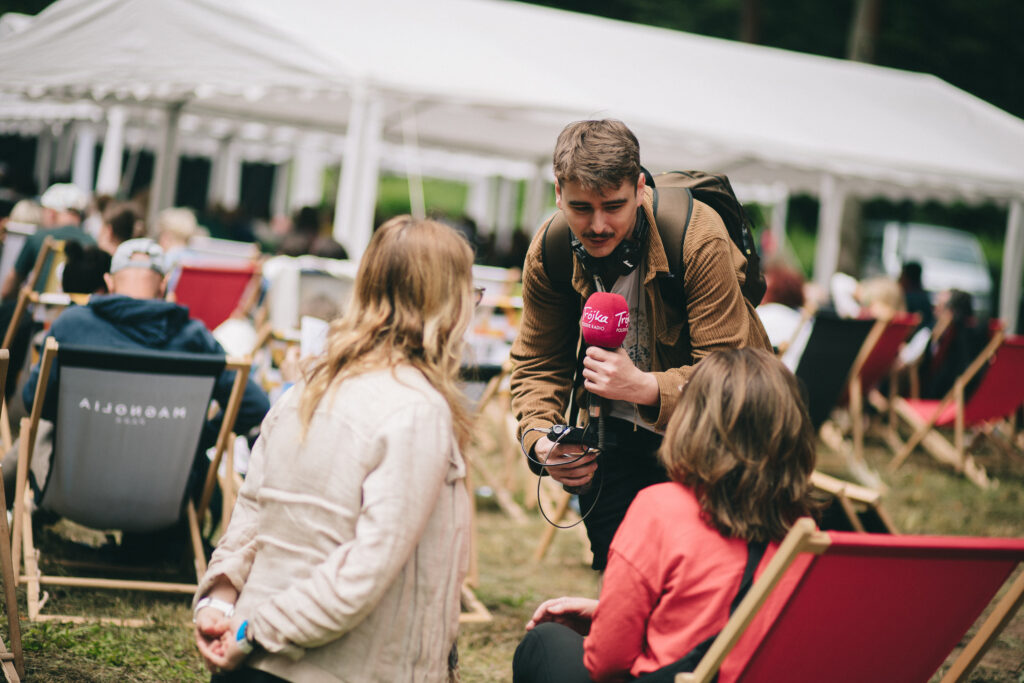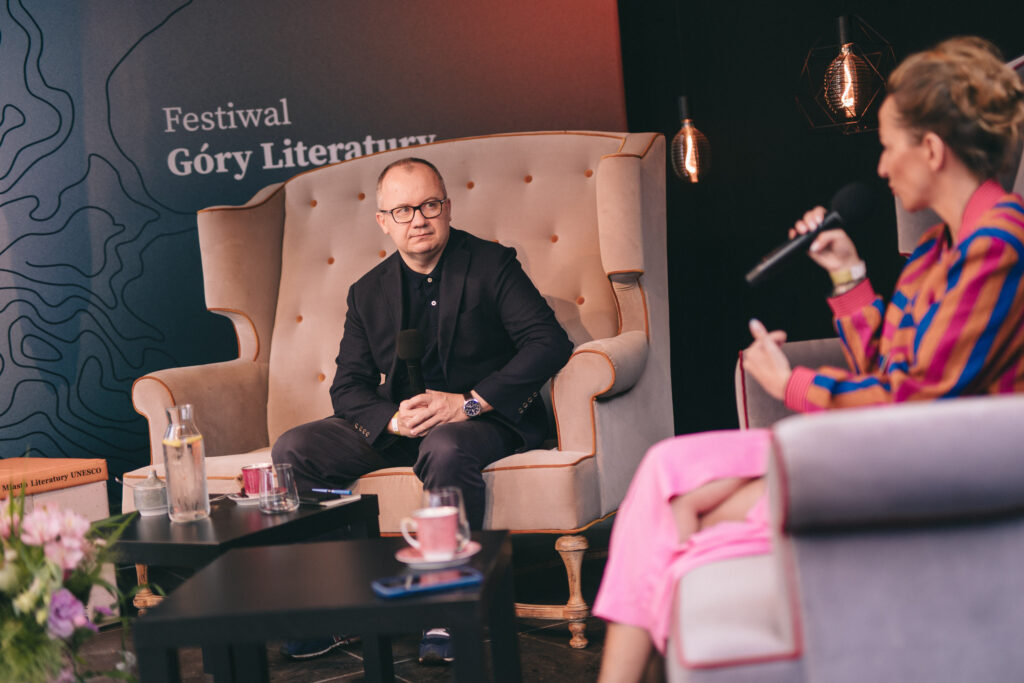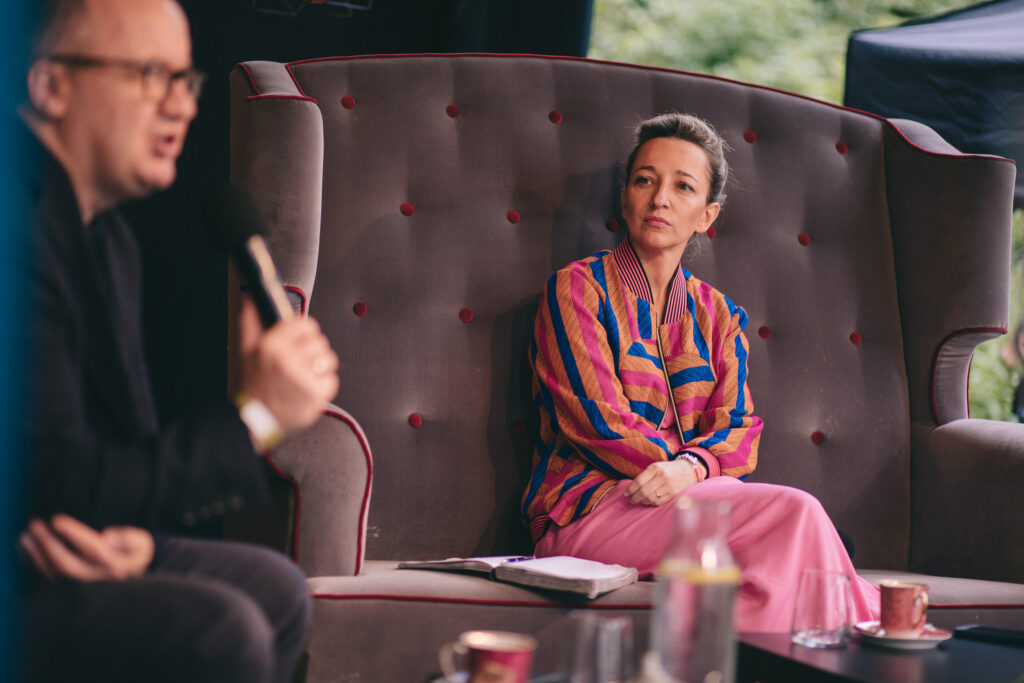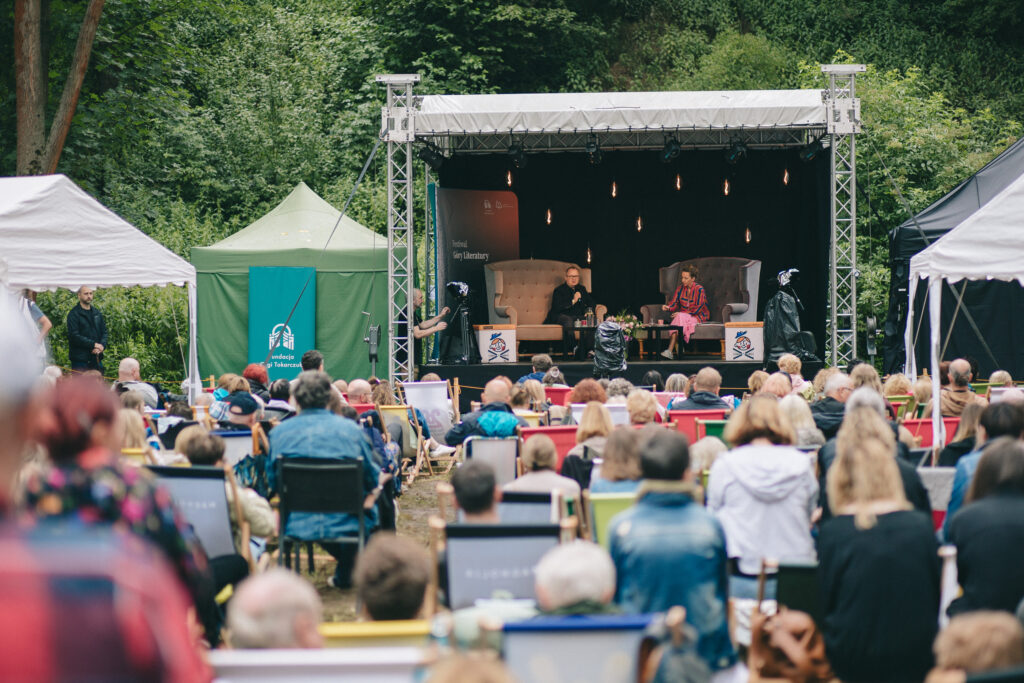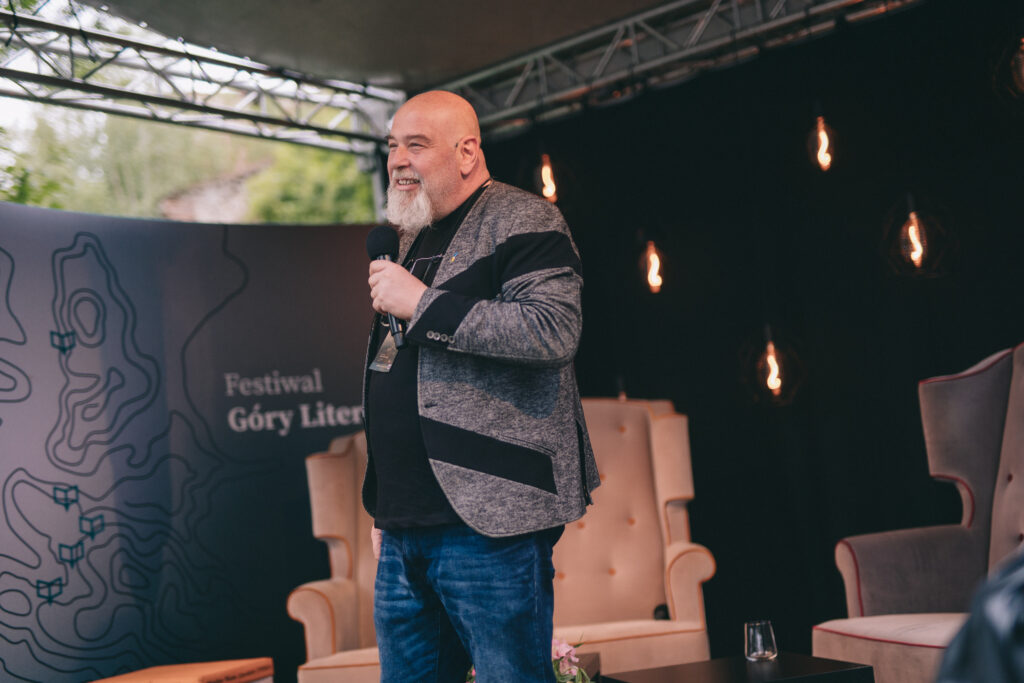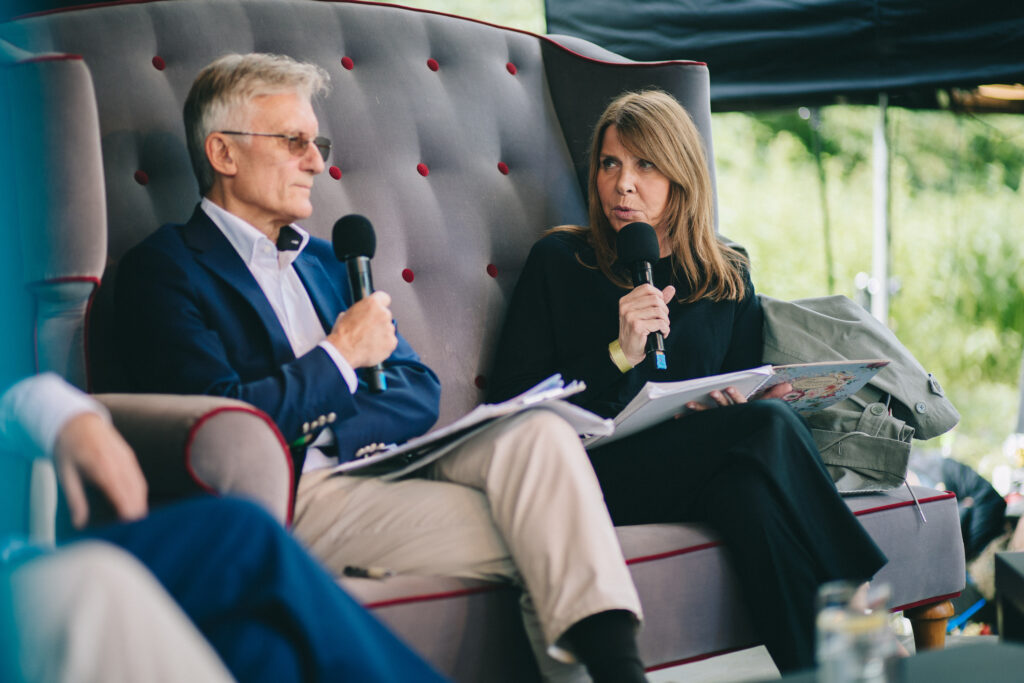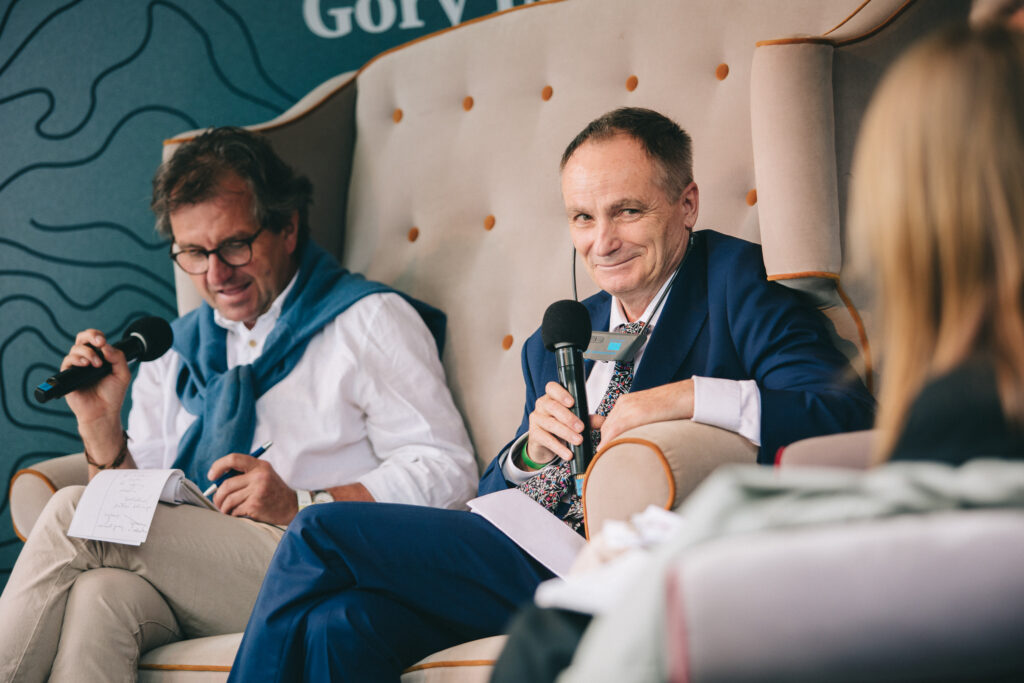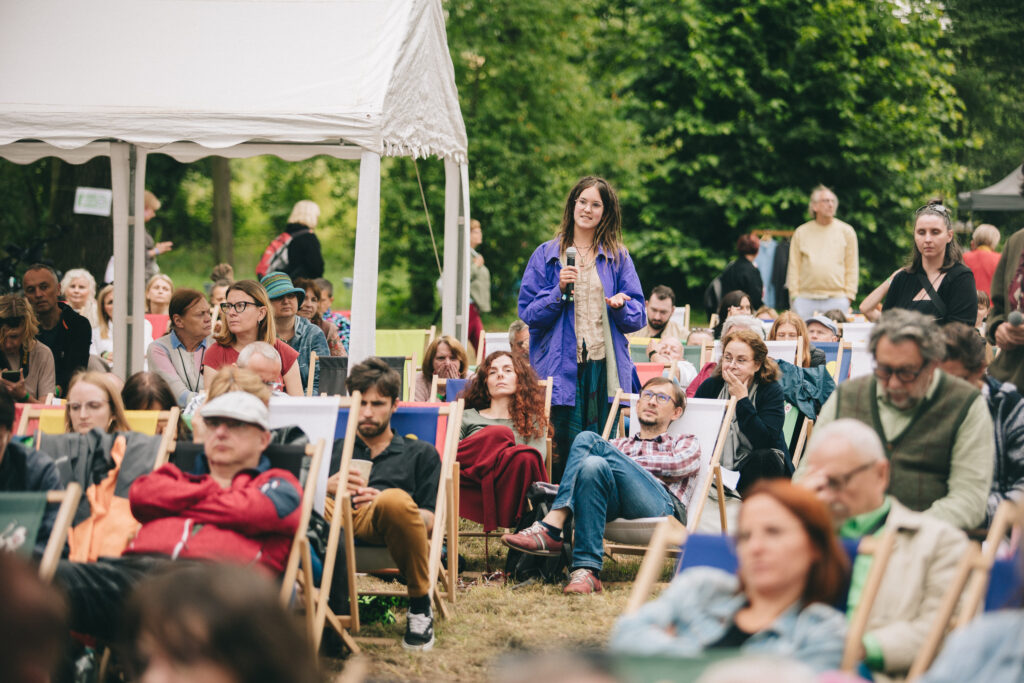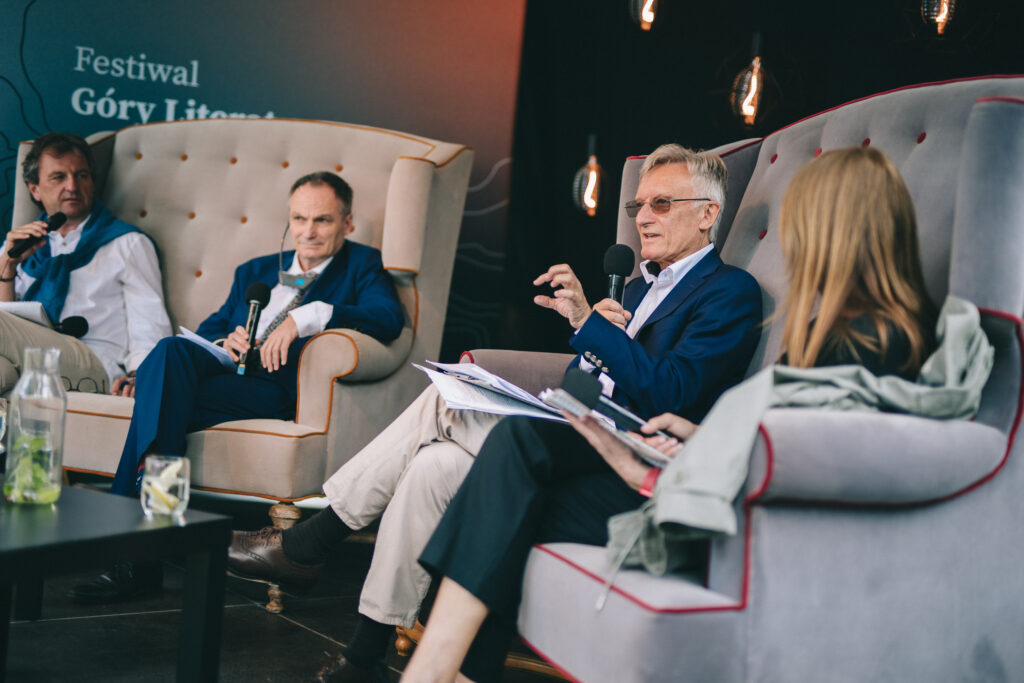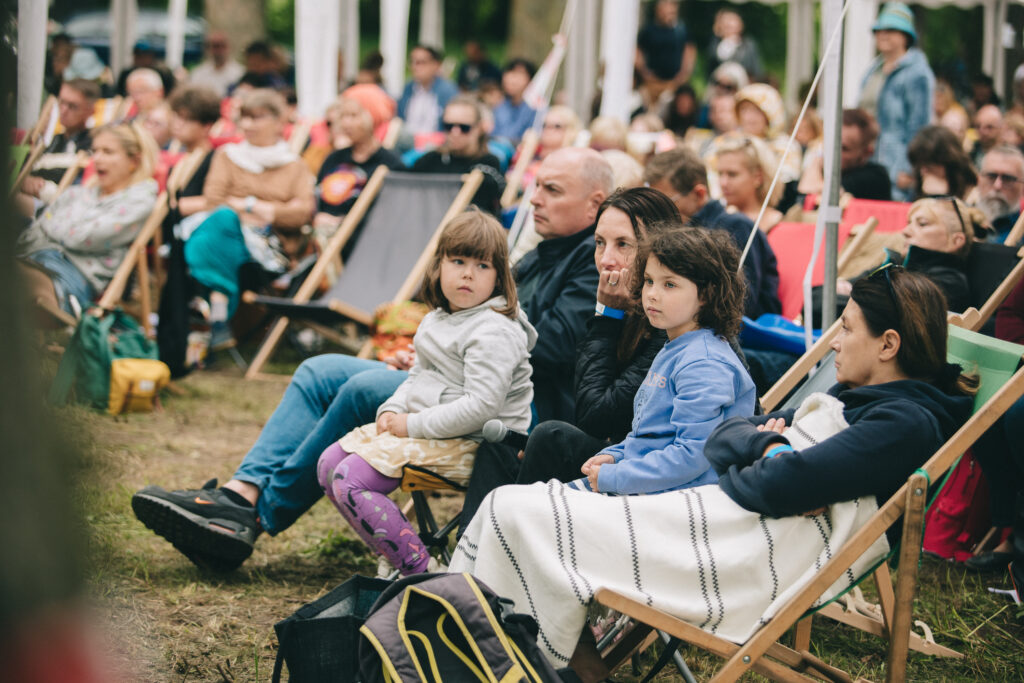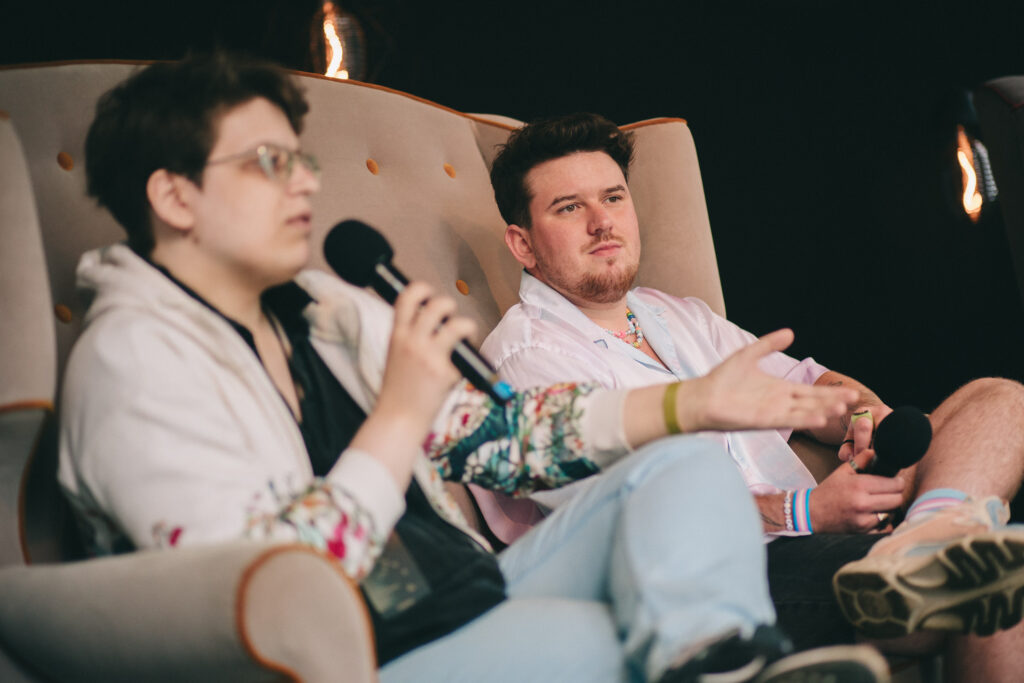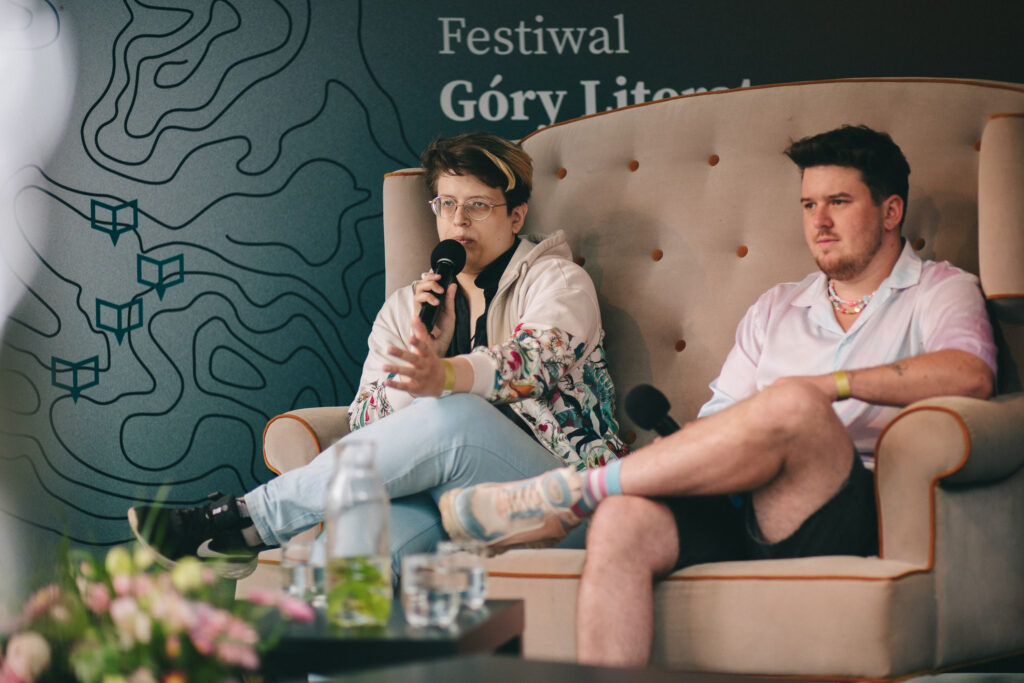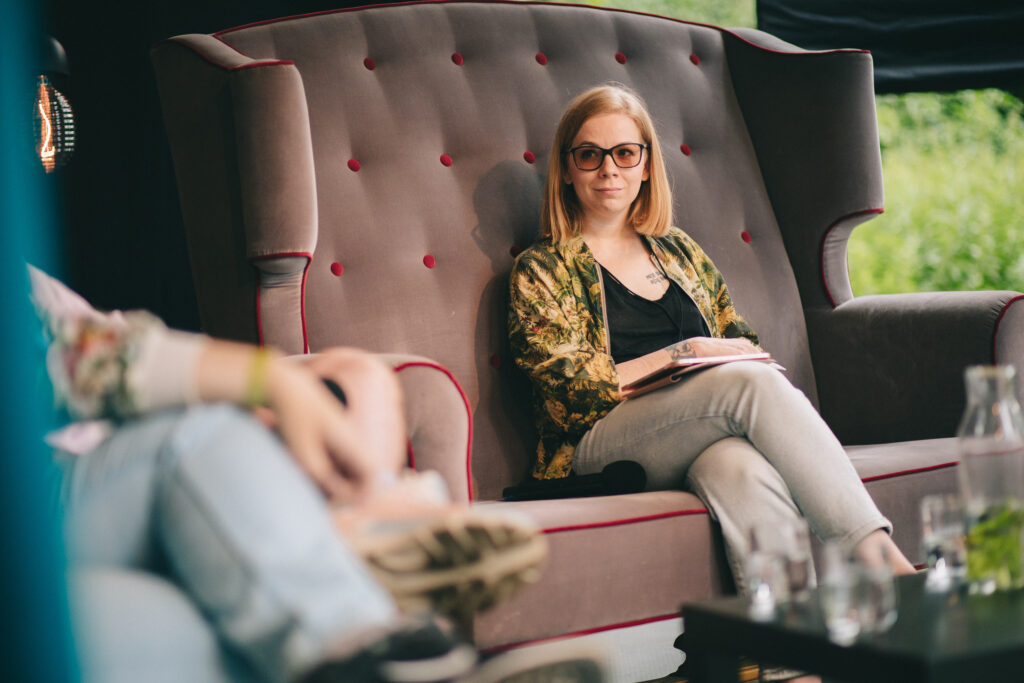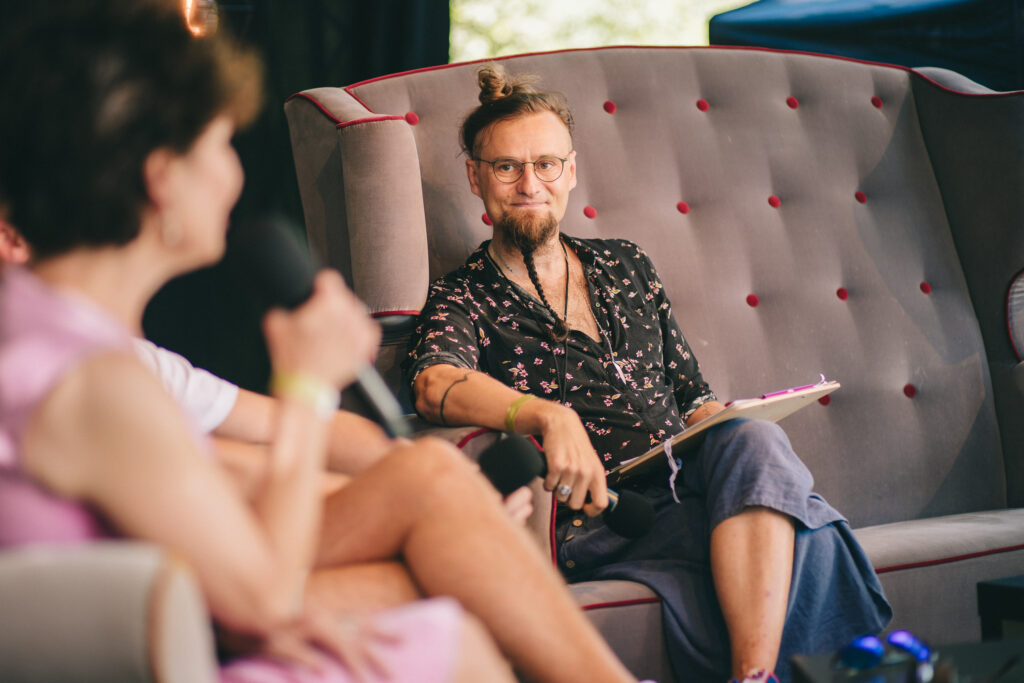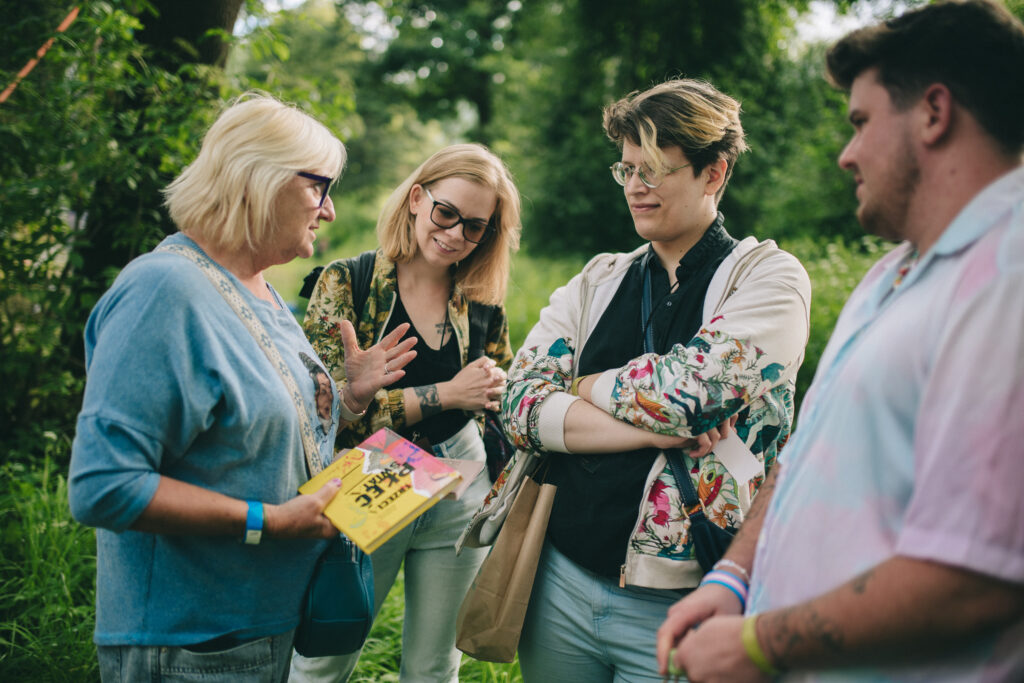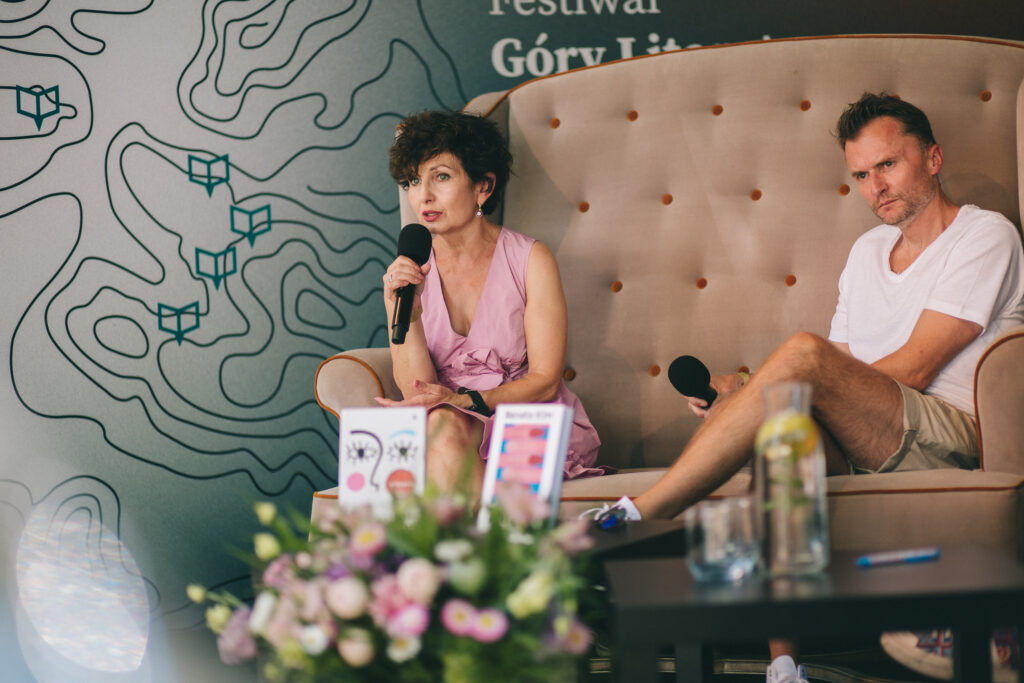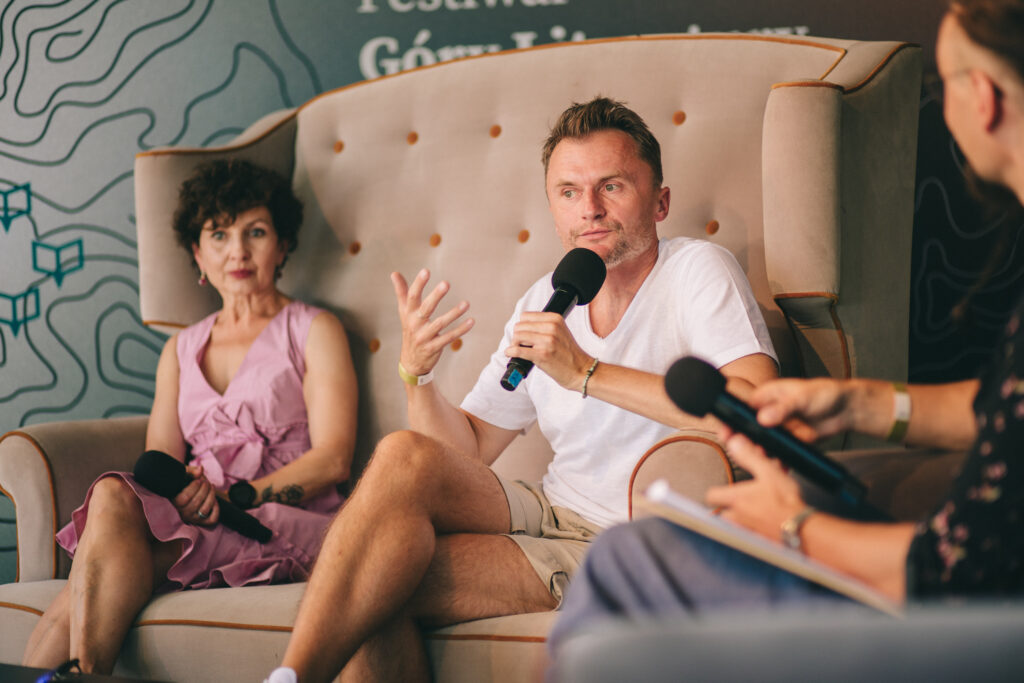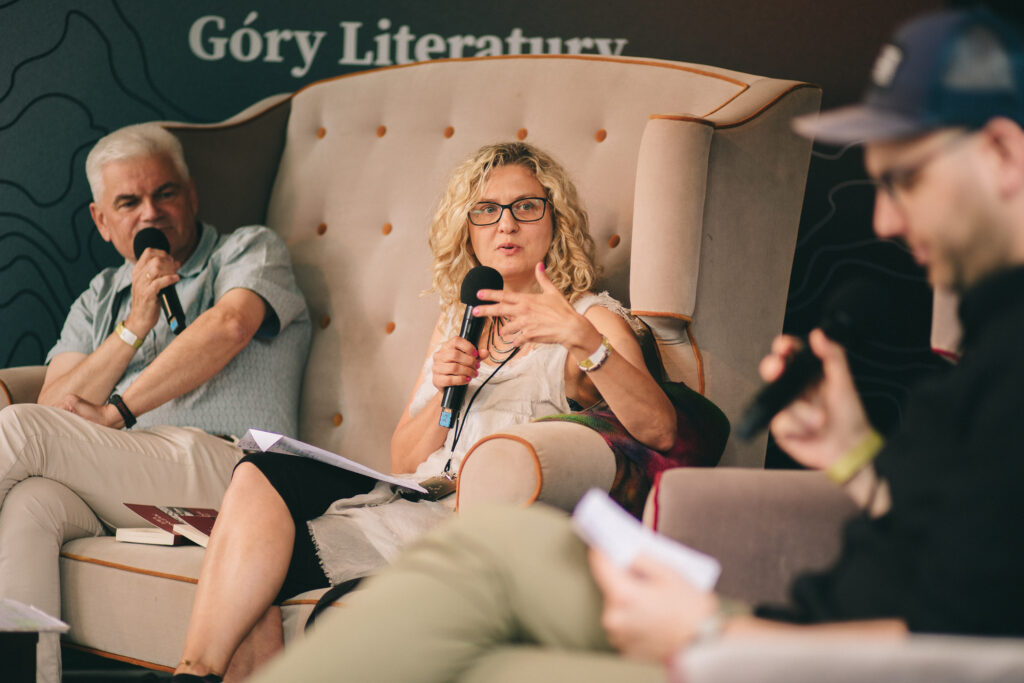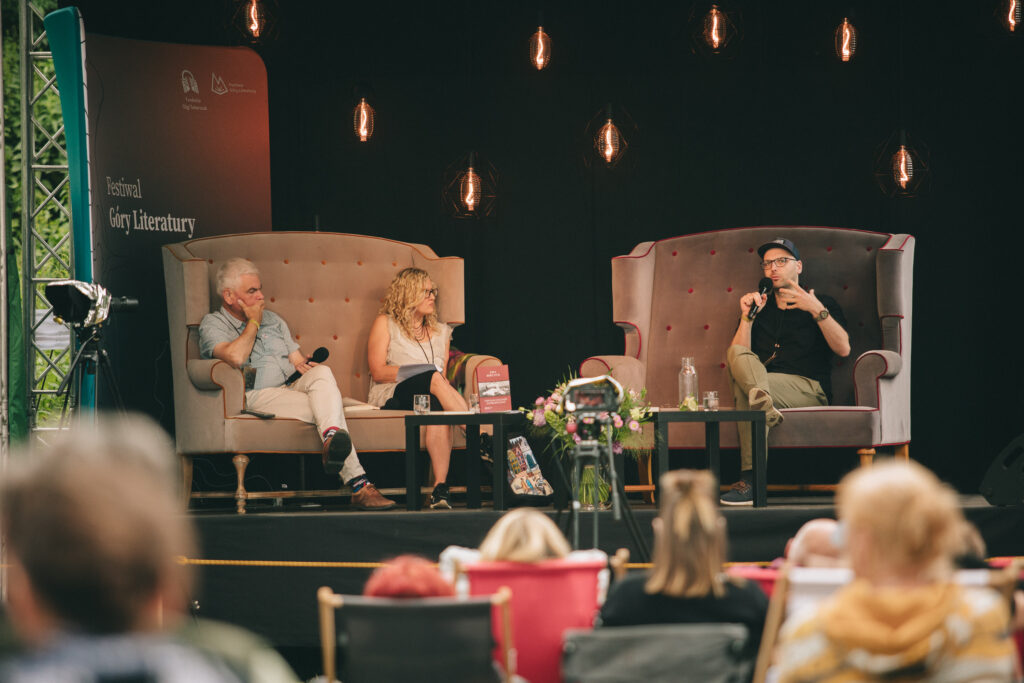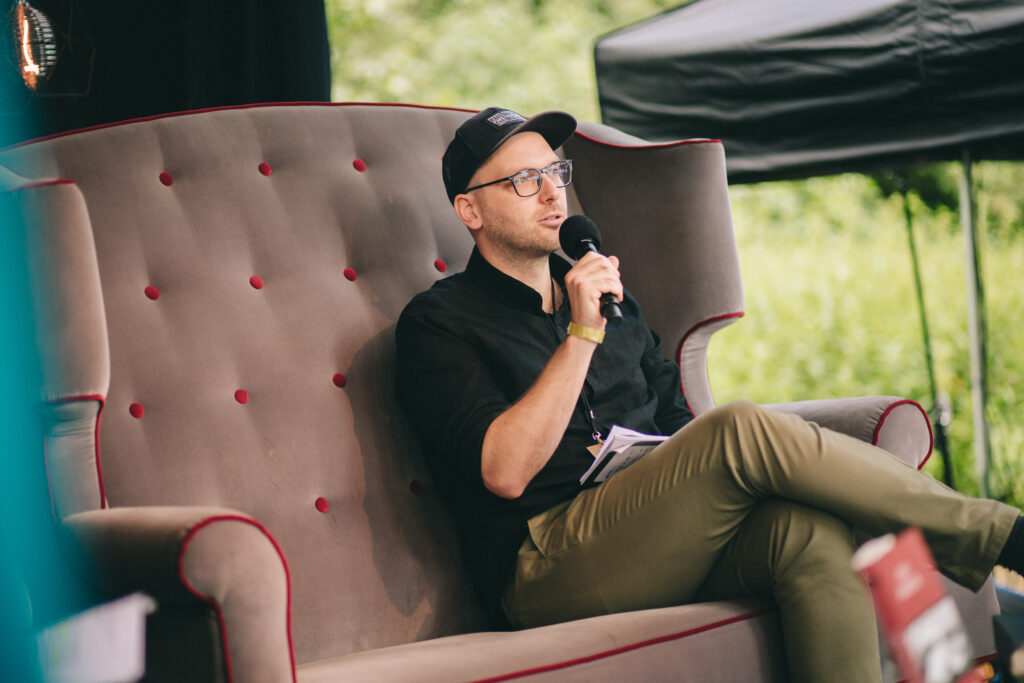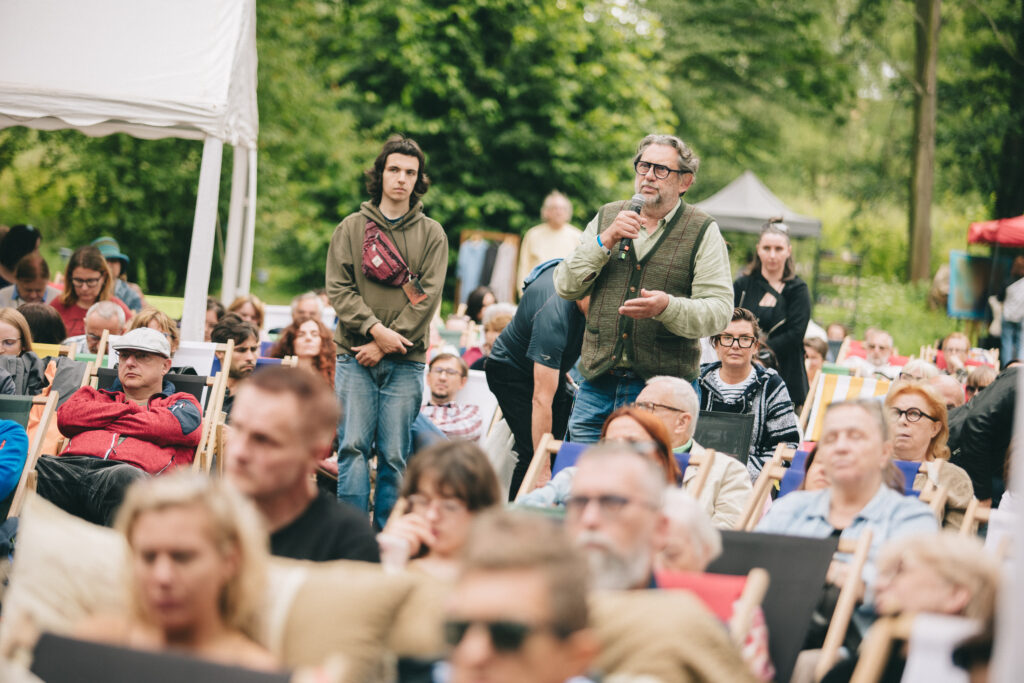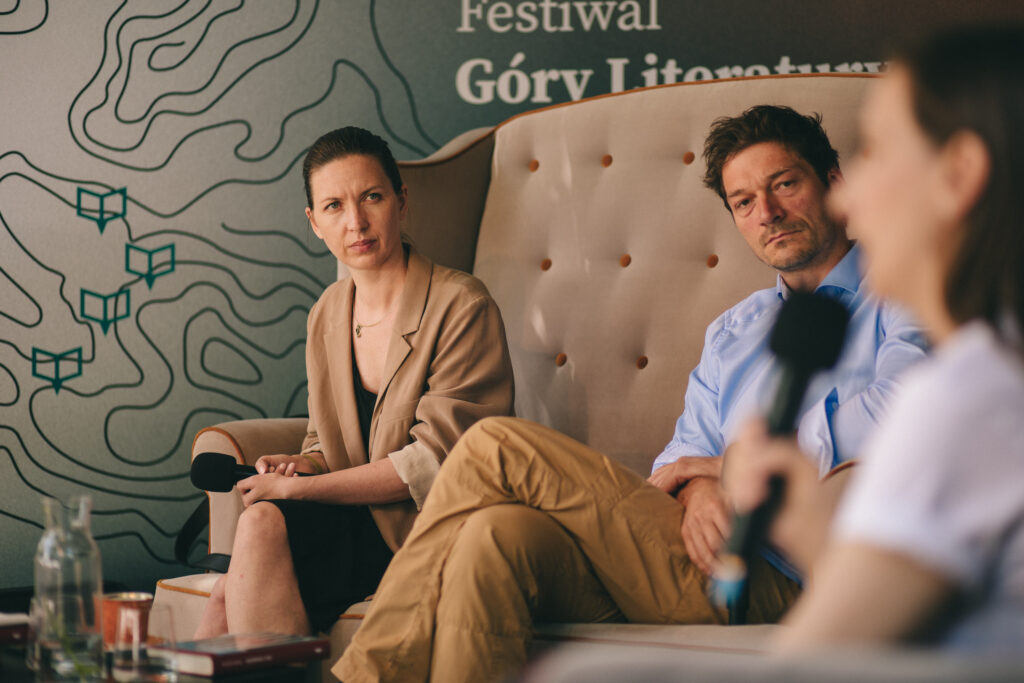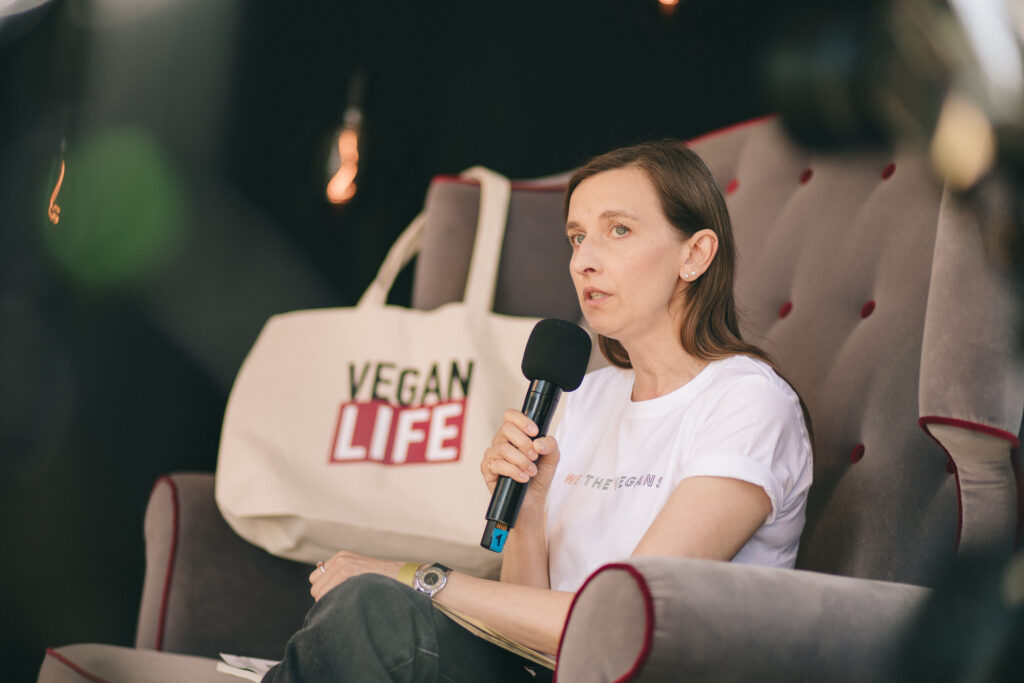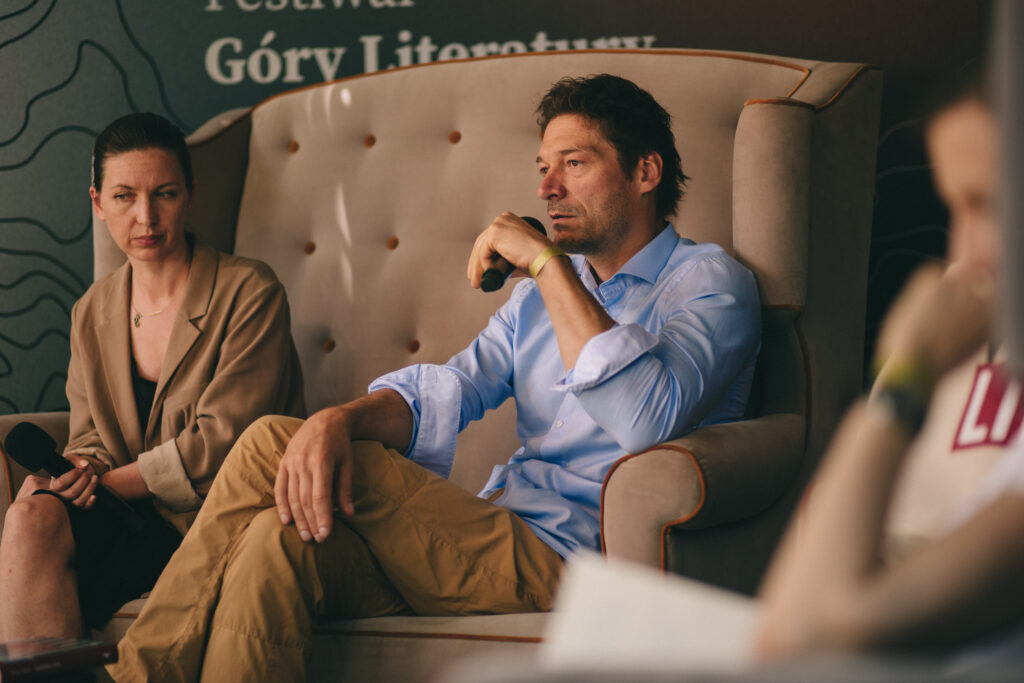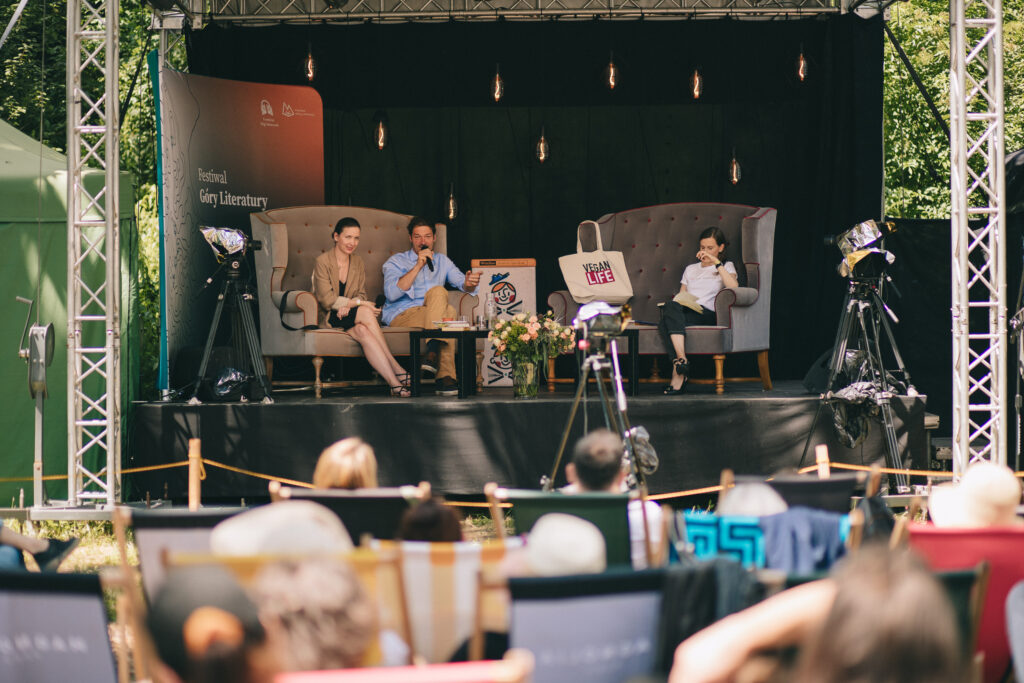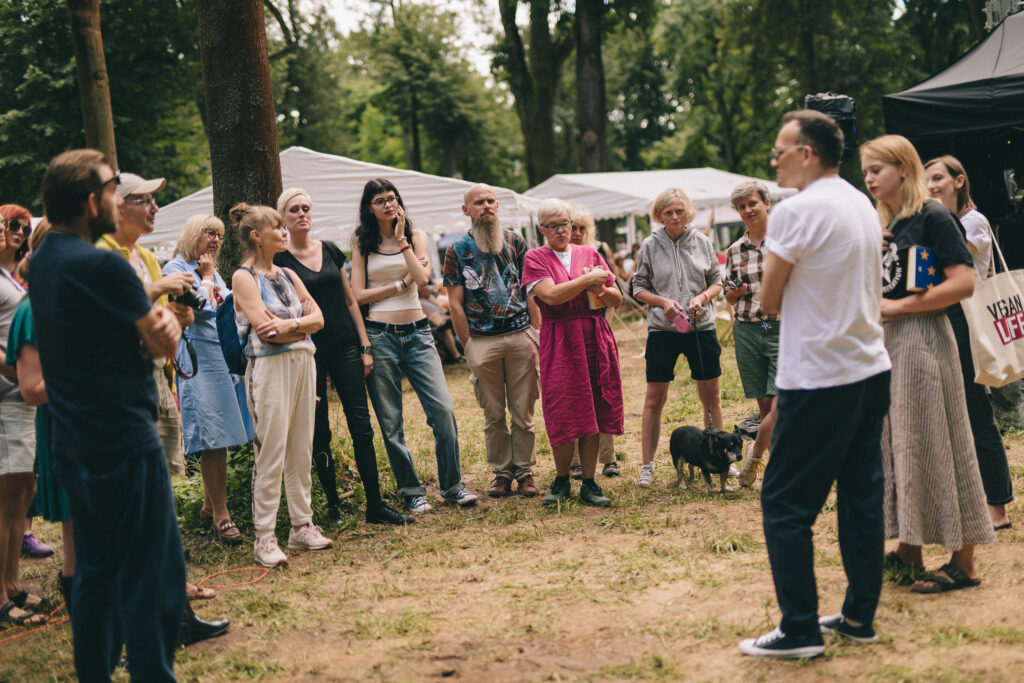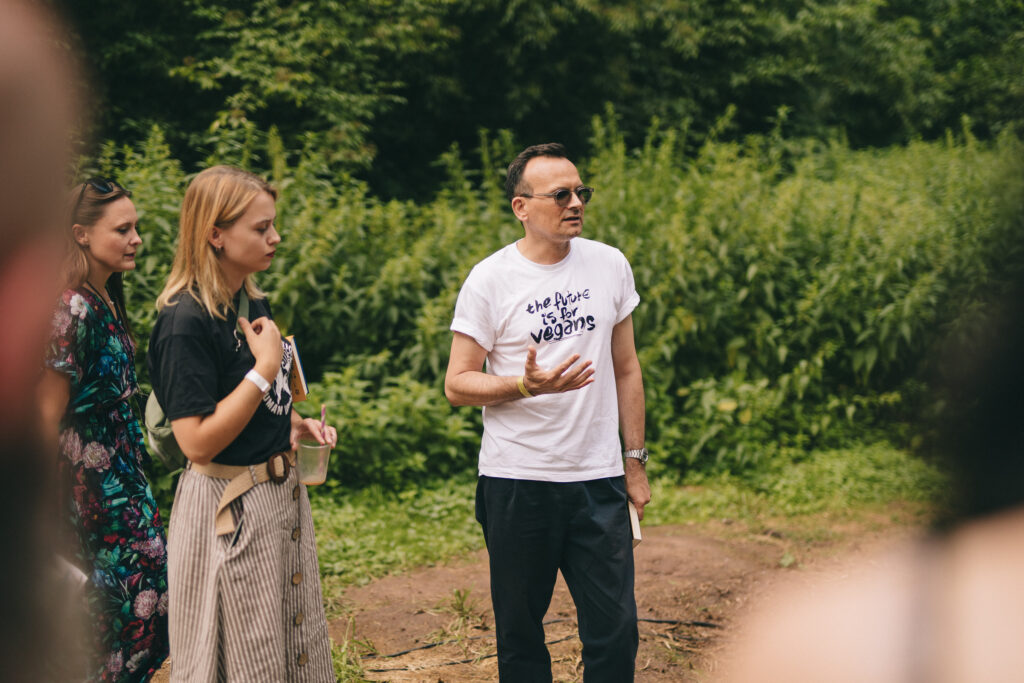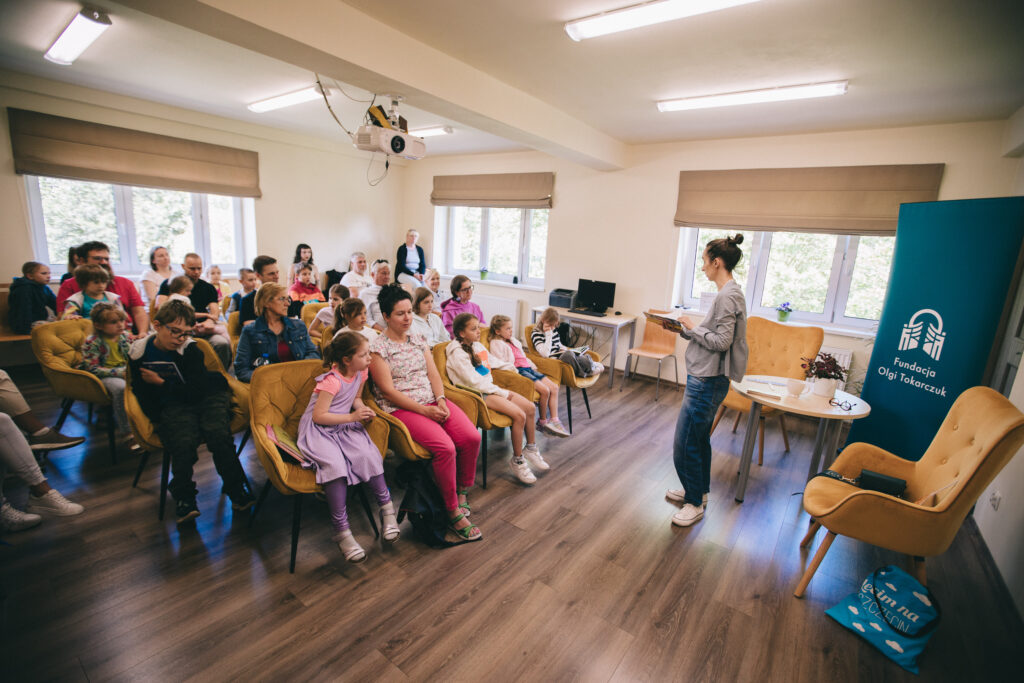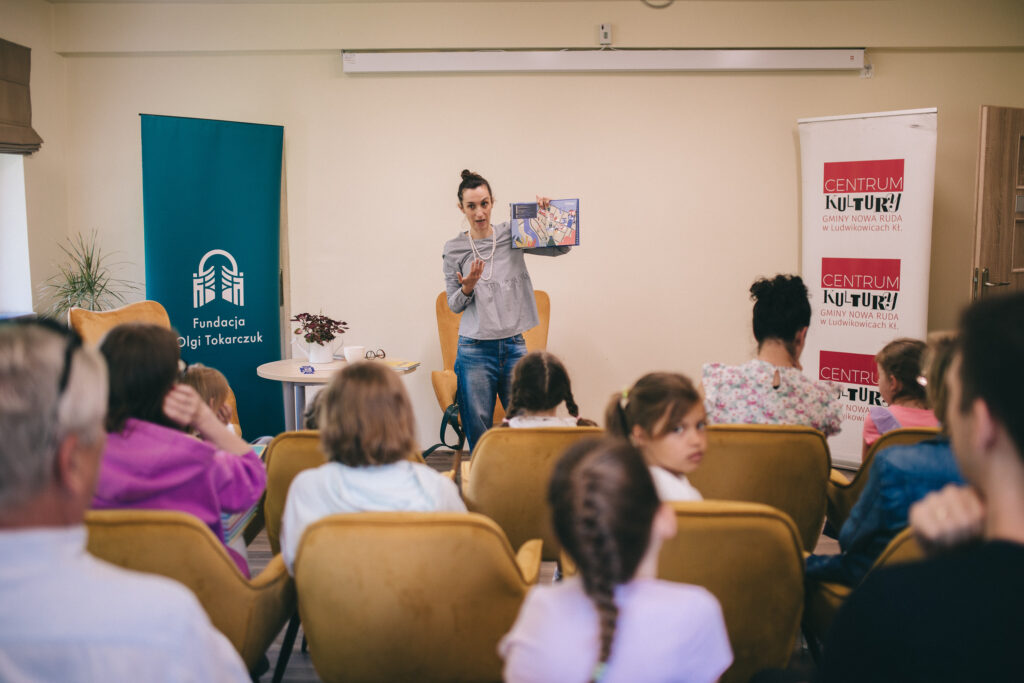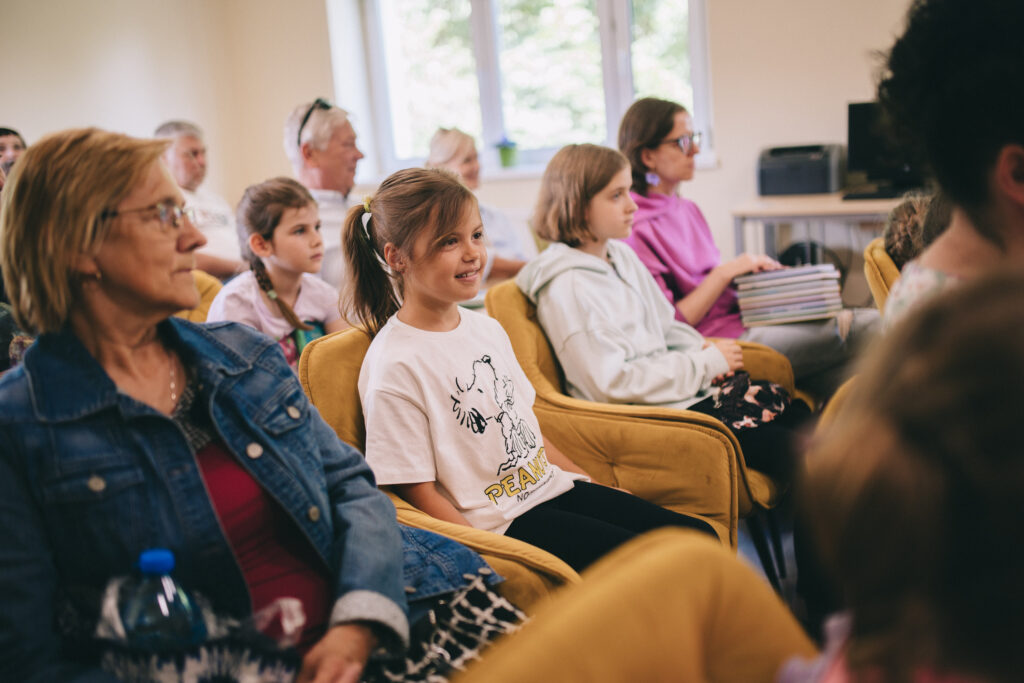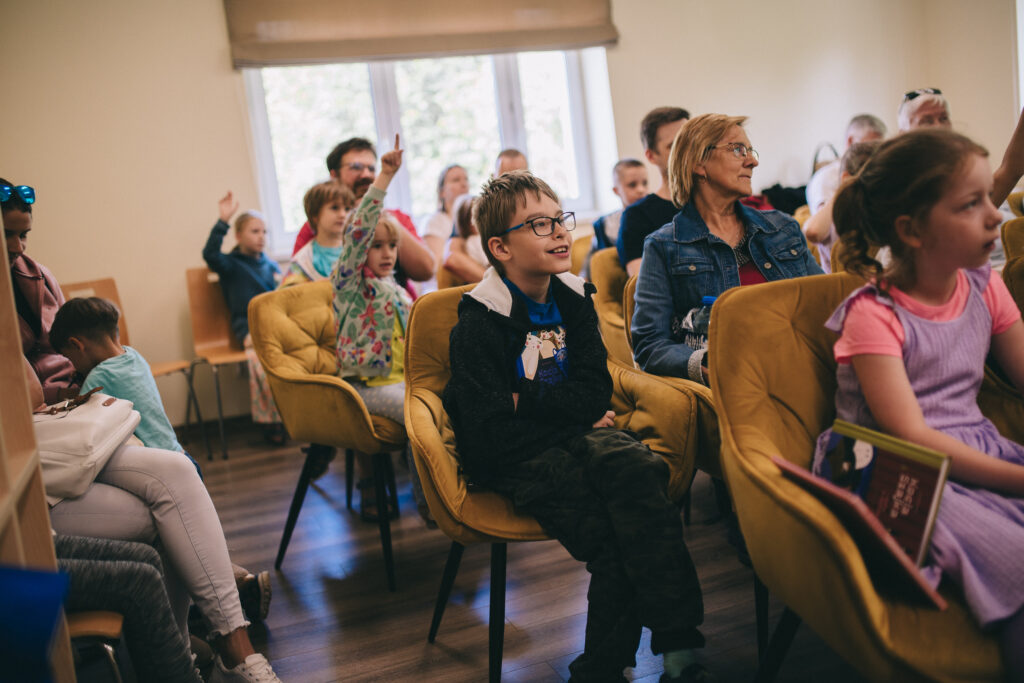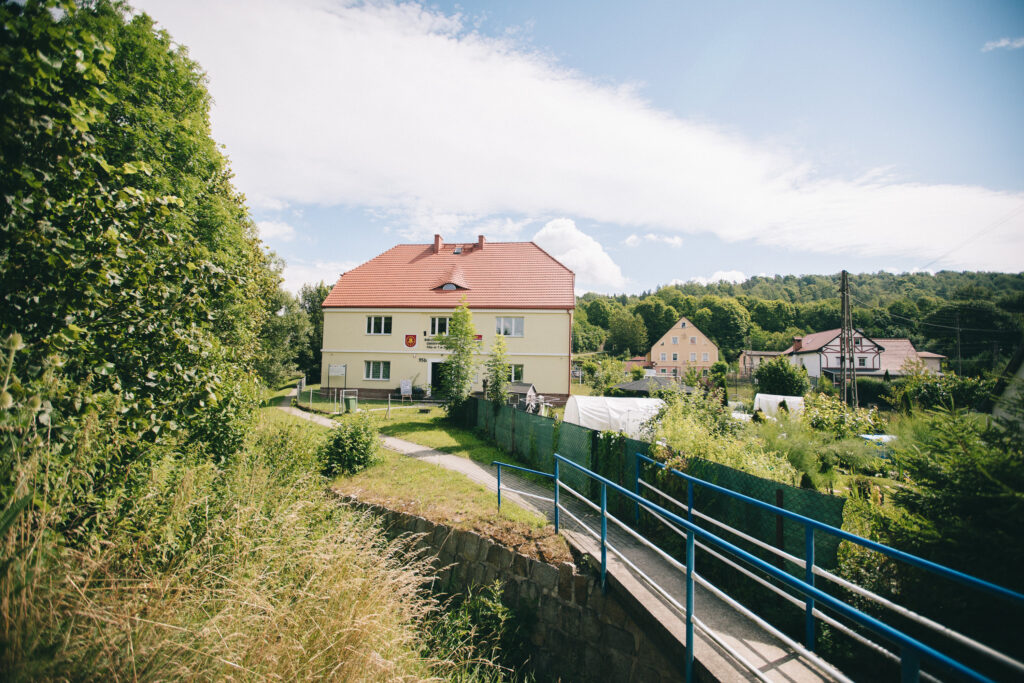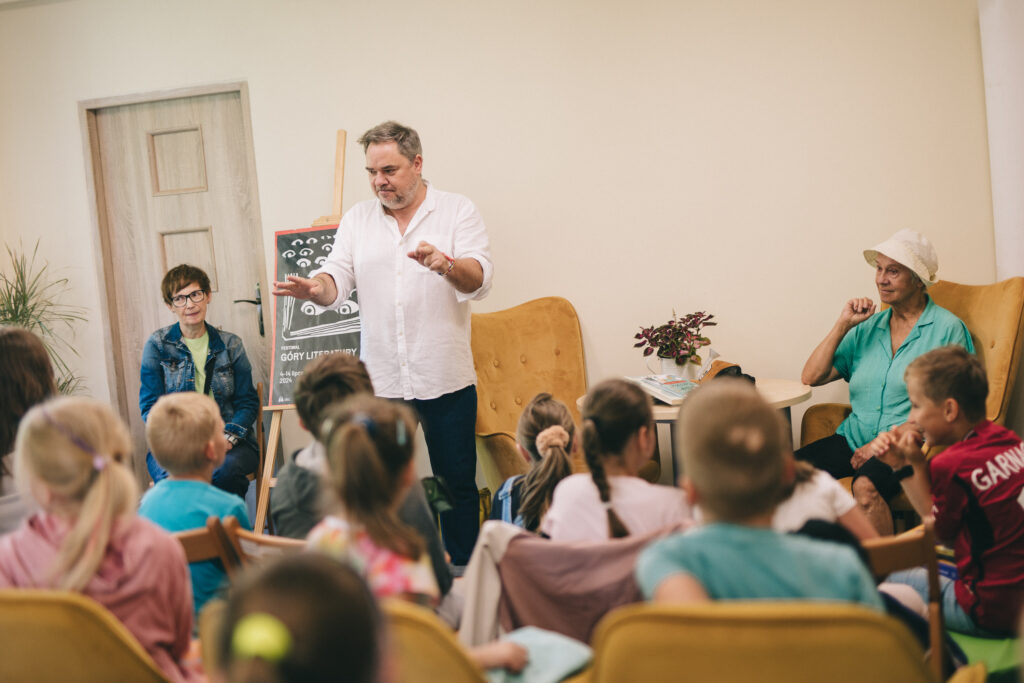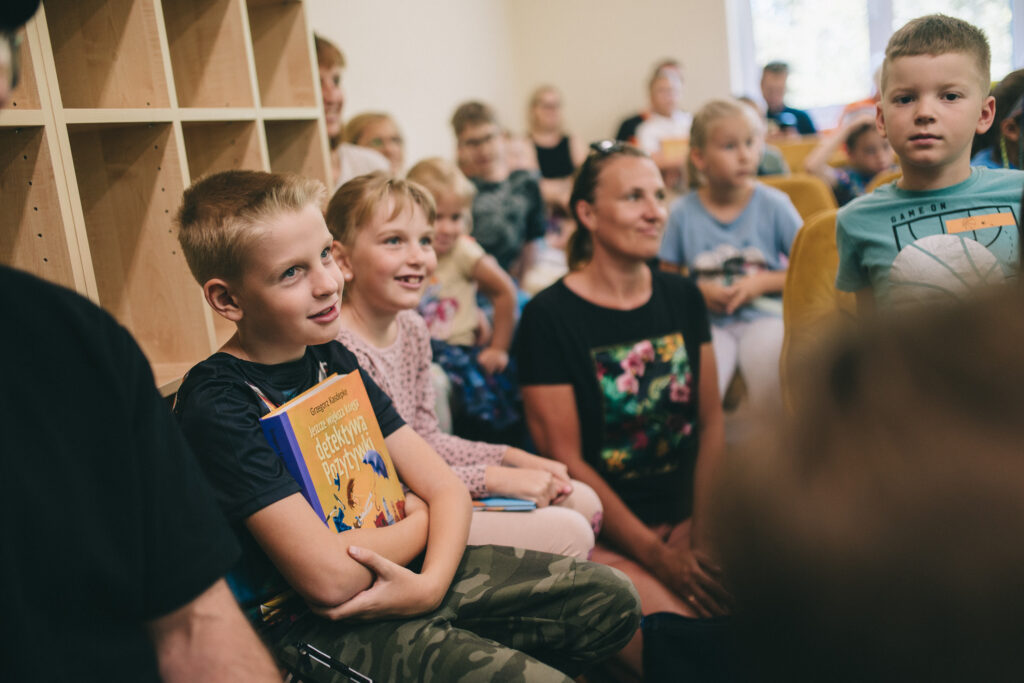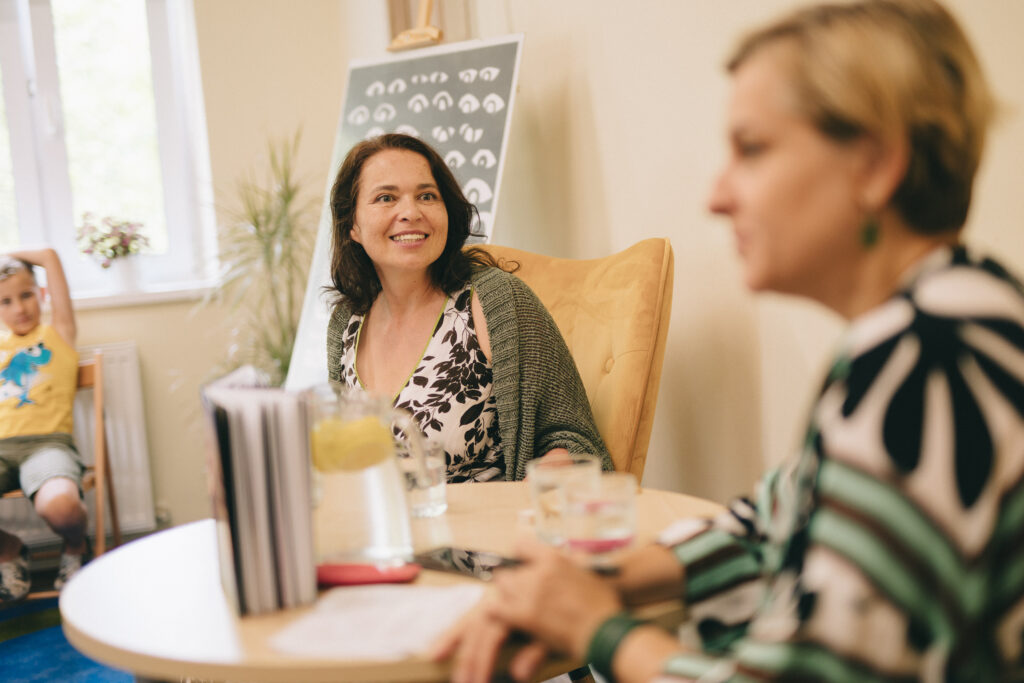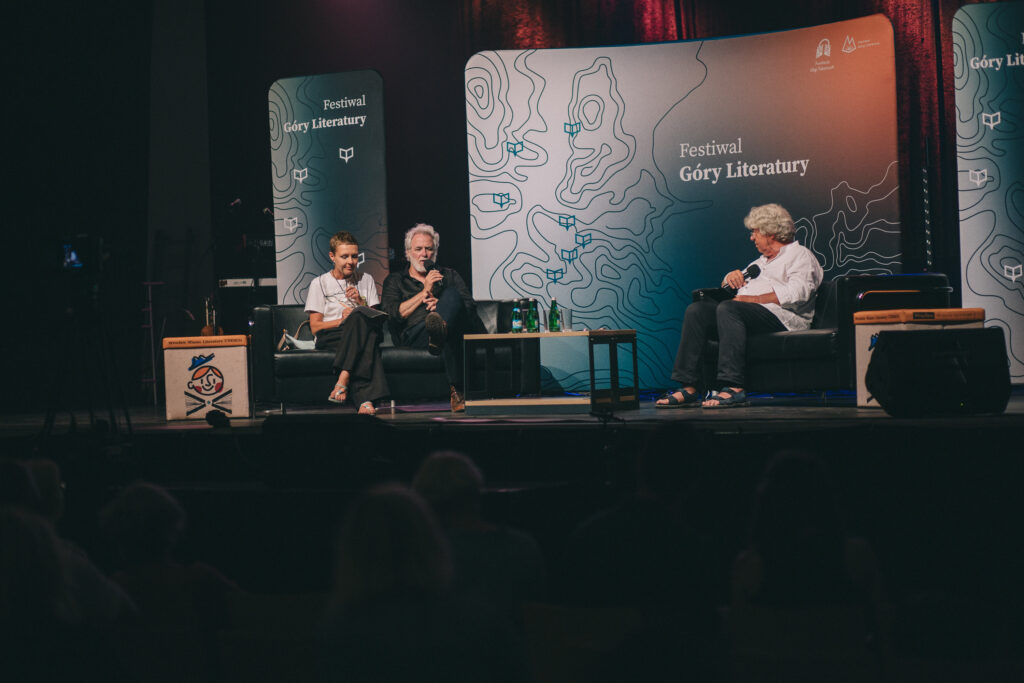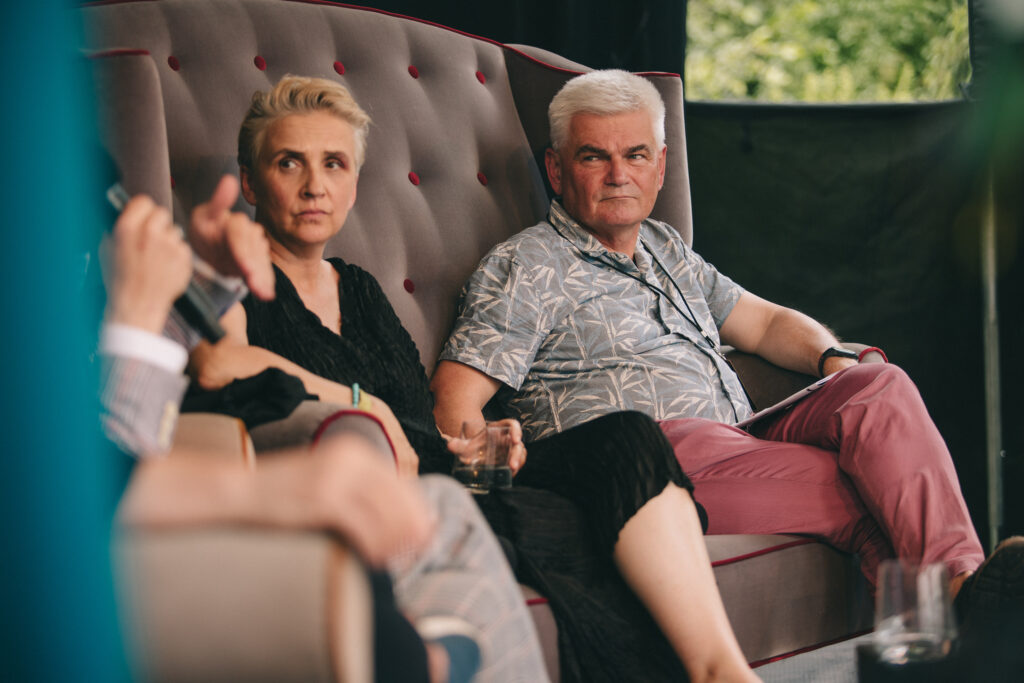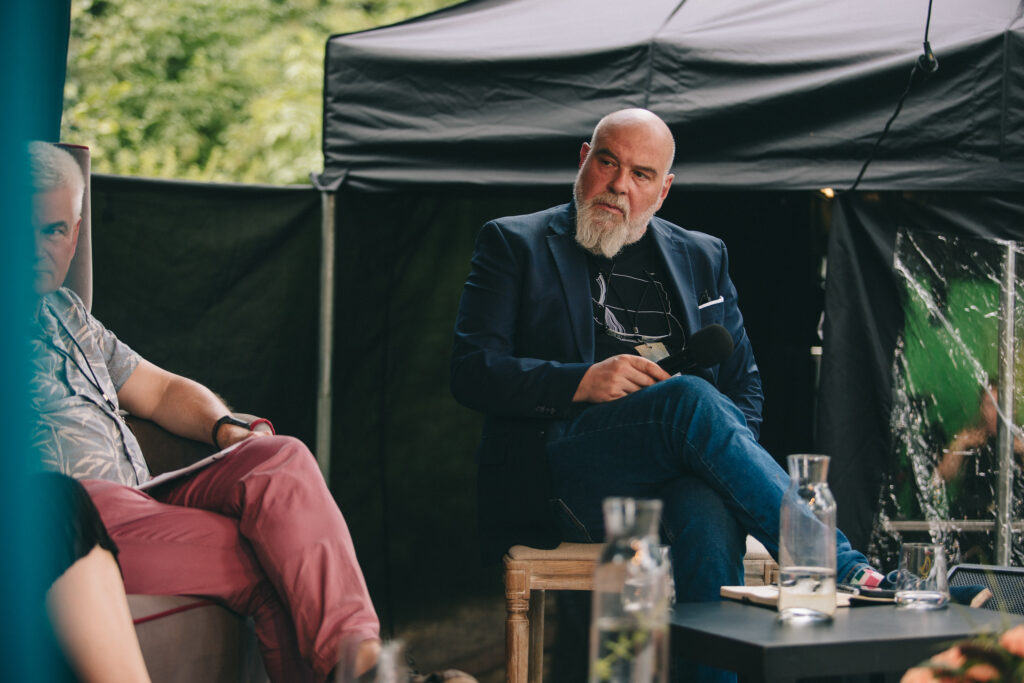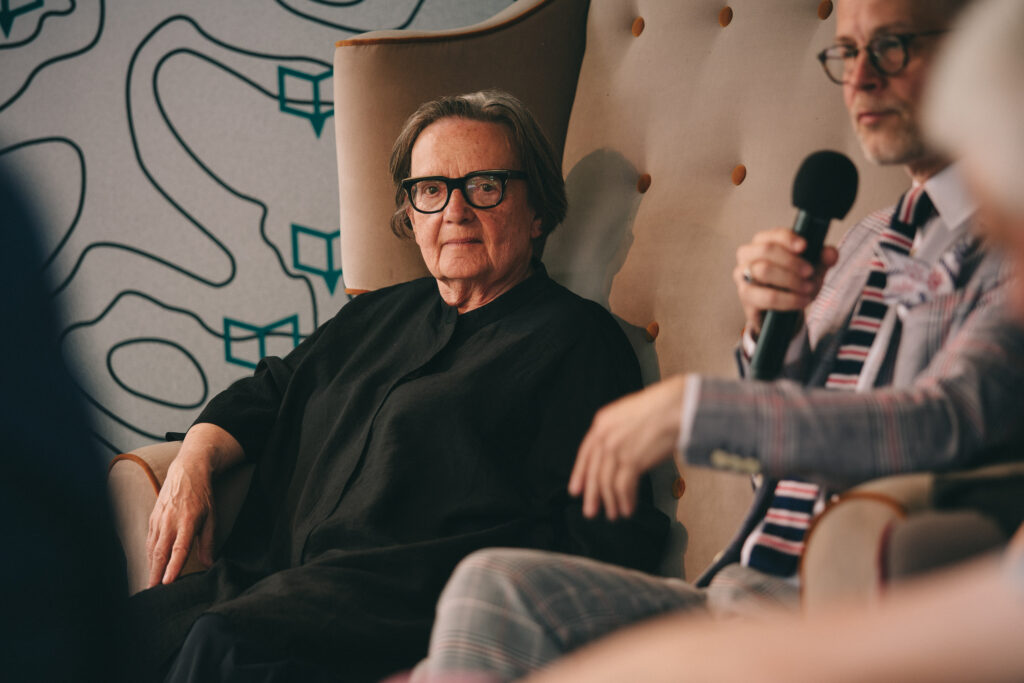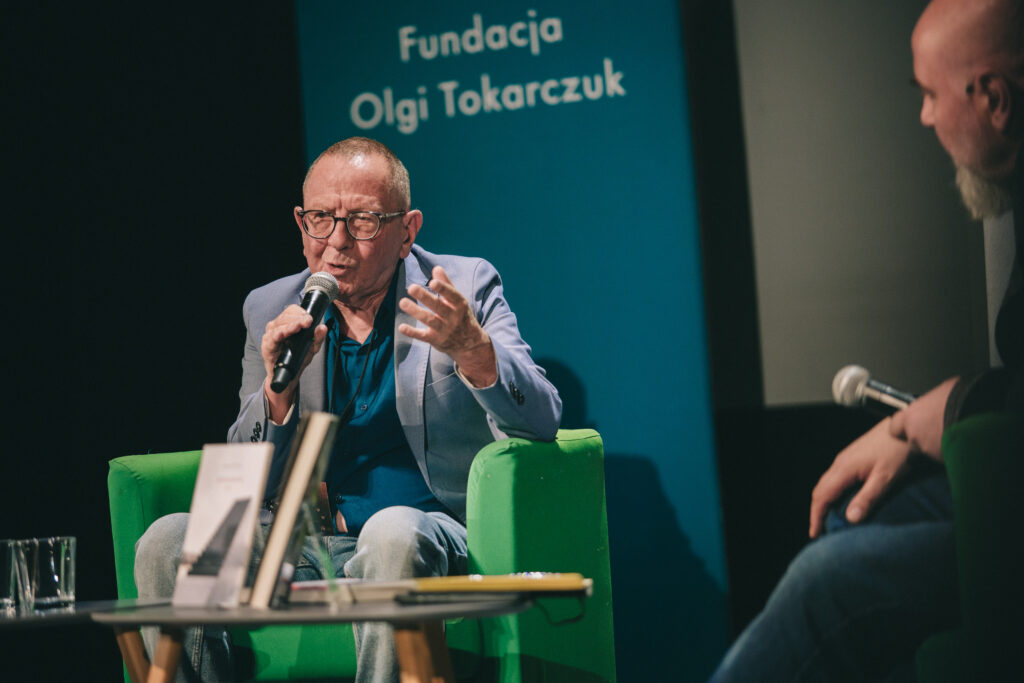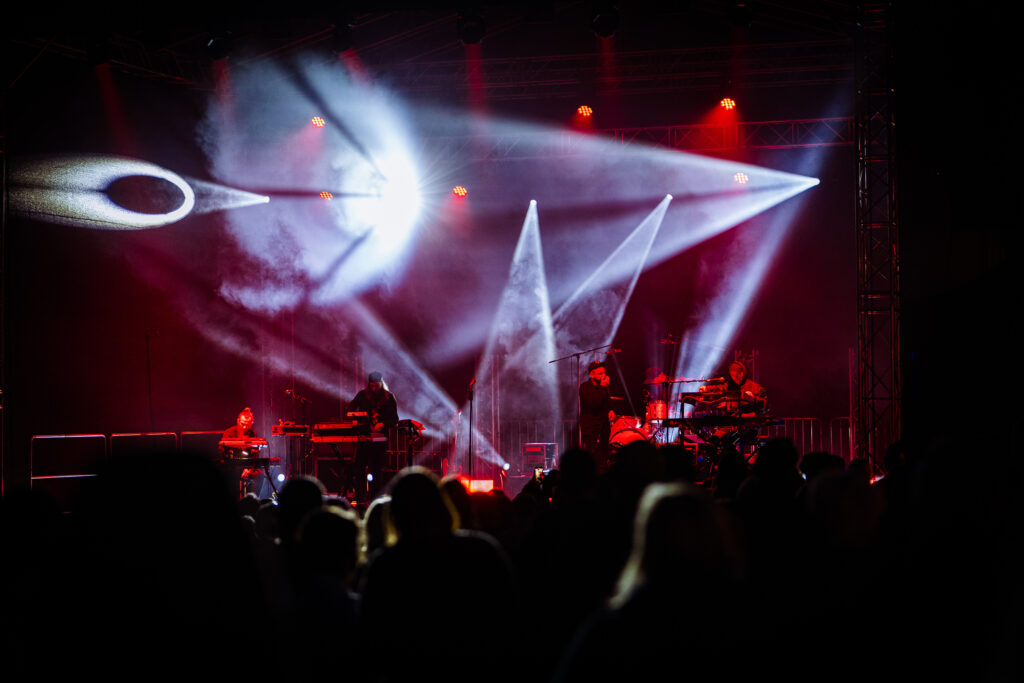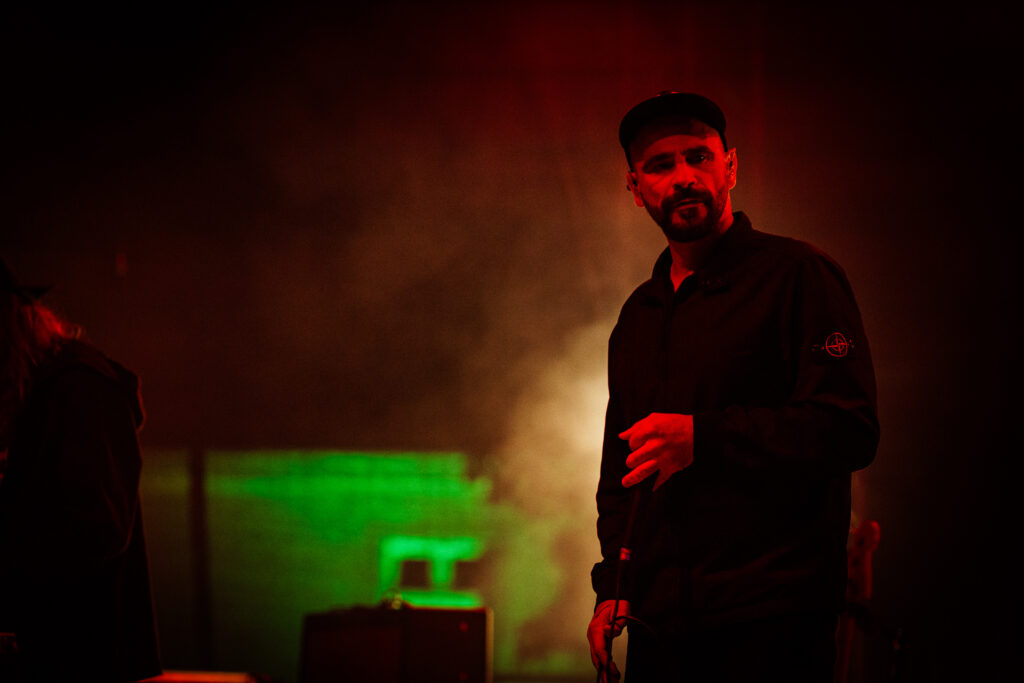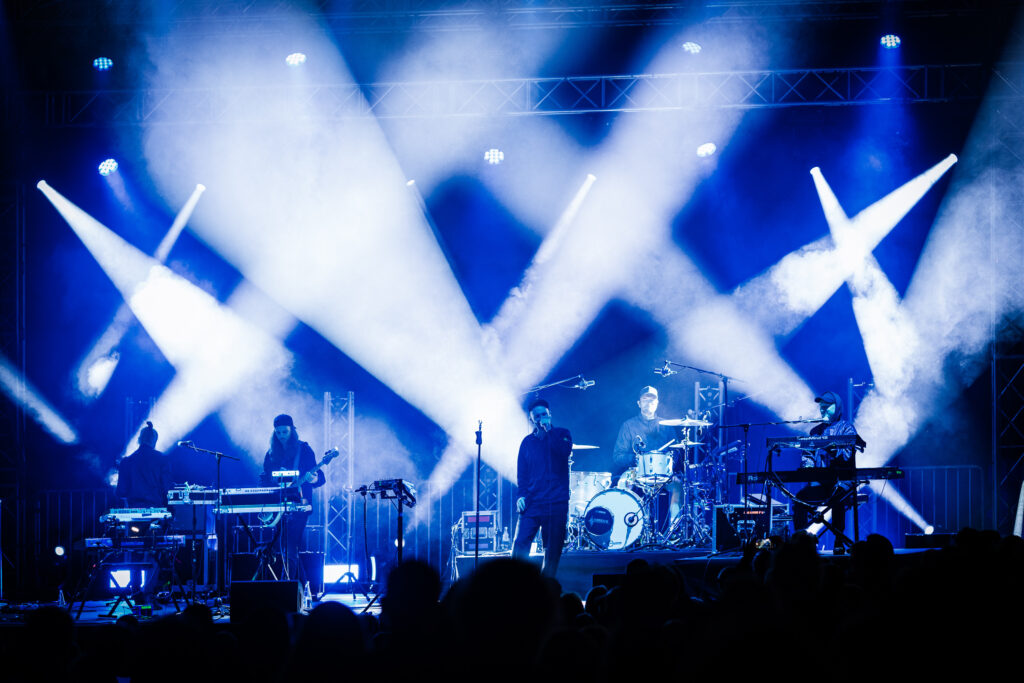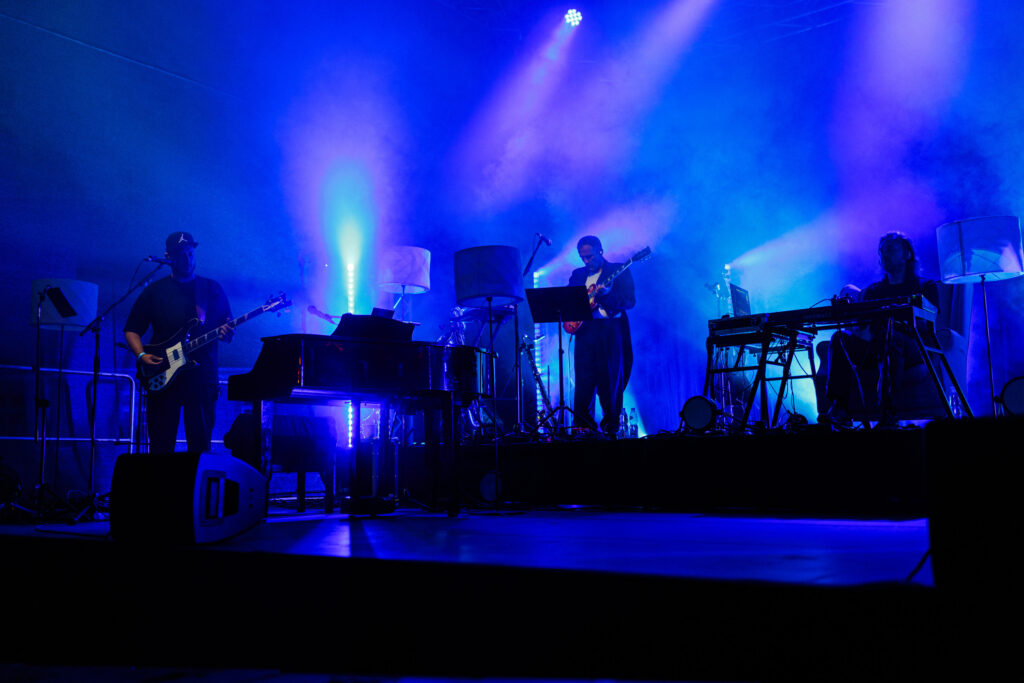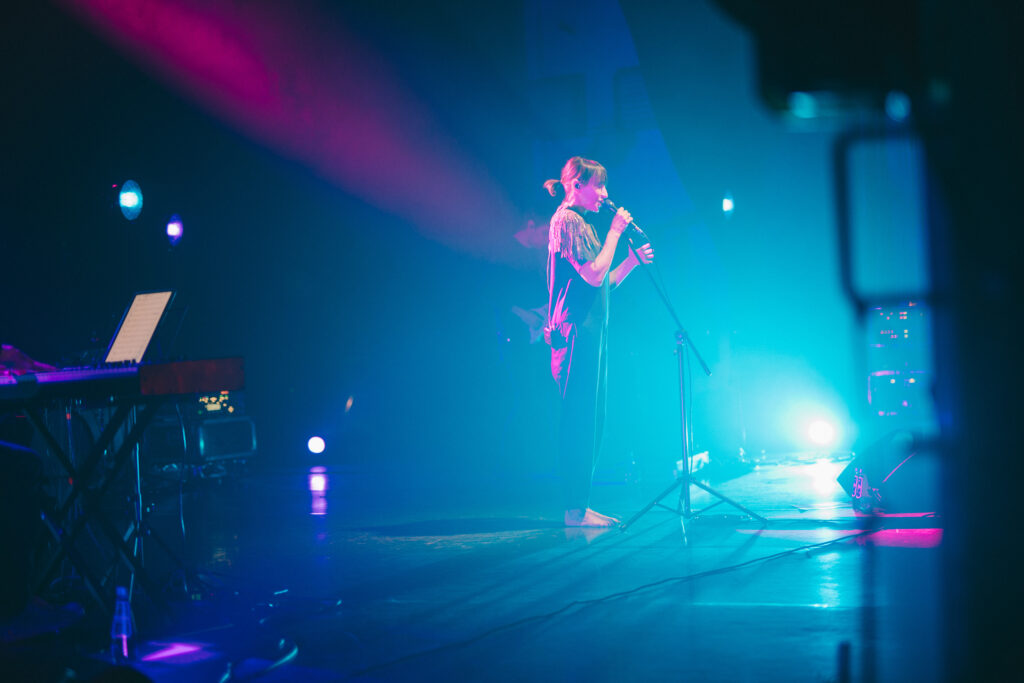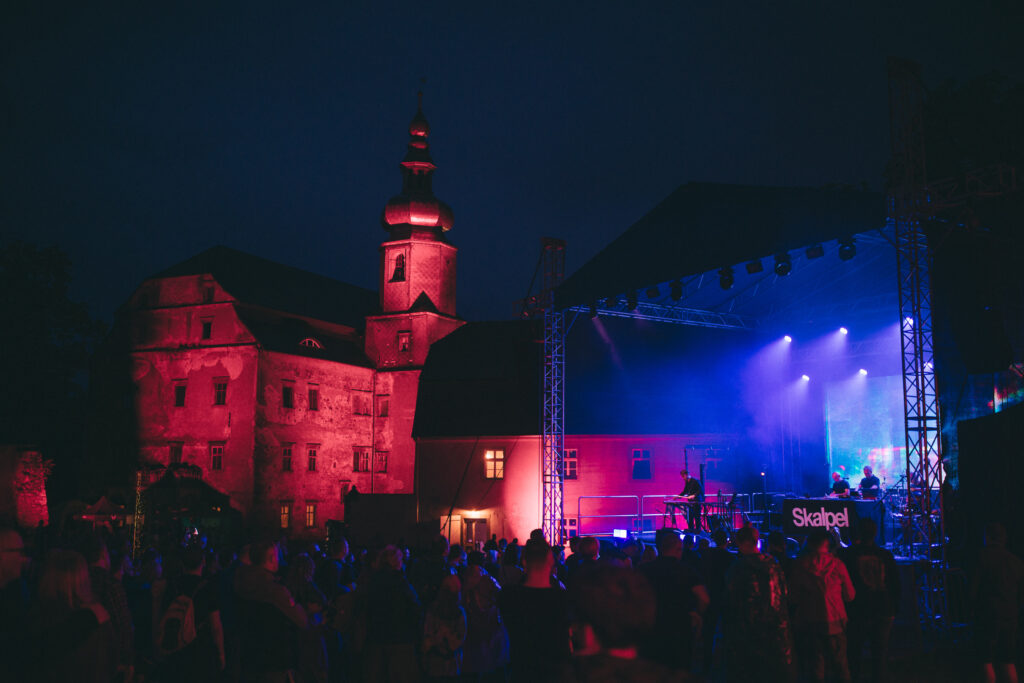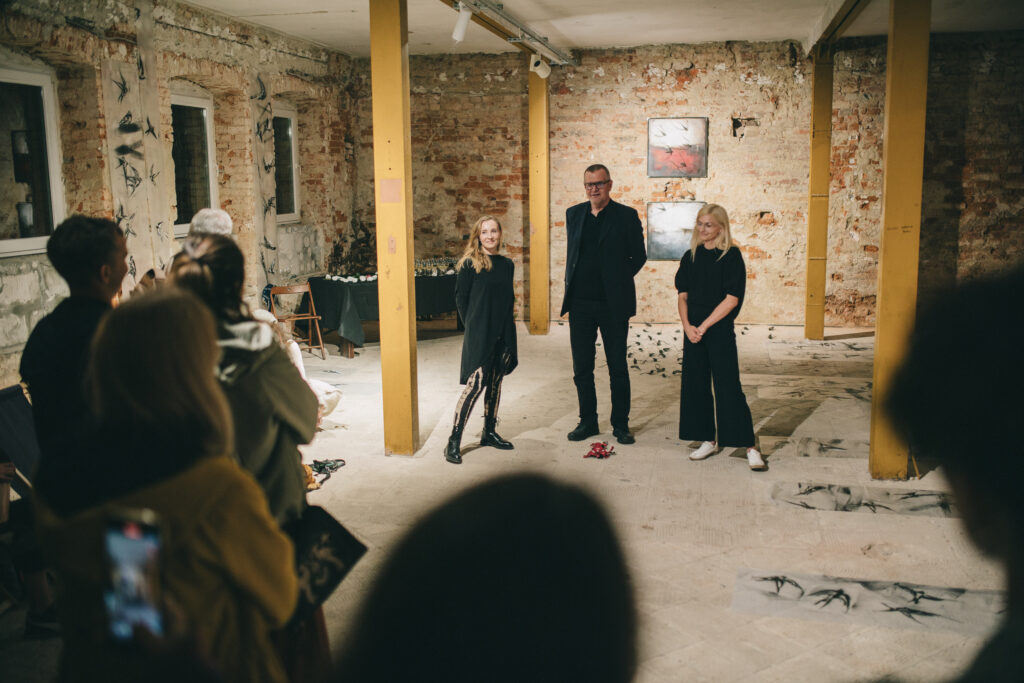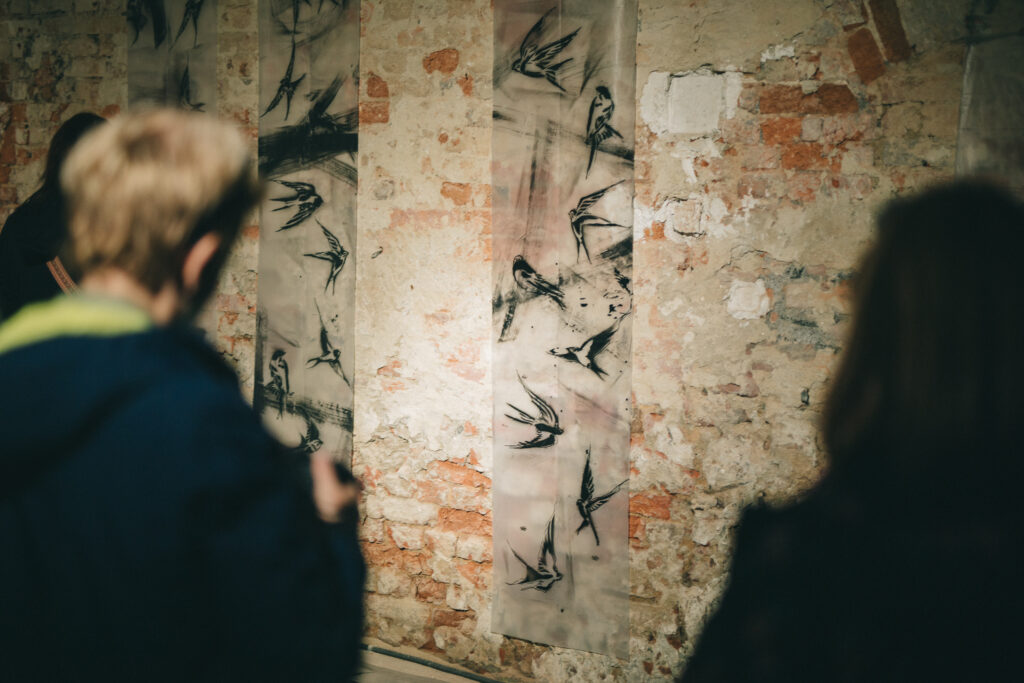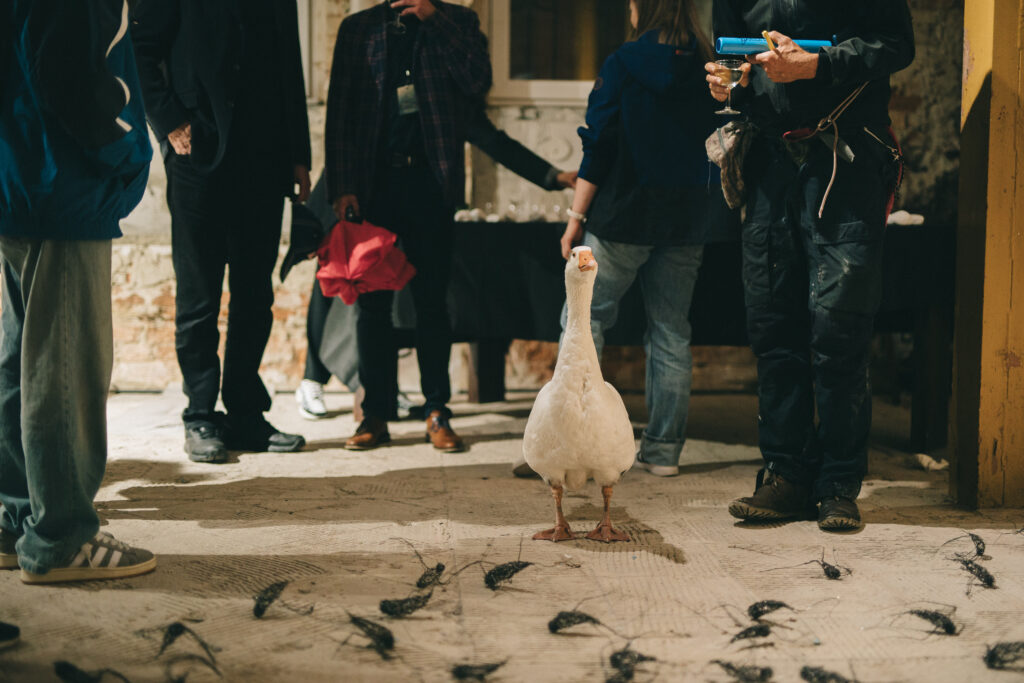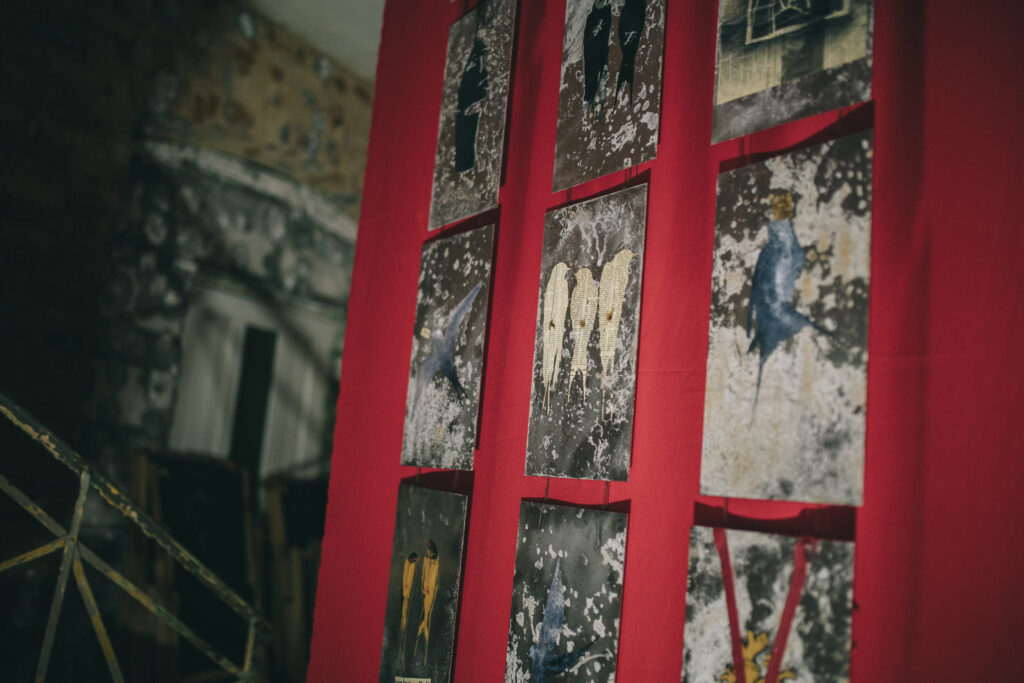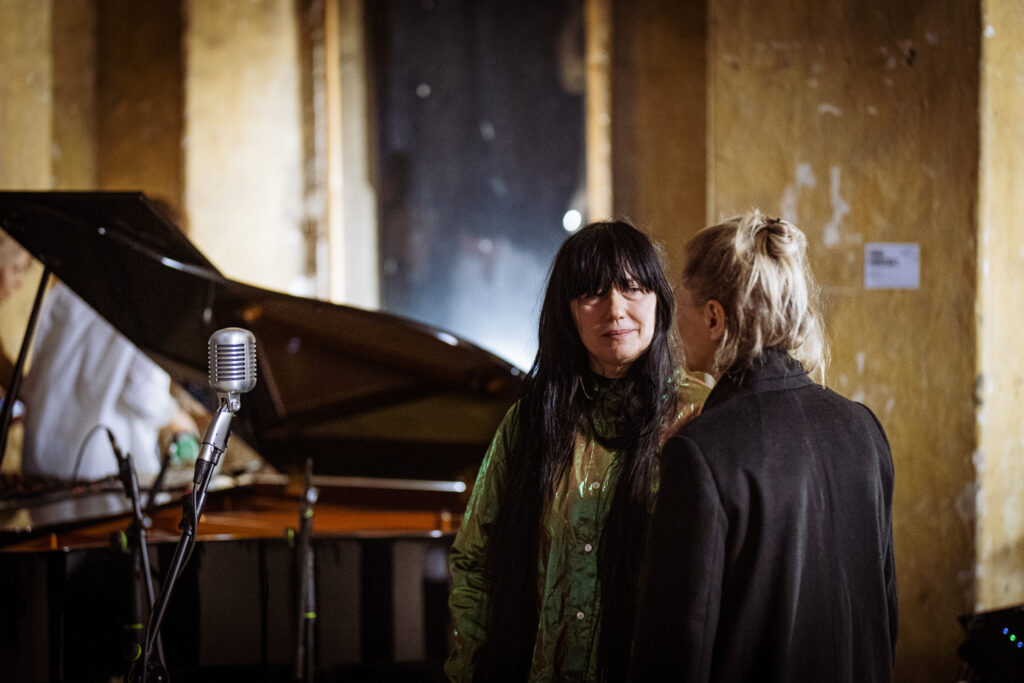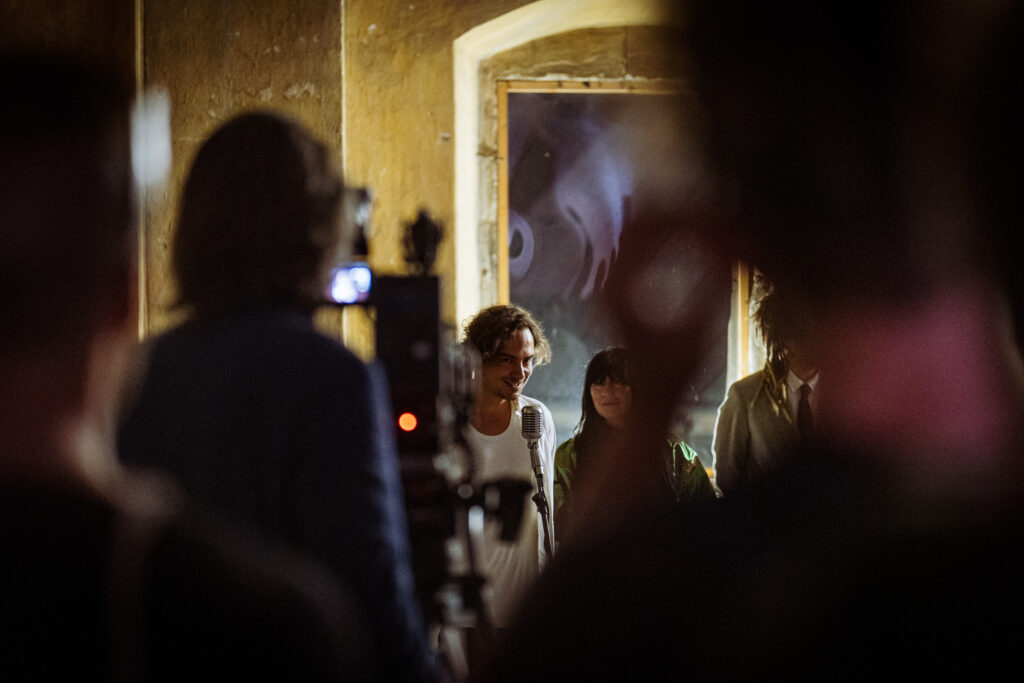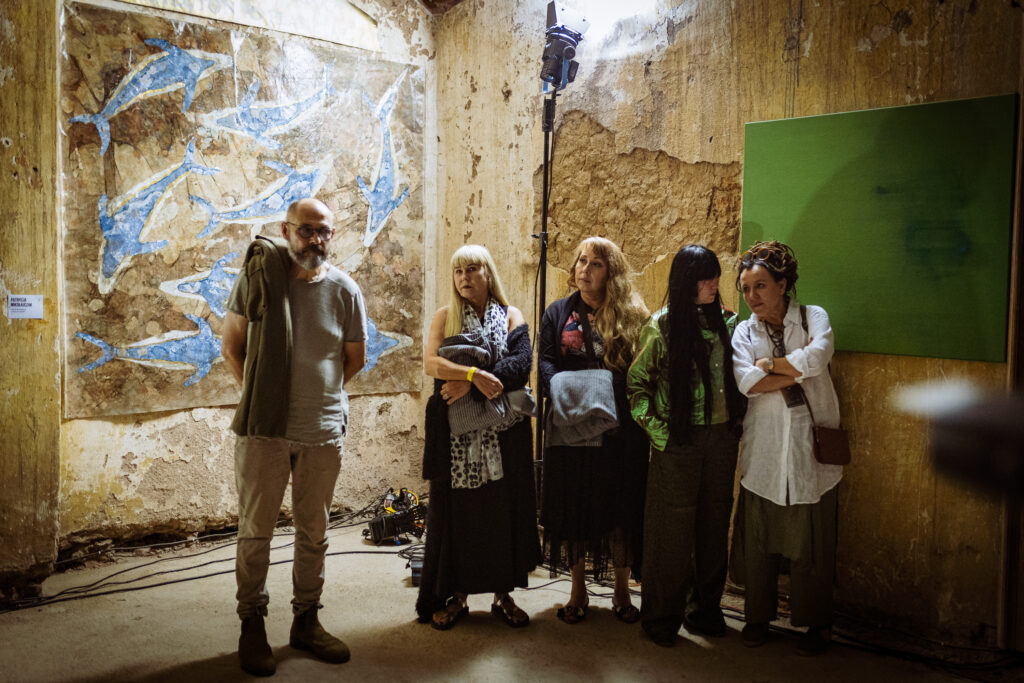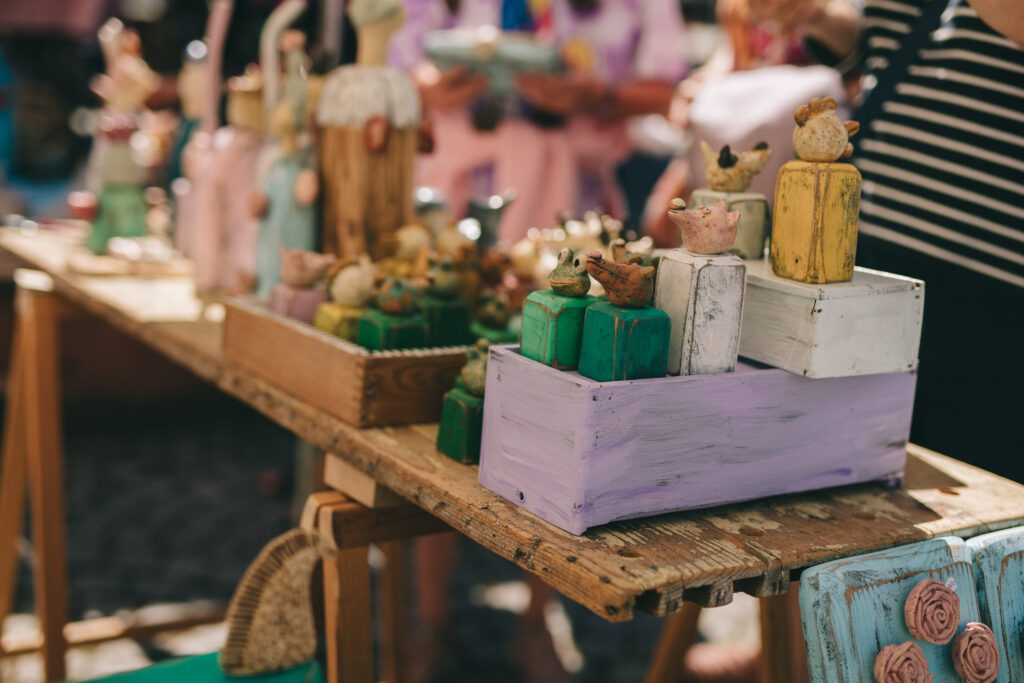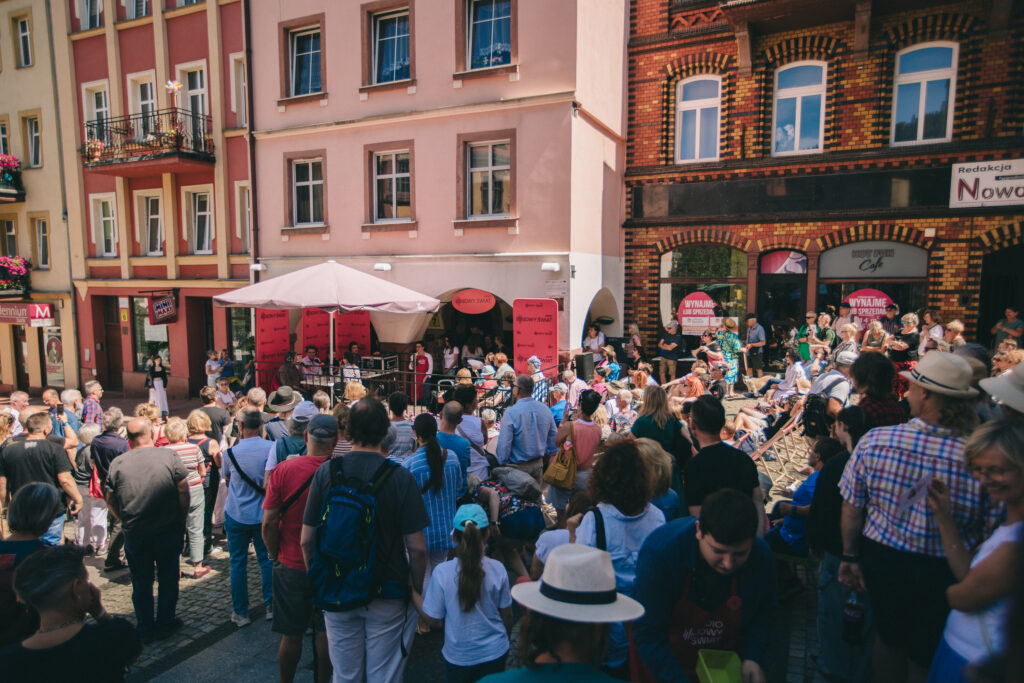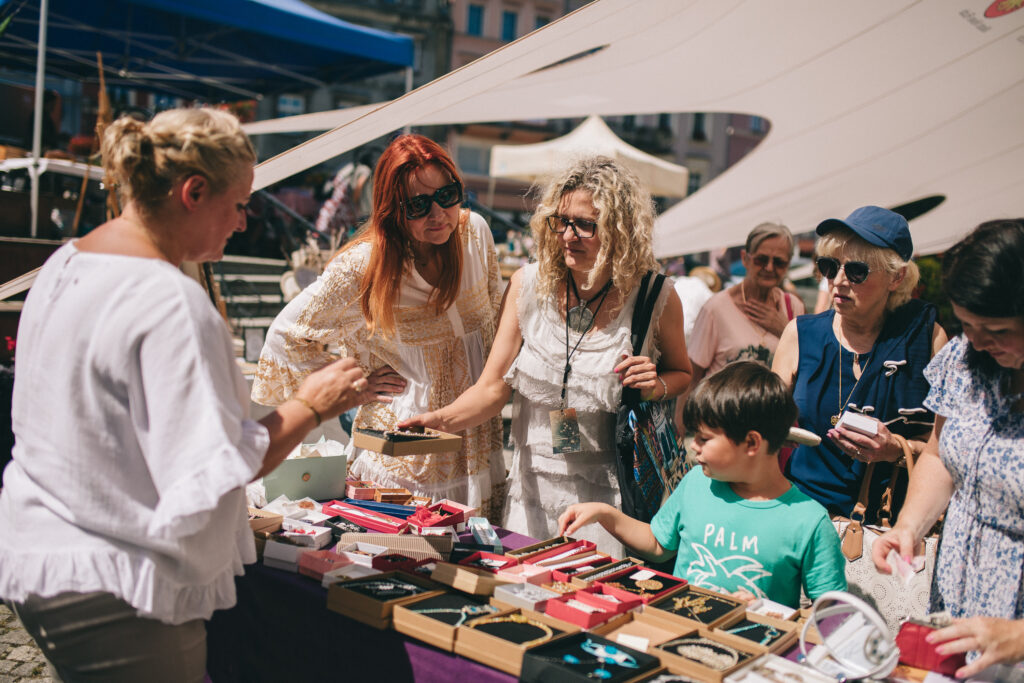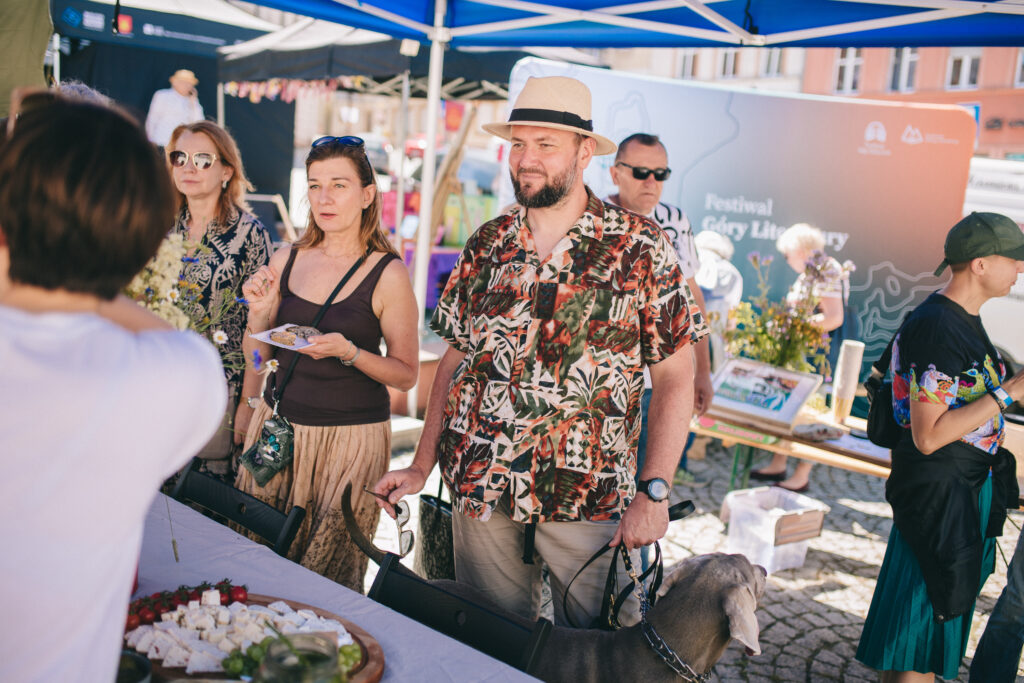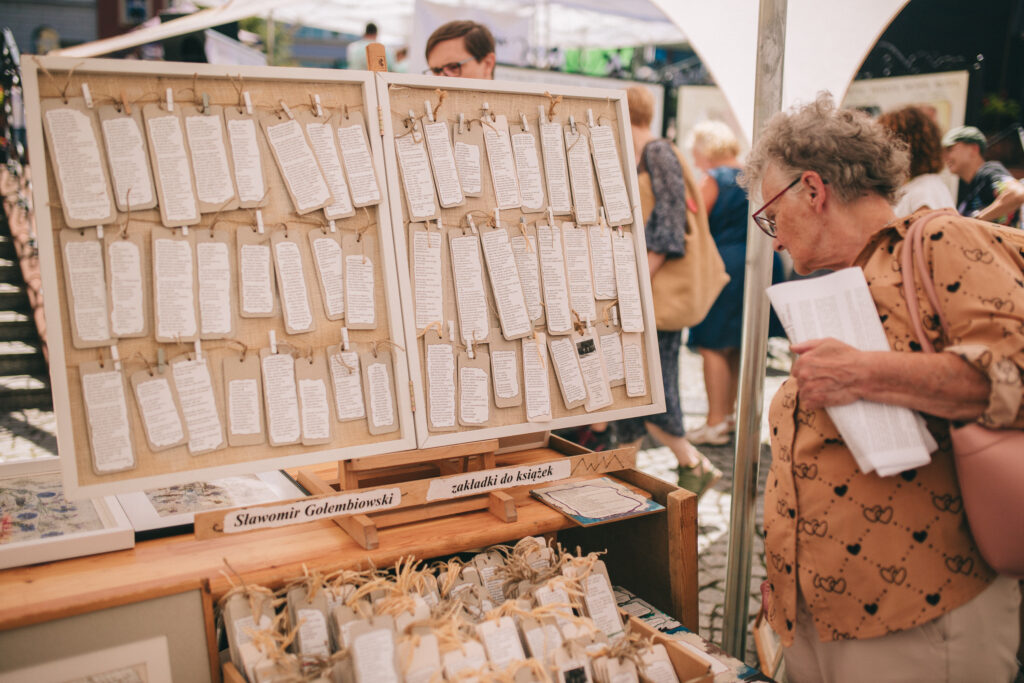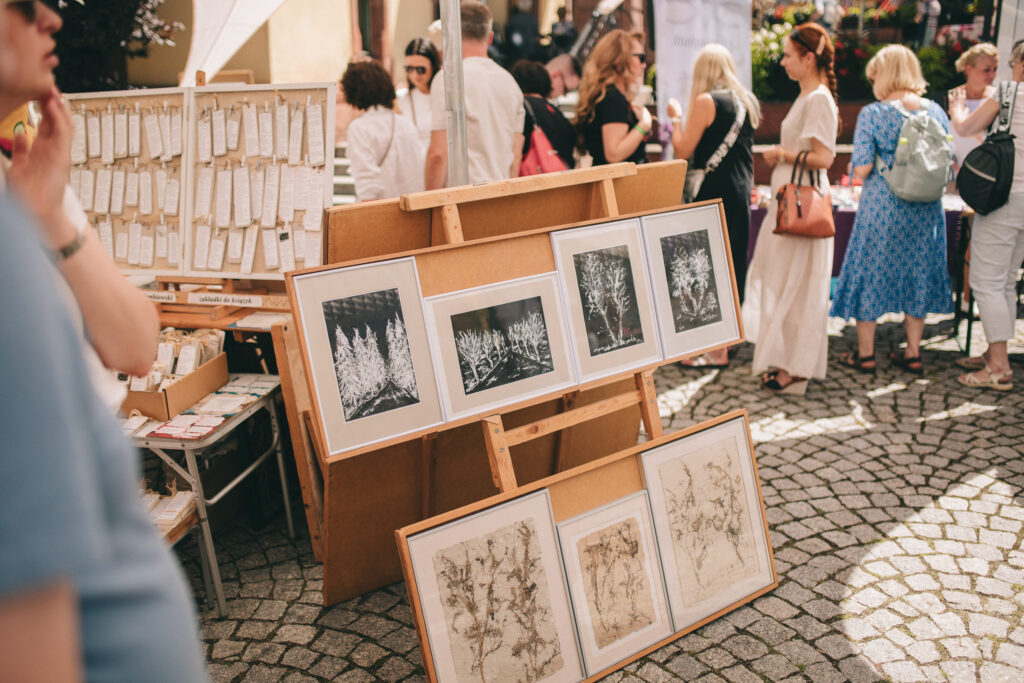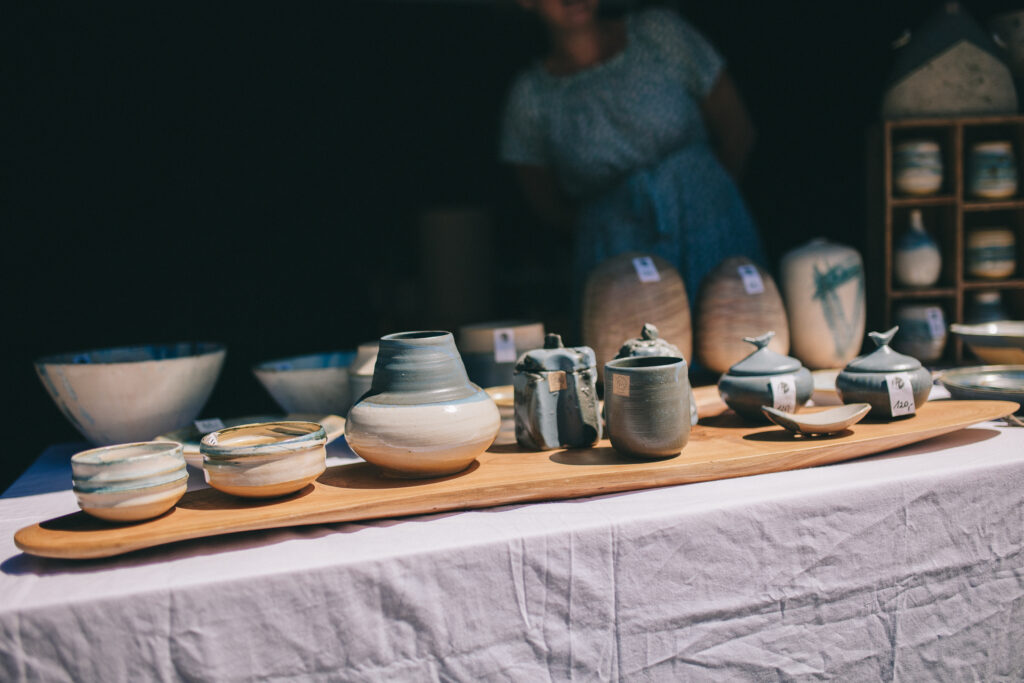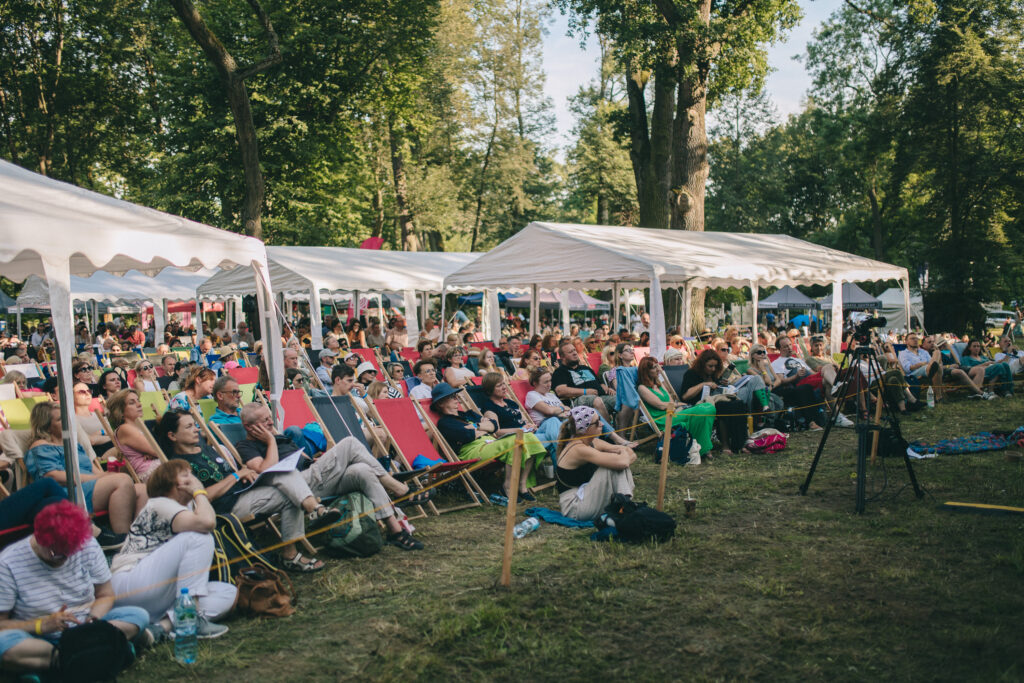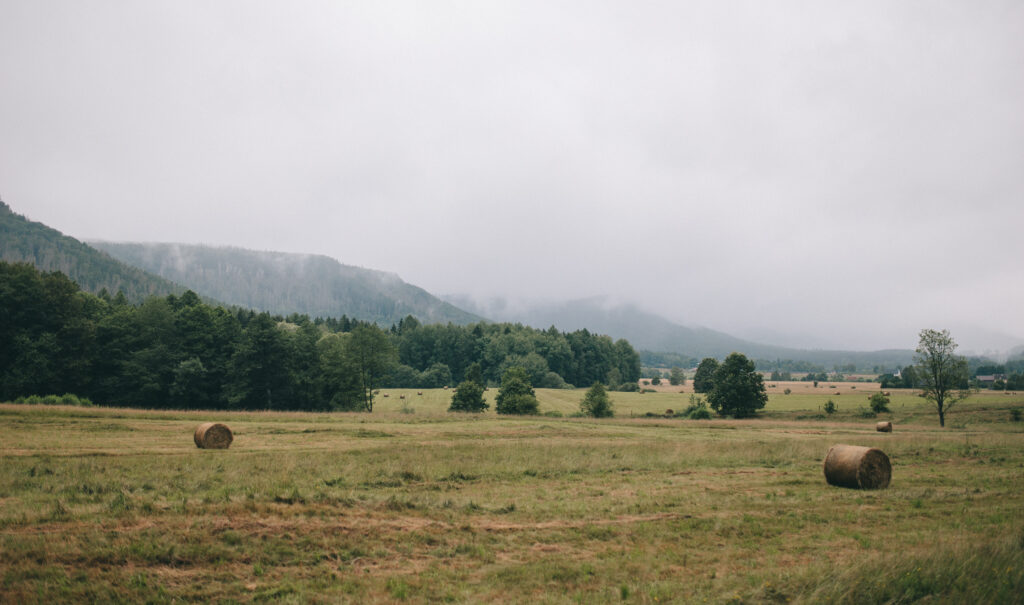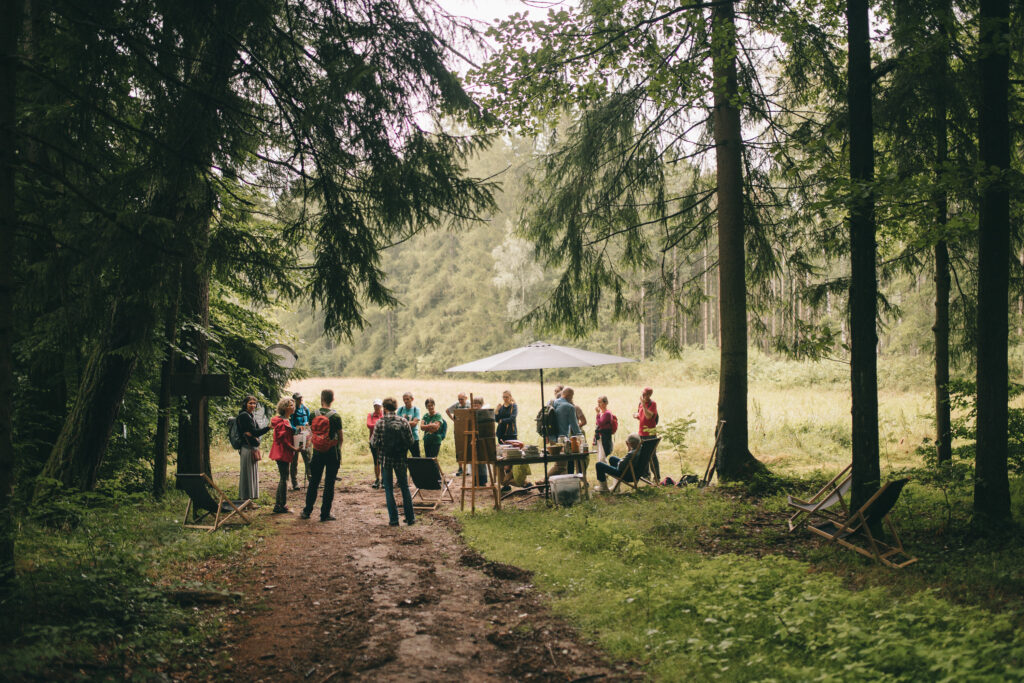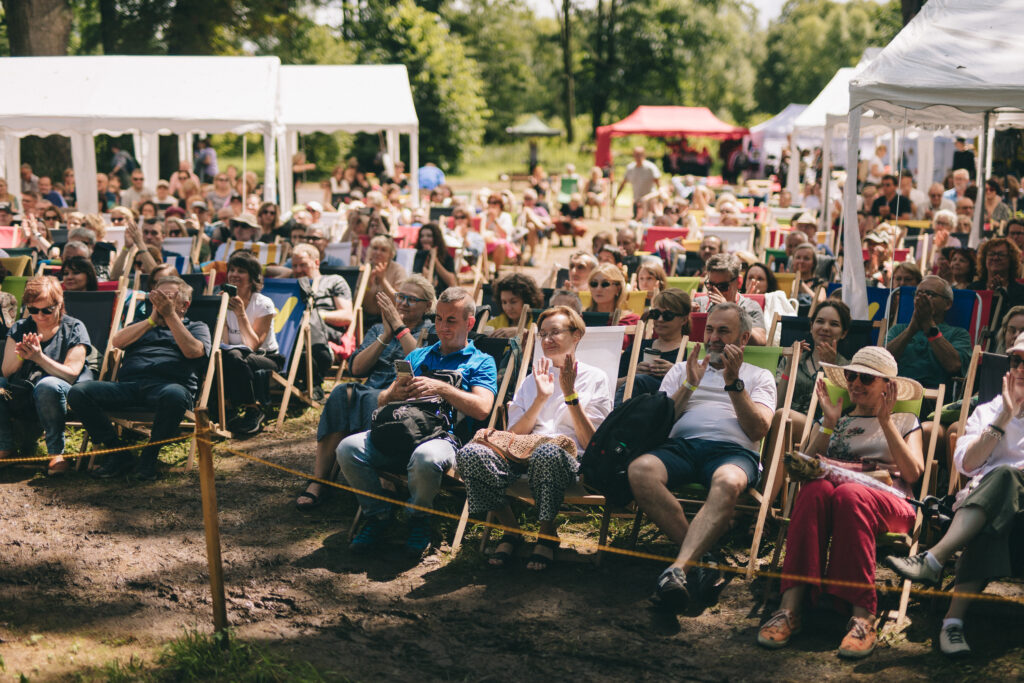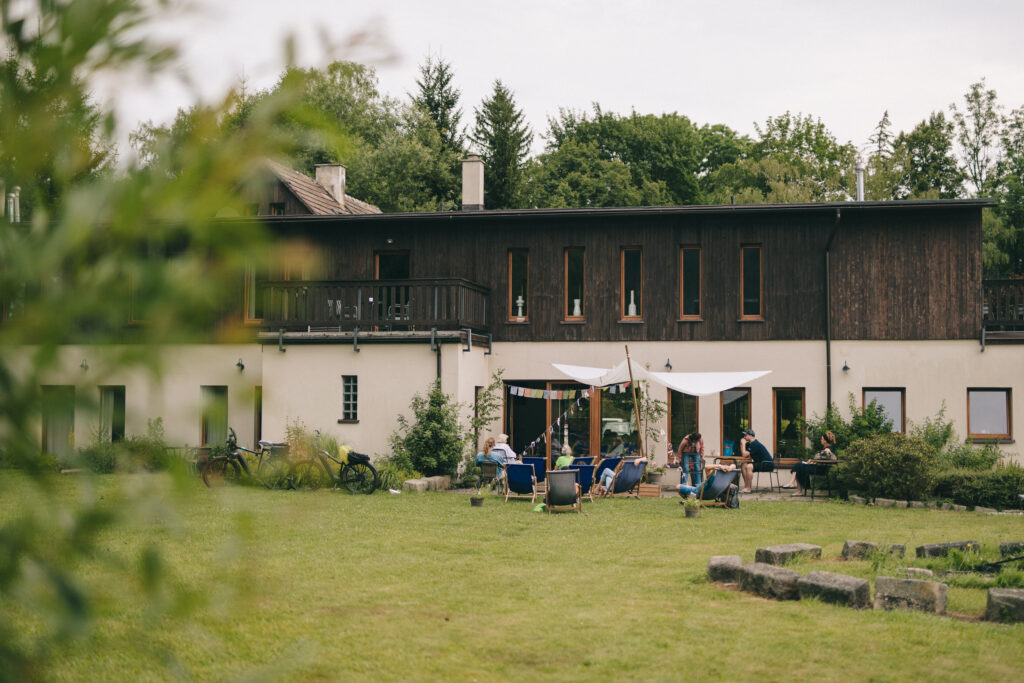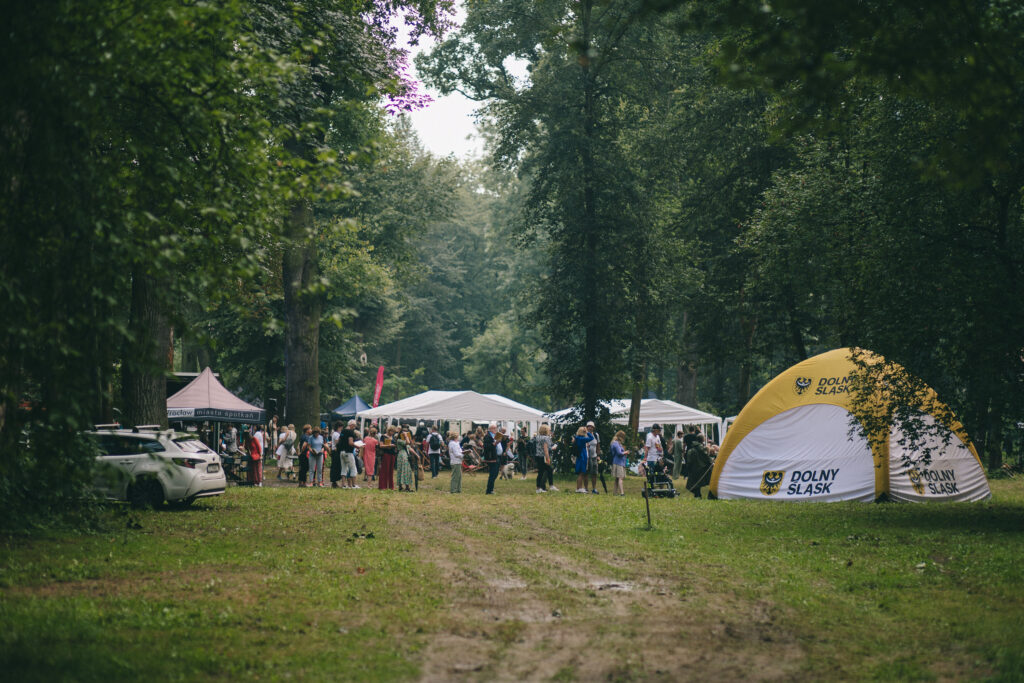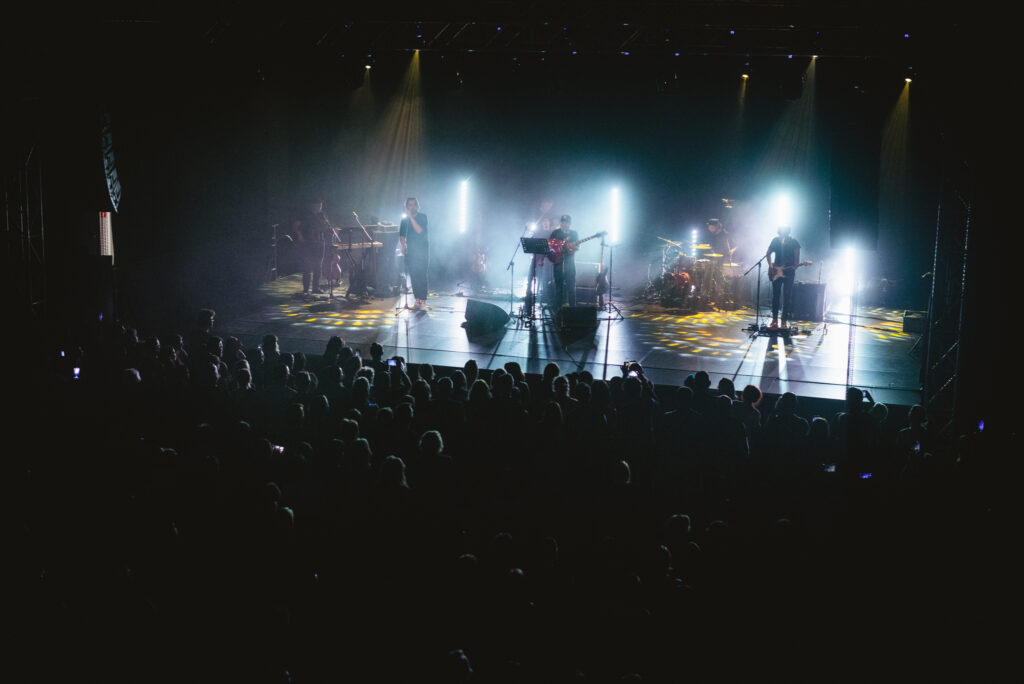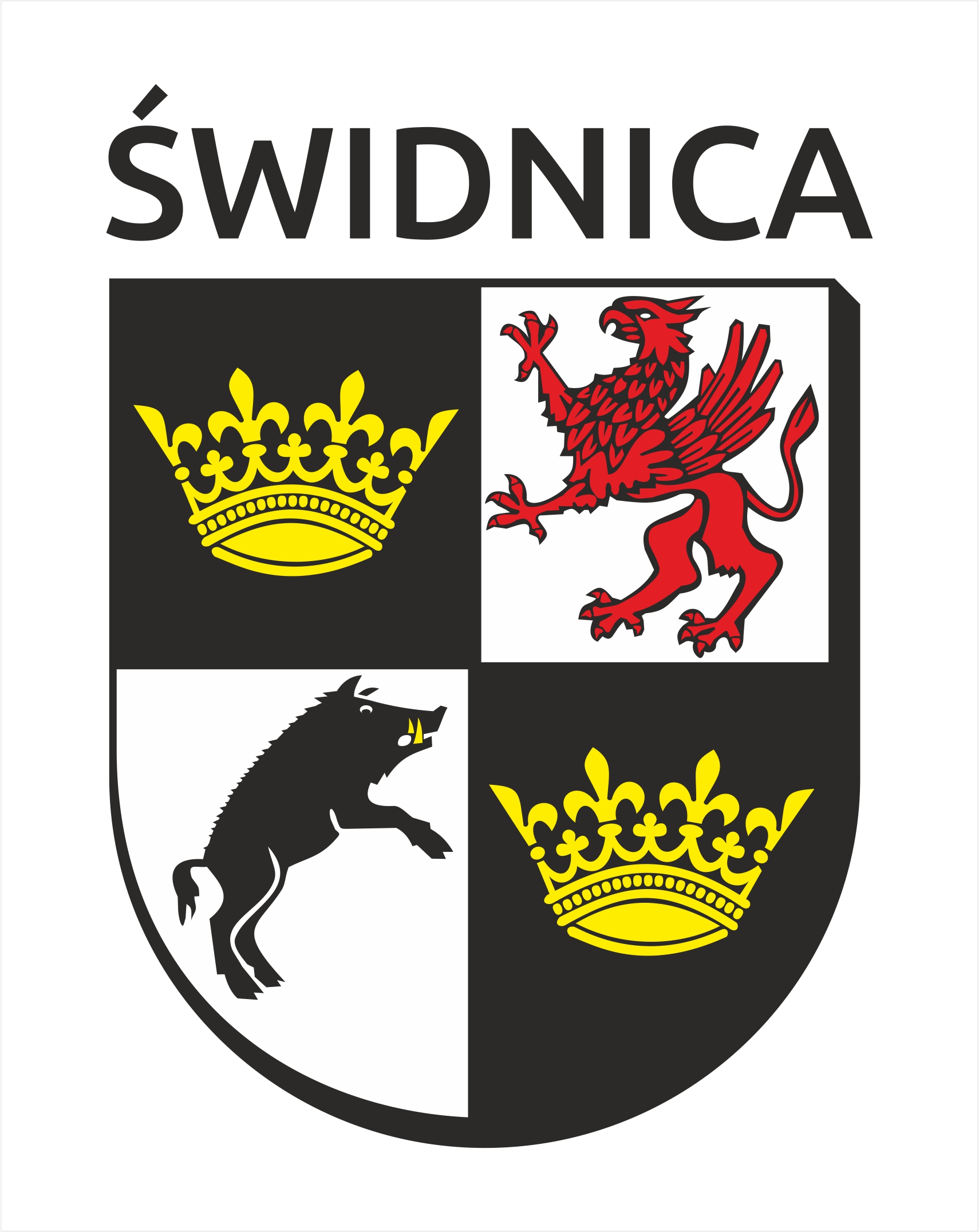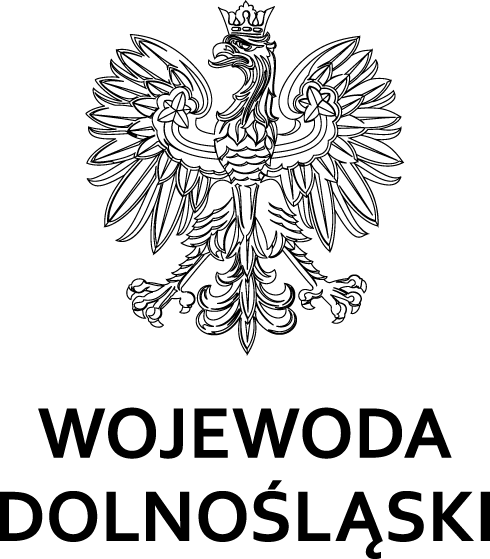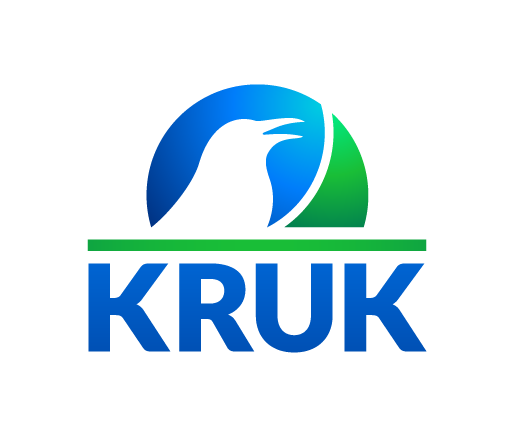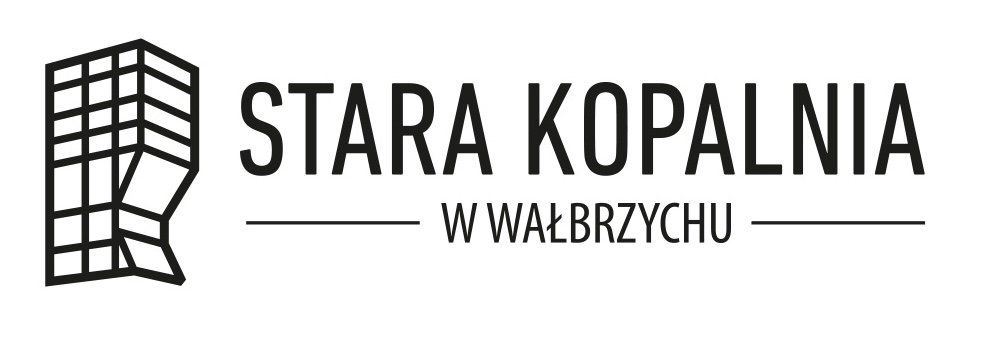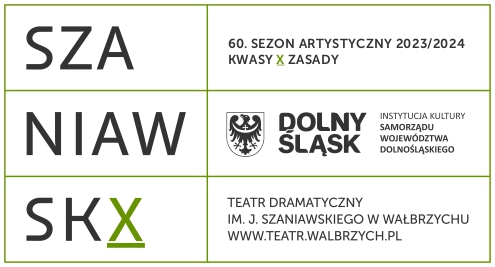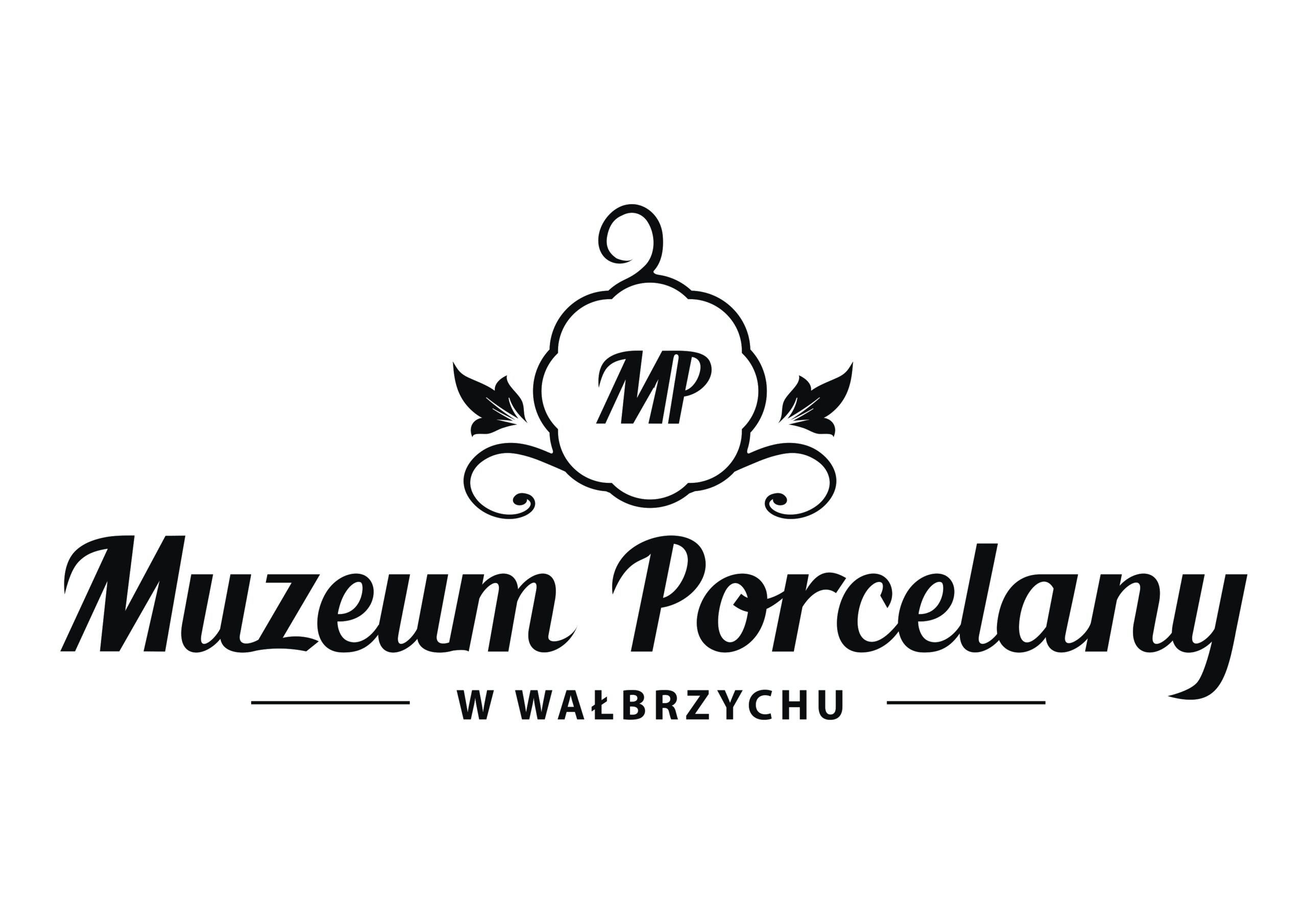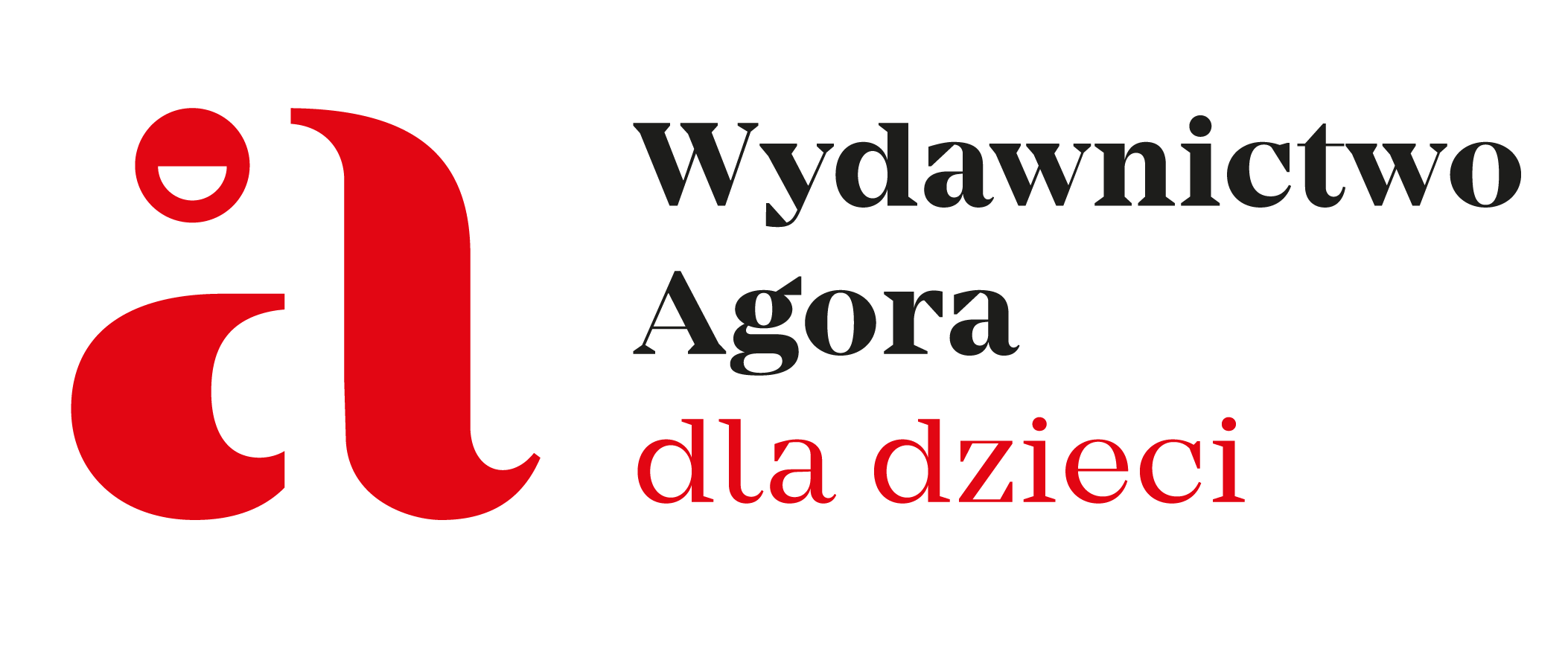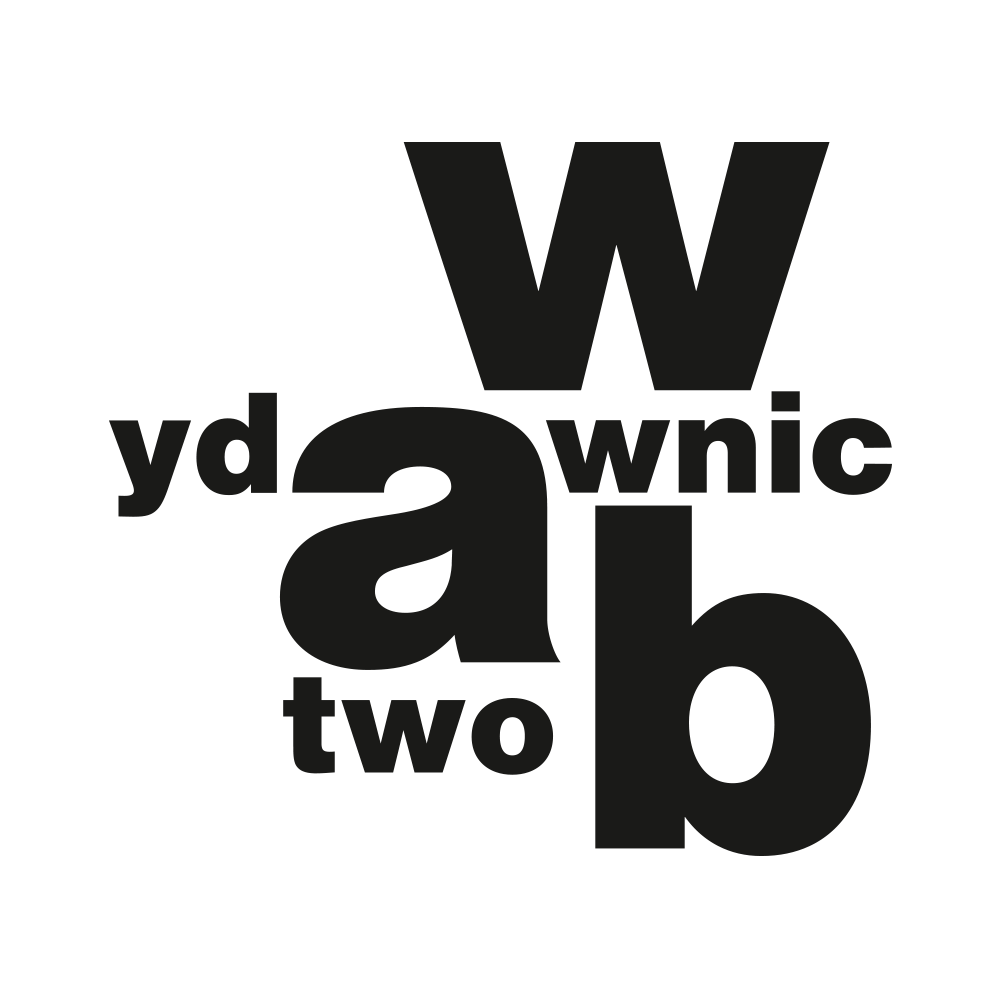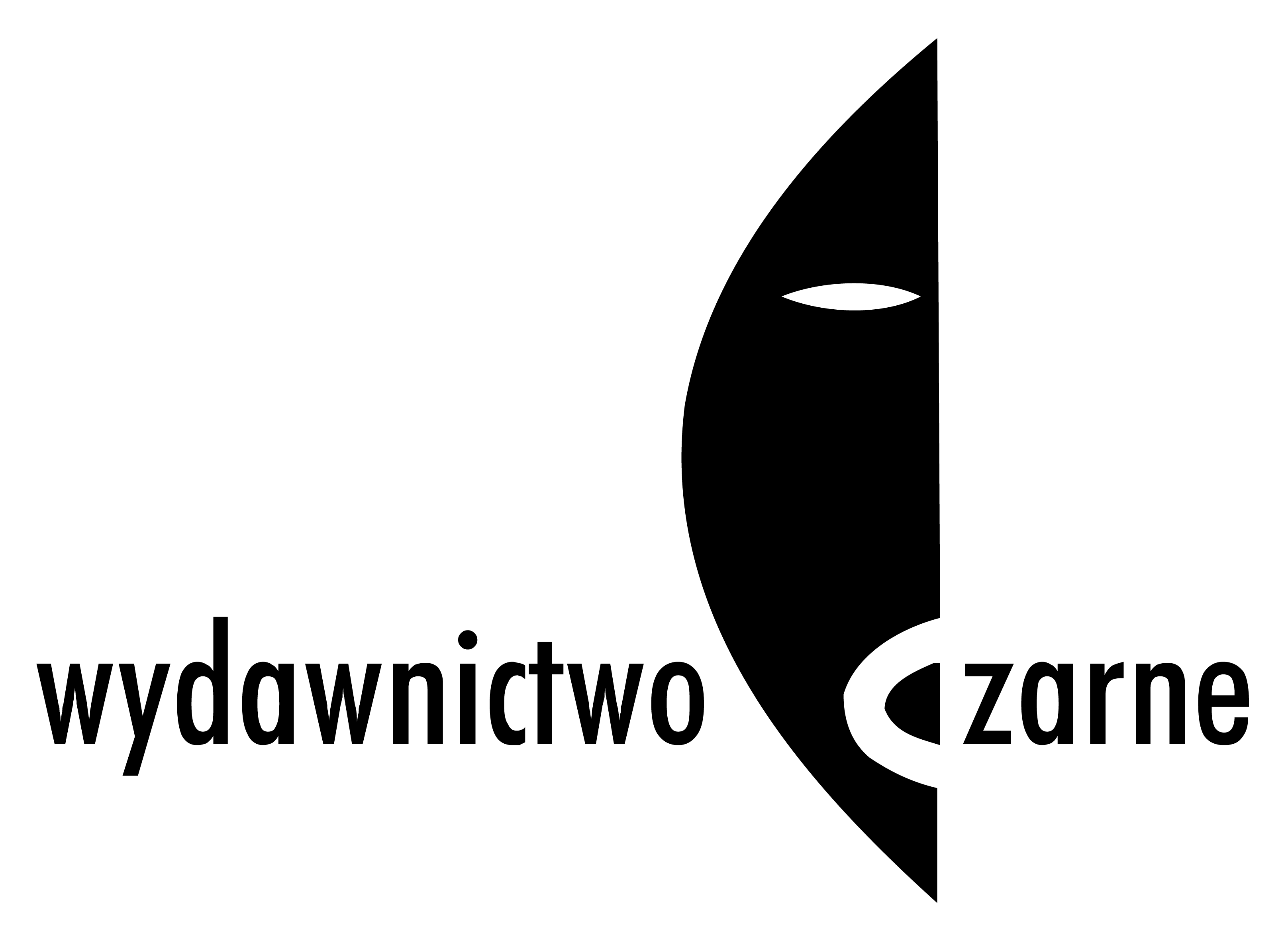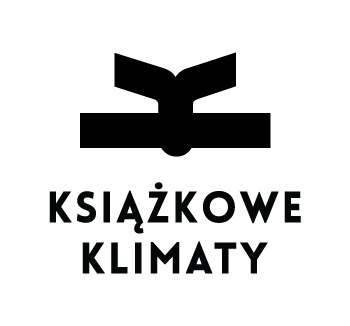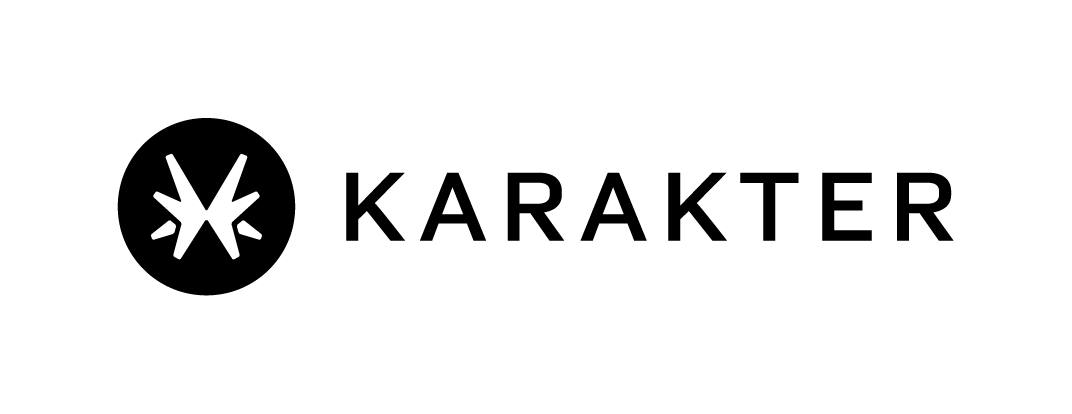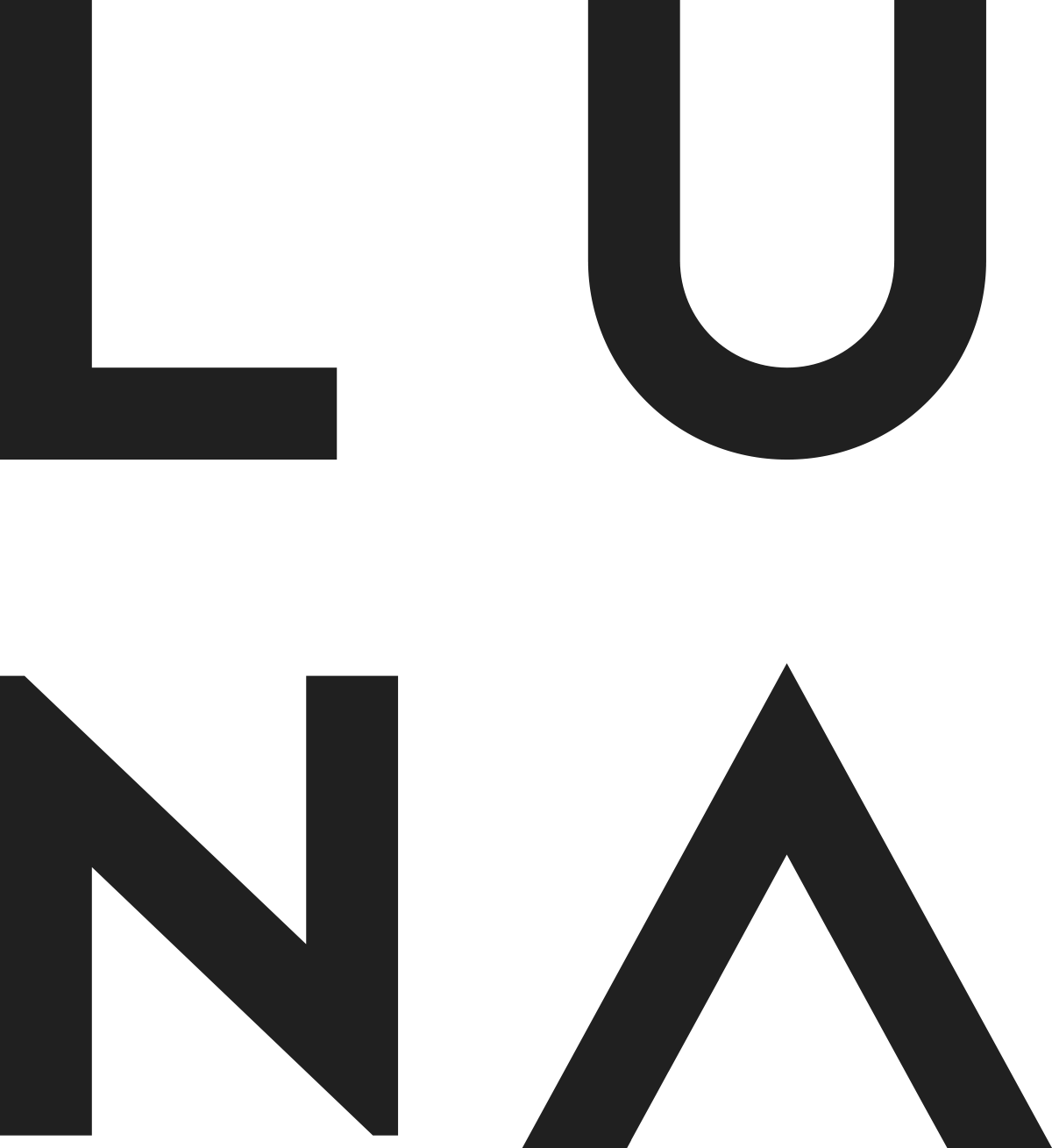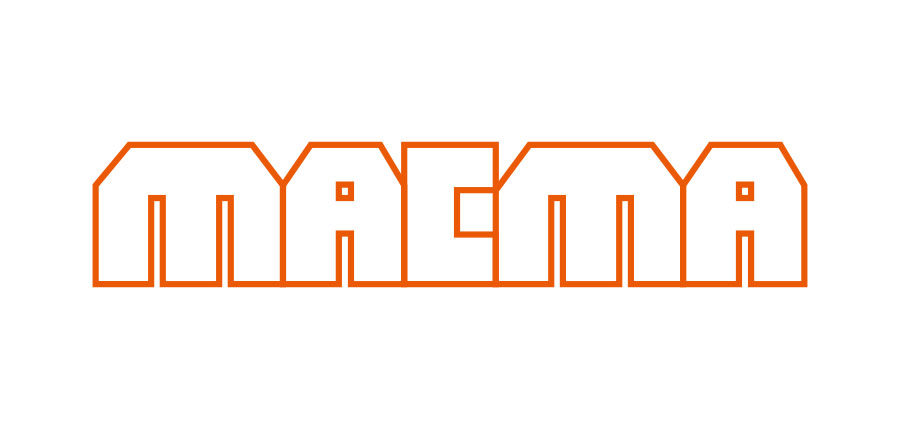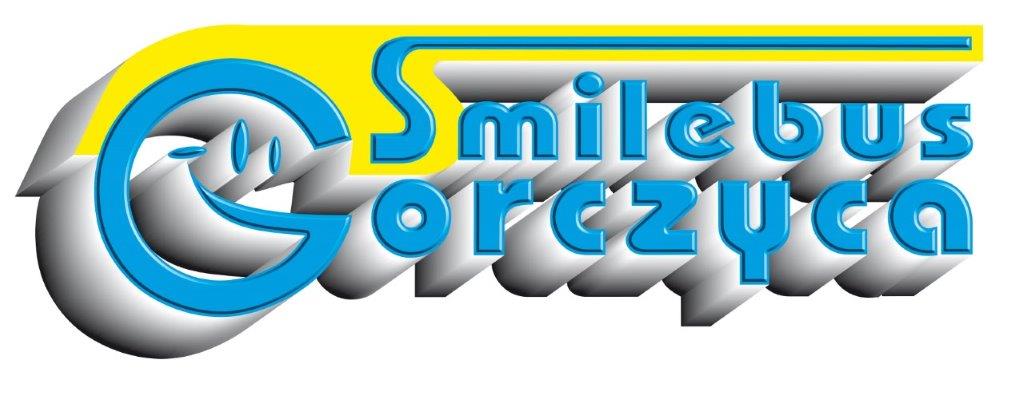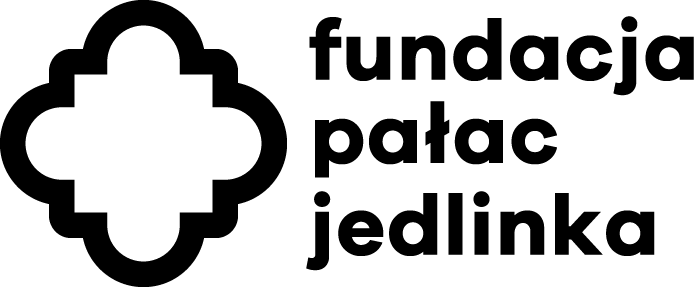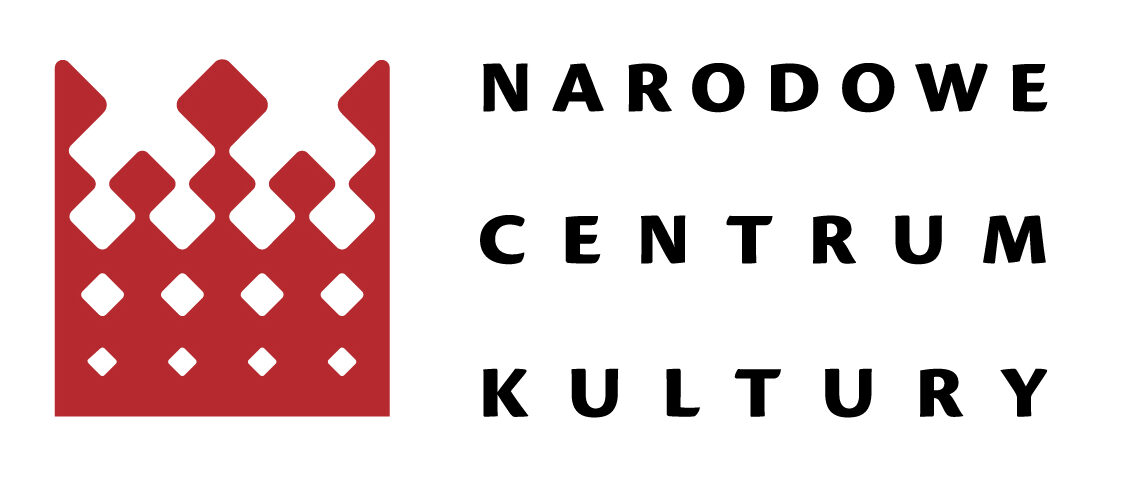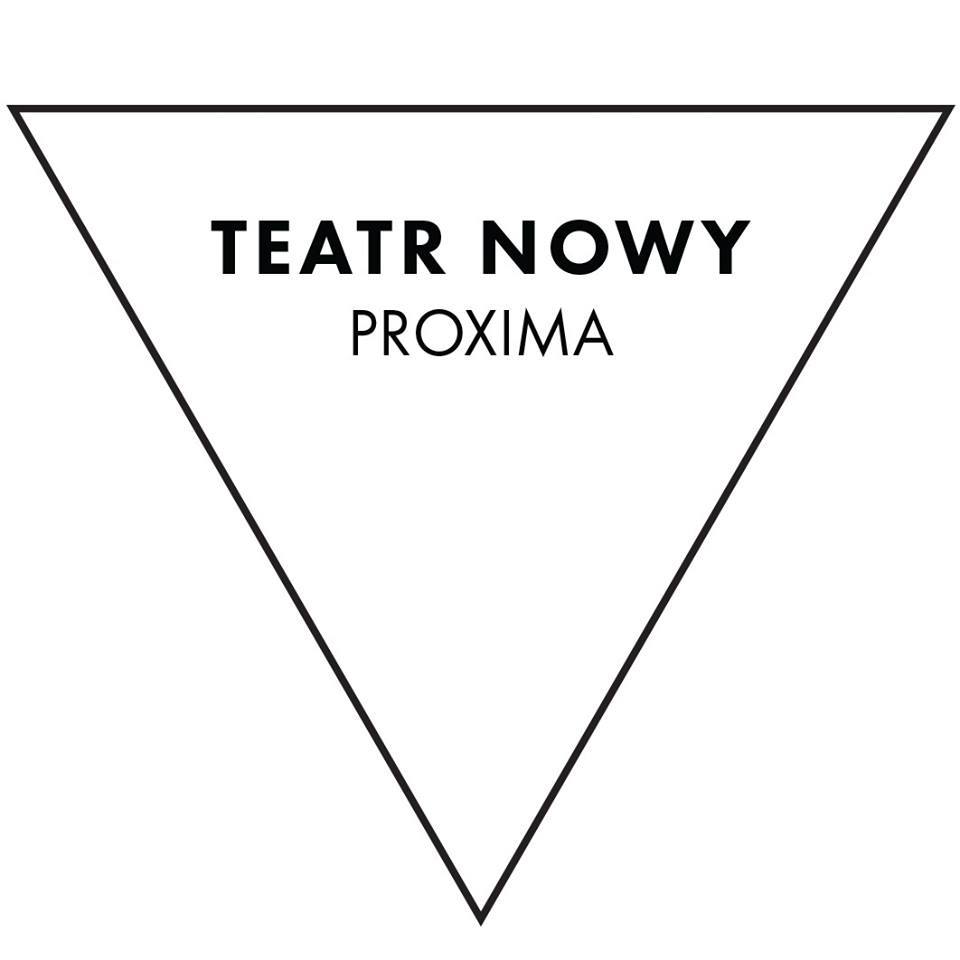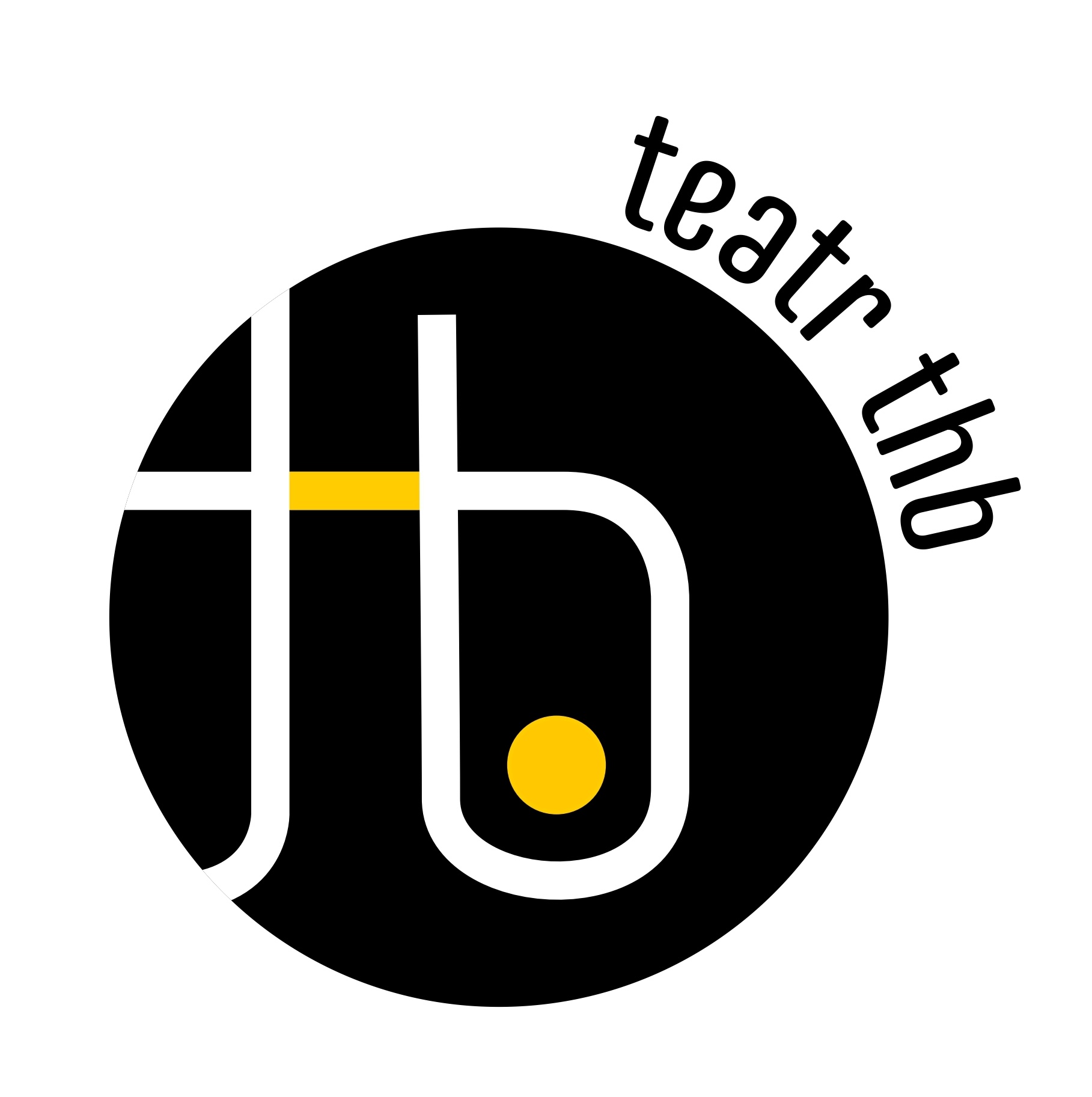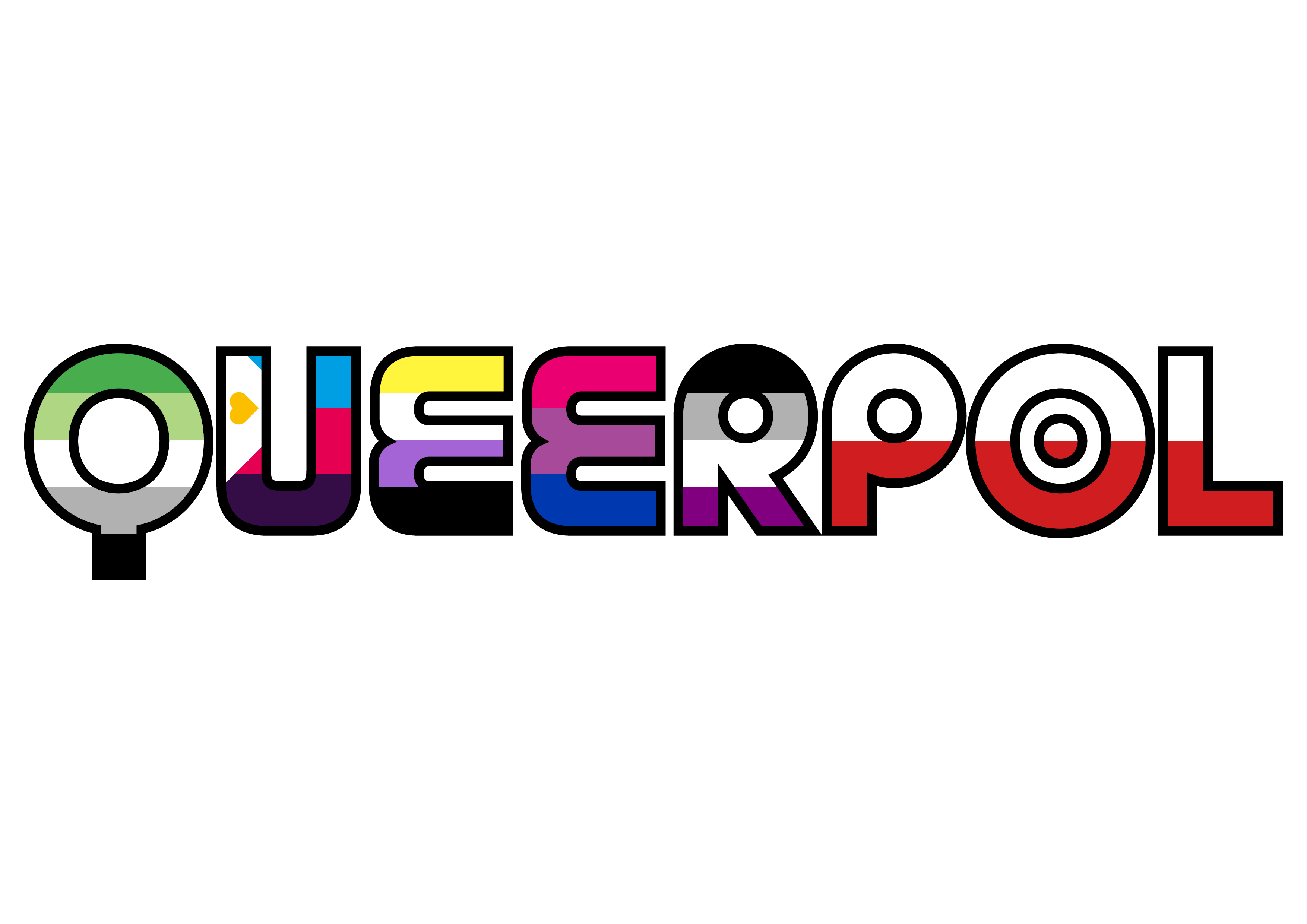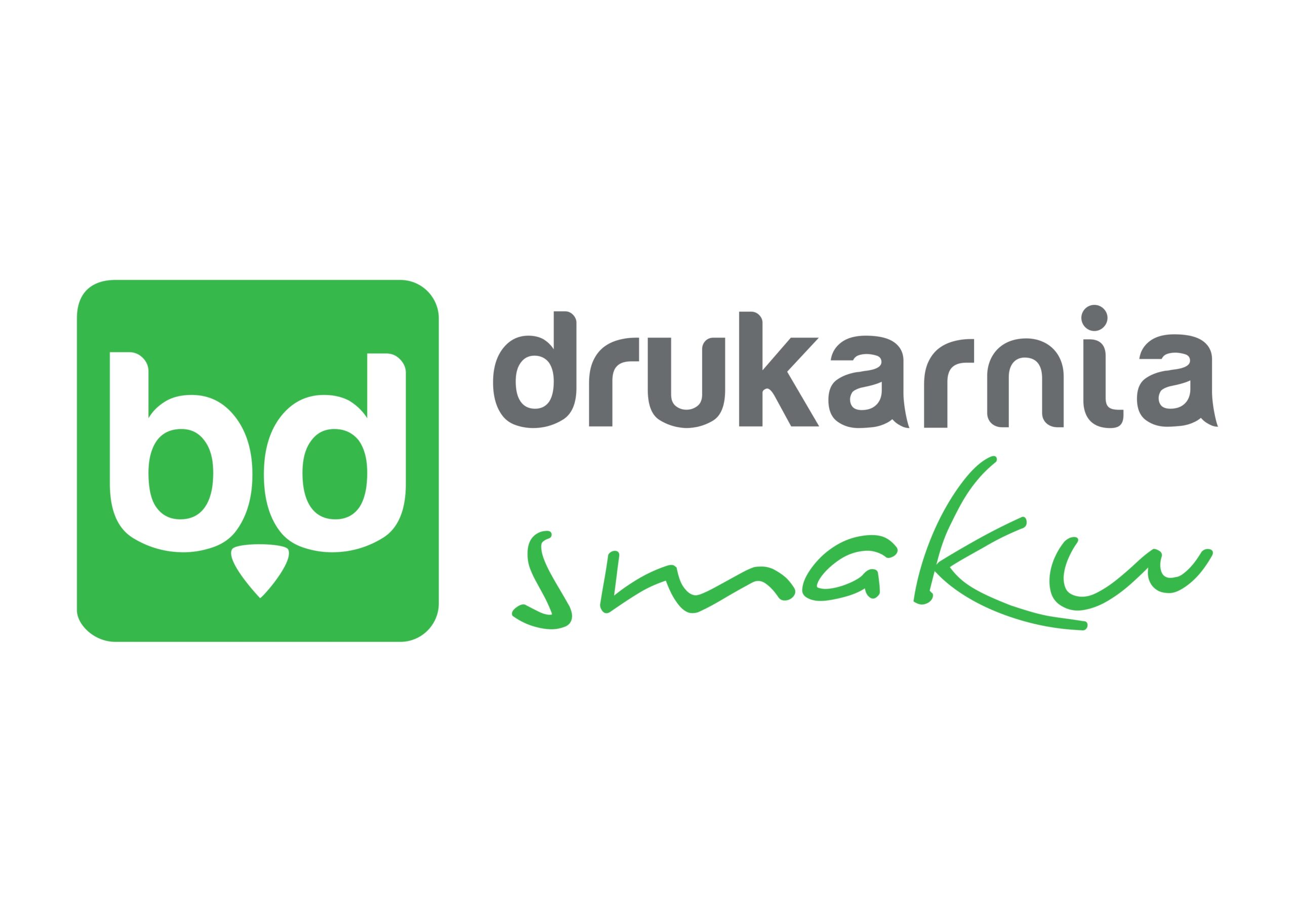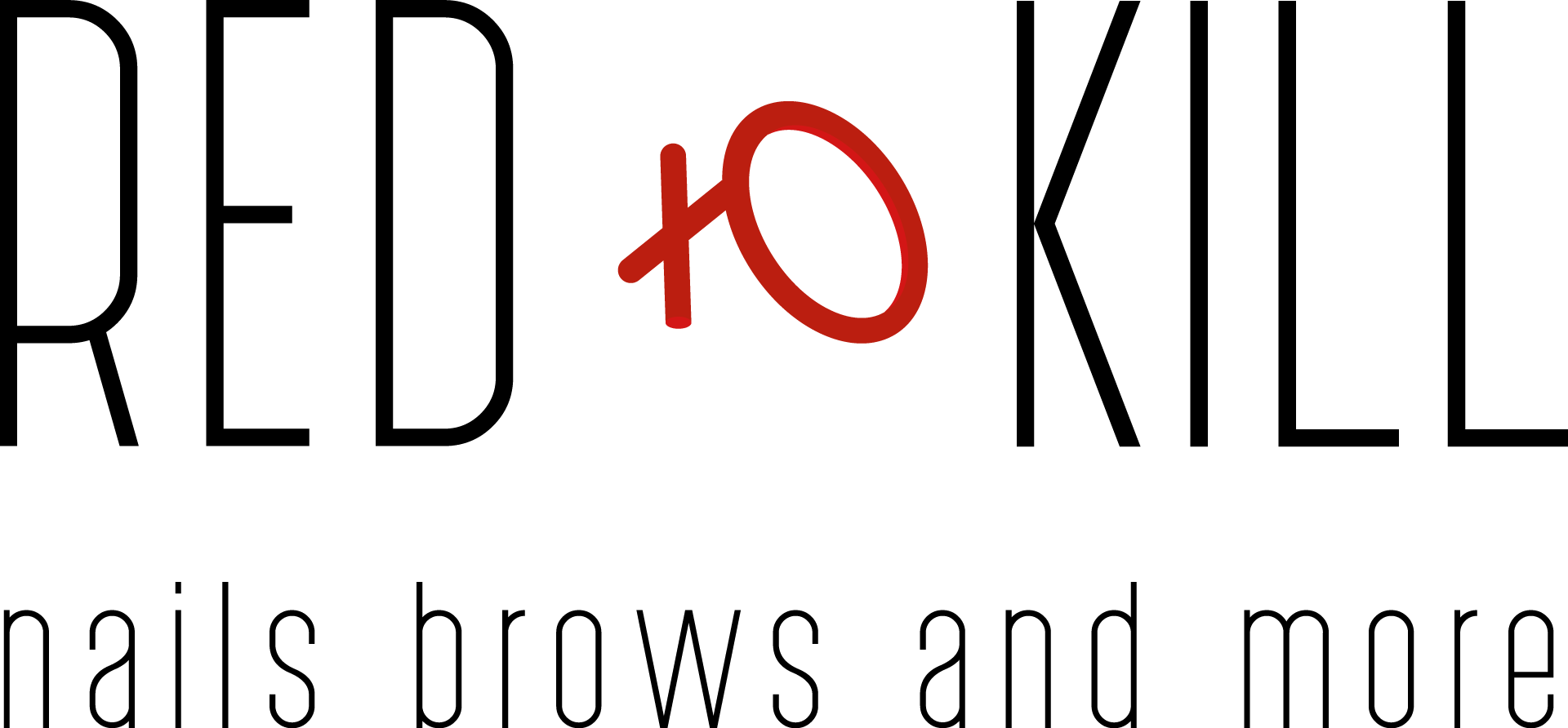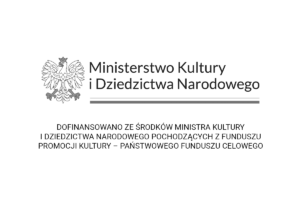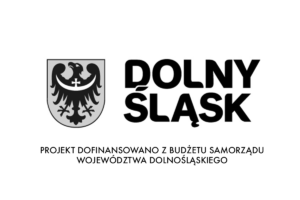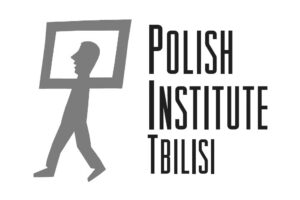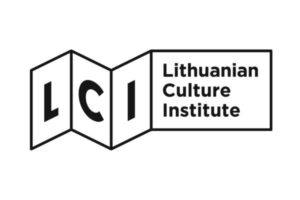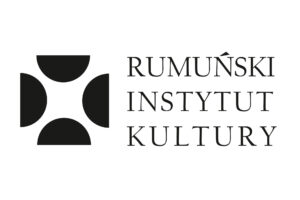Mountains of Literature Festival 2024
The 10th jubilee edition of the Mountains of Literature Festival (MLF), the biggest socio-literary event in Poland, took place between 4 and 14 July 2024.
We expected a big interest and record attendance, but the involvement of our participants exceeded our most bold expectations. And even though we don’t organize our Festival for statistics’ sake, the numbers make a huge impression, showing the scale and size of that endeavour.
It was the longest edition in the history of the Mountains of Literature Festival. During the 11 festival days, we organized 153 events, including two theatre performances, five exhibitions, eight film screenings, 11 concerts, 19 workshops and seminars, as well as 65 discussions and debates.
Almost 50 thousand people participated in our events in person. It is 15 thousand (circa 43 per cent) more than in 2023, which was also a record-breaking edition.
During the jubilee edition of the Festival, we hosted over 230 guests from the broadly defined world of culture – writers, poets, filmmakers, visual artists, politicians, lawyers, social activists, philosophers and representatives of science.
We met with our audience in 23 locations in Kłodzko Land, Wałbrzych region in Lower Silesia, as well as in Opole Silesia. We were guests in Sarny Castle in Ścinawka Górna, Nowa Ruda, Kłodzko, Ludwikowice Kłodzkie, Wałbrzych, Świdnica, Radków, Dzikowiec, Duszniki-Zdrój, Karłów, Jedlina-Zdrój, Opolnica and Brzeg.
Workshops and seminars of the Flying People’s University, our educational segment, were attended by over 800 people (from 1.2 thousand applying to participate altogether). It is important that there were no vacancies during any of the workshops, and lists of participants, including backup lists, were filled a long time before the Festival started.
So far, MLF2024 was mentioned in traditional and electronic media almost 3.9 thousand times, and information communicated by us reached over 48 million recipients.
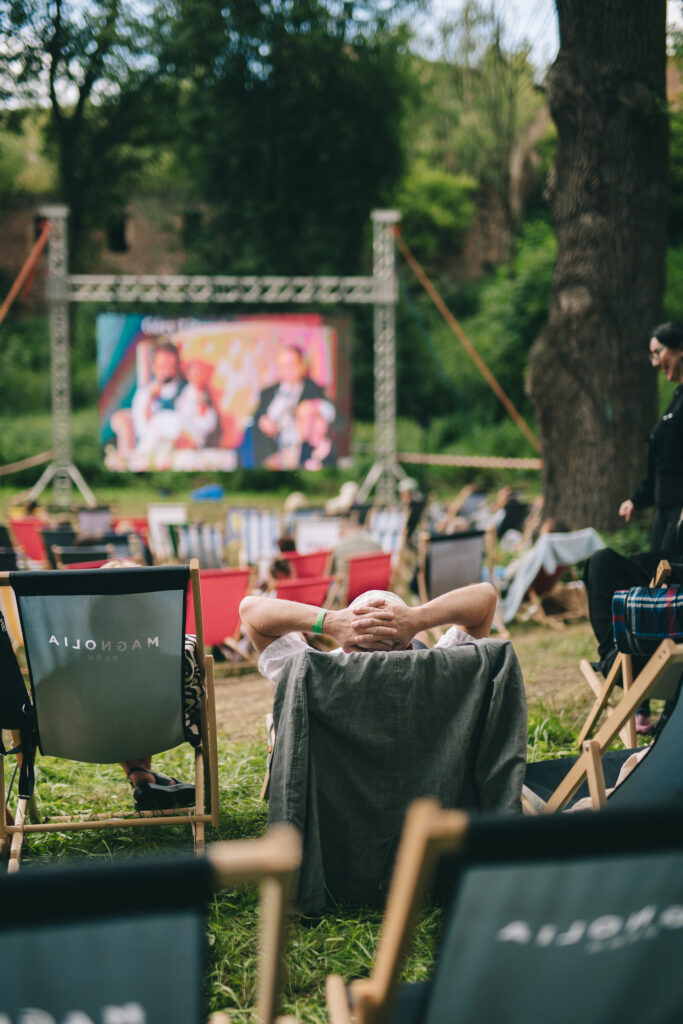
We were visited by twice as many accredited journalists as the year before, including – for the first time – a numerous representation of public media. Polish Radio Programme 1 and Programme 2 were media patrons of the Festival, they reported our events systematically, and broadcast live programmes from the Festival.
46 events were ticketed, and the participation in the remaining 107 was free of charge. We would like to emphasize this fact, as the proceeds from the sale of tickets and passes allowed us to finance, among others, workshops and seminars: both for children as part of the Little Mountains of Literature and for adults – implemented in the Flying People’s University segment.
We streamed 59 events live (meetings and debates). By 10 September 2024, our video materials on Facebook and YouTube were watched by almost 400 000 people. We also published videos from five selected events which were not streamed live, but recorded – among them, poetry meetings taking place in the Nowa Ruda Town Public Library. The experience of previous years shows that those statistics will grow considerably, as the recordings remain available on the internet, they can be watched and listened to in any moment.
Selected events were translated live into Polish Sign Language by Monika Inglot-Werner and Anna Morawska.
The most popular event was the performative reading of fragments of “The Books of Jacob” on occasion of the tenth anniversary of the publication of the novel. The reading was attended by 2 thousand people.
The team of Book Truck, that is Tajne Komplety Mobile Bookshop, which accompanied us with our guests’ books in most of the Festival locations, sold about 5 thousand copies of books. Which is 25 per cent more than last year.
Undoubtedly, the Festival is still the biggest socio-literary event in Poland. We clearly proved that we remain a space of dialogue, and words of criticism could be heard more than once on our stages, also towards those in power. Regardless of the location of our events, we felt we are a space of freedom, serious discussion and a free exchange of ideas. We got similar opinions from our guests and the Festival audience. More than once we heard that “such conversations change the world”.
Regardless or maybe because of that, we faced hate speech in the virtual space, directed at us, some of our guests and our Founder. Our accounts in social media were reported as spam and presenting untruthful information, and as a result they were blocked during the Festival. We voice loudly our opposition to personal attacks, manipulation and misinformation. And we do not accept opinions advising victims of hate that they shouldn’t have provoked. We’re interested in the source of that hatred and we observe its causes. It also makes us think in what direction to lead our debate stage to constantly develop dialogue and not add to the polarisation of the society. We want the Mountains of Literature Festival to remain a zone of absolute freedom and a safe, independent exchange of thoughts.
During the official opening ceremony of the Festival in Nowa Ruda Town Cultural Centre, Grzegorz Tokarczuk, president of the board of Olga Tokarczuk Foundation, commented on the record attendance at the Festival last year. – It’s difficult to imagine a better encouragement to continue our work. Your numerous presence confirms the quality of the Festival events – he thanked the audience for coming in such great numbers. – This Festival revolves around asking questions. Just like literature and art, we encourage to think and discuss, we don’t offer ready-made answers – he added.
He also mentioned the first editions of MLF, which we organized on the terrace in Olga Tokarczuk’s house, speaking about the bond created between people on the stage and in front of it. – This direct familiarity was one of the characteristics of our Festival. And we want it to remain that way – he said.
– The lie of the land allowed for creating a kind of amphitheatre. And also closeness. I’m happy that, despite the huge growth of the event, this kind of closeness between the Festival guests and the audience is still one of its most important elements. I’m a bit terrified by the scale of this year’s edition, it’s impossible to participate in all the events with equal attention and involvement, but it makes me appreciate the work of the Foundation and the whole team even more – comments the Nobel Prize winner.
The weather was also a rightful participant of the events organised during this edition of MLF. It did not spare us: there was heat, scorching sun, but we also experienced cloudbursts and thunderstorms. Once, we were forced to interrupt an event and cancel a concert, wanting to ensure the safety of our guests and participants. Fortunately, we managed to add the cancelled event to the programme on the next day. We looked with admiration at our audience, who seemed not to mind the adverse weather and, regardless of the conditions, watched and listened to our meetings with concentration.
We do not forget that literature is the driving force of our Festival. For years we’ve devoted the most space to literary events and observed the power of literature to change the world. We talked about the latest books by writers, poets, reporters – both popular and less known. We also discussed popular science books and biographies.
We organised two live readings we called “reading aloud”. Encouraged by the success of the last year’s reading of “The Empusium”, this year we adapted fragments of “The Books of Jacob”, Olga Tokarczuk’s opus magnum. It was one of many anniversaries we celebrated during this edition – this year marks the tenth anniversary of publishing the novel. During several dozen minutes, eminent actors brought to life characters from “The Books”, which once again turned out to be an important and unforgettable experience. The audience, despite the rain and adverse weather, listened in huge numbers and complete focus to the reading performed by Matylda Damięcka, Helena Englert, Andrzej Seweryn and Maciej Stuhr.
The Nobel Prize winner read one of her works herself, as part of the second
reading aloud. We heard “Professor Andrews Goes to Warsaw”, Olga Tokarczuk’s short story from the volume “Playing on Many Drums”. It is one of the few books in the Polish canon of required reading whose author is alive. It might not seem strange – since there’s much more classic literature written over thousands of years than works by living authors. From that point of view, as well as from the perspective of a distance indispensable to evaluate the quality of the work, this imbalance seems obvious. But with the changing times, the expectations of readers change. Especially young readers. And they have the right to read about problems they know and encounter. So we took the opportunity to present an important contemporary text read by the author without the school obligation and often enforced interpretation.
This unique reading was an introduction to the discussion on the canon of required reading in school, to which we invited the minister of education Barbara Nowacka. Being well aware how difficult it is to make such decisions and how great a compromise accompanies the final shape of the list of required reading, Irek Grin asked the minister about the role of the ministry in making those decisions, the actual influence of officials on the changes in the canon and the criteria they use. We asked about the system and the tools the ministry has to shape the reading habits of children and the youth. – I believe that politicians shouldn’t select books for the canon, but should know and read them. I would like teachers to have as much autonomy as possible. They are the foundation of school and only they decide how that school will look like – said the minister.
The conversation revolved not only around topics related to education, but also current political events, including the vote on decriminalisation of abortion. A day earlier, the Sejm did not pass an amendment to the Penal Code concerning the decriminalization of assistance in terminating pregnancy. – It’s much easier to be frustrated when you’re on the streets as part of a civic movement. It’s very different when we lose not because our opponents, but our allies decide differently than they’d declared to citizens. We will not stop fighting for women’s rights. We will not give up until the situation is normal – she assured on our stage.
During this year’s edition of MLF, Olga Tokarczuk also moderated a discussion on the creator of the idea of analytic psychology and psychiatrist Carl Gustav Jung. She invited to the meeting two eminent specialists in Jung’s works: cultural studies expert and anthropologist Leszek Kolankiewicz and philosopher Tomasz Stawiszyński. The occasion for the discussion was the reissue of the book “Answer to Job”, one of the most important – according to many – books of the 20th century, in the series “Other Constellations” by Wydawnictwo Literackie, presenting titles selected by Olga Tokarczuk – reminding of or presenting the Polish readers for the first time with the most important, in her opinion, texts of the world culture. In case of this book, the Nobel Prize winner also wrote an afterword. – Jung shaped me. Because of that book, I decided to study psychology – she said on our stage. She asked her guests what draws them and kindles their imagination in the unobvious concept created by Jung, which she described as “a vision of life as a journey towards fullness”. Tomasz Stawiszyński pointed out the idea of synchronicity and Leszek Kolankiewicz spoke about a “dramatic, but filled with hope vision of human fate”. – Being born, a human being is given the task of making themselves, they are a never final sum of events – he said.
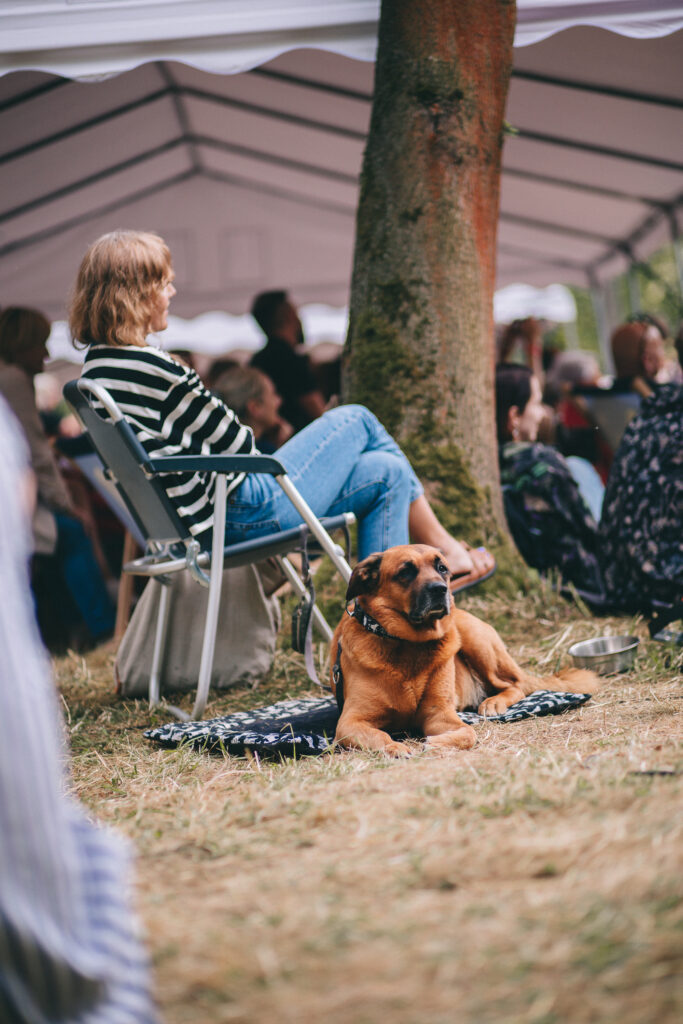
We also mentioned the Sumerian myth about the goddess of war and love Inanna, which once again became an inspiration for Olga Tokarczuk. In the libretto for the opera “ahat ilī. Siostra bogów” [ahat ilī. The Sister of Gods] by Aleksander Nowak, the author retells the story of the goddess balancing between the world of the living and the world of the dead. In the publication by słowo/obraz terytoria, the story is complemented by a commentary written by Zbigniew Mikołejko. One of the oldest myths is a starting point for a conversation about universal truths concerning the human condition. Theatre director Anna Augustynowicz, literary historian and publisher Stanisław Rosiek and philosopher Magdalena Środa considered together the role of myth in the contemporary society. – The source of all our tremors is fear. Olga Tokarczuk’s text is healing – but not therapeutic. It’s an encouragement not to be afraid of the inner contrariness present in each of us. Olga Tokarczuk reaches in it into the depth of the human abyss – said Anna Augustynowicz. The panellists also discussed ideas, fears and anxieties inscribed in mythical stories, as well as the role of the goddess Innana in the context of reflections on the boundary between life and death.
During the jubilee MLF, we hosted esteemed authors from abroad. Adania Shibli, Palestinian writer, author of several novels and drama plays, as well as short literary forms, came to speak about “Minor Detail” (published by Drzazgi). The novel, which received nominations for the International Booker Prize and National Book Award, was published in Poland last year, translated into Polish by Hanna Jankowska. The book, full of violence, is a record of memory and a silent voice of the victims. I tells a story about searching for justice for a girl who was raped and murdered by the Israelis on the Negew desert many years ago. – An important aspect of the works by contemporary Palestinian writers is how the conditions of everyday life become a way of writing and creating literature. In Arabic, the word for ‘literature’ means also ‘ethics’. We speak about morality and literature at the same time, and is seems very important to me – said Shibli at Sarny Castle. She also read fragments of her novel in Arabic. The meeting was moderated by Michał Nogaś, interpreted by Katarzyna Janusik, and the recording was broadcast on Polish Radio Three as part of the “All Books of the World” programme.
We also met Israeli writer Yakov Z. Mayer, author of the picaresque novel “Nehemyah” (Literackie Publishers), about which he spoke to Urszula Glensk. Thieves, the miraculously healed, travelling actors, Jewish, Muslim and Christian visionaries are seemingly marginal characters in the book, adding to the panorama of the turbulent times and the reality of the main character, Nehemyah of the title. The book was described as a prequel to “The Books of Jacob” by Olga Tokarczuk. – It shows us the seventeenth century Republic during one of the most dramatic moments of its history, seen through the eyes of an unwitting troublemaker, cabalist and wanderer, tangled up in the story of the false Messiah from Smyrna – wrote the Nobel Prize winner about the novel. During the Festival, Mayer said that “Nehemyah” is based on the story of a historic figure we don’t know much about. – We know he was born in Poland, met one of the messiahs and converted to Islam in Turkey, and died as a lepper in Amsterdam. When I read about Nehemyah for the first time, I thought it was material for an academic study, but then I discovered I can find nothing more than those three short pieces of information from the 17th century and I have to admit, I was fascinated by that figure. Almost every character in my book has a historic source – he said. The meeting was interpreted by Katarzyna Janusik.
We also joined the celebrations of the Year of Czesław Miłosz, one of the most important events of which is reissuing his famous book of essays “The Land of Ulro”(published by Znak), with a foreword written by Olga Tokarczuk. Even though it’s been almost half a decade since the publication of the book, there are many indications that it’s still actively read and in many aspects remains valid. Once a ‘forbidden’ text, read in hiding, with flushed cheeks – and today? Guests of the meeting, literary scholar Stanisław Bereś and writers Joanna Bator and Małgorzata Lebda, shared their perspectives and reading experiences. – This book cannot be read in any other way but personal. Even though it‘s a philosophical and literary-historic work, Miłosz uses his entire biography and very skilfully weaves it into his considerations and makes himself an element of a diagnosis, which I would gloomily call a lampoon on the civilization. It’s a catastrophic diagnosis – said Stanisław Bereś. The discussion was moderated by Emil Pasierski.
Joanna Bator also spoke about the literary motherland and the mother tongue. They are literary means of establishing a relationship between a human being and the world through recognition, inclusion and broadening the function of the story. Katarzyna Byłów, cultural anthropologist, translator and member of the Olga Tokarczuk Foundation team, asked which resources are used by the mother tongue, how to write about the embodiment and the placement of the human being and what are the possible consequences of literature written in a language which doesn’t drive a wedge between us and the reality.
We spoke about literature which makes us consider various cultural roles conditioned by the biological sex.
That is why, among others, we welcomed again Joanna Kuciek-Frydryszak, whose “Chłopki. Opowieść o naszych babkach” [Peasant Women. The Story of Our Grandmothers (Marginesy Publishers) since the premiere last year remains one of the most fervently discussed books in Poland. This moving story collecting untold histories of women transports us into the reality of Polish villages during the Second Polish Republic, it also shows the deep crisis of the 1930s. The author gives voice to grandmothers and great-grandmothers, and the description of their everyday life highlights both the power of peasant women and their entanglement in patriarchal structures. The image of peasant life emerging from their stories includes, on the one hand, devotion to family and submission to work, and on the other – a deep desire for change and self-determination. Aleksandra Majak asked the author about her work on the book, its reception and relations with the peasant turn in literature and culture, as well as about herstories told from behind the threshold of peasant cottages. – The difficulty was to find a proper language for the story and not shock with violence – said Kuciel-Frydryszak about her creative process. – I wanted to give voice to women who’d never had it, allow the most difficult events to be known, even if the book was to be depressing. I know from my conversations with readers that they don’t read it at once, they have to put it away, rest. I understand it, I wrote it the same way.
Joanna Kuciel-Frydryszak participated also in a discussion in which we brought her “Służące do wszystkiego” [Servants for Everything] (Marginesy Publishing) together with Marta Strzelecka’s book “Ziemianki. Co panie z dworów łączyło z chłopkami” [Landowners. What Ladies from Manor Houses Had in Common with Peasant Women] (Marginesy Publishing). Michał Nogaś asked the reporters about the relationships between Polish women from various social classes during the Second Polish Republic and how everyday life looked like then. We also spoke about those women’s attitudes towards school, farm and household, as well as marriage, and also about which of them travelled the world the most often and why.
We spoke to Justyna Dąbrowska about the reportage “Przeprowadzę cię na drugi brzeg. Rozmowy o porodzie, traumie i ukojeniu” [I Will Guide You to the Other Side. Conversations on Childbirth, Trauma and Solace] (Agora Publishers). The author is a certified psychotherapist with extensive experience, a vast majority of which she gained while working with mothers – she specializes in birth psychotherapy and postpartum depression, she helps to establish the emotional relationship between the parent and the child. Her latest book focuses on the worst and the best emotions accompanying the arrival of a new human into the world. She speaks without taboo about all experiences of mothers – not only those worthy of sharing in social media. – I didn’t write this book against doctors and midwives, I didn’t want to add to the polarization. But I wanted to ask how it is possible that people do such things to other people – explained Dąbrowska. She also told the moderator Urszula Glensk about her conversations with women. – One of the protagonists told me you have to prepare for childbirth as if you were going to war. This saddens me, because it shows the image of childbirth, partially adequate, in Polish women’s minds – she said.
Justyna Dąbrowska, together with Sabina Jakubowska – the author of the novel “Akuszerki” [Midwives] (Grupa Wydawnicza Relacja) participated in a discussion on the role of midwives. Olga Wróbel asked what is common in the stories and experiences of historic and contemporary midwives, what has changed and what are the needs and expectations of those in labour. The authors spoke about narratives surrounding giving birth and their consequences for women, being – depending on the paradigm – a subject or an object of social and medical rituals accompanying confinement.
We debated the existence of the so called “women’s literature”. Waldek Mazur spoke to
three authors who published new books this year: Sylwia Chutnik, Wioletta Grzegorzewska and Karolina Jaklewicz. Everything is different in their writing: themes, language and heroines we meet in their books. Their literary work is in different registers of sensibility, they use different humour. So we searched for common elements in their work. The conversation was about treating women’s literature in a paternalistic way, as of worse quality and for women only, as well the proportion between men and women in literary awards’ juries. – If someone doesn’t reach for my book, because I write about women’s rights, I don’t really care about such a reader – said Grzegorzewska. The moderator compared the situation of female writers to the political reality and asked if they shouldn’t stop acting only within their circle and “reach the group which doesn’t listen”. – Why should we do it again? Why can’t men become interested in over half of the population, in what their mums, wives, daughters, sisters do? It’s too much. I don’t plan to go around people’s homes and ask if they want to talk about feminism and inequality in literature. I don’t have enough strength for that. I would like to shout: get it together! – appealed Chutnik.
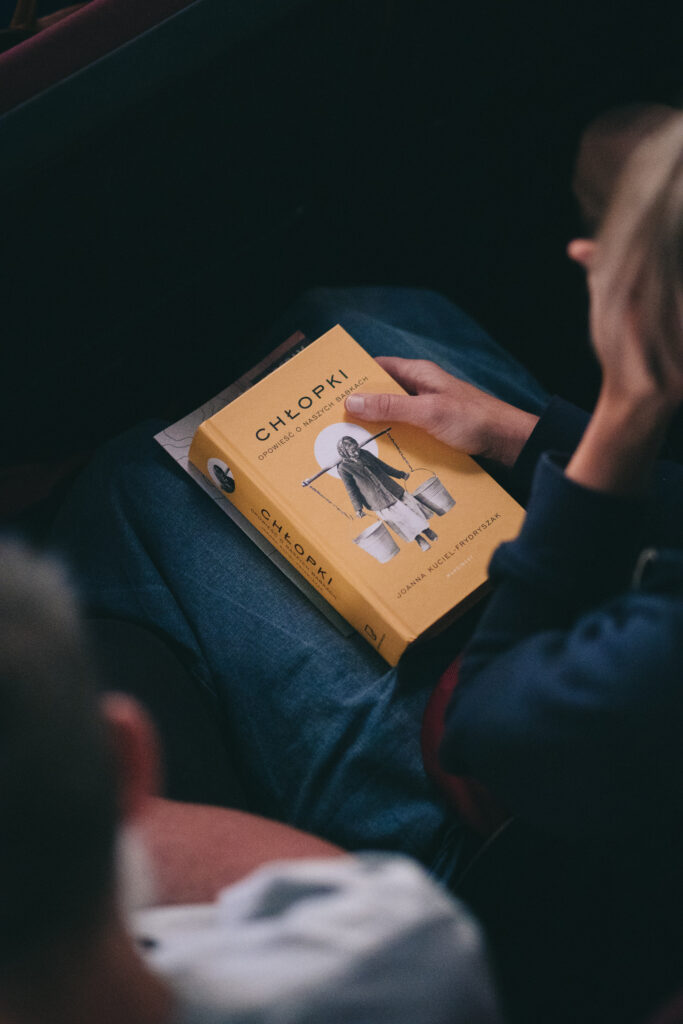
We asked Sylwia Chutnik also about her latest book, a collection of short stories called “Dintojra” (published by Znak Literanova), written between 2015 and 1021. The narratives are linked by the motif of „dintojra”, i.e. vengeance in Hebrew. The focus on women figures, characteristic for the writer, allows her to raise the problem of imprinted silence, sexual violence and shame. Telling stories of women not only breaks the taboo, but also awakens anger in the characters and the wish for vengeance. Circling around the topic of feminist anger, we spoke about breaking the silence, literature after #MeToo and the challenges of the form of a short story. The conversation was moderated by Aleksandra Majak.
We also spoke about the new book by Wioletta Grzegorzewska, whose famous debut “Swallowing Mercury” brought her a nomination for the International Booker Prize. The author returned to her childhood spent on the verge of the Upland in the novel “Tajni dyrygenci chmur” [Secret Conductors of Clouds] (published by W.A.B.). Writer Maciej Hen asked her what she was searching for in the world of the past and what led her there this time. – The title of the book is a metaphor, you can interpret it freely, but the book is set in 1986 precisely, the fall of communism, the reign of Jaruzelski. I remember how we were indoctrinated then, many things were secret, you didn’t speak about them or you weren’t allowed to speak about them. “The Secret Conductors of Clouds” are those who conduct that world, who pull the strings: the authorities, the regime. Is one of the ways to interpret that title – revealed Grzegorzewska.
One of the key topics of this year’s Mountain of Literature Festival was translation. During the meeting with Jacek Dehnel and Piotr Tarczyński, we spoke about the latest translations of William Faulkner’s works they undertook: “As I lay Dying” (Dehnel) and “Light in August” (Tarczyński). Faulkner, famous for his narrative acrobatics, is reintroduced into the Polish language in a series published by Znak Literanova. Malgorzata Kolankowska asked, among others, what inspired both translators to undertake this difficult task, how translations age and how to you render the multilayered narrations.
Jacek Dehnel came to us also with his new book “Łabędzie” [Swans]. We wondered if it is areportage, a family saga, a thriller, or maybe an essay on memory. Dehnel gives us all of this in two volumes which go beyond limitations of genres. The poet, prose writer and translator spoke on those issues with Eliza Kącka. He also described his multistage work on the book and searching for resources, including the archives of the Institute of National Remembrance.
Jakub Żulczyk spoke twice about his latest book “Dawno temu w Warszawie” [Once Upon a Time in Warsaw] (published by Świat Książki), a continuation of the bestselling “Ślepnąc od świateł” [Blinded by Lights] – in conversation with Michał Nogaś and Olga Wróbel. The main characters in the book are residents of the capital dealing with loneliness, consequences of the epidemic, social and economic problems, addictions. Extensively described political themes add to the credibility of the depiction and Żulczyk seems to ‘tackle’ every social group, getting rid of black and white colours. – Violence functions as an equivalent of a contract in legal economy, and the threat of violence secures transactions in the crime world. When covid came, it turned the economy upside down, even the branch of illegal economy which is the drug trade. I was interested in that, I started to research that subject – he said.
We hosted one of the most popular Polish author of crime fiction, Wojciech Chmielarz, who met with the audience twice. It could be said that 2024 is particularly good for Wojciech Chmielarz, but the winning streak of one of the most popular Polish crime fiction writers has been on for at least a decade. This year, or rather in the first half of it, apart from the new book “Zbędni” [Redundant], the readers received also reissues of the novels “Wampir” [The Vampire] and “Prosta sprawa” [A Simple Case], probably in relation to the adaptation of the latter one into a TV series, yet another in the rich portfolio of the author. We asked Chmielarz if he is bored with exploring human nature in search of evil and how he manages to find time to record podcasts. – I was totally intrigued by a vision of a man who conducts an investigation in his own case, fully aware that he does something very harmful to himself – he said about the idea for his new book. The meetings were moderated by Olga Wróbel and Waldek Mazur.
We alluded to this year’s edition of Silesius International Poetry Festival, the motto of which was success. We spoke about it with two eminent and awarded poets, important voices in Polish contemporary poetry, representing two different ways of writing poems – Urszula Honek and Joanna Mueller. Wojciech Bonowicz asked the authors what a poem is for each of them, the tradition of a poem, style and finally – the success mentioned in the title of the meeting. He asked them what tasks they set for themselves and to what extent literature allows them to be free. All three of them also wondered what makes a poem “good”. – A good poem is a poem which works within me for a long time after I’ve read it. Sometimes it goes so deep inside that I repeat it, it returns to me, even though I might forget who wrote it and what the phrase was – said Joanna Mueller. Both authors also read poems from their new books: “Poltergeist” (Honek, Warstwy) and “trule” (Mueller, Biuro Literackie).
We put together two seemingly unalike, but at the same time very close books published in 2024, trying to prove that autobiography is doing well in Polish literature. It is proven by the latest prose by Eliza Kącka (“Wczoraj byłaś zła na zielono” [Yesterday, You were Mad in Green], published by Karakter) and Maciek Bielawski (“Ostatni” [The Last One], published by Książkowe Klimaty). They both write about the generational change, the Polish reality, building or nursing uneasy relationships with the closest people. There’s also absurdity and humour (more in Bielawski), and breaking the norms imposed by the society (more in Kącka). The meeting was moderated by Waldek Mazur.
Writer and poet Małgorzata Lebda and photographer Rafał Siderski spoke about their joint work on the book “Tributaries, Vibrations, Afterimages and Songs on the Riverbanks” (published by Warstwy). The project is based on materials they gathered during “Reading Water” – an adventure/undertaking during which Lebda over the course of 28 days ran the distance of 1113 kilometres along the Vistula River, from the source to the mouth. On the one hand, this gesture was to bring attention to current problems related to water (including building the waterway E40), on the other – it was to be a fuel for imagination, an empirical study aiming to test how it is to accompany a non-human being, the river, for such a long time and with such intensity. The effect of this photo-literary collaboration is a book which tests the possibilities of telling the story of a river from the least anthropocentric point of view possible. The meeting was moderated by Michał Nogaś.
We travelled with Michał Rusinek thanks to his latest book “Nadbagaż, czyli opowieści podróżne” [Excess Baggage or Travel Stories] (published by Znak), in which he speaks about faraway and nearby places. He guides readers from Szamotuły to Hanoi. Małgorzata Kolankowska asked him not only about the experience of being on the road, discovering new places and people, but also about how to translate this experience into a story, how to watch to notice that which is valuable, how to take notes to capture that which is important and fleeting.
We also juxtaposed travel stories by Michał Rusinek with the latest book by Krzysztof Varga, “Ostrygi i kamienie. Opowieść o Normandii, Bretanii i Pikardii” [Oysters and Stones. The Story of Normandy, Brittany and Picardy]. Their books, although very different, share the topic of the road – although each of the authors understands it in a different way. During the meeting, moderated by Urszula Glensk, they spoke about their perception of travelling. – I feel an inner compulsion to be on the road from time to time, a deeply hidden gene of my Asian forefathers is responsible for it. I’is a liberating experience for me, the process of driving itself. But I’ve never felt the need to see the whole world – said Varga.
Rafał Księżyk spoke about the Silesian underground during the Polish People’s Republic. In his new book “Śnialnia” (Literackie Publishers), he collected stories from a group of Silesian artists who remember the experience of living on their terms and conducting research (spiritual, aesthetic and others]) without restrictions during times when everything was limited and controlled. – The idea of a spiritual hunger, chasing wonders was the driving force of those people – said Księżyk, answering questions asked by Wojciech Bonowicz.
A lot of optimism and hope was brought by the meeting around the latest book written by Bonowicz, “Dziennik pocieszenia” [Journal of Solace] (Znak Publishers). In it, he guides his readers through the hardships of the contemporary world – constant lack of time, crises and the epidemic of loneliness. With kindness and unique sense of humour, he shows how to find balance and fullness. He advises to trust hope from which the chance for the better is born. – I play with the form of ‘guides to good life’. I see a danger in our culture: whatever good we have to say about humans and the world moved into the sphere of guides, coaching, motivational speech. As if true literature wasn’t able to say what is the meaning of what’s happening to us. My book is born out of an opposition to negativism, which we’ve been feeding ourselves with recently – revealed Bonowicz.
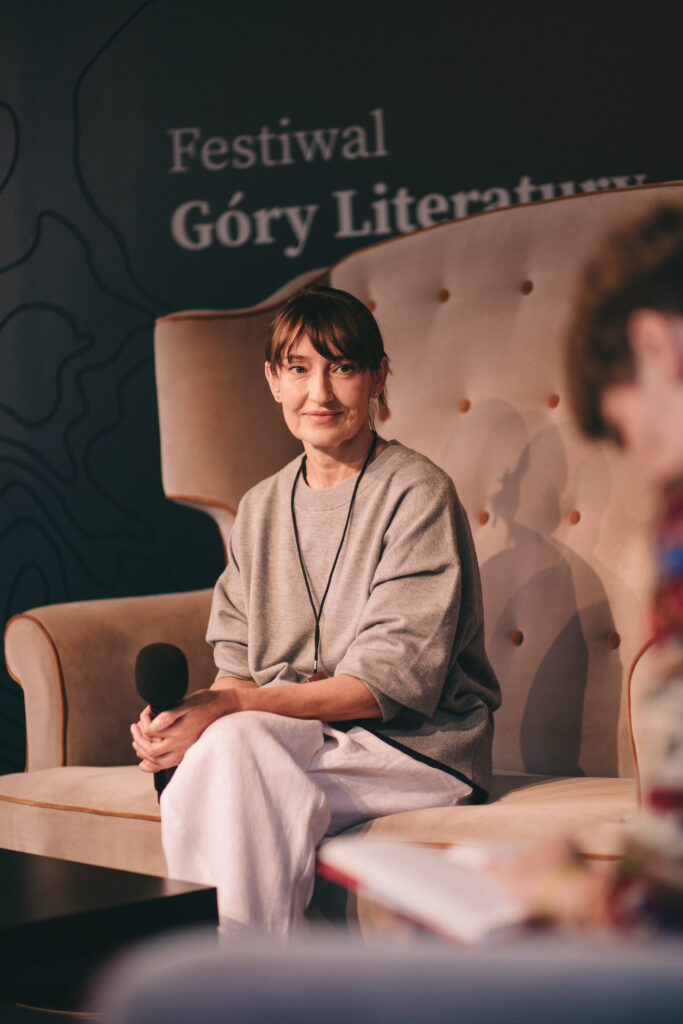
Katarzyna Groniec debuted as a novelist with the novel “Kundle” [Mongrels], which was nominated for Gdynia Literary Award for “intricately intertwining many stories linked by a small town in Upper Silesia”. And she was a guest of the Festival as a writer. – The town is a dump of human wrecks. Broken families, double identities, slashed souls. Silesian autochthons, displaced people from Eastern borderlands, Jews, the Romani, Germans. And above it all – a narrative body, which sees everything separately. Because it’s not possible to glue it all together. This place where the bond of language and the world is broken, where inconclusiveness rules, and an existential abyss opens in the everyday life. Groniec’s prose balances on the verge of this precipice – unique and ordinary at the same time – with the skill of a literary ear and tongue to be envied not only of debutants – wrote Eliza Kącka about the book. She also moderated the meeting.
Reneta Przemyk, on the other hand, debuted during our Festival as a moderator. She talked to Barbara Sadurska about her latest novel “Bajka, Bajeczka” [A Fable, Little Fable] (Warstwy Publishers). In the book, the author describes the life of a growing-up girl and a terror growing up with her. “A Fable, Little Fable” combines an insightful story of a family with shocking political fiction. Against the background of small, everyday fears, tasteless dinners, ugly clothes and cruel boys, the Grear History erupts. The book is a portrait of childhood as a time when we learn to give and accept pain, we say goodbye forever to our friends and enemies, and we are very, very lonely.
Filip Zawada, author of novels, dramas, music, an actor, photographer, performer, archer, but also a graphic artist – this time spoke to us about potatoes. Or, to be more precise, about his latest book “Z punktu widzenia ziemniaka” [From the Point of View of a Potato] (Znak Publishers). Olga Wróbel, who moderated the meeting, wrote that the book is a collection of one-frame comic strips, the main character of which is a clumsily drawn tuber, which has hands, legs and reflections about life. You can read, watch and understand Zawada’s story in many ways. – I decided to write the texts accompanying those several hundred drawings to reflect on the 11 years of drawing potatoes and important aspects they referred to. They are essential to understand the context. It’s not only a comic strip, those are fragments of someone’s life. Sometimes questions asked by my son I didn’t know answers to, like “would you rather be a happy alcoholic or an unhappy billionaire, daddy?”. You cannot answer such a question without educational stink I wanted to avoid in contact with my son – said Zawada.
With two authors of books for the youngest readers, Agata Romaniuk and Grzegorz Kasdepke, we wondered who needs children’s literature. Agata Romaniuk referred to the fact that the meeting took place right after the conversation with the minister of justice Adam Bodnar. – I think we have the biggest job in the world, literature-wise. I write to educate citizens, activists, wise and good people. And good ministers as well! I’m certain Adam Bodnar read a lot as a child – she said. The authors referred also to the issue of marginalisation of children’s literature in the general literary and social discourse. – Children are the most important audience in the world. In our times, books are read by free spirits, rebellious personalities, and in case of children, future revolutionaries, rebels, inventors, people who will change the world for the better. A society which doesn’t read makes also wrong choices at the voting urns – claimed Grzegorz Kasdepke. The meeting was moderated by Dorota Oczak-Stach.
We hosted Marcin Orliński, poet, prose writer, literary critic and editor at “Przekrój” magazine, with his latest book “Późne słońce” [Late Sun] (Wolno Publishers). The book is composed of untitled poems, each of them consisting of three-line stanzas. During the meeting moderated by Ewelina Adamik, we attempted to experience Orliński’s text in which a seemingly unimportant trinket from everyday life becomes building material for a poem, and we took a closer look at the linguistic precision of his poetics.
In the cycle „Less-known Polish literature” Karol Maliszewski spoke to poets: Sylwia Jaworska (living in Klucze, nearby Błędów Desert, who doesn’t only write about the desert and emptiness. She more often observes a woman from the middle class who “on her cupboard keeps an anti-wrinkle cream and Xanax”) and Grażyna Wojcieszko (a poet from Krzywogoniec and Brussels, two edges of Europe at once, writing about big city slaughterhouses and the nature in Tuchola Forest). We try to remind the audience that beyond the world of nominations, awards and reviews in esteemed magazines, a vibrant and fascinating literary life develops, original and mysterious poetic languages appear.
We also proposed a surprising juxtaposition of two poetry books: “córy” [daughters] by Kamila Janiak and “zajęczy żar” [hare’s heat] by Stanisław Kalina Jaglarz (both published by Warstwy). Kamila Janiak, one of the most interesting voices of her generation, winner of – among others – the City of Warsaw Award and Wrocław Silesius Poetry Award, in her new book explores the world well-known also from her previous books: concrete Warsaw housing estates, gloomy apartments in which the sound of an axe breaking a skull meets with a child’s cry and a mother’s laughter. In case of Jaglarz, in the second book after the award-winning debut by that author, there’s no concrete or pavement stones – those poems are set in a forest, on a meadow, under the ground, and the main character is nature. Emilia Konwerska spoke to the authors about the similarities and differences.
We also organized meetings presenting achievements of various generations of poets. in the cycle “Young voices” we listened to those who refresh the language and our outlook on life, remembering that young poetry doesn’t speak in one voice. Guests of the meeting were Dominika Kaszuba, Marta Szumna-Mitek, Bartek Zdunek and Mateusz Żaboklicki, and it was moderated by Karol Maliszewski. Ewelina Adamik, on the other hand, spoke to “Older voices”. The main characters of the meeting were long-awaited poetry books: “Sois sage” by Marcin Kurek (Warstwy), “Tylko kanarek widział” [Only the Canary Saw It] (Warstwy) by Mariusz Grzebalski (Warstwy) and “Nagonka” [Battue] by Barłomiej Majzel (WBPiCAK), which were published in 2023 and in the beginning of 2024. It was an opportunity to put together three uniquely expressive styles, and to listen to mature poetic voices which have been silent for some time.
We held the premiere of the latest issue of “Notatnik Literacki” [The Literary Notebook]. The first issue of the magazine began with an interview with Olga Tokarczuk, so it shouldn’t be a surprise that the magazine finally appeared at the Festival created by the Nobel Prize winner. The presentation of the double issue of “The Notebook” (No. 3–4), the motto of which is a journey, was accompanied by public readings of authors of the magazine – Katarzyna Kasia, Paweł Sołtys and Krzysztof Varga.
On our stage, the results of the 6th edition of the Tymoteusz Karpowicz Literary Review Competition were presented. The jury, Kinga Dunin, Grzegorz Gauden, Karol Maliszewski, Magdalena Rabizo-Birek and Kazimiera Szczuka, after reading texts sent to the competition, decided to award the main prize to Maja Sowińska for the review of “Reneta” [Rennet Apple] by Barbara Klicka entitled “A Negative One”. The runner up was Wojciech Kopeć for the review of “112” by Emilia Konwerska entitled “Pinching the patriarchate. On 112 by Emilia Konwerska”. The third place was taken by Łucja Kudła for the review of the book “Ciężar skóry” [The Weight of the Skin] by Małgorzata Rejmer entitled “Portraits of pain”. Special mentions went to Kajetan Poniatyszyn, Barbara Rojek and Piotr Wąsala.
We also hosted the main characters of two biographies – Jerzy Bralczyk and Aleksander Kwaśniewski. One of the best-known Polish linguists, an orator, specialist in the Polish speech and populariser of knowledge about our language spoke to Karolina Oponowicz and Paweł Goźliński, journalists from “Gazeta Wyborcza”, not only about language, but most of all about himself. The conversation, moderated by the co-author of the book “Bralczyk o sobie” [Bralczyk on Himself], circled between everyday matters, such as chores, and existential issues. – Being young is a serious illness, but curable. Being old is a terminal illness, it always ends with death. Death is given to everyone, but being old isn’t. Being old is a gift – he said.
Aleksander Kwaśniewski, who ended his political career at an age when nowadays many only begin it, was the face of the Polish Left, he co-created the Constitution, he led Poland into NATO and the European Union, he played an important role during the Orange Revolution in Ukraine – and all this before he turned fifty. Aleksander Kaczorowski, co-author of the extended interview “Prezydent” [The President] asked how is it to reinvent oneself, find one’s place at a mature age outside of politics, to be a husband and a father of two famous women and publish a bestselling biography. The conversation also touched upon current Polish politics, the topic of the Russian aggression on Ukraine, energy security and the forthcoming presidential elections in the United States.
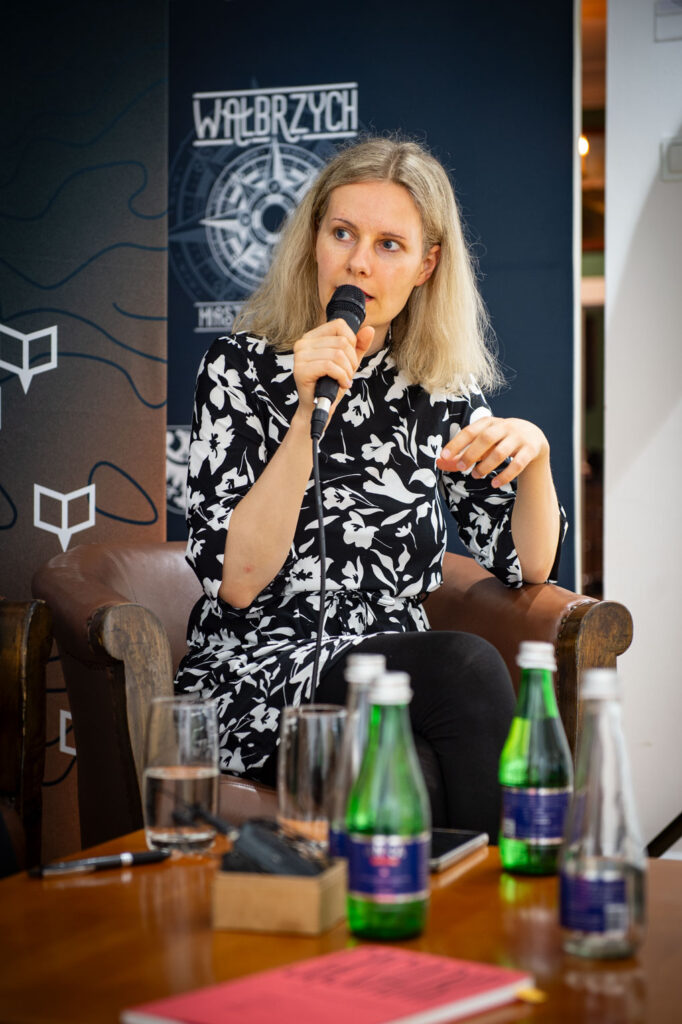
This year, we resumed at the Mountains of Literature presentations of Czech literature, which were an important segment of our Festival in the past. We hosted eminent Czech writers, proving that literature knows no borders.
There was a meeting with Radka Denemarková, one of the most widely recognizable Czech writers, who is also a literary scholar, awarded translator, essayist and author of scripts for film and theatre. She’s an indefatigable fighter for the rights of the weaker, most of all women, but she’s careful with the word ‘feminism’. In her books, she raises difficult historical issues, such as expelling Sudeten Germans from the Czech Republic and, recently, the Chinese community. We spoke about taboo topics in literature, searching for the truth about the past in stories, on the Czech language. – Music and visual arts can function separately from language and are in a way universal, but literature is limited by language. A writer is always locked in the prison of his language … I declare I will continue writing in Czech, but I don’t want the language to limit me. On the contrary, I want to test its possibilities and expand the borders – said Radka Denemarková. The conversation, interpreted by Agata Wróbel, was moderated by a specialist in Czech studies Anna Wanik. During our Festival, Denemarková was accompanied by a film crew working on a documentary about her, her creative process and political involvement.
We asked Petra Dvořákova about growing up as the most difficult period in life. The main characters of her bestselling “Crows” are teenagers trying to cope with being lost, misunderstood and devoid of support from the family. Aleksander Kaczorowski spoke to the author about growing up in a toxic family and the experience of anorexia, art therapy and being a mother of two growing-up sons. – I’ve never wanted to be a writer – recalled Dvořákova, who was a nurse and worked in an operation theatre and was pushed to write by her personal experiences, including leukaemia and a crisis of faith. The meeting was interpreted by Agata Wróbel.
The third author coming to MLU as part of the Czech segment was Anna Beata Hablová – a Czech poet, prose writer, architecture theoretician and urbanist. We spoke with her about artists working in supermarkets, sad love poems and how the process of abandoning youthful illusions looks like. Hablová also talked about poetic rap, which she performs with passion, and urban weeds. Together with the moderator Anna Wanik, she considered what we expect from philosophy today. The meeting was translated into Polish by Agata Wróbel.
We also spoke about the world of social media and influencers, provoked by two books: “Nie zostawaj influencerem” [Don’t Become an Influencer] by Janek Strojny (Znak Literanova Publishers) and “Influenza. Mroczny świat influencerów” [Influenza. The Dark World of Influencers] by Jakub Wątor (Agora Publishers). Janek Strojny was an influencer and he knows how to make money on it. But he also knows the dangers of this world, because he submitted to them, and so in his book he explains why it’s not worthy to enter it. The journalist Jakub Wątor, on the other hand, in “Influenza” attempts to describe the phenomenon which flooded our contemporary world. We know that influencers often persuade the society much more strongly than persons from the world of politics and science, we are also aware that the vision of a colourful reality is very tempting, especially for young people, and we can’t change it. – I faced huge hate on the web. And then one day I published something nobody hated. I was afraid I died. And I was afraid of my fear – recalled Wątor. We invited both authors for a discussion to take a closer look at that reality and try to reveal what’s hidden behind the colourful front. The meeting was moderated by Katarzyna Kasia.
The Flying People’s University (FPU) segment has become an integral part of the Mountains of Literature Festival several years ago. Last year, during a meeting at Sarny Castle, we spoke about transforming FPU into a year-long series of workshops, seminars, classes and discussions.
In small towns, access to extracurricular education, including raising (in an attractive form) the awareness of the biggest threats to the present and possible solutions to growing social problems, is very limited. Schools don’t always provide opportunities for proper development and put young people, and often their parents, at a disadvantage in comparison with the residents of big cities. It is no coincidence that the support for radical political views is the biggest in small, poor towns and communities. The Mountains of Literature Festival’s role here is to provide equal opportunities, but limited duration prevents it from offering systematic training. The Flying People’s University should change it, allowing for year-long educational activities for those who need them.
The educational segment of the FPU at the Mountains of Literature Festival has been dynamically developing in the last years, not only due to the nature of the discussed topics and a considerable interest of residents and the Festival’s audience, but also due to the growing number of social problems and perversions of the educational system. The Polish school system – by e.g. a radical change in the list of obligatory reading and implementation a new historic policy – has transformed in recent years into a place of indoctrination and exclusion of ethnic minorities. It deepens and exacerbates social divisions, it censors debates on such issues as sexual minorities, climate disaster, gender identity, the rule of law, equal rights and many other topics.
Participation in discussions on ecology, history and social issues, conducted with unrestricted freedom of speech and expression – inspires, broadens horizons and defeats indifference. That’s what we want to do at the Flying People’s University.
As was already mentioned, classes in our educational segment are more and more popular among our audience, and this year over 800 people participated in them. Olga Tokarczuk herself says that she happily participates in workshops organized as part of FPU and after each Festival she feels she acquired new knowledge.
Bekriah Mawasi, Palestinian writer and translator, who specializes in visual culture, contemporary literature and movement conducted a workshop entitled “Reading Palestine”. The class was devoted to ways of reading Palestinian literature, at the same time taking into account and highlighting the Palestinian experience. Combining texts with art and cinematography, the participants tried to understand in what way the life of Palestinians can currently be present and noticed in the context of the continuing great displacement. The moderator suggested how to include the Palestinian experience in the cultural practice and which way to guide people ‘reading’ Palestinian art and culture.
Present in the FPU programme for several years now, the “Ex-centre” seminar was moderated by Edwin Bendyk, president of the board of the Stefan Batory Foundation, journalist, columnist and a writer, specializing in issues of civilisation and the relationship between science & technology and politics, economy, culture and social life. This year, the motto of the seminar was “The end of the world will not come. If we do our best”. The participants considered where the world is heading, if future is already determined and what we can learn from the war in Ukraine. “The future is already here – it’s just not evenly distributed” – said William Gibson many years ago. It’s true. In the laboratories of the Silicon Valley, the work on the utopian world of the future continues, a world in which travel to Mars and colonization of extraterrestrial planets are natural. Their implementation will be facilitated by immortality and technical singularity achieved in advance. Critics of those fantasies concentrate on the fact that 750 million people around the world still don’t have access to electricity, and even more – to clean water. The consequences of the climate crisis already turn more and more areas of the Earth uninhabitable. And only a few still believe in the possibility to reach the goal of the Paris Accords, i.e. stop the growth of the global surface temperature at the level of 1.5°C above pre-industrial levels. Opinions on the development of artificial intelligence divide scientists and analysts. Some hope that it might help humans to quicker manage ecological, social and economic challenges. Others convince that a future with artificial intelligence will not need humans at all. In such a situation, geopolitical tensions will lose importance, for example the Russian aggression and war in Ukraine.
Edwin Bendyk, together with cultural managers: Dominika Kawalerowicz, the director of Wrocław Institute of Culture, and Aleksandra Szymańska, until recently the director of the City Culture Institute in Gdańsk, moderated the workshop “New Polish Culture”. Together with the participants, they searched for an answer to the question how to support and cultivate culture which responses to the challenges of the present. They observed where, in a dynamically changing reality, creators are as well as institutions and people shaping them. They wondered how we understand public mission in culture, how flexible and open we are to new models of its functioning, if we are ready to accept new cultural policies. The starting point for the discussion was the Mountains of Literature Festival, which for the moderators is an example of a format in culture which shares the features of an institution and a project, and at the same time has an ambition to answer the needs of audiences who want to discuss both literature and the world around them. Thus questions appear if it is possible to shape a cultural policy taking into account the needs of the whole society, free from short-term political goals and at the same time not avoiding debate and argument at all costs.
Constantly very popular are also seminars created and moderated by Magdalena Środa, philosopher, professor at the University of Warsaw. This year the subject was “Body, gender and sex in philosophy”. None of those important elements of the human condition constituted a philosophical problem, but only (?) a normative one: the body was disciplined and scorned, sex was forbidden or its forms were limited, gender was prescribed according to the binary pattern (woman-man). The turn in philosophy, which we can call corporeal-sexual-gender, took place as late as in the 20th century, but it radically influenced the understanding of identity, social relations and most of all – morality. The participants of the seminar started their considerations with a question: is the body ‘ahead of’ gender, which in turn determines sexuality, if it’s rather sexuality which determines our gender and body. They spoke about sexual and bodily norms, and especially about what’s hidden behind them, and about ‘enforced heterosexuality’ and gender which escapes the binary, and also about sexual work. The philosophical guides for the seminar participants were, among others, Plato, Simone de Beauvoir, Michel Foucault, Judith Butler and Paul B. Preciado.
Creative writing workshops, for which participants apply by sending short stories on a given subject ahead of the Festival, for years have been an integral part of the Festival. This year, the meetings, which always take place in Ruda Town Public Library, were entitled “The-story-of-bordering”, and were moderated by poet, prose writer, literary critic Karol Maliszewski, journalist, writer and singer Miłka Malzahn and writer and translator Zbigniew Kruszyński. This year, the mottos were “border” and “bordering”. In their short stories, the selected authors attempted to answer the question what the border is – in the human mind and in reality. What is the weight of this word, which would like to be airborne, but sometimes gets terribly heavy, bonded with fear, pain, despair. We also speak about “intransgressible borders”. Who founds them? Which cultural mechanisms place them in our heads? Is it good they exist, as they establish ethical and aesthetic norms? Or perhaps not good, so we should undermine them, move and relativize? In the selected short stories, all those intuitions were presented in interesting ways.
Paweł Chyc, a cognitive anthropologist, populariser of science, introduced the ideas of animism to participants of the workshop “Many bodies of a Person”. The first part was a seminar presenting an accessible introduction to the ideas of animism and Amazonian perspectivism related to it, illustrated with video materials. Chyc spoke, among others, about how while studying foreign cultures in the Amazonia, we discovered perhaps the most fundamental cosmology, i.e. animism. He also explained why you don’t have to be born in Amazonia to think in an animistic way. The second part had the form of an open discussion focused on two issues: first of all, how do we acknowledge the subjectivity of animals and in which activities is this acknowledgement visible? In this context, participants spoke both about their everyday relationships with pets and reflected upon the relationships we have with wild and farm animals. They also considered if animism can help us to build a subject-based attitude towards animals, if animistic thinking prepares us for the future in which interactions with artificial intelligence will be similar to relationships with a person.
“You can’t really say anything nowadays” is a sentence which many of us have probably heard or maybe even said ourselves, outraged by various ideas about pronouns, weirdly sounding words, persistent corrections and sometimes foreign sounding newspeak. It was also a title of the workshop on sensitive language conducted by Lena Bielska, a certified coach in self-defence and assertiveness for women and girls WenDo, and anti-discriminatory coach. Language describes reality, although sometimes it can’t keep up with it, or maybe it’s the users who can’t keep up with the language. That’s why during the workshop, in both a lighter and more serious mood, participants created a space to understand linguistic nuances, the socio-political context and challenges related to equality. They peeked into the arcane knowledge coming from simplifications and stereotypes, they took up the gauntlet of questions about pronouns and, first and foremost, they checked what is, for each of us, an egalitarian, inclusive language, full of respect and dignity towards humans and nature. They also looked at the so-called language of deficit, the broad understanding of hate speech, to finally take care of that which is the most important – a meeting with the Other and a growing awareness of the power of our words.
A film workshop was organized for the first time as part of the Flying People’s University. It was devoted to the person and work of Lav Diaz, a Filipino film director, one of the key representatives of slow cinema movement, whose films discuss social and political problems of the contemporary world, using the example of Philippines. “Slow cinema. The Woman Who Left (2016) – the unwritten novel and its eccentric creator Lav Diaz” was moderated by Anna Sawko von Massow, German literature specialist and literary scholar, who as a student was an assistant to Karl Dedecius. The participants got to know the director’s oeuvre and learned secrets of slow cinema. They got acquainted with the cast of the film and heard critics’ opinions about it. Introduction to slow cinema movement allowed them to watch more closely the film “The Woman Who Left”: a story of a woman who was punished without committing a crime, and after 30 years in prison is released and pursues vengeance. They confronted their reflections with the film and shared their impressions after the screening. They also tried to look together at the events presented in the film not only from the perspective of the aggrieved woman. They listened to dialogues and the soundtrack and considered why Lav Diaz is called one of the most eccentric creators in the contemporary cinema.
Filip Zawada, poet, prose writer (Nike Award finalist), musician and photographer, as well as a director and actor in alternative films and a graphic artist, conducted classes on the border between art and art therapy. “From the Point of View of a Potato. Workshop for people devoid of talent” was related to the new book of drawings by Zawada (published by Znak) and were directed to adults who want to take on drawing, but are afraid or ashamed. The word ‘want’ was key here, as that’s the condition to take first steps in art. During the meeting, participants got a chance to draw a happy or a sad line or a circle which ends, and all information on how to do it has been approved by a 4-year-old. Filip Zawada collected information from his son and created a drawing workshop based on not judging oneself and enjoying drawing. The participants learned also how to create with their eyes closed and learned why it’s sometimes better not to think too much, but trust their feelings.
As always, a large part of our workshops is devoted to issues of ecology and climate change, directed to nature and animal rights.
A local association of nature lovers Stolovelasy (Lucyna Piwowarska-Dmytrów, Wojciech Grzesiak, Michał Derecz) took Festival participants on a walk along part of the Radków Walking Ring Road. It was a workshop entitled “Sensory reading of the forest. Attentiveness in contact with nature”, during which the research areas were body, climate and the forest. The moderators pointed out that through skin, smell, sound, touch we can influence our psychophysical state and consciously regulate emotions. In contact with nature, in a space protected from excessive invasion of homo sapiens, they stopped to read themselves and the forest. They learned to regulate their breath, listen to the sounds, touch the bark, tickle their feet with moss. – Watching greenery can itself lower the level of stress, calm down and stimulate creativity. A sensitive body synchronised with the surroundings is a space of fascinating biochemical transformations. Walking out of the urban space, we leave behind motor vehicles, smartphone screens and even shoes. We enter the greenery – said moderators from Stolovelasy association.
Another workshop-walk was based on observing the influence of climate changes on the forest ecosystem and explaining the difference between strict and active protection. It was moderated by Bartłomiej Jakubowski, the director of Stołowe Mountains National Park. Walking along Kręgielny Route, participants got to know the forest ecosystem and its characteristics in the currently changing climate conditions. Using the example of the Great Batorowskie Bog as an area under strict protection, they observed how an ecosystem functions without human intervention. The moderator also spoke about humans – as the main reason spruce was introduced in locations where naturally mainly beech trees and fir should grow.
Michał Książek, poet, reporter, culture expert, forestry engineer and ornithologist also took the Festival participants on a workshop-walk. His series “Bioyage” is a conscious practice of surprise and wonder, which leads to the search for a new language to tell the story of the world. It is based on a conscious work of the senses, consolidating good experiences in the body on the basis of joy, ancient gestures and human anatomy, which is conductive to peeking, hiding and reception of positive biotic and abiotic stimuli.
Once again we hosted as part of FPU Karolina Kuszlewicz, who in her series “Representing non-human animals” conducted workshops on knowledge, empathy and courage. Human actions significantly influence the fate of all non-human animals. They often cause much damage and have very painful consequences – they’re a source of destruction, suffering, and even mass murder. At the same time, humans have a great potential for taking care of and protecting creatures dependent on them – they’re capable of creating rules ensuring just treatment of non-human animals as well. They can provide real help, here and now. Norms concerning animals are in many respects still outrageously excluding. They push animals to the margin of the community of sentient beings, which is aided by their unclear legal status ‘between an object and a subject’, whereas knowledge about animal sensitivity leaves no doubt that at least all vertebrates feel, both physically and psychologically. But we have the tools to deconstruct those norms, challenge them and then change. Those tools are knowledge, empathy and courage. It is our duty to carefully observe and inform. To demand recognition of animal rights as part of broadening the scope of justice to include sensible creatures other than humans. We can do it in courtrooms, on the streets and on our own plates. The workshop conducted by the lawyer and creator of The Law Office by the Vistula consisted of three parts: confrontation with the current state of affairs, the search for emphatic causative power and the practical use of one’s power to help animals – both in a short-term and a long-term perspective. The participants worked in the name of particular animals and searched for their own place in representing them. They entered the roles of witnesses, defenders and prosecutors – metaphorically and practically. They moved between sensitivity and the law, worked on cases from real life – histories of animals presented by Karolina Kuszlewicz, who for 13 years has been defending animals and nature in courts: carps, rooks, seagulls, roe deer, bears, wolves, lynxes, crocodiles, dogs, cats, pigs, the Vistula, the Carpathian Forest and others.
We also organized a vegan culinary workshop with Dominika Olejnik, known on the internet as Stewunia, who proves that cooking without meat and animal products can be tasty, easy, simple and interesting. She is also called the Polish queen of pickles, and her recipes are very popular on social media. To ‘break the ice’, workshop participants tasted various original pickled made by Stewa with fresh aromatic bread and vegan dips prepared by the cook. In a joyful and creative buzz, they prepared picked beets, at the same time making pierogi with spinach and vegan desserts with tofu and dark chocolate.
For the first time, we incorporated another event into the Mountains of Literature: the Festival of Olga Tokarczuk’s Translators. 34 translators of the Nobel Prize winner’s works from around the world visited us – also authors of translations of works by other excellent Polish writers.
The Festival of Translators is a development of the project we started two years ago: a series of meetings and discussions on Polish literature from the perspective of the most important ambassadors of our culture – those who carry it over the borders of languages. In 2022 in Wrocław, Olga Tokarczuk Foundation organized the First World Congress of Olga Tokarczuk’s Translators – between 15 and 17 September, we hosted 33 translators of the Nobel Prize winner’s works. There were three debates organized during the congress: we discussed the blurred border between being an author and a co-author, the reception of Polish literature in the world, small languages and big ambassadors of culture (the debate was on translations in Estonia, Finland, Serbia, Macedonia and Lithuania).
Those who translate literature perform the role of ambassadors – they create the image of a given country and language, they spread words and ideas, they broaden the geographic scope of discussions around books. As Olga Tokarczuk Foundation, we are well aware of their difficult but important role – in their native languages, they become the voice of writers. In 25 years, books written by Olga Tokarczuk have been translated into 45 languages by a group of over 160 people! Thanks to their efforts, the Nobel Prize winner’s works are available in various parts of the world, for example in the United States, Brazil, South Korea, and even Sri Lanka. Altogether, almost 400 editions have been published around the world – new translations and reprints – and this number still grows!
On the lists of works translated by our guests there are not only books by Olga Tokarczuk, but also written by other authors. Yet on those lists, the most often you can find classics of Polish literature, i.e. works by Witold Gombrowicz, Stanisław Witkiewicz, Bolesław Prus, Zofia Nałkowska, Jarosław Iwaszkiewicz, Stanisław Lem, Władysław Reymont and Henryk Sienkiewicz. From poetry and drama, the translators most often select Wisław Szymborska, Tadeusz Różewicz and Stanisław Wyspiański.
This year, we decided to integrate the congress with our most ambitious project, i.e. the Mountains of Literature Festival.
Similarly to the edition two years ago, the selection of guests was based on the number of their translations of Olga Tokarczuk’s prose. In 2024, we hosted: Antonia Lloyd-Jones (English, winner of Transatlantyk award in 2018), Maryna Shoda (Belarussian, winner of “Prajdziswiet” magazine prize), Silviya Borisova (Bulgarian, winner of the ZAIKS prize and three awards of the Bulgarian Translators’ Association), Krum Krumov (Bulgarian, winner of the award for outstanding achievements in the area of translating humanities presented by the Bulgarian Translators’ Association), Li Yinan (Chinese, head of the Department of the Polish Language at the Faculty of European Languages and Cultures at the Beijing University of Foreign Languages), Pavel Peč (Czech), Tapani Kärkkäinen (Finnish, winner of Agricola prize awarded by the Translators and Interpreters’ Association), Margot Carlier (French, winner of Prix Amphi and Grand Prix de littérature de Saint-Émilion), Grażyna Erhard (French, translator and playwright), Maryla Laurent (French, winner of Laure-Bataillon award, recipient of the order of the Chevalier der Artes et Lettres), Anastasia Chatzigiannidi (Greek), Teona Mchedlishvili (Georgian, employee of the Polish Embassy in Tbilisi), Katja Wolters (Georgian, winner of Saba Literary Award), Miriam Borenstein (Hebrew, teacher at the School for New Translators in Israel), Abel Murcia Soriano (Spanish, director of Cervantes Institute in Warsaw, winner of Transatlantyk award 2024), Xavier Farré Vidal (Catalan, winner of an award for translating a selection of Czesław Miłosz’s poetry into Catalan), Hikaru Ogura (Japanese, winner of the Award of the Japanese Society of Russian Literature), Vyturys Jarutis (Lithuanian, winner of the Gold Cross of Merit of the Republic of Poland and Gloria Artis Medal for Merit to Culture), Ingmara Balode (Latvian, poet awarded with the Latvian Literary Award of the Year), Lidja Tanuševska (Macedonian, winner of the Gold Pen award presented by the Literary Translators’ Association in Macedonia), Karol Lesman (Dutch, winner of Transatlantyk award in 2013), Charlotte Pothuizen (Dutch, winner of the Aleida Schot-prijs), Lisa Palmes (German, winner of Karl Dedecius prize), Lothar Quinkenstein (German, winner of Jabłonowski prize and Karl Dedecius prize), Julia Więdłocha (Norwegian, creator of Meteor Forlag), Olga Bagińska-Shinzato (Portuguese, originator of the Brazilian Studies Institute at the University of Warsaw), Teresa Fernandes Swiatkiewicz (Portuguese, recipient of an honorary award in Grand Prix of Literary Translation), Cristina Godun (Romanian, winner of the Romanian Writers’ Association Award), Jana Unuk (Slovenian, winner of the Anton Sovrè award for literary translators), Milica Markić (Serbian, twice nominated for the Miloš Đurić prize), Barbara Delfino (Italian, president of the Polski Kot literary award) and Ludmiła Ryba (Italian, actress and director).
As part of the Festival of Olga Tokarczuk’s Translators, we prepared eight events open to the public: four panel discussions, two presentations of Polish literature and two workshops for young readers (described in the section devoted to the Little Mountains of Literature).
It’s often said that translators stand on a bridge linking two cultures. It’s also said they build bridges between languages, looking for links, associations, proper metaphors. Abel Murcia Soriano talked to translators: Antonia Lloyd-Jones (English), Katja Wolters (Georgian), Xavier Farré (Catalan) and Karol Lesman (Dutch) about the reason they became interested in the Polish language, how they began to learn it. During the debate “Linguistic bridges. The foreign Polish language” they spoke about their relationships with their authors, what kind of bond is built between an author and a translator, what connects and what separates the languages the panellists speak.
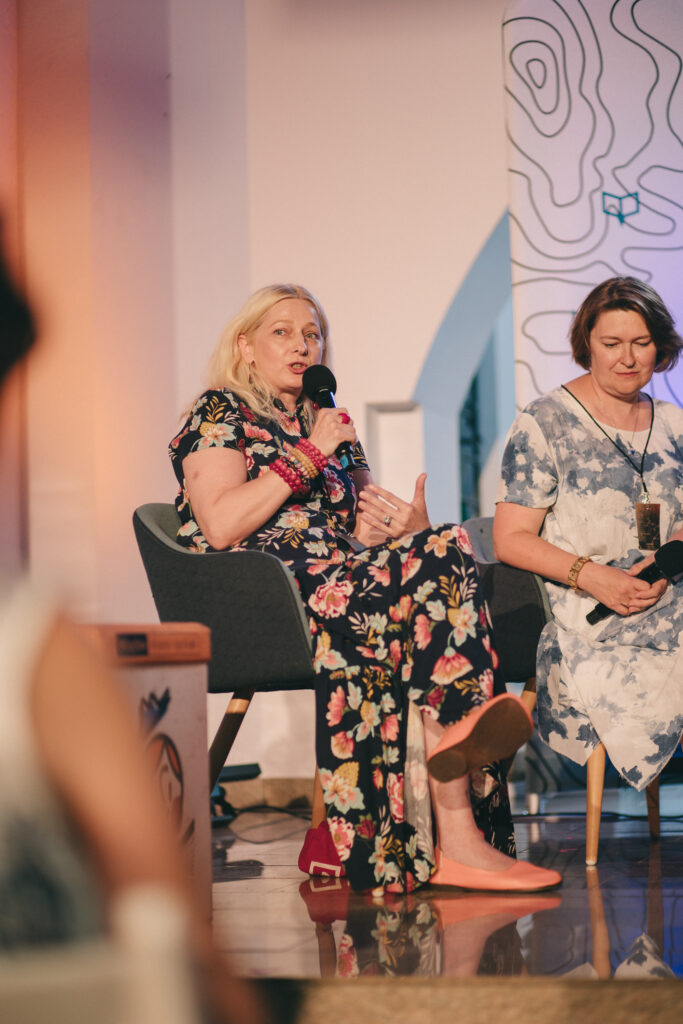
Windows is the name of a group created by Olga Tokarczuk’s translators. They were brought together by a shared passion and their love for Polish literature. During the meeting “Translation Windows” Milica Markić (Serbian), Miriam Borenstein (Hebrew), Teresa Fernandes Swiatkiewicz (Portuguese) and Krum Krumov (Bulgarian) told us how they met and where the idea for ‘Windows’ came from. In a conversation with Małgorzata Kolankowska, they told what translators look for and what they see in their windows, what they talk about, how to they approach the issue of translatability and untranslatability, which challenges they share and what the role of gender in translation is? A surprise was the presentation of a short film recorded by the translators, in which they read their favourite quotes from Olga Tokarczuk’s books. We heard fragment of “Flights” in Korean, Portuguese, Lithuanian and Catalan.
During this year’s Festival, we spoke several times about the canon of required reading which shapes the education of next generations. We considered if a similar canon could be created for translators of Polish literature. We spoke to Cristin Godun (Romanian), Maryna Szoda (Belarussian) and Jana Unuk (Slovenian) about which authors and which books should be put on such a list. – Without those fundamental, key works, it’s impossible to understand any nation, including the Polish nation – claimed Cristina Godun. But she added: – But we don’t have to like all the works from this canon. During the debate “The canon of a Polish literature’s translator” Michał Rusinek asked also about the motivations of translators in selecting texts to translate, what is read abroad and if literature is an intellectual challenge or entertainment.
During the panel discussion “The (non)transparent translator”, Lisa Palmes (German) and Lothar Quinkenstein (German) spoke to Vytrus Jarutis (Lithuanian), Maryla Laurent (French), Tapani Kärkkäinen (Finnish) and Lidija Tanuševska (Macedonian) about their visibility. They wondered if the presence of the translator is noticed, marked on the cover, what their role is during the promotion of the book, to what extent they are ambassadors. They also said what they do when they don’t translate. – I very quickly understood that language is not only words, it’s also a different way of thinking – said Maryla Laurent about her experiences. Guests also spoke about their creative work, passions, hobbies and academic work, in other words: what they do not to be invisible.
As part of presentations of Polish literature, the translators and the audience of the Mountains of Literature Festival met with Wojciech Chmielarz, Wioletta Grzegorzewska and Małgorzata Lebda.
A lecture entitled “Breathlessness. On changes in the contemporary Polish language” was presented by Michał Rusinek. He referred in it to changes in the language reproducing social reality which constantly and dynamically changes. – When that reality changes dynamically, then the language changes quickly as well, never keeping up with reality anyway: so the language gets short of breath –claims Rusinek. He added that literature comes from listening to the language, or more precisely: contemporary languages, it feeds on them and transforms them. In his lecture, he wondered how translators can work with the language of contemporary literature, not being able to listen closely to the contemporary Polish street and how they can render that language in their languages.
The year 2024 brings more than the anniversary of the Festival. 35 years ago, the first partially democratic parliamentary election took place in Poland, 25 years ago we joined NATO and 20 years ago we became a member of the European Union. – Anniversaries can sometimes be underrated. But for us, important jubilees are very significant, and their unusual accumulation this year has a unique symbolic value. By honouring anniversaries, the Festival, which has become a part of the bloodstream of the region, reminds the residents that they are Europeans and free people. It highlights values related to those notions. It also allows for an unhindered discussion about the future and how not to waste the achievements of the past 35 years, how to correct them, how to approach the most recent history of Poland – says Grzegorz Tokarczuk, president of the Foundation.
2024 is also yet another year of Russia’s aggression in Ukraine and the continuing war in Gaza. It is a period of both symbolic and actual political changes in Poland, Europe and around the world. It is a period of anxiety and uncertainty, often chaotic and difficult to define, but also a time of hope and an opportunity for stabilization and democratization.
And it is this particular tear, the emotions accompanying contradictory experiences and expectations, local reliefs and global catastrophes, what is “in between”, as well as the anniversaries mentioned above, which dictated the programme of this year’s Festival. Because we believe that art and culture provide the best, the quickest and the most uncompromising diagnoses of both worlds: the real one and the unreal one. And we continually believe in the words from our Founder’s Nobel Lecture which we’ve selected as our motto: “When the story changes, so does the world”.
Programming this year’s Festival, thinking about the time when it takes place, considering the too numerous ideological, social and political tensions which accompany us, searching for inspiration and solace, we were returning from time to time to the essay “Kraina Metaksy” [The Land of Metaksa] by Olga Tokarczuk. The treatise written by our Founder is devoted mainly to issues of art, the process of its creation and mechanisms of reception. However – as it often happens with the Nobel Prize winner – while reading it, we start to see it as a treatise on phenomena going notably beyond the sphere of art.
Decoding the Greek word metaksy, which means ‘between’, Olga Tokarczuk attempts to determine and define possible spaces between beings. For the purpose of her essay, she proposes a notion that ‘between’ cannot mean emptiness, more: it cannot be emptiness, but it is something which connects the realities of opposites and can be – even if seemingly its main role is to bring the imaginary to life – very real, palpable, concrete.
Thus we began, for the purpose of the programme of this year’s edition, to define for ourselves realities and that which is between them, which inspires us, draws our attention, even though it is vague, undefinable and at first glance – impossible to classify. In this way, we could move between the obvious and the unobvious, the confirmed and the uncertain, real and unreal. What we encountered in between allowed us to formulate questions which perhaps we wouldn’t ask without reading “The Land of Metaksa”. It turned out they are related to all topics we’ve been discussing at the Festival for a long time. Liberated from the fear of banal curiosity, not afraid of fundamental issues, we could start asking ourselves what is the most important issue for us today, and what escapes the simplified and primitive model of interhuman communication via short internet forms, to which – oh horrors! – we’ve already gotten used to.
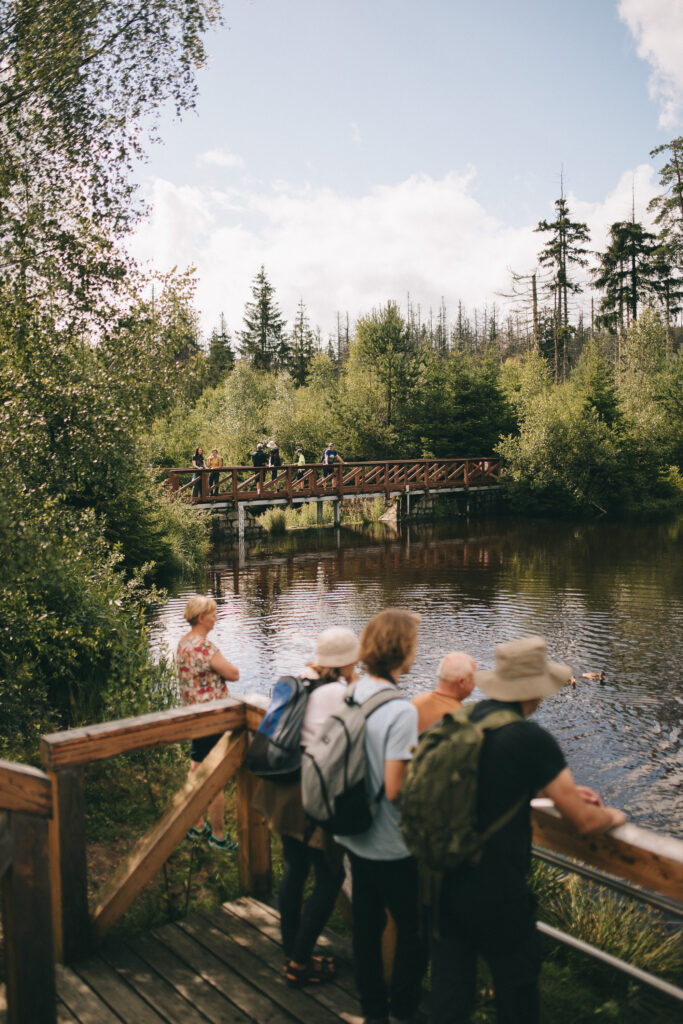
That is why we decided to discuss also matter related to politics. In the last years, we’ve often heard that the Mountains of Literature Festival is an oasis of freedom in the world getting more and more Brownshirt. Our audience appreciated the often heated discussions and debates on the most important challenges of the present. We were visited by many politicians, critics of the former authorities. This year, we decided to invite several of them, both in relation to the anniversaries mentioned above and the posts they assumed after the last parliamentary elections. As a result, we actually created a separate political segment.
Apart from various intellectual and social advantages of such visits, we also had an additional goal in this segment: we wanted the politicians to see the true power of Polish culture and to face its huge audience. We wanted them to see up close how the people of culture change the world. We wanted the driving force of politics to meet the driving force of culture. – I think it’s time for a seemingly paradoxical redefinition of the notion of “the people of culture”. It’s obvious that’s what we call the artists appearing on our stages. But from our perspective, and from the perspective of the stages as well, the true people of culture are the people in the audience. It’s an immeasurable value that we can all clearly see and hear each other during big cultural events. And in the time of growing global crises, we should constantly remind of the cliché that art changes the world thanks to its recipients – said Irek Grin, chairman of the Council of Olga Tokarczuk Foundation and programme director of the Festival.
We hosted Adam Bodnar, who was a guest of the Festival in previous years and is well known to our audience. But it was his first appearance as the minister of justice – not a rigorous and competent critic of the authorities, but a man with authority. Holding a post which is particularly exposed in the period of restoring the rule of law in Poland. Thus, we invited him to speak about himself, his emotions, the effort demanded by his new role, and also about how to restore the rule of law, at the same time not breaking the rules of a law-governed state. How not to fall into a trap of simplifications, omissions, balancing on the edge. How not to repeat the mechanisms of the authoritarian power, facing the indolent system it left behind. In other words: we spoke about responsibility, and questions were asked by Sylwia Gregorczyk-Abram. – Today, the most important for me is my responsibility towards the voters. I feel the burden of that responsibility. Fulfilling promises, especially restoring the rule of law, demands patience and determination every day. It’s not enough just to snap your fingers – said Adam Bodnar. He added: – We’re in a period of transition. We try to restore standards and understanding of the Constitution, as well as its implementation which we had in 2015.
The minister of justice faced both approval and impatience, visible in numerous questions from the audience.
Adam Bodnar participated also in a debate on punishment in the context of responsibility for war crimes in Ukraine. He spoke to Wiaczesław Łewycki, poet, translator, Doctor of humanities, Ukrainian state official responsible for international cooperation. The conversation was held in a very special context, as on that day Russians conducted a missile attack on Kiev, including the biggest children hospital in the capital of the country. – I called my mum, who’s in Kiev now. She says it’s the most terrible situation since the beginning of the war – said Łewycki. He also paraphrased Theodor Adorno’s words, saying that just like to create art after Auschwitz is barbaric, every cooperation with the Russian devil is barbaric.
Adam Bodnar highlighted the importance of the security agreement signed also on the same day in Warsaw by prime minister Donald Tusk and president Volodymyr Zelenskyy. Already at the end of February, the Polish minister of justice proclaimed in Kiev the necessity to establish a special international tribunal to examine the crimes of Russian aggression in Ukraine. This tribunal, according to the minister, is indispensable from the point of view of international responsibility. – The problem is that the international community hasn’t made a final decision yet how to judge war crimes committed in Ukraine. There are long discussions about how to include the crime of aggression, for which people such as Putin and Shoigu should be judged, as the subject of responsibility. I am very happy that Poland explicitly supports the establishment of the special tribunal – explained Bodnar.
During the meeting, we heard words of support for Ukraine from our audience and the minister’s assurances about bringing Russia to justice for war crimes.
With former president of the Republic of Poland Aleksander Kwaśniewski we spoke about the past in the context of the anniversaries mentioned above. The starting point for the conversation about Poland will be the book “The President”, an extended interview conducted with Aleksander Kwaśniewski by Aleksander Kaczorowski. Kwaśniewski was the only president in the history of the Third Polish Republic who won in the first round, co-author of Poland’s joining the European Union and NATO, participant of the Polish Round Table Talks (on the governing coalition side). For many people in the 1990s, his victories announced a return to Kreml-dictated politics; he was accused of participating in a spying scandal for Russia, his political opponents attacked his family. And finally, his presidency, spanning over a decade, resulted in losing influence in his own political camp. – The problem of the Left in Poland is historically complicated. But the Left proposed democracy and has never betrayed it. I could say spitefully that today we can be a paragon of democratic behaviour. I believe it was a mistake to transform the Democratic Left Alliance, which was a coalition, multi-current idea, into one party. The Left was right to focus then on bringing Poland into the European Union, but paid a high price for that, both by making a compromise with the Church and by abandoning some social postulates – he evaluated during the Festival. The discussion was moderated by Katarzyna Kasia and Waldek Mazur.
We also invited politicians to discuss the future: among others, threats to liberal democracy, Europe and climate challenges. Two prominent politicians participated in the debate moderated by Katarzyna Kolenda-Zaleska: Poland’s deputy minister of foreign affairs Marek Prawda and consul-general of Germany in Wrocław Martin Kremer. The starting point was the twentieth anniversary of Poland’s entering the European Union – with dreams and hopes, accepting, respecting and claiming as our own the legal order of the community and its values. Unfortunately, after 20 years a violent rise in nationalistic, xenophobic and populist tendencies affects not only Poland, but many European countries. – Populist challenges are lurking everywhere. We need to constantly continue the process of discussing our shared values – said Martin Kremer.
In the context of Russia’s aggression on Ukraine, in a world moving towards the climate disaster, conversations about the future conducted by members of governments of neighbouring countries with such varied and rich connections seem indispensable. We’re very happy we were able provide a stage, in the transborder region of Lower Silesia, to one of such conversations. Especially that contacts between Polish and German politicians in recent years haven’t been frequent and friendly. So let’s then – not paradoxically at all – make cultural events a place for such meetings.
We also organized a debate preceding the Congress of Culture which will be organized in November. This initiative, grassroots by definition, aims not only at diagnosing the condition of culture in Poland, but also at defining the needs, working on recommendations for the future and designing a change. With this debate, we would like to, as Olga Tokarczuk Foundation, to participate in the preparation for the Congress. We started from trying to face the definition of the Polish culture in the third decade of the 21st century, as a lot has changed since the last Congress. A lot changes every day, and culture, as we often say, is the human activity (perhaps the most important one) in which future can come true a long time before it becomes the present. We invited to the discussion director Agnieszka Holland, member of the European Parliament, until recently the deputy minister of culture Joanna Scheuring-Wielgus, columnist Edwin Bendyk and writer Jacek Dehnel. – The most important thing for culture is freedom – emphasized Agnieszka Holland. The debate was moderated by Irek Grin.
We also considered independence and peace in Poland, and that conversation was inspired by the book “Siedem życzeń. Rozmowy o źródłach nadziei” [Seven Wishes. Conversations on Sources of Hope] by Katarzyna Kasia and Grzegorz Markowski. Interviews with the guests of the meeting: Jarosław Kuisz, a historian specializing in the state and law, and Andrzej Leder, a philosopher of culture and psychotherapist, in the book became an interesting and interrelated essay about the contemporary Poland. We tried to understand those interrelations and discuss the ideas mentioned in the book in more depth. The meeting was moderated by Michał Nogaś.
Katarzyna Kasia moderated a debate entitled “Heavenly divinity”, to which she invited philosopher and psychotherapist Joanna Dukiewicz and philosopher and writer Piotr Augustyniak. She encouraged to think more about the absolute and less about institutional religion, which dominated the public debate on secularization in Poland. She asked who god is, what divinity is, and if the institutional church has a chance to free itself from the role of the most adamant guardian of patriarchalism. The panellists considered if women can save god, goddess, divinity, by including them in the rhythm of experience going beyond traditionally understood liturgical forms. They also searched for an answer to the question if the crisis of the institutional church means also degeneration of spirituality – or maybe it’s the opposite.
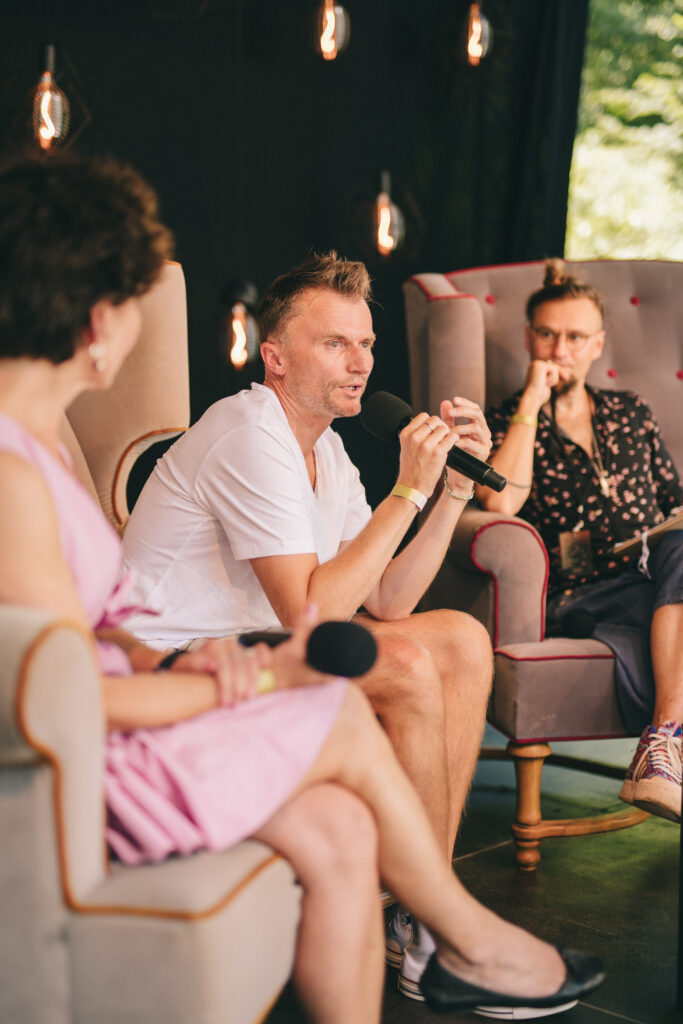
We also discussed issues of equality, this year concentrating in particular on transgenderism.
Even though more and more books, films and reportages are made about transgenderism, their authors are in majority cisgender persons. Yet is it difficult to reconcile activists’ postulates that only trans people should speak about transgenderism with the emphatic role of art, which build bridges and reconciles differences. The intricacies of the relations between art, identity and representation were discussed by transgender persons who work in various areas – activism, education and literature. Karolina Gierdal asked Nina Kuta and Kacper Potępski about, among others, how identity influences the creative and activist perspective.
Another discussion was based on two recently published books: „Pomiędzy. Historie osób niebinarnych” [In-Between. Stories of Non-Binary Persons] by Renata Kim (W.A.B.) and „Wiktoria. Transpłciowość to nie wszystko” wszystko [Wiktoria. Transgenderism Is Not Everything] by Piotr Jacoń (Luna). Lu Olszewski spoke to the authors. Renata Kim and Piotr Jacoń undertook a challenging task. Both authors immersed themselves in the world of transgender persons (binary and not) and decided to introduce the issue of transgenderism and non-binarism to wider audiences. During a conversation with them, we tried to learn what is going on in the basically unknown social group, how to speak to it, how to interact with it and why this knowledge is so important.
As always, we devoted a lot of space to issues of ecology.
We asked Szymon Malinowski about climate change – he’s an atmosphere physicist, one of the most important Polish scientists commenting and explaining climate changes from the scientific perspective. He has a unique ability to explain complicated phenomena in an accessible way. We wanted, in the world of fake news and the conviction shared by so many people that they possess unique knowledge and are infallible, a persuasive voice of an authority to help us to understand the threats and explain how to save us from the catastrophe. – We feel we live at the turning point. The level of climate misinformation definitely grows, but the level of climate consciousness grows as well. People feel something is not right, that the world changes because of the actions of humans – said Malinowski. It was the second meeting at the Festival which was a continuation of the fascinating discussion from the book “Seven Wishes. Conversations on Sources of Hope” by Katarzyna Kasia and Grzegorz Markowski.
We talked about the future of climate politics in the context of economy with Ewa Bińczyk and Edwin Bendyk during the debate “Socializing the Anthropocene. Ecoverve and Ecologizing Economy”. The title of the meeting is also the title of the book by Ewa Bińczyk, in which the author asks, among others, if it doesn’t pay for humanity to survive anymore, why we got to this point, what was the role of the principles of contemporary economy in that process and if humanities can help us to liberate ourselves from the ‘apathy of the anthropocene’. – I believe that civic disobedience is necessary. Fuck all the artworks covered in paint. There will be no art on a dead planet – said Ewa Bińczyk to an applause. The conversation was moderated by Robert Skrzypczyński.
To talk about meat industry, we invited Bartek Sabela, author of “Wędrówka tusz” [The Journey of Carcasses] (Czarne Publishers), a reportage on factory farming, winner of Grand Press award for the Reportage Book of the Year, and a member of the European Parliament Sylwia Spurek, taking a radical stand on the side of non-human animals. About 70 billion vertebrae animals are killed around the world every year. Their bodies turned into products are constantly present among us – on our plates, in our stomachs, in shoes, jackets, bags, covers of calendars. But animals as living, feeling beings are to a large extent invisible to us. Kept away from the eyes of future users and owners, not to spoil the mood and lower the demand. – It’s not enough to stop eating meat – appealed Sylwia Spurek. She added – We eat animals, we wear animals, we cure ourselves with animals, we use animals for entertainment. The question is, if we placed humans in the place of non-human animals, would it be as acceptable for us.
The discussion was moderated by Karolina Kuszlewicz.
For most part of the Festival, in various locations, the educational activity Tour de Constitution was with us, i.e. a continuation of a civic activity in the area of education and information conducted for two years by Active Democracy Foundation. As part of the initiative, there appeared, among others: lawyer Karolina Gierdal, lawyer and former deputy Polish Ombudsman Hanna Machińska, Danuta Przywara from Helsinki Foundation for Human Rights, lawyer Kinga Dagmara Siadlak, judge Igor Tuleya, and actor Andrzej Chyra. As part of the activity, they try to make people aware how important for normal functioning of a democratic state are the rule of law and obeying the Constitution. They visited us with their bus, they encouraged us to read the Constitution thoroughly and gave away copies of it. They also brought the Constitution in a version prepared for children and many educational materials.
We invite all generations of readers to the Mountains of Literature Festival – that’s why we created a separate segment for children and the youth: Little Mountains of Literature. This year, young readers had the opportunity to meet authors of children’s books, as well as participate in various ecological workshops devoted to climate change. There were also special events prepared for them as part of the Festival of Olga Tokarczuk’s Translators.
Agata Romaniuk brought a whole gang of cats, including the latest instalment in her mystery series for children – “Kocia szajka i zaginione bajki” [The Gang of Cats and Lost Fairy Tales] (Agora for children). In this book, cat detectives watch cartoons with Reksio and visit the Animated Film Studio in Bielsko-Biała. The author, know to children also as Ms Evening Story, encouraged readers to solve mysteries together.
Grzegorz Kasdepke, the author of “Detektyw Pozytywka” [Detective Music Box] and dozens of other books for children and young adults explained how a cheeky devil can be cool and if it’s worth being unruly. The writer believes his books are read by future rebels, inventors, explorers, revolutionaries, free spirits, rebellious personalities – people who won’t be pushed around! – Because we don’t write books to raise meek children, but cheeky devils – who’ll grow up into a wise society! – he claimed.
Barbara Sadurska came to the Litte Mountains with a new volume in the “Silver Dragon” series. In the first instalment, we met the main character, 12-year-old Matylda, who instead of going on her dream trip to Japan, spends holidays with her mysterious grandfather. In “Rada smoków” [The Dragons’ Council] (Agora for children), the second volume of the fantastic saga, her dreams about meeting magical creatures are still strong and, together with her new friend Sasza, she goes on an extraordinary and dangerous cruise. The moderator Miłka Malzahn asked the author not only about dragons, but also about travels, bold decisions and the great power of friendship
Ecological workshop for the youngest “Sounds of mountains” combined the topic of the mountains with the world of music. The aim of the workshop was to develop ecological awareness and musical creativity through various interactive and educational activities, as well as nurturing the love for nature.
As part of the Festival of Olga Tokarczuk’s Translators at the Little Mountains of Literature, a culinary-cultural workshop “What are the translators brewing?” was organized. Anastassia Chatzigiannidi (Greece), Pavel Peč (The Czech Republic) and Barbara Delfino (Italy) spoke about the cuisine, cooking and culture of their countries. The workshop participants had an opportunity to taste dishes and listen to music and stories from Greece, the Czech Republic and Italy. The meeting combined creative fun and learning.
We also invited for a workshop combining cultural studies and art “Stories from the mountains and the woods”. Three translators: Julia Więdłocha (Norway), Olga Bagińska-Shinzato (Brazil) and Margot Carlier (France) introduced young participants to mysterious stories from Brazil, Norway and France. It was an opportunity to learn about fairy tales from various parts of the world. Children could expand their imagination, getting to know friendly spirits and creatures which live in the mountains, the woods, seas, rivers and caves.
As part of the film segment at MLF2024 we presented eight productions and invited for meetings with their creators.
Our guest was the eminent Israeli film director and screenwriter Ari Folman. We screened two of his films: “The Congress” and “Waltz with Bashir”. The first was inspired by “The Futurological Congress”, a short story by Stanisław Lem published in 1971. This film isn’t a simple adaptation of the antiutopian vision of the Polish writer. The director uses elements created by the futurologist, he enters into a dialogue with them, interprets them anew and plays with them to create his own story. The second film brought international recognition to Folman, as well as many awards, including a Golden Globe and an Oscar nomination. It is an animated documentary with a script based on the memories of the war in Lebanon and Folman’s personal experience, as he was a member of the unit surrounding the refugee camp during the Sabra and Shatila massacre. The film has the form of the director’s dialogues with his friends, who participated in the fights in Beirut with him. – When I joined the army, I was 17 and a half years old, so I was very, very young. I didn’t want to participate in the fight, I was forced. Right after the beginning of the war, I entered survival mode: to save myself and not to kill – he said to our audience.
The meetings with Folman at the Festival were moderated by Lem specialist Stanisław Bereś and cultural studies specialist Piotr Jakub Fereński, interpreted by Katarzyna Janusik.
We organized an outdoor screening of “Green Border” by Agnieszka Holland, who afterwards met with the public. The film, which premiered in September 2023, opened the eyes of many people – not only in Poland – to the tragic situation of refugees on the Polish-Belarussian border. During the last ten months, almost everything has changed in Poland. Most importantly: the government, which started the uneasy process of restoring democracy, the rule of law, and some would even say ‘normalcy’ in our country. Only on the border time as if froze. Katarzyna Borowiecka, journalist of Polish Radio Three, talked to the director about what has changed in our reality and the world she describes in the last year. – Contrary to what politicians and some columnists claim, still about 20 per cent of people trying to cross that border are women, children and the elderly. Manipulation of this stream of refugees is in the hands of Lukashenko and Putin. They infiltrate those groups with their agents and officers. The governments of Poland, Lithuania and Latvia did nothing but built this imperfect fence to counteract it. Apart from propaganda and cruelty, we have no other tools to react to this crisis. And neither propaganda nor cruelty will solve it – said Holland.
Our guest was also director, screenwriter and poet Andrzej Titkow. We presented his documentaries, including “Sztuka błądzenia” [The Act of Wandering] presenting painter and writer Henryk Waniek. After the screening of “Album rodzinny” [Family Album], the director met with the public. The main character in the film is Andrzej Titkow’s great grandmother, Franciszka Arnsztajnowa, who was a poet, translator, social activist and advocate of independence. She died in the Warsaw ghetto, and only guesses, theories and legends concerning her death remain. The meeting was moderated by Irek Grin.
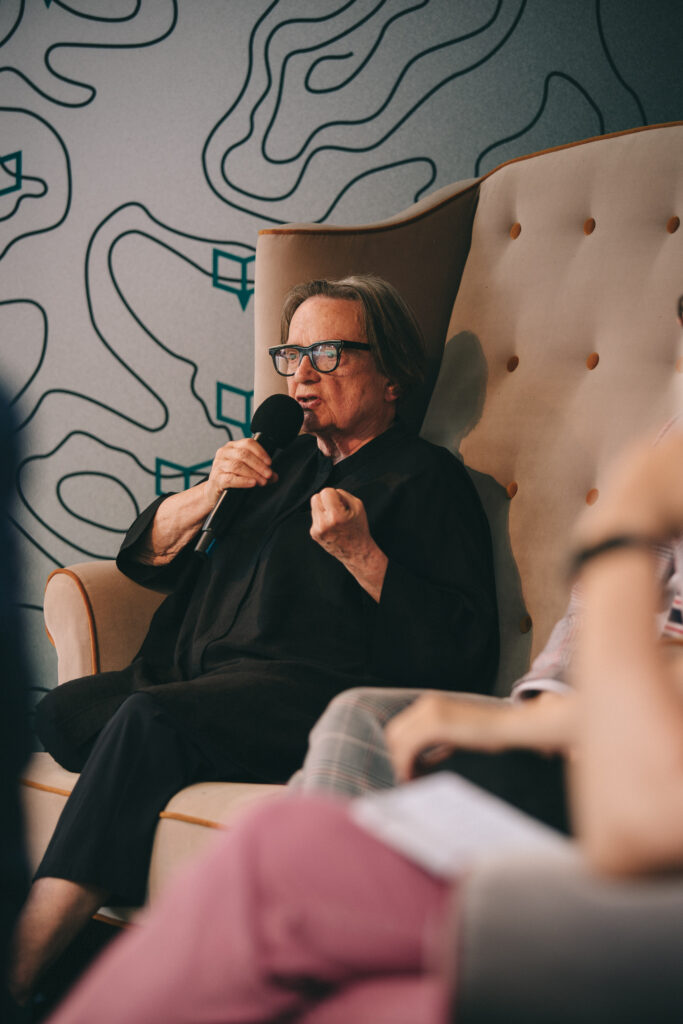
We screened the last film by Marcin Giżycki “Niedokończone życie Phoebe Hicks” [Unfinished Life of Phoebe Hicks], based on Agnieszka Taborska’s book of the same title. A visual oratory, co-directed after Giżycki’s death by Grzegorz Pleszyński, was produced by the artistic group Czarny Karzeł from Bydgoszcz. The screening is a tribute to the director, and after the screening Agnieszka Taborska spoke to Anda Rottenberg.
We presented the bew biographical film about Andrzej Seweryn “Jestem postacią fikcyjną” [I Am a Fictional Character]. The director, Arkadiusz Bartosiak, accompanied the eminent actor with a camera for a whole year. This type of documentary is not a predictable, commemorative biographical film, but rather a dynamic and ambiguous portrait of an artist. After the screening, Andrzej Seweryn spoke to Irek Grin about film, life and art. – It’s very important to differentiate between playing and pretending and falseness. Provoking a debate about what is fictional and what is true seems very interesting to me. I think there’s no fiction in art – said the actor.
After the discussion about the responsibility for the war crimes in Ukraine, we presented the Oscar-winning shocking documentary “20 Days in Mariupol” directed by Mstyslav Chernov. The main character of the film is the besieged city. We watch a register of Russian crimes, a record of the life of actual residents.
Concerts are an indispensable part of the Mountains of Literature Festival. As was the case with the majority of Events during this edition – we organized the most of them in history. 11, to be exact – one for every Festival day. The main music stage was traditionally located in Sarny Castle. Music was also heard in Nowa Ruda Town Cultural Centre, Kłodzko Cultural Centre, Ludwikowice Gallery in Ludwikowice Kłodzkie and Former Mine in Wałbrzych. An important aspect in selecting musicians to perform is the lyrics of their songs. We meet at a literary festival – and we pay attention not only to music, but also words.
The music segment opened with a concert by Vito Bambino. It’s a solo project by Mateusz Dopieralski, frontman of the band Bitamina. The support was Wierszokleta, that is Piotr Sibiński, who also creates and performs with Bitamina.
There was a concert by Fisz Emade Tworzywo, one of the most important bands on the Polish music scene. Their latest album, “Ballady i protesty” [Ballads and Protests], is a strong return to the roots, but most of all, it is an album of protest. Full of disagreement with the infantile, aggressive, black and white politics, with excluding such important topics as human rights and climate changes from public life. And, as always in case of Fisz, all of this is presented in strong texts, full of irony, focused on the world rushing no one knows where, deeply reflecting on the guy lost in the chaos of inevitable changes. Poet and prose writer Wojciech Bonowicz made a guest appearance on the stage.
Crowds of fans came to the performance by Kortez, actually Łukasz Federkiewicz, who has a deep and slightly rough voice and sings uncomplicated songs about love and lack of it.
Łukasz “L.U.C.” Rostkowski, Polish raper, composer and producer, performed with Rebel Babel Ensemble orchestra, making the audience dance. The artist announced he is working on his debut book.
There was a concert by Katarzyna Groniec, a unique singer and a personality on the Polish music scene, whose every appearance is a moving performance.
We invited Lech Janerka, the legend of Polish independent scene, who returned to publishing activity after an 18-year break and released the album “Gipsowy odlew falsyfikatu” [Plaster Model of a Forgery]. We heard both concert versions of pieces from his latest album and his perfectly well-known songs. Perfect, poetic texts in combination with Janerka’s musical imagination make the music stage of the Mountains of Literature the ideal location for this concert.
During our Festival, in the atmospheric space of Ludwikowice Gallery, premiere of the album “Zerwane rozmowy” [Broken Conversations] was held, created by the trio: Agnieszka Wolny-Hamkało, Aleksandra Popławska and Piotr Damasiewicz. Poems by Agnieszka Wolny-Hamkało were arranged by Aleksandra Popławska into a moving story of transformation: at first cold, severe, then finally intimate. Piotr Damasiewicz’s trumpet stratifies and unites one thread after the next. Before the concert, a meeting with the artists took place, moderated by Wojciech Bonowicz.
Pablopavo, actually Paweł Sołtys, also performed – a singer, radio DJ, songwriter and composer, and at the same time an excellent writer, awarded both for his music and his prose. Together with the band Ludzki, he presented songs from their latest album “Lakuna”.
Wrocław-based band Hurt played songs from their new album “Festiwal bodźców” [A Festival of Stimuli], presenting a clearly mature, insolently cheerful nihilism in the texts written by Maciek Kurowicki.
We also hosted Skalpel duo, created by Marcin Cichy and Igor Pudło, known for their creative reworkings of Polish and foreign jazz samples by artists from the 1960s and 1970s.
The closing event of the Festival was the concert from the “Ørganek MTV Unplugged” cycle, a culmination of a decade-long activity of the band whose members are Adam Staszewski, Robert Markiewicz, Tomasz Lewandowski and Tomasz Organek on the Polish music scene. The musicians presented the audience with new, interesting and often surprising arrangements of their songs, playing with various music genres.
Another inherent element of the Mountains of Literature Festival, highlighting its interdisciplinary character, is our visual arts stage. We organized a series of exhibitions, vernissages and performances, in such locations as Sarny Castle, Ostoja Sztuki in Opolnica, Impresja Art Resort in Duszniki Zdrój, NOWA art space gallery in Nowa Ruda and Ludwikowice Gallery in Ludwikowice Kłodzkie.
Greatly received was the collective exhibition of twenty one artists “Title to Come” curated by Anna M. Kramm. For the exhibition, she selected paintings and sculptures, video installations and objects combined with a contemporary sound narrative. The works, presented in austere spaces of Sarny Castle corresponded with “the place, time and communication”. – Their interaction was supposed to stir imagination and refer to the viewer’s visual experience, exploring space, referring to the cultural matrix in its historic, architectonic and topographical aspect – comments Anna M. Kramm. – The works left traces in the form of palimpsest memory only in imagination, not interfering permanently with the structure. The format of “exhibition rooms” was supposed to guide the viewer through a labyrinth of tensions and visual emotions attributed to metaphors – she adds.
The artists whose work we could see at the exhibition were: Anna Bujak, Sonia Ruciak, Sylwia Mucha, Patrycja Mikołajczak, Jaga Hupało, Martha Mulawa, Anna Maria Kramm, Basia Trzybulska, Klaudia Magierowska, Tatiana Tokarczuk, Daniel Mikulski, Dominik Jan Gralak, Paweł Domański, Ryszard Bilan, Krzysztof Wałaszek, Andrzej Rafałowicz, Janusz Gilewicz, Paweł Konikiewicz, Marek Sienkiewicz and Tomek Sikora).
On the day of the opening, a curatorial tour of the exhibition “Title to Come” took place, during which profiles of artists participating in the event were presented. The viewers got to know the context of the works and sources of inspiration, as well as artistic techniques used in the visual objects. The event was accompanied by Jaga Hupało’s performance “Fragile Beauty” inspired by the exhibition “The magnificence of the Rococo. Meissen china figures by Johann Joachim Köndler” at the Wawel Royal Castle.
Jaga Hupało supervised artistically also an interdisciplinary event Action Silva Bonae Artis, which took place in Ostoja Sztuki which she manages. The exhibition and presentation “Written with a Tree” was created by Tomasz Sikora, Renata Plaga, Bret Roberts and Jaga Hupało.
The exhibition “Title to Come” was also accompanied by a presentation of sculptures and drawings by Wojciech Siudmak, one of the key representatives of fantastic realism in art. – The world of Wojciech Siudmak’s imagination is self-focused and the style in which the artist immersed himself completely – demanding and laborious. In his works, the recognizable style, rich symbolism of representation and very detailed line draw attention and enrapture even viewers without professional knowledge – says the curator of the individual exhibition, Dorota Pieńkos.
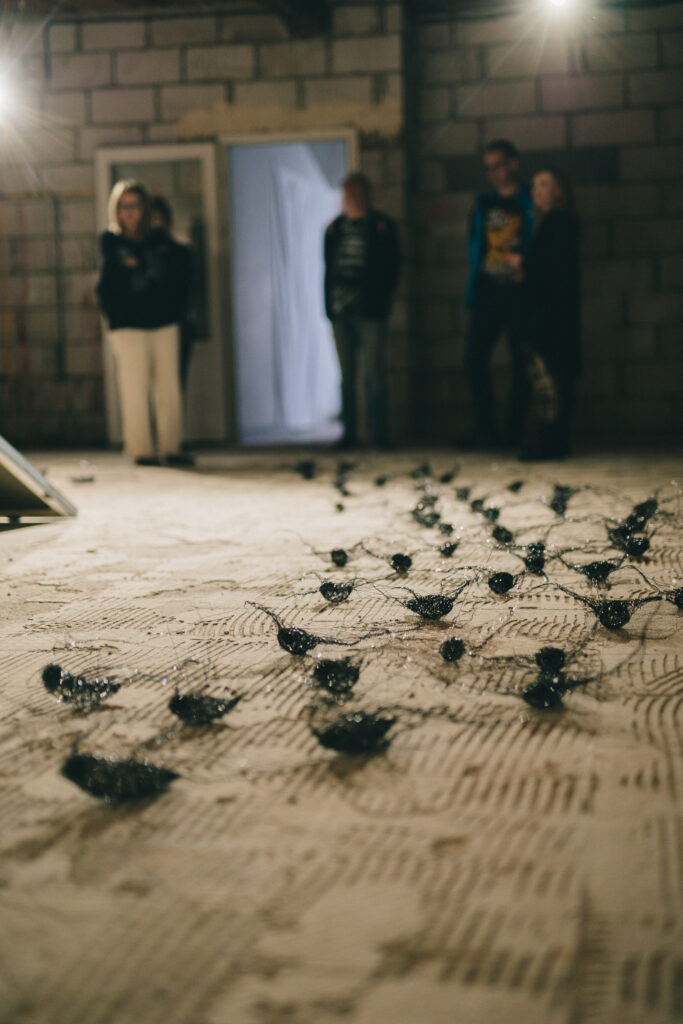
In an equally austere space of the former production building of the Folk and Artistic Handicraft Cooperative “Splot” in Nowa Ruda, where NOWA art space gallery is located, we presented works by painter and graphic artist Maja Gajewska. The series of works is an expression of the artist’s deliberations on the social issue of abortion. The current presentation is a development of an exhibition of oil paintings combined with an installation made of metal which received a silver medal in the Mixed Media category at XIII Florence Biennale in 2021. The works referred directly to the wave of manifestations organized in Polish cities in autumn 2020, when the Polish Sejm toughened the law on pregnancy termination. A return to that subject now is not a coincidence. In recent months, the debate on abortion law once again entered the public space. There exhibition was accompanied by a vernissage, a tour and a meeting with Maja Gajewska.
The exhibition “Sisters” presented paintings by Agnieszka Brzezińska, whose work encompasses a broad spectrum: from abstract to figurative painting. Her latest works concentrate mostly on the figure of a woman, and colour plays as important a role as form. The artist strives for a harmony between the figure and the colour, which she achieves by intuitively selecting the colour palette and eliminating redundant elements of the composition. One of the most recognizable elements of Brzezińska’s art is the method of presenting women from behind, focusing on their backs and characteristic headdress. This unusual perspective provides her works with a unique character, encouraging viewers to reflect deeper on the identity and introspection of the figures. The artist states that it’s not the figures who have their backs turned to us, but we are standing behind them and in this way are encouraged to look straight ahead. Often presented in pairs, figures from the “Sisters” series symbolize not only traditional family bonds, but also mirror reflections of themselves, showing the depths of our inner world invisible at first glance. Minimalist, geometric forms of the female figures highlight the richness of colours, which also become the topic of the paintings, strengthening their emotional message.
For the first time we included theatre performances in the programme of our Festival. We offered two of them to our audience.
Teatr THB staged in the Jerzy Szaniawski Drama Theatre in Wałbrzych the play “E.E” based on the novel by Olga Tokarczuk of the same title. The action takes place in 1908 in Wrocław, when 15-year-old Erna Eltner begins to see ghosts. In those witnessing the unique events, the girl’s talents of a medium awaken hidden desires, concealed secrets and supressed fears. But it is not certain if there are experiences real. Olga Tokarczuk’s psychological novel became the basis for a performance whose creators search for the answer to questions about the border between truth and fantasy, dreams and reality and if we can escape the trap of the unstoppable rush of life.
Teatr Nowy Proxima presented in Kłodzko Cultural Centre “Komediantka” [The Comedian], a performance being a literary mixture of Anton Chekhov (“Calchas”, translated into Polish by Agnieszka Lubomira Piotrowska), Thomas Bernhard and a short history of SPATIF Club – a house of drunkenness, love and infidelity, a house where the greatest Polish actors partied. It is a ‘backstage’ history of theatre. The director and author of the script Piotr Sieklucki points out that Anton Chekhov and Thomas Bernhard reflected on the condition of the theatre too often not to share alarming tales about it. It turns out that nothing changed since their times; that theatre remains the same cradle of intrigues it was before. An uncertain fate of a new director facing a diva. Theatre from the backstage can be fascinating. It’s a mixture of talents and anti-talents. Weirdos, posers and people constantly acting as intellectuals admiring their own stupidity. The only thing you can do is laugh at it.
One of the fundamental values inscribed in the statute of the Olga Tokarczuk Foundation is broadening and deepening the social awareness in the area of environmental protection, fight for animal rights, as well as promotion of new technologies helping to protect the environment. We do not only speak about those issues, we also try to select and promote environment-friendly solutions.
To limit carbon footprint and make it easier to move between Festival locations, we organize and recommend to our guests free public transport to the most popular locations. This year, we observed a significant growth of interest in this solution. Our buses travelled full, altogether driving circa 2 thousand kilometres. We also encourage to use trains and public transport between particular towns.
We try to limit waste production. We don’t print tickets and don’t demand it from our participants. We don’t use plastic products. ID cards for organizers, volunteers, guests and the media are made of paper. We also use paper bags and folders for documents.
There was also a Festival shop, in which participants could buy gadgets of this year’s edition – 80 per cent of them was made from recycled materials. They included T-shirts from organic cotton with a graphic design by Ewa Mańkowska, bags, notebooks, umbrellas and fans. Selected objects were also gifts to our guests in start packs, which also included honey from a local apiary in Krajanów.
In the food area at the Festival and in our own caterings, we serve only meat-free cuisine, vegetarian and vegan. We try to use local and seasonal products.
We organize a fair presenting local handicraft, food products and art. All products are made in the spirit of eco design, respecting animals and plants. In Nowa Ruda, craftspeople from the region presented their works. You could see and buy artistic ceramics, embroidered, artistic and tatting jewellery, sculpture, wicker, copperplate, felt and metalwork products, clothes from organic hemp fabric, graphic design, posters; taste and purchase regional cheeses, preserves, honey, bread and learn historic techniques of making and ornamenting paper.
Organizing such a big event wouldn’t be possible without the support and involvement of our partners and sponsors, and this year we also had a record number of them – over 80.
We organized the Festival together with the following local governments: the town of Nowa Ruda, rural district of Nowa Ruda, the city of Wałbrzych, Wrocław the Meeting Place, the city of Kłodzko, the city of Świdnica, Lower Silesian Voivodship, Kłodzko district, Wrocław Agglomeration, as well as institutions operating in those locations: Wrocław Literature House, Former Mine Science and Art Centre in Wałbrzych, Nowa Ruda Town Cultural Centre, Kłodzko Cultural Centre, Nowa Ruda District Cultural Centre in Ludwikowice Kłodzkie, the Cyprian Kamil Norwid City Municipal Library in Świdnica,Nowa Ruda Town Public Library, the Jerzy Szaniawski Drama Theatre in Wałbrzych, the Porcelain Museum in Wałbrzych, Wrocław Social Development Centre, Local Activity Centre in Kłodzko, the Eugeniusz Geppert Academy of Art and Design in Wrocław. We were also supported by the provincial governor of Lower Silesia.
Other partners of this year’s Mountains of Literature Festival were: Allianz Foundation, KRUK S.A., ZPAS company, Wrocław Airport, Heinrich Böll Foundation, Free State of Saxony, Wrocław UNESCO City of Literature, Literackie Publishers, Agora Publishers, Agora for children Publishers, Znak Publishers, Znak Literanova Agora Publishers, Warstwy Publishers, W.A.B. Publishers, słowo/obraz terytoria Publishers, Czarne Publishers, Książkowe Klimaty Publishers, Karakter Publishers, LUNA Publishers, Merida company, Macma company, Easy Gifts company, Ewa and Krzysztof Folt, FOSA security company, Sarny Castle in Ścinawka Górna, SPEKTRUM Centre for Clinical Ophthalmology, Łąkowa 1 Centre, Nowa Art Space, Olga Tokarczuk Ex-Center. Academic Research Center, Tour de Constitution initiative, Congress of Civic Democratic Movements Foundation, STOLOVELASY Association of Proactive Residents and Lovers of Radków, TigerBus company, Smile Bus Gorczyca company, Pałac Jedlinka Foundation, the Prince Louis I City Public Library in Brzeg, National Centre for Culture, National Reading Development Programme 2.0, Reading Agglomeration, Theatre Notebook, Literary Notebook, Jaga Hupało Art Sanctuary, Tajne Komplety bookshop, Teatr Nowy Proxima, Teatr THB, niebinarnosc.pl portal, Queerpol, Drukarnia Smaku, Cashflow Group, Salon Red to Kill.
The Festival of Olga Tokarczuk’s Translators was supported by the Ministry of Culture and National Heritage, Lower Silesian Voivodship, Polish Institute in Tbilisi, Lithuanian Culture, Institute, and the Czech segment “Literature without borders” was supported from the Interreg Czechia–Poland Programme co-financed by the European Union.
